- Home
- About
- Programs & Courses
- Departments
- Library
- Sports & Gymkhana
- Admissions
- Placements
- Code of Conduct
- Research
- Institute Feedback
-
Committees
- Various Committees
- Anti-Ragging Committee
- Anti-Ragging Squad
- Internal Complaint Committee
- Reservation/SC/ST Cell
- SGRC Committee
- Minority Cell
- OBC Cell
- College Development Committee
- IIC
- Divyang Cell
- Equal Opportunity Cell
- Grievance Redressal Cell
- Student Council
- Start-up, lncubation & Innovation Cell
- NEP Committee
- Activities
- Downloads
- Alumni
- NIRF
- IQAC
- NAAC
- NBA
- Home /
- Latest News and Updates /
- COEW Pages
- Home
- About
- Programs and Courses
- Departments
- Admissions
- Placements
- Code of Conduct
- Research and Publications
- Committees
- Activities
- Downloads
- Contact Us
- ACM Information Technology
- NAAC
- AQAR 2021-2022
- AQAR 2022-2023
- Details
Intake
| S.No | Department | No. of Seats |
| 1. | M.E. Electronics and Communications - VLSI and EMBEDED SYSTEM | 18 |
| Total | 18 |
- Details
Intake
| S.No | Department | No. of Seats |
| 1. | M.E. Electronics and Telecommunications - VLSI and EMBEDED SYSTEM | 09 |
| 2. | Computer Engineering | 12 |
 24x7 Women Helpline number
24x7 Women Helpline number9623039690
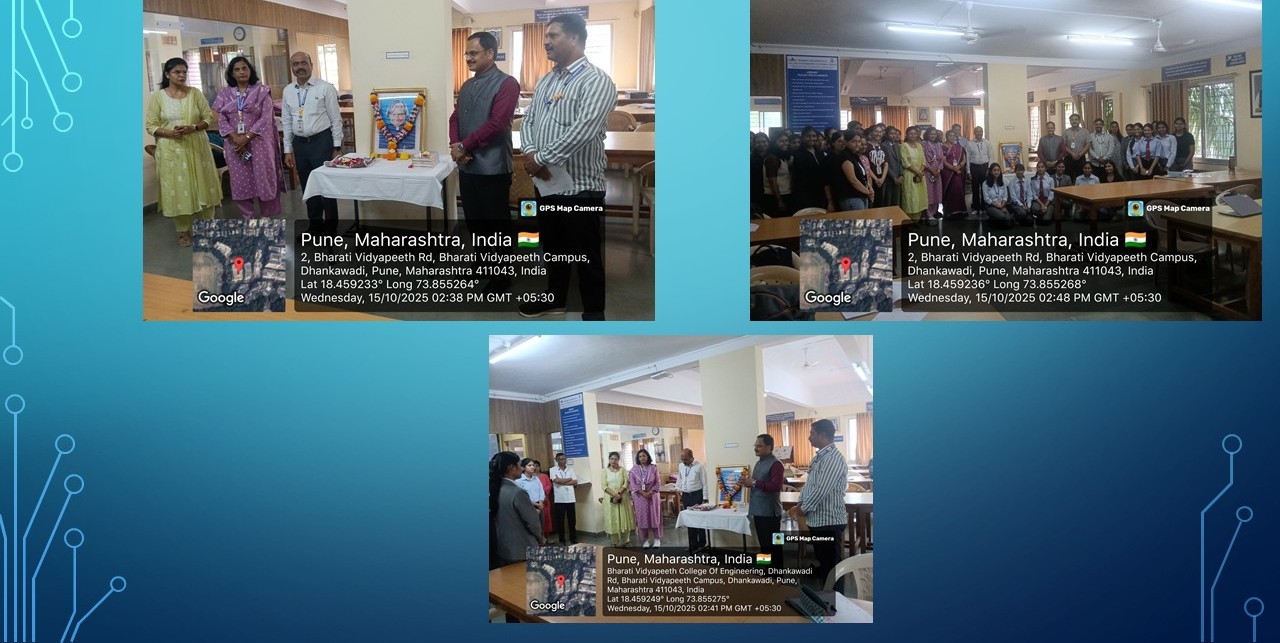
डॉ. ए. पी. जे. अब्दुल कलाम जयंती - कार्यक्रमाचे फोटो -१५ ऑक्टोबर २०२५
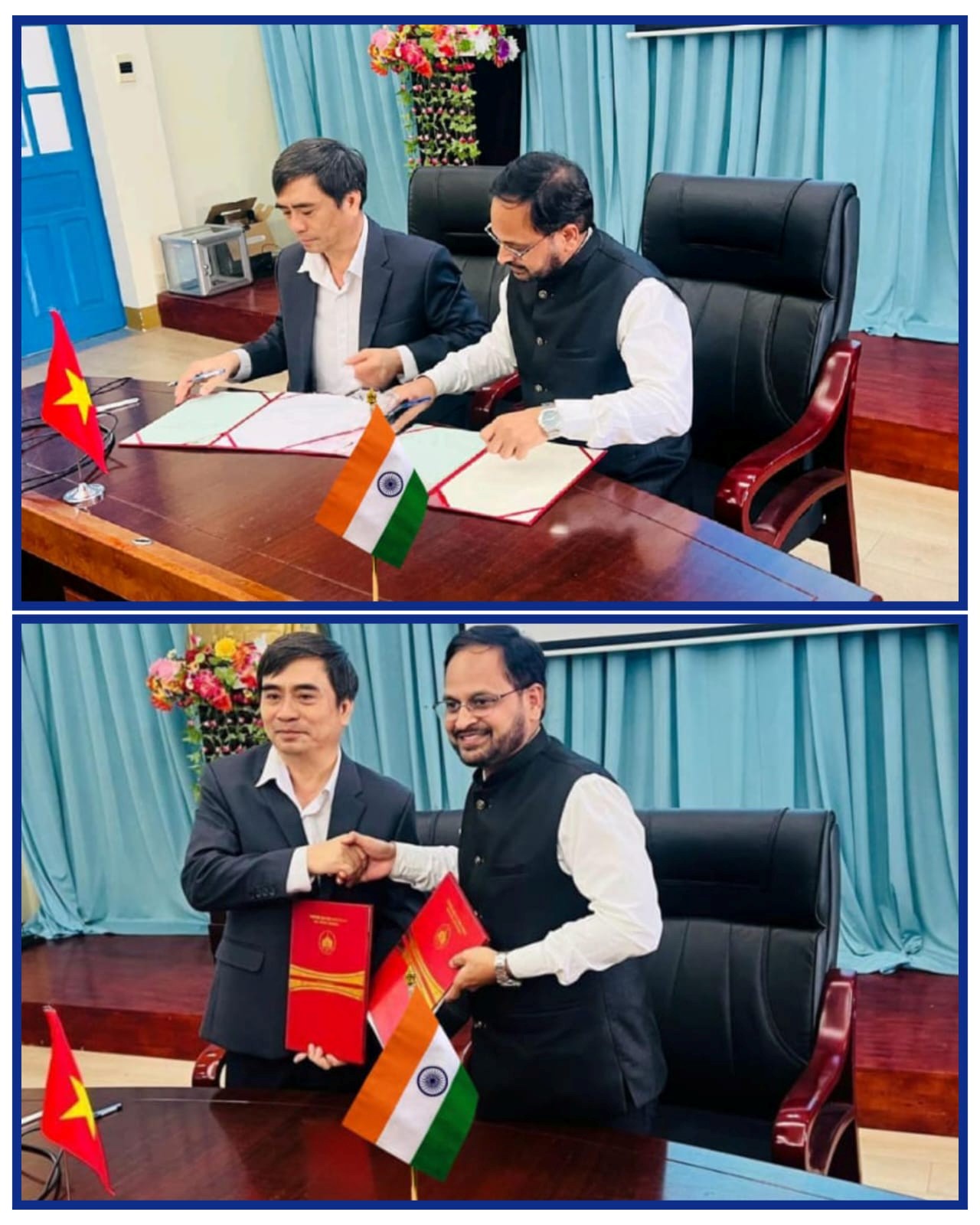
A Proud Academic Collaboration Moment for Bharati Vidyapeeth's College of Engineering for Women, Pune
Bharati Vidyapeeth’s College of Engineering for Women (BVCOEW), Pune, has officially entered into a Memorandum of Understanding (MoU) with Nha Trang University (NTU), Vietnam, marking the beginning of a valued international partnership aimed at promoting academic and research excellence.
The MoU was signed in the esteemed presence of Prof. Dr. Pham Quoc Hung, Vice Rector, Nha Trang University, and Dr. Pradeep Vitthal Jadhav, Principal, BVCOEW, Pune, symbolising a shared vision of fostering global academic cooperation and innovation.
Key Areas of Collaboration
Exchange of students and faculty members
Joint research projects, publications, and conferences
Development of joint academic programmes and specialised training courses
Sharing of academic information, teaching materials, and resources
Other mutually beneficial initiatives in education and technology
This three-year MoU sets the stage for meaningful academic exchange and knowledge-sharing between Vietnam and India. Both institutions are dedicated to advancing interdisciplinary learning, enhancing global exposure for students and generating impactful collaborative research outcomes.
BVCOEW expresses heartfelt gratitude to the leadership of Bharati Vidyapeeth for their continuous guidance and encouragement.
Special appreciation is extended to Dr. Vishwajeet Kadam, Secretary, Bharati Vidyapeeth and Pro-Vice Chancellor, BV(DU), whose visionary leadership continues to inspire such landmark international collaborations.
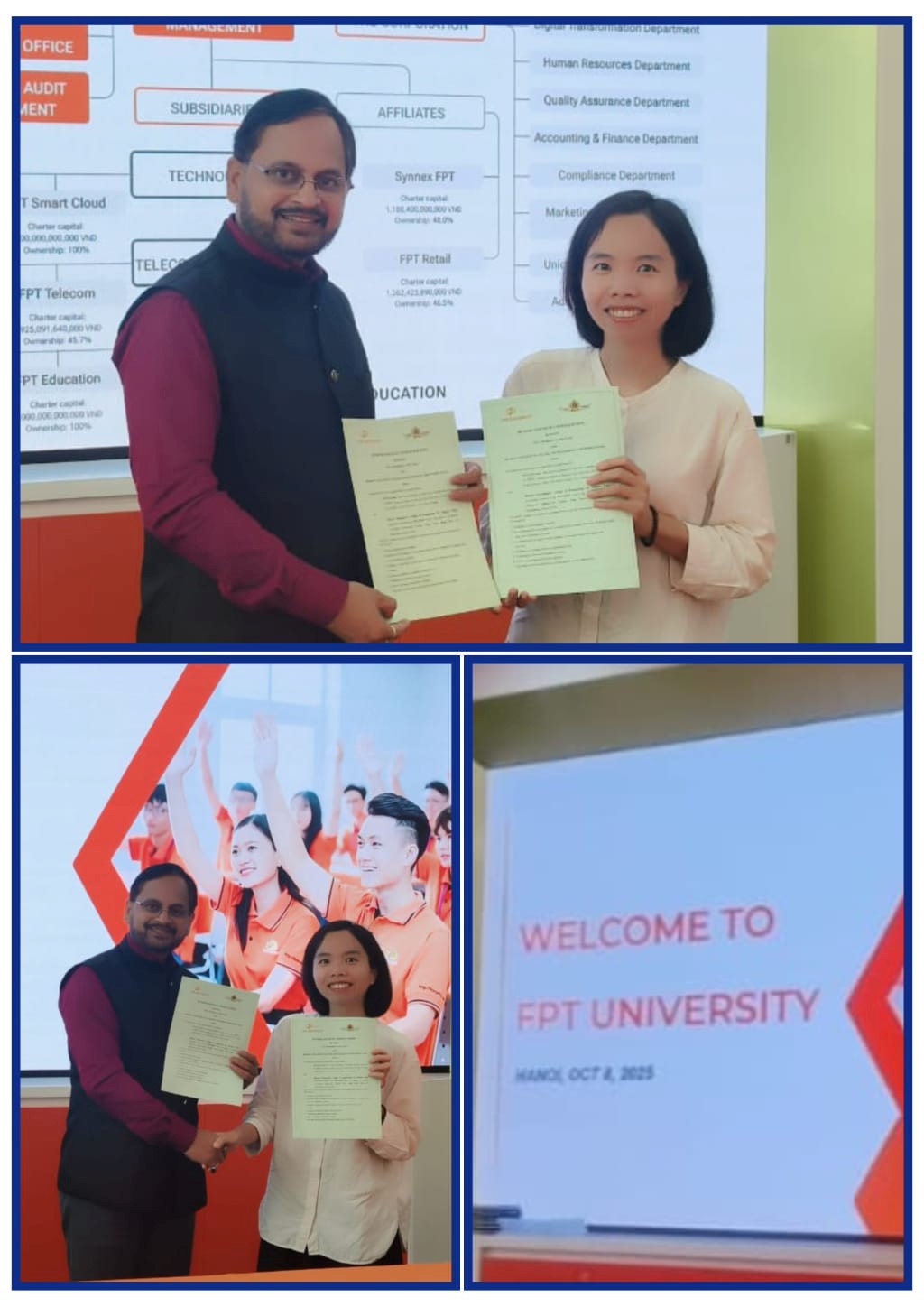
A Proud Academic Collaboration Moment for Bharati Vidyapeeth's College of Engineering for Women, Pune
Bharati Vidyapeeth’s College of Engineering for Women (BVCOEW), Pune, has officially signed a Memorandum of Understanding (MoU) with FPT University, Hanoi, Vietnam, marking the beginning of a dynamic international academic partnership dedicated to promoting excellence in education and research.
The MoU was signed in the esteemed presence of Ms. Nguyen Hoang Ngoc Linh, International Cooperation Executive, International Cooperation Office – FPT Edu/FPT Uni, and Dr. Pradeep Vitthal Jadhav, Principal, BVCOEW, Pune. This momentous occasion highlighted both institutions’ shared vision of fostering innovation, global collaboration, and academic excellence.
Key Areas of Collaboration
Exchange of students and faculty members
Joint research projects, publications, and conferences
Development of joint academic programmes and specialised training courses
Sharing of academic information, teaching materials, and resources
Collaborative initiatives supporting mutual advancement in education and technology.
This three-year MoU lays a strong foundation for vibrant academic exchange and knowledge-sharing between Vietnam and India. The partnership aims to enhance interdisciplinary learning, broaden students’ global exposure and generate impactful collaborative research outcomes.
BVCOEW extends heartfelt gratitude to the leadership of Bharati Vidyapeeth for their constant support and encouragement.
Special appreciation is extended to Dr. Vishwajeet Kadam, Secretary, Bharati Vidyapeeth and Pro-Vice Chancellor, BV(DU), whose visionary guidance continues to drive forward meaningful and transformative international collaborations.
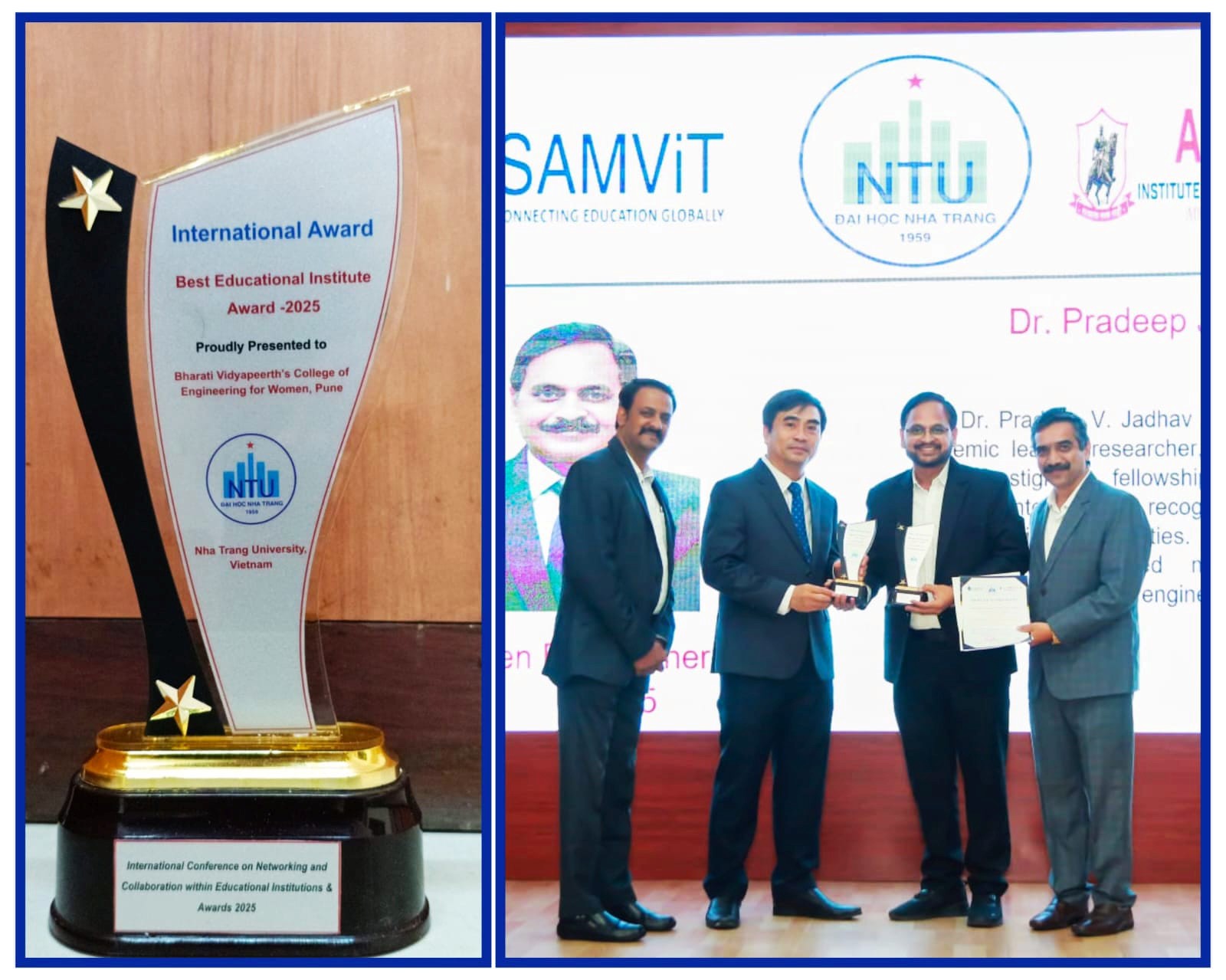
Global Honour for Bharati Vidyapeeth’s College of Engineering for Women, Pune!
Vietnam / Pune:
Bharati Vidyapeeth’s College of Engineering for Women, Pune has been conferred with the prestigious Best Educational Institute Award-2025 at the International Conference on Networking and Collaboration within Educational Institutions and Awards 2025 held at Nha Trang University, Vietnam.
This esteemed award was received by Principal Dr. Pradeep Jadhav from Prof. Dr. Pham Quoc Hung, Vice Rector, Nha Trang University, Vietnam.
Under the visionary leadership of Principal Dr. Pradeep Jadhav, the college has established new benchmarks in quality education, innovation and women empowerment. Guided by his dynamic direction, the institution continues to emerge as a model of excellence on the global stage.
This recognition has been made possible through the inspiring vision and blessings of Founder Chancellor Hon. Dr. Patangraoji Kadam Saheb and under the guidance and leadership of Hon. Dr. Vishwajeet Kadam, Secretary, Bharati Vidyapeeth and Pro Vice Chancellor, Bharati Vidyapeeth (Deemed to be University).
Heartfelt gratitude is also extended to Hon. Dr. Shivajirao Kadam, Chancellor, Bharati Vidyapeeth (Deemed to be University) and Hon. Dr. Asmitatai Jagtap, Executive Director, Bharati Vidyapeeth Health Sciences, for their constant motivation, encouragement and support.
Bharati Vidyapeeth’s College of Engineering for Women, Pune stands today as a true beacon of excellence and empowerment in higher education!

Principal Dr. Pradeep Jadhav Honoured with the ‘NextGen Researcher Award 2025’ in Vietnam
Nha Trang, Vietnam / Pune:
Dr. Pradeep Jadhav, Principal of Bharati Vidyapeeth’s College of Engineering for Women, Pune, received the prestigious NextGen Researcher Award 2025 at the International Conference on Networking and Collaboration within Higher Educational Institutions and Awards 2025 held at Nha Trang University, Vietnam.
The award was presented by Prof. Dr. Pham Quoc Hung, Vice Rector of Nha Trang University, in recognition of Dr. Pradeep Jadhav’s outstanding contribution to research, innovation and academic leadership
His keynote lecture titled “Linking Innovation, Environment and Society: Research Pathways towards a Sustainable Future” earned high appreciation from international delegates for its vision, depth and relevance to global sustainability.
Dr. Pradeep Jadhav expressed heartfelt gratitude to the Bharati Vidyapeeth management, stating that this achievement was possible only because of their unwavering support, inspiring leadership and continuous encouragement. He emphasised that the institution’s progressive vision and commitment to academic excellence have been the driving force behind every success.
Heartfelt gratitude is also extended to Hon. Dr. Shivajirao Kadam, Chancellor, Bharati Vidyapeeth (Deemed to be University) and Hon. Dr. Asmitatai Jagtap, Executive Director, Bharati Vidyapeeth Health Sciences, for their constant motivation, encouragement and support.
Bharati Vidyapeeth’s College of Engineering for Women, Pune stands today as a true beacon of excellence and empowerment in higher education!
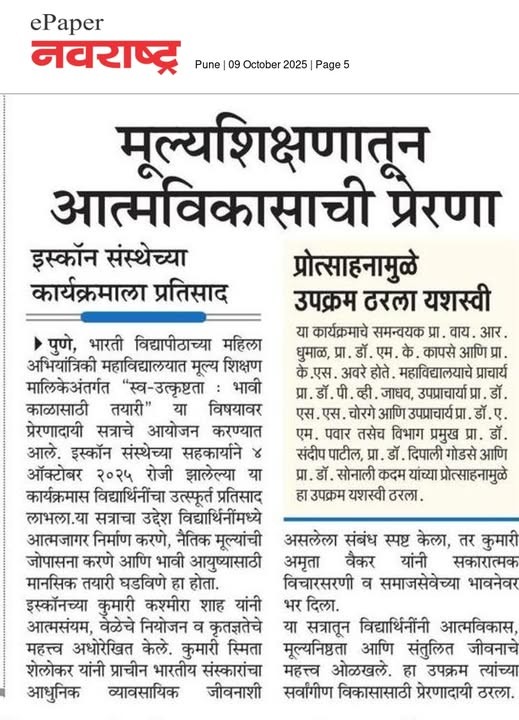
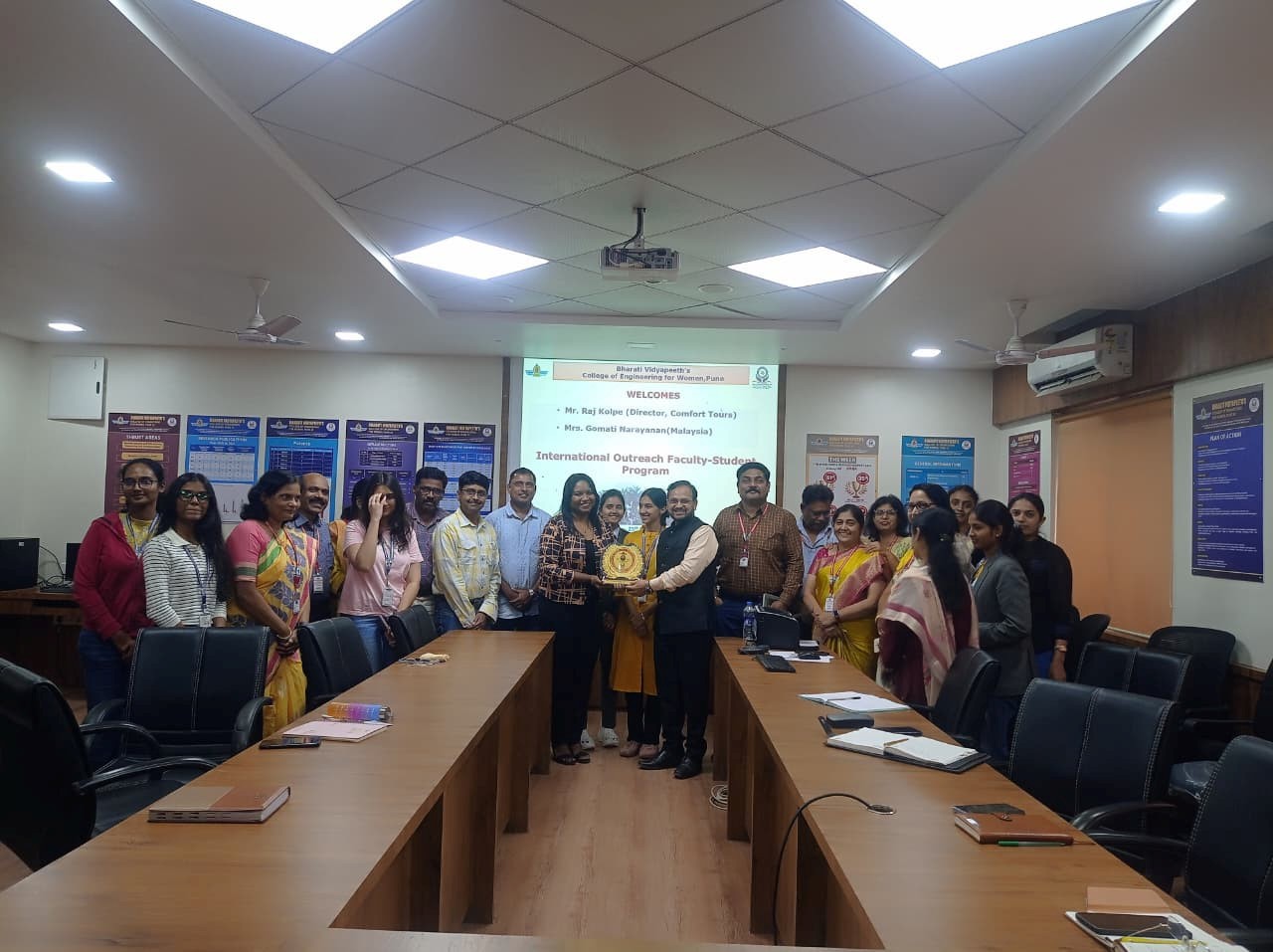
Interactive Session on Malaysian Education Opportunities – 25th September 2025 On 25th September 2025, Thursday, Bharati Vidyapeeth’s College of Engineering for Women organized an interactive session on Malaysian education opportunities and university visits, conducted by Ms. Gomathi Narayanan and Mr. Raj Kolpe, Director of Comfort Tours.
Ms. Gomathi, originally based in Chennai and now in Malaysia, is collaborating with Indian universities to attract Indian students for their postgraduate studies in Malaysia. The session provided valuable insights about Malaysian higher education, student life, and career opportunities. Students from all departments actively participated and engaged in discussions, showing keen interest in pursuing further education abroad.
This initiative was conducted under the International Outreach of Student Exchange Program and was coordinated by Prof. Dr. Ketaki Malgi under the guidance of Prof. Dr. Pradeep V. Jadhav, Principal of Bharati Vidyapeeth’s College of Engineering for Women, who is known for his efforts in promoting global academic collaborations and student exchange initiatives.
The event was also attended by Heads of Departments, senior faculty members, and Vice-Principals, adding to the enthusiasm and support for the session.
The session was highly interactive, enriching, and motivated students to explore international education opportunities in Malaysia.
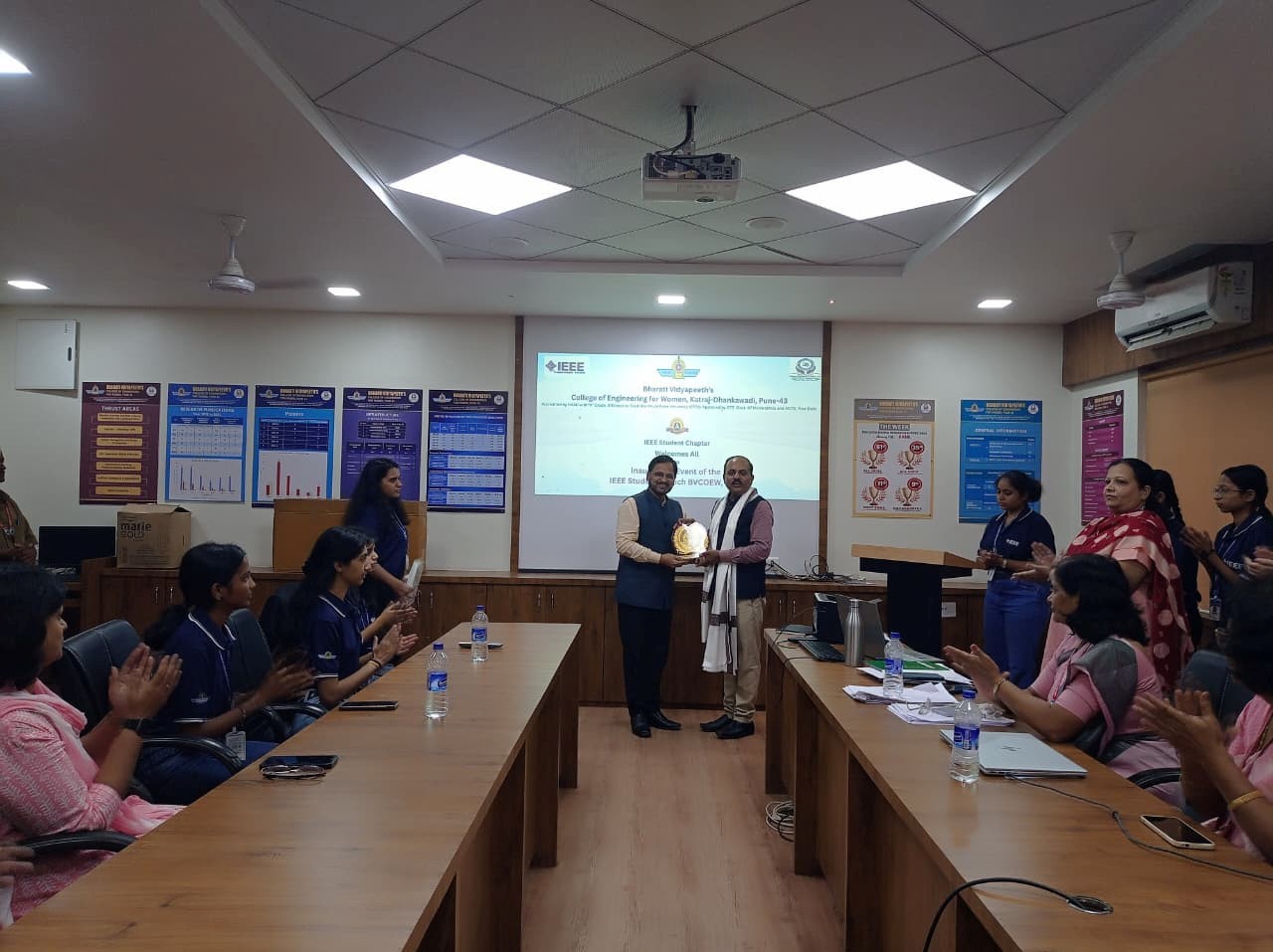
Today, BVCOEW, Pune witnessed the dawn of a new era of innovation, collaboration, and excellence!
The Inauguration Ceremony of the IEEE Student Branch, BVCOEW, Pune was successfully conducted in the gracious presence of our distinguished guest Prof. Dr. Amar Buchade, Chair, IEEE Pune Section, and our respected Principal Pradeep V. Jadhav.
This inauguration was more than just a formal beginning – it marked the launch of a vibrant platform for students to explore cutting-edge technologies, research, and innovation, and to become part of the global IEEE community.
We extend our sincere gratitude to our Principal Pradeep V. Jadhav, and our dedicated Student Branch Counsellor Prof. Dr. Shweta Salunkhe and Prof. Dr. Vijaya Pawar, whose constant guidance, encouragement, and support played a pivotal role in making this event a grand success.
A heartfelt thank you goes out to our honored guests, esteemed faculty members, and enthusiastic students, whose presence and active participation transformed this event into a truly memorable occasion.
The establishment of the IEEE Student Branch at BVCOEW opens the doors to learning, leadership, and limitless opportunities for students – empowering them to contribute to the advancement of technology for humanity.
Here’s to igniting innovation together and building a future driven by creativity, knowledge, and collaboration!
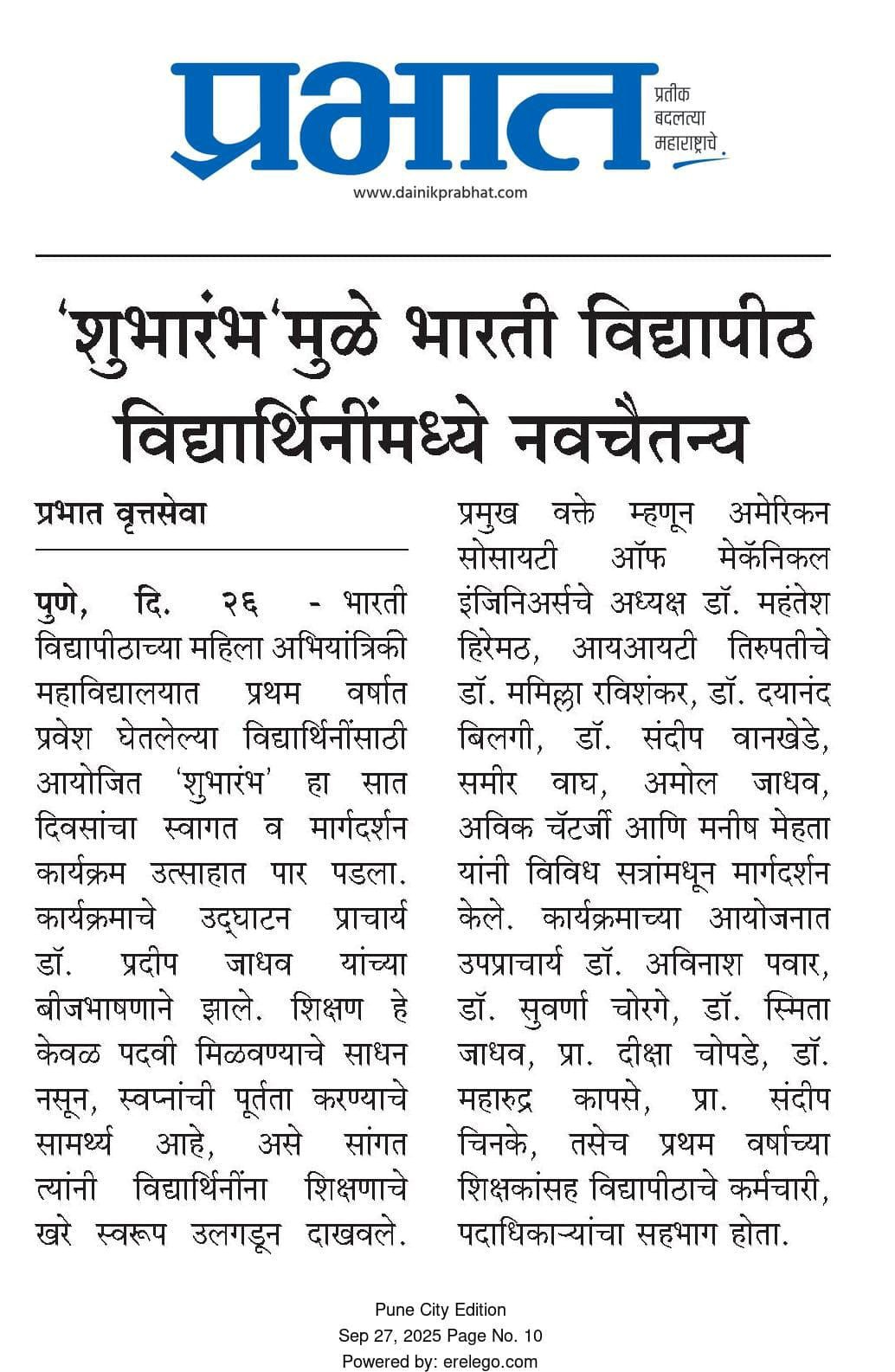
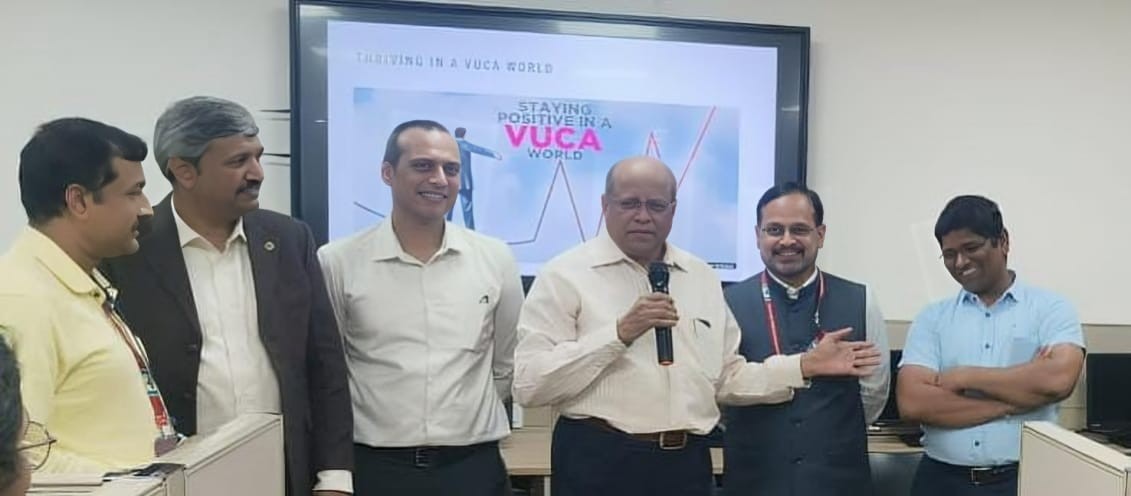
भारती विद्यापीठाच्या महिला अभियांत्रिकी महाविद्यालयात प्रथम वर्षात प्रवेश घेतलेल्या विद्यार्थिनींसाठी आयोजित सात दिवसांचा स्वागत व मार्गदर्शन कार्यक्रम “शुभारंभ” अत्यंत उत्साहपूर्ण आणि प्रेरणादायी वातावरणात यशस्वीरीत्या पार पडला. या उपक्रमाचा उद्देश विद्यार्थिनींमध्ये आत्मविश्वास जागवणे, सकारात्मक दृष्टीकोन निर्माण करणे आणि त्यांच्या शैक्षणिक व व्यावसायिक प्रवासाला योग्य दिशा देणे हा होता.
कार्यक्रमाचे उद्घाटन प्राचार्य डॉ. प्रदीप जाधव यांच्या बीजभाषणाने झाले. त्यांनी विद्यार्थिनींना संबोधताना म्हटले, “शिक्षण हे केवळ पदवी मिळवण्याचे साधन नसून, स्वप्नांची पूर्तता करण्याचे सामर्थ्य आहे.”
या कार्यक्रमात प्रमुख वक्ते म्हणून अमेरिकन सोसायटी ऑफ मेकॅनिकल इंजिनिअर्सचे अध्यक्ष प्रा. डॉ. महंतेश हिरेमठ, आयआयटी तिरुपतीचे डॉ. ममिल्ला रविशंकर, डॉ. दयानंद बिलगी, डॉ. संदीप वानखेडे, श्री. समीर वाघ, श्री. अमोल जाधव, श्री. अविक चॅटर्जी आणि श्री. मनीष मेहता यांनी मार्गदर्शन केले. त्यांच्या व्याख्यानांमध्ये तंत्रज्ञानातील नवकल्पना, आजीवन शिक्षणाची गरज, जबाबदार अभियंता घडविण्याचे महत्त्व आणि नेतृत्वगुण यावर विशेष भर देण्यात आला.


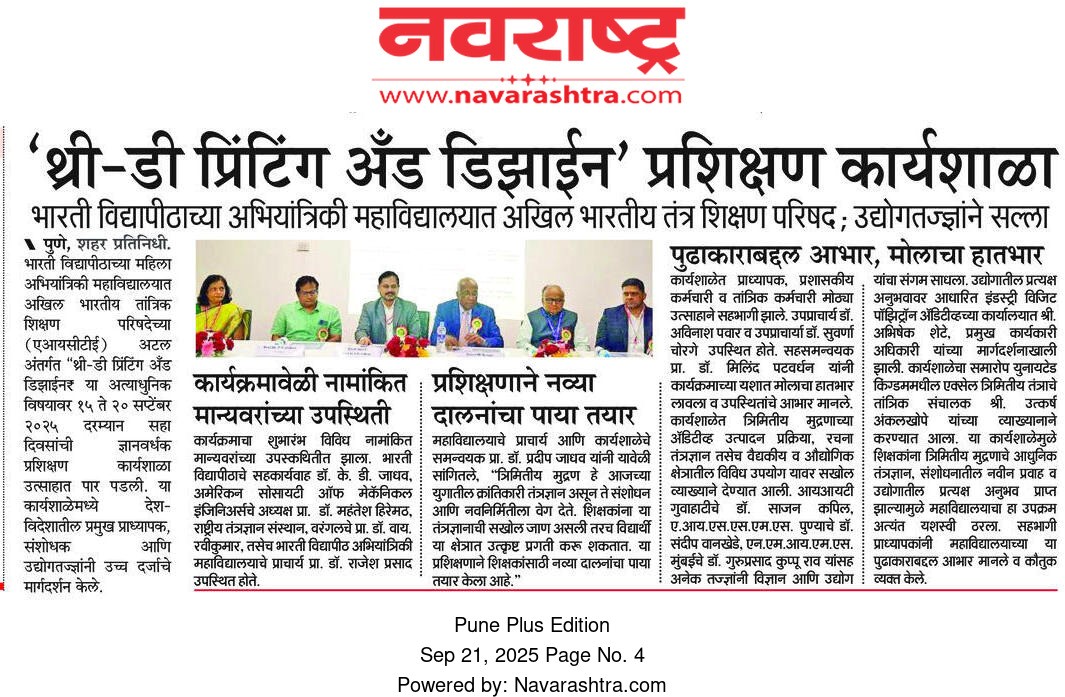
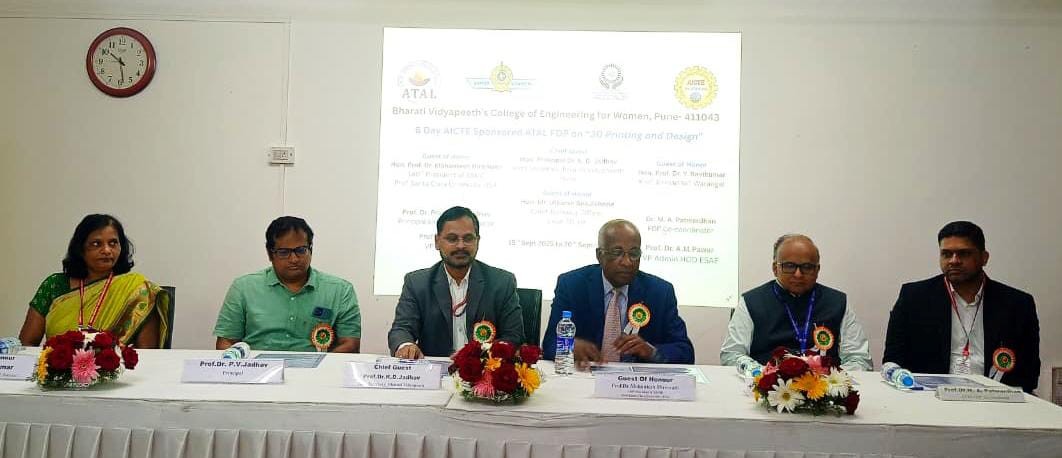
A six-day training workshop on Akhil Bharatiya Technical Education Parishad successfully completed at Women Engineering College of Bharti University Pune, September 20: A six-day knowledgeable training workshop on the modern topic “Three-D Printing and Design” under the Atal of All India Technical Education Parishad (AICTE) at Bharti University’s Women Engineering College. High quality guidance was provided by leading professors, researchers and industrialists across the country and abroad.
The program was inaugurated in the presence of various reputed dignitaries. Prof. President of the American Society of Mechanical Engineers. Dr. Mahantesh Hiremath, Professor of National Institute of Technology, Warangal Dr. Yay. Prof. Ravikumar, also Principal of Bharti University Engineering College. Dr. Rajesh Prasad was present.
College principal and workshop coordinator Prof. Dr. Pradeep Jadhav said this time, “Three printing is the revolutionary technology of today’s era that accelerates research and innovation.” Students can make excellent progress in this field only if teachers have a deep understanding of this technology. This training has built a new foundation for teachers. ”
In-depth lectures were given in-depth lectures on aditive production process of 3D printing, structure technology as well as various uses in medical and industrial sectors. Dr. of IIT Guwahati Sajan Kapil, A. Aye. S. S. M. S. Doctor of Pune Sandeep Wankhede, N. M. Aye. M. S. Mumbai's Dr. Many experts along with Guruprasad Kuppu Rao joined the combination of science and industry. Mr. at the office of Industry Visit Positron Auditive based on real experience in the industry. Done under the guidance of Abhishek Shete, Chief Executive Officer.
Workshop concluded Mr. Technical Director of Excel 3rd Technical Technical in United Kingdom. Done with the lecture of Utkarsh Uncle Khope. The workshop made the college initiative a huge success as teachers gained modern technology in trimitary printing, new streams in research and industry experience. The participating professors thanked and appreciated the college for this initiative.
Professors, administrative staff and technical staff participated in the workshop with great enthusiasm. Vice Principal Dr. Avinash Pawar and Deputy Principal Dr. Golden Chorge was present. Coordinator Prof. Dr. Milind Patwardhan extended a valuable hand in the success of the program and thanked the attendees.
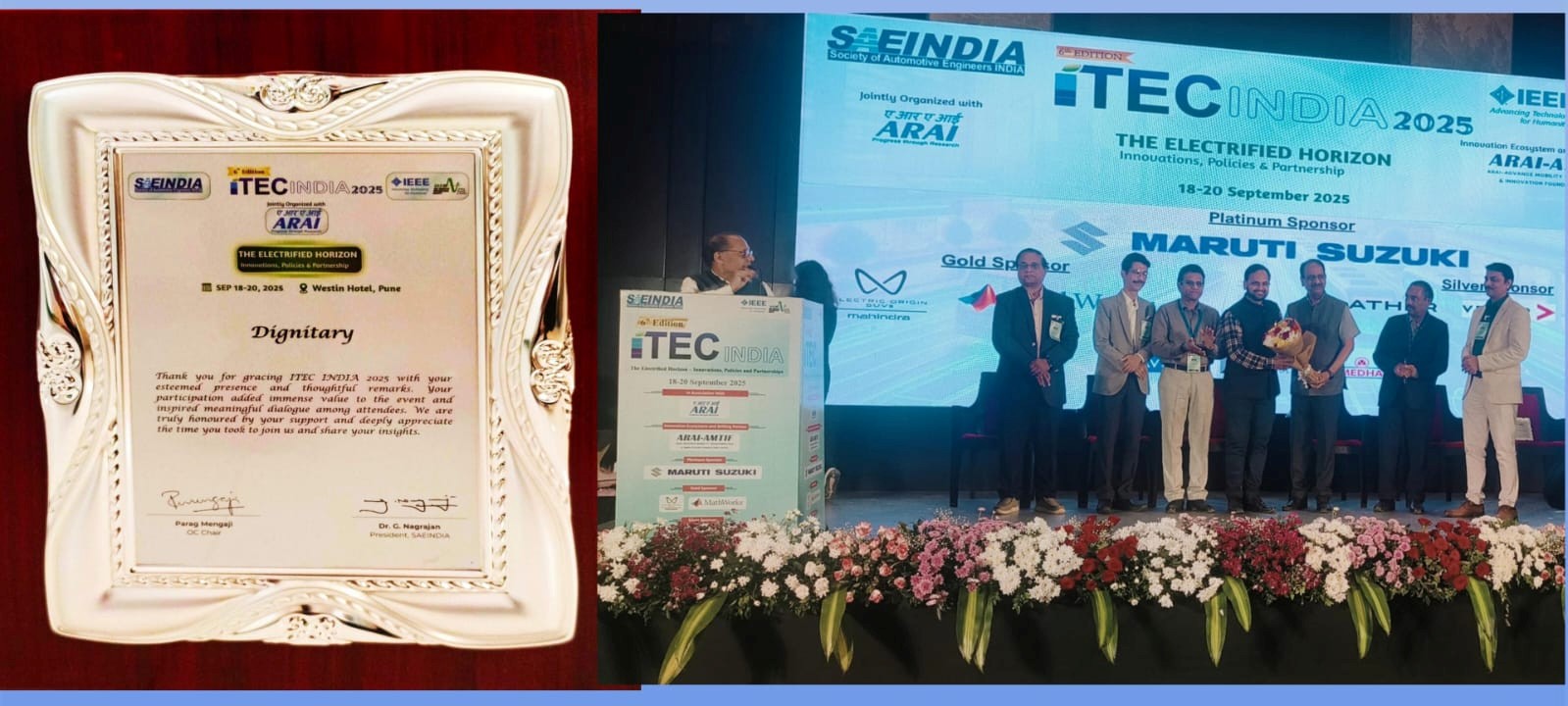
Principal Dr. Pradeep Jadhav Felicitated at ITEC INDIA 2025
Pune, 19th September 2025: Dr. Pradeep Jadhav, Principal of Bharati Vidyapeeth’s College of Engineering for Women, Pune, was proudly represented at the 6th Edition of ITEC INDIA 2025. The event, jointly organised with ARAI, was held at the Westin Hotel, Pune, from 18–20 September 2025.
Themed “The Electrified Horizon: Innovations, Policies & Partnership,” ITEC INDIA 2025, hosted by SAEINDIA in association with IEEE, brought together esteemed dignitaries, researchers, and industry leaders to share insights on sustainable mobility, forward-looking policies, and cutting-edge technologies.
Dr. Pradeep Jadhav was felicitated by the organisers in recognition of his outstanding contributions to engineering education and exemplary institutional leadership. The honour was presented under the leadership of Mr. Parag Mengaji, OC Chair, and Dr. G. Nagarajan, President of SAEINDIA, who sincerely appreciated his esteemed presence and valuable insights.
This recognition not only highlights Dr. Pradeep Jadhav’s personal dedication but also stands as a proud achievement for Bharati Vidyapeeth’s College of Engineering for Women, Pune. It underscores the college’s commitment to advancing knowledge and fostering leadership within the engineering community.
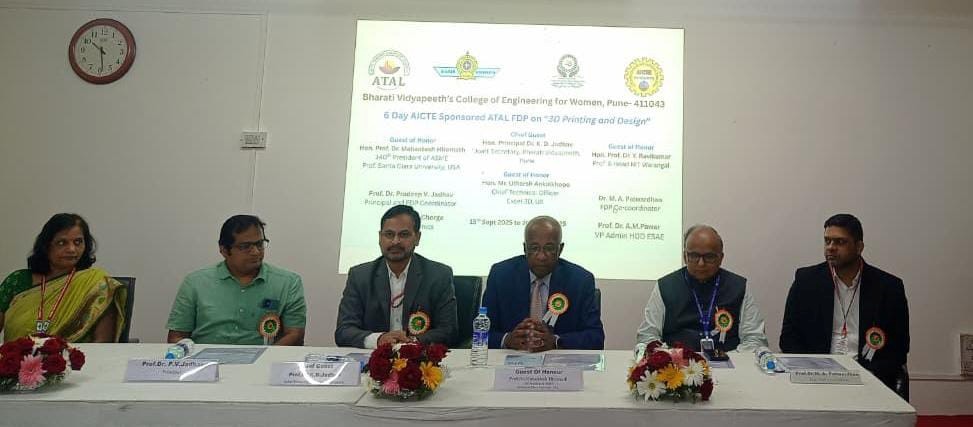
Inauguration of AICTE ATAL FDP on 3D Printing and Design at BVCOEW Pune The 6-day AICTE Training and Learning (ATAL) Academy Faculty Development Programme on 3D Printing and Design was inaugurated today at Bharati Vidyapeeth’s College of Engineering for Women, Pune. The event was graced by Prof. Dr. Mahantesh Hiremath (ASME President, USA), Prof. Dr. Y. Ravikumar (NIT Warangal), Mr. Utkarsh Ankalkhope (Excel 3D, UK) and Prof. Dr. Rajesh Prasad, Principal of BVDU College of Engineering, Pune as esteemed Guests of Honour.
Dr. Pradeep Jadhav, Principal and FDP Coordinator, welcomed the participants and highlighted the importance of innovation and industry collaboration in engineering education. The programme aims to equip faculty with advanced knowledge and skills in 3D printing and design to foster research, innovation and practical learning.
The event concluded with a warm vote of thanks by Dr. Milind Patwardhan, FDP Co-coordinator, who acknowledged the contributions of all guests, faculty and participants. The inauguration was attended by all teaching and non-teaching staff, Heads of Departments, Dr. Vijaya Pawar and Vice Principal Dr. Avinash Pawar.
With inspiring talks and expert guidance, the inauguration set the tone for a fruitful and knowledge-driven week ahead
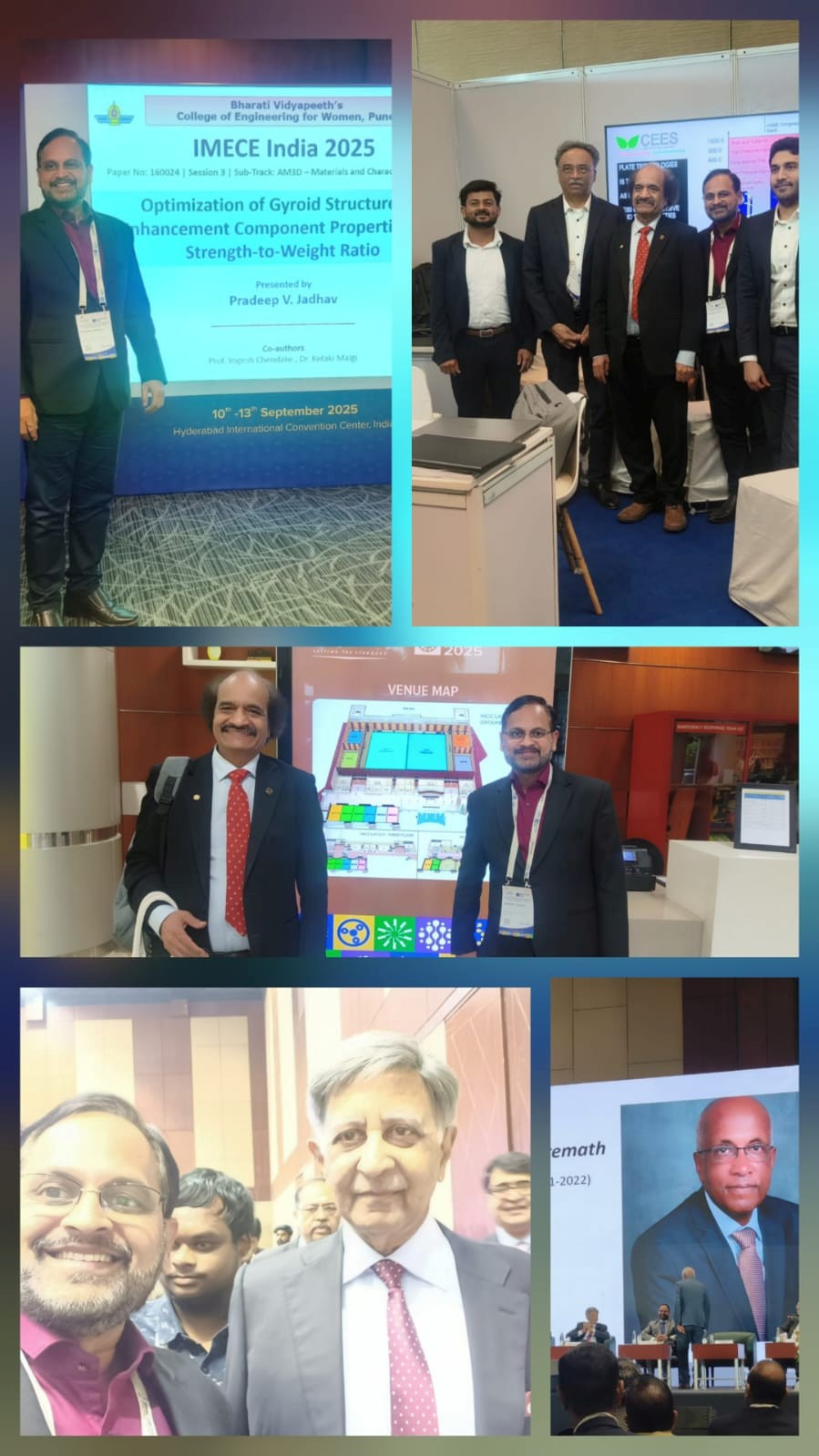
Heartiest Congratulations to Prof. Dr. Pradeep V. Jadhav, Principal BVCOEW Pune
Pune 13 September 2025:
Prof. Dr. Pradeep V. Jadhav Principal of Bharati Vidyapeeth’s College of Engineering Pune (BVCOEW) has brought laurels to the institute by presenting a research paper at the prestigious ASME IMECE-India 2025 Conference held from 10 to 13 September 2025 at the Hyderabad International Convention Centre.
Dr. Pradeep Jadhav presented the paper titled “Optimization of Gyroid Structure for Enhancement of Component Properties: Strength to Weight Ratio” which will also be published in the ASME Journal, marking a significant milestone for both him and the institute.
During the conference Dr. Pradeep Jadhav had the opportunity to interact with several eminent personalities including Dr. Mahantesh Hiremath, Shri. Baba Kalyani and other notable experts from the industry and academia.
By representing BVCOEW at this global forum Dr. Pradeep Jadhav has elevated the institute’s profile and contributed to its recognition on an international platform.
The management of Bharati Vidyapeeth extended their heartfelt congratulations and appreciation for his efforts. Dr. Pradeep Jadhav expressed gratitude towards management for the continued support that enables such achievements.
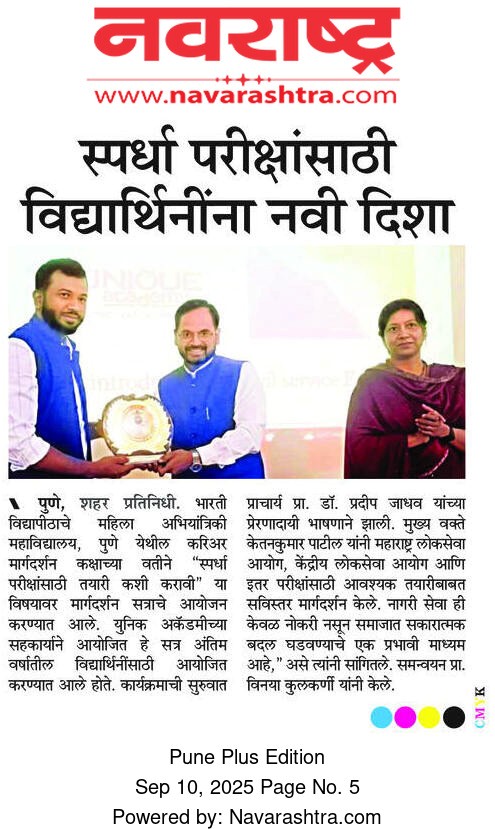
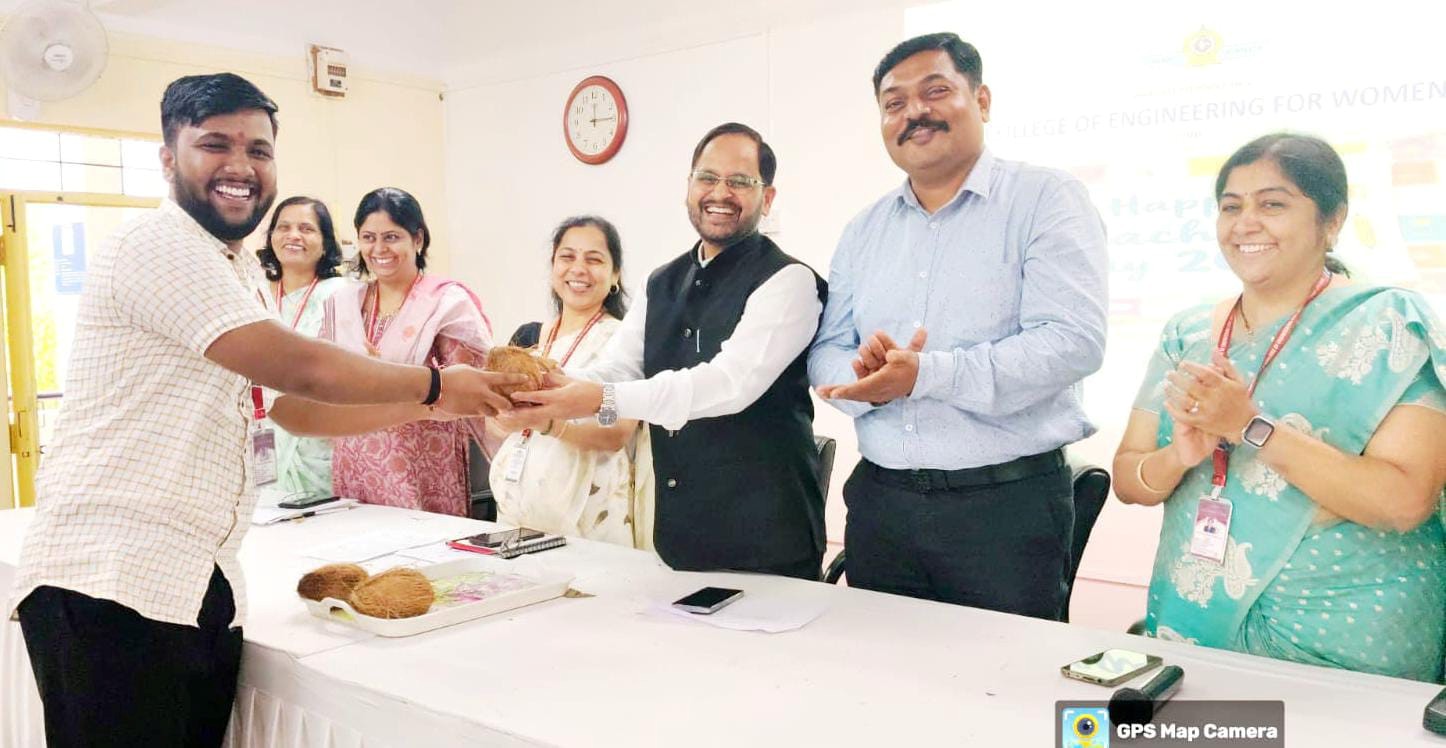
Teachers' Day celebrated with enthusiasm at Bharti University's Women Engineering College, Pune: D. Teachers' Day was celebrated with great enthusiasm at Bharti University's Women Engineering College on 5th September 2025.
Especially, all non-teaching staff also participated in this program. Principal Dr. Pradeep Jadhav appreciated the contribution of teachers and non-teaching staff while guidance and underlined the importance of Teachers' Day. On this occasion, all teachers and staff were honored with shawl and sharifal. Vice Principal Dr. in the program Avinash Pawar expressed his thoughts and thanked everyone.
Proposal and formula operation of the program Dr. Dipali Godse did it in a very well manner. Vice Principal Dr. for this program Golden thieves, Dr. Sonali Kadam and Dr. All the teachers and non-teaching staff along with Vijaya Pawar were present. Some teachers and staff also expressed their thoughts.
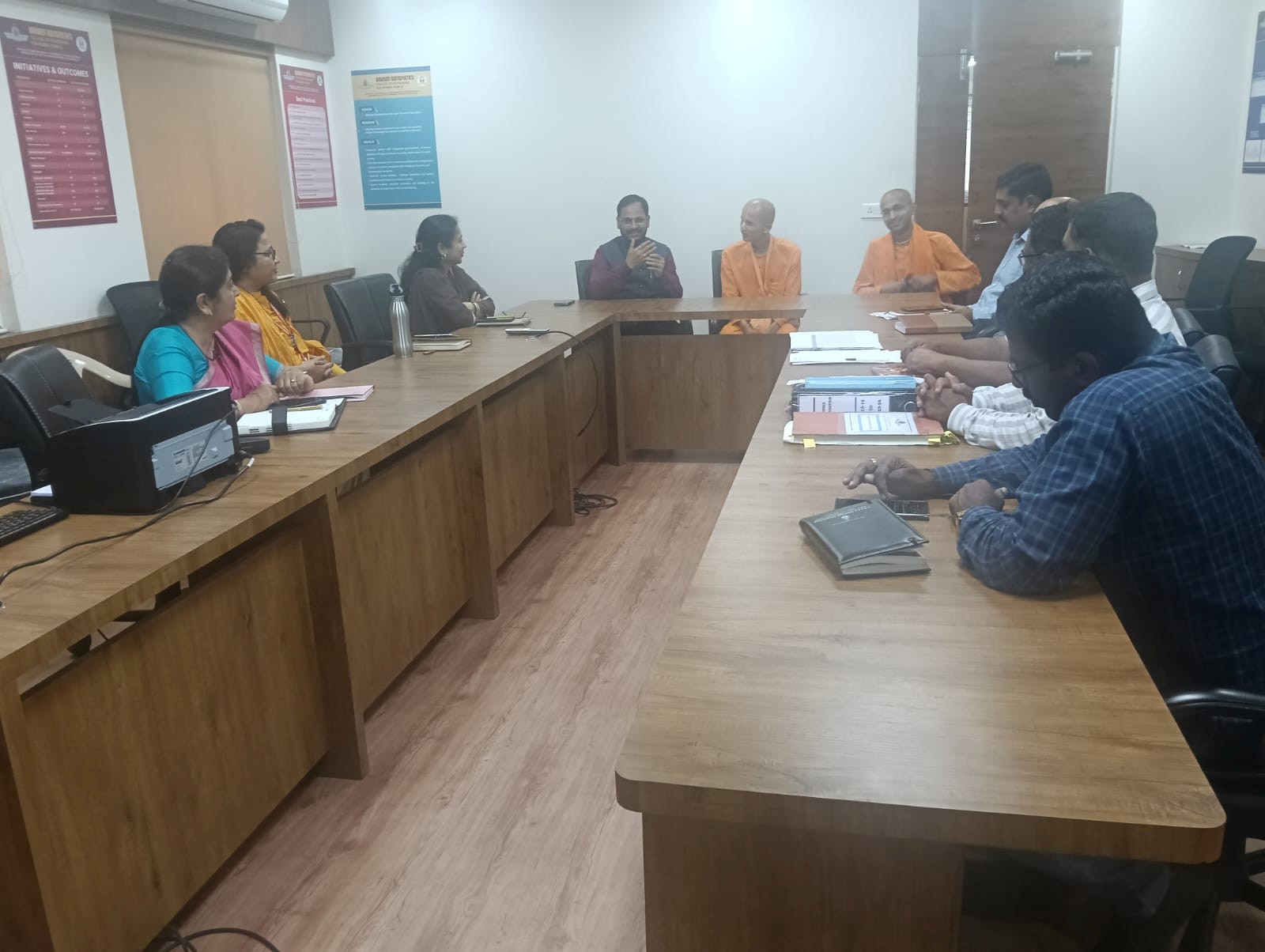
The ISKCON Team visited Bharati Vidyapeeth’s College of Engineering for Women, Pune and guided faculty through their insightful interactions.
Principal Dr. Pradeep Jadhav expressed gratitude to the team for their inspiring presence and valuable guidance, which created a meaningful impact on the campus...
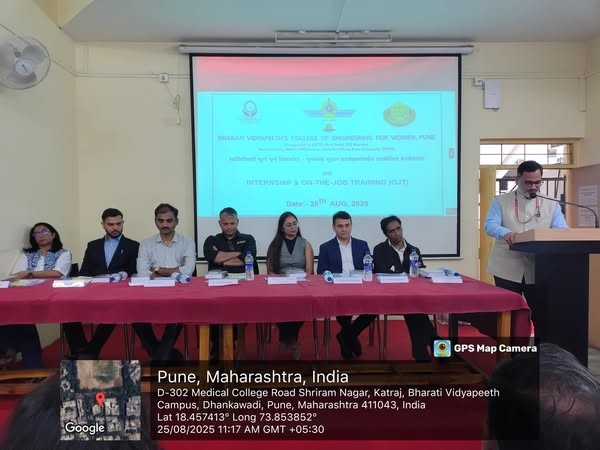
Internship and on the Job Training Awareness workshop on 25/8/2025 at Bvcoew, Pune.
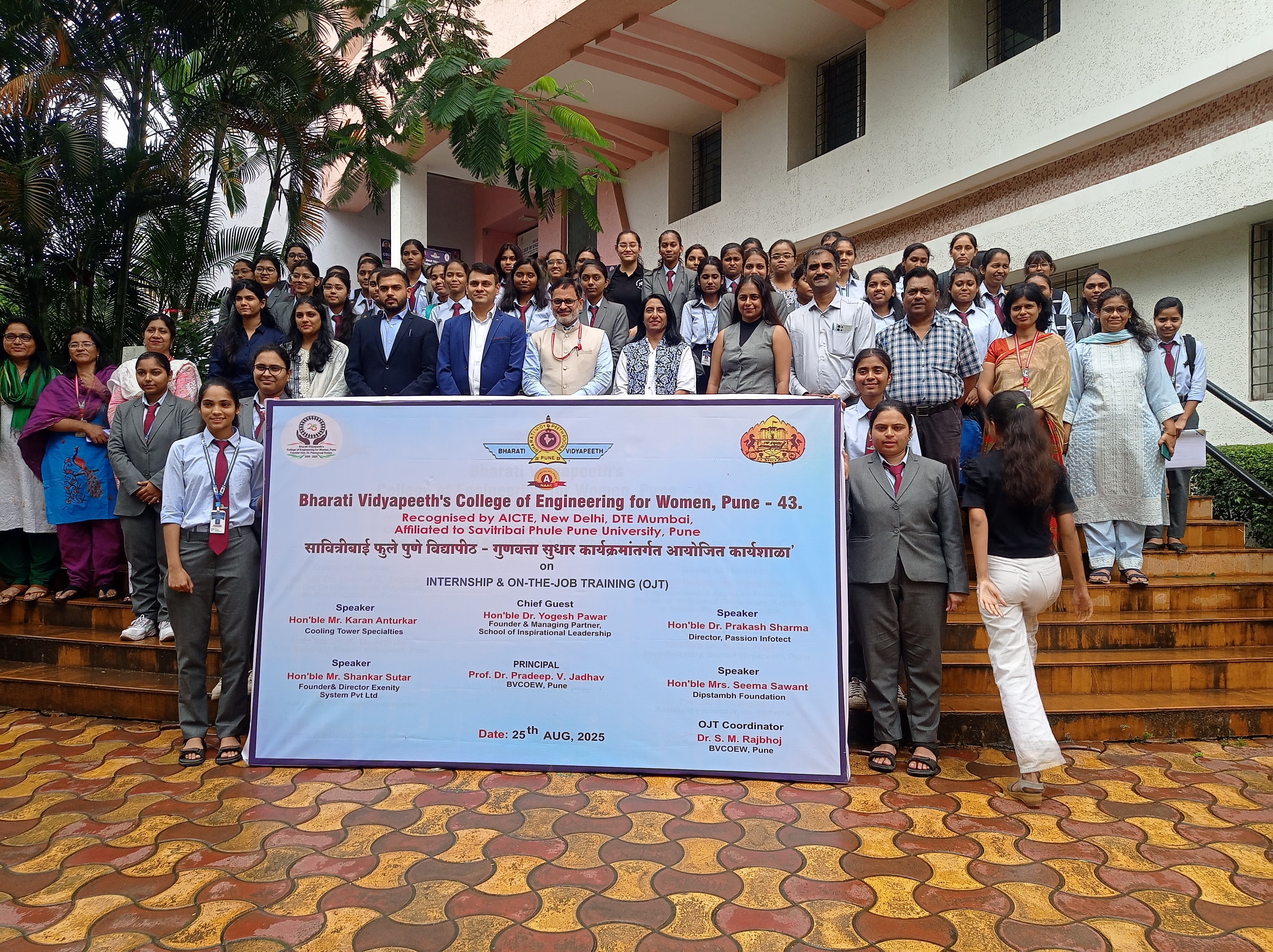
पुणे: दि. २५ ऑगस्ट २०२५ रोजी भारती विद्यापीठाचे महिला अभियांत्रिकी महाविद्यालय पुणे येथे “इंटर्नशिप व ऑन-द-जॉब ट्रेनिंग जनजागृती कार्यशाळा” मोठ्या उत्साहात पार पडली. हा उपक्रम सावित्रीबाई फुले पुणे विद्यापीठाच्या गुणवत्ता वृद्धी कार्यक्रम अंतर्गत राबविण्यात आला होता. या कार्यशाळेत १४४ विद्यार्थिनींनी सहभाग नोंदवला.
महाविद्यालयाचे प्राचार्य डॉ. प्रदीप जाधव यांनी या प्रसंगी बोलताना सांगितले, “इंटर्नशिप म्हणजे वर्गखोल्याबाहेरील खरी शिकवणी आहे. ती विद्यार्थिनींना आत्मविश्वास, कौशल्ये आणि उद्योगक्षेत्राशी जुळवून घेण्याची ताकद देते.”
प्रमुख मार्गदर्शक डॉ. योगेश पवार यांनी विद्यार्थिनींना सल्ला दिला, “जेव्हा तुम्हाला काम कसे करायचे हे उमगते, तेव्हा अर्धे काम पूर्ण झालेले असते.” त्यांनी प्रत्यक्ष अनुभव व उद्योगातील काही महत्त्वाचे नियम शेअर केले. पुढे डॉ. प्रकाश शर्मा यांनी स्वतःच्या इंटर्नशिप व शैक्षणिक प्रवासाची कहाणी सांगत विद्यार्थिनींना मार्गदर्शन केले. त्यांनी सांगितले, “अडथळे आले तरी थांबू नका, पुन्हा मार्गावर या आणि आपल्या आवडीचा पाठपुरावा करा.”
सौ. मानसी बंनकर यांनी मुलींना उद्देशून ठामपणे सांगितले, “स्वतःच्या पायावर उभे राहा, स्वावलंबी बना आणि स्वतःला सातत्याने पुढे ढकला.” त्यानंतर श्री. करण आंतुरकर यांनी उद्योगातील वास्तव अधोरेखित करताना सांगितले, “उद्योगक्षेत्रात माणुसकी आणि कौशल्याला फार मोठे महत्त्व आहे. प्रत्येकाने ‘जॅक ऑफ ऑल अँड मास्टर इन वन’ व्हायला हवे.” त्यांनी स्वतःचा इंटर्नशिप अनुभवही विद्यार्थिनींना सांगितला.
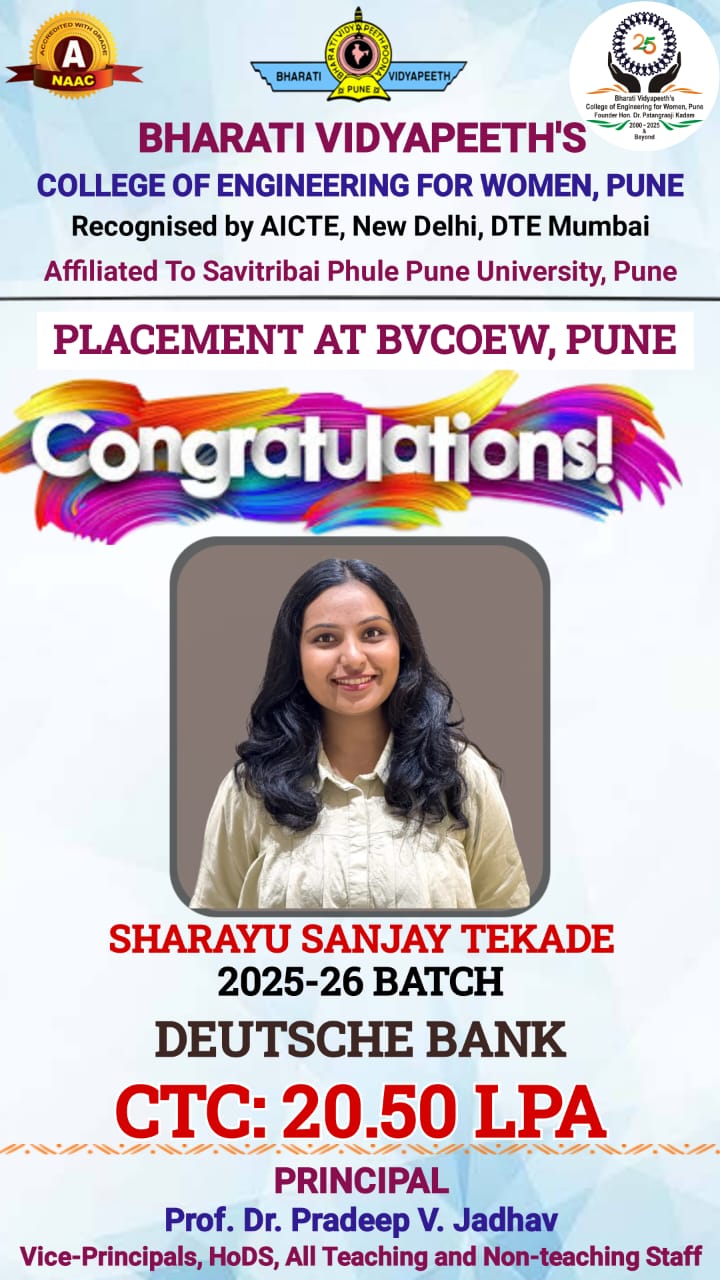
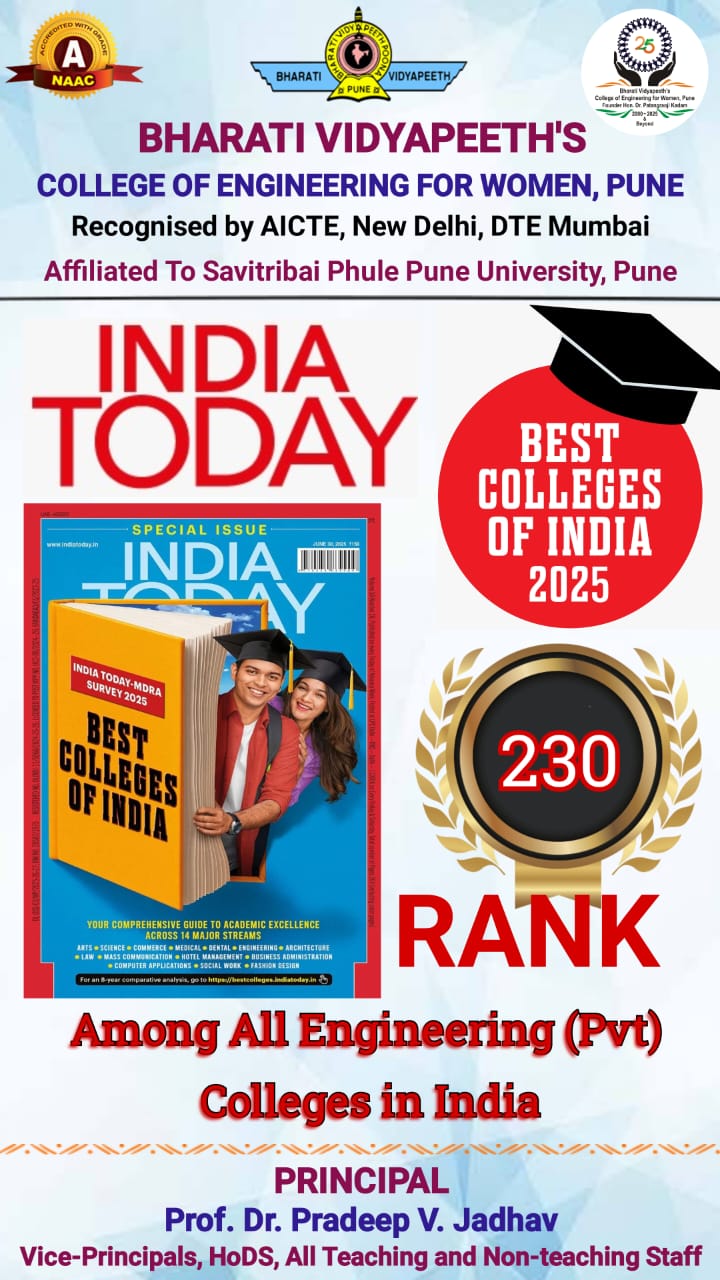
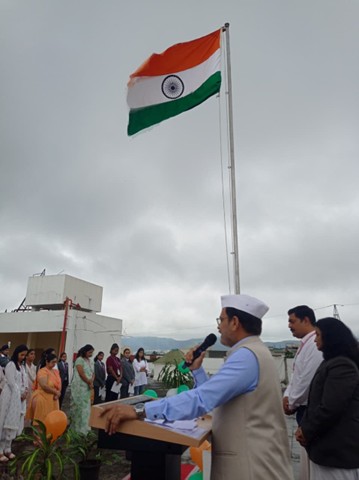

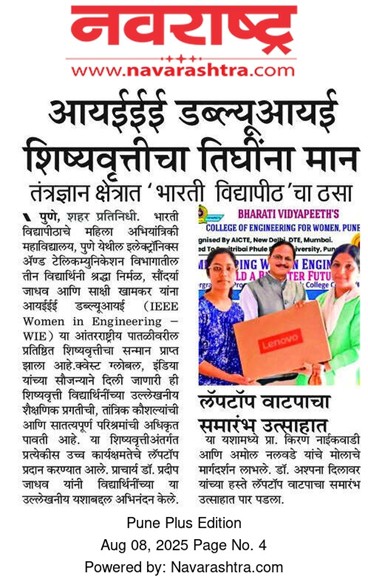
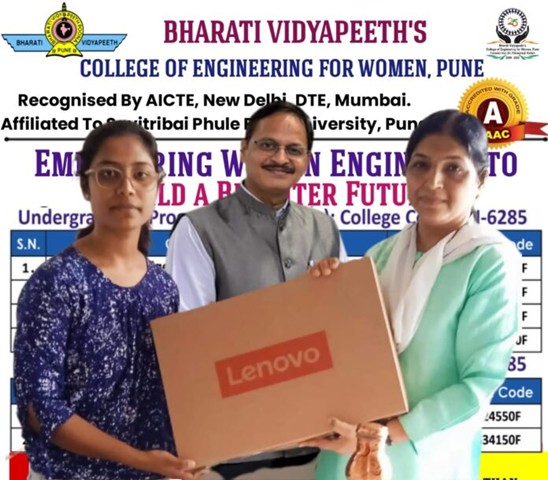
भारती विद्यापीठाचे महिला अभियांत्रिकी महाविद्यालय, पुणे येथील इलेक्ट्रॉनिक्स अॅण्ड टेलिकम्युनिकेशन विभागातील तीन विद्यार्थिनी कु. श्रद्धा निर्मळ, कु. सौंदर्या जाधव आणि कु. साक्षी खामकर यांना आयईईई डब्ल्यूआयई (IEEE Women in Engineering – WIE) या आंतरराष्ट्रीय पातळीवरील प्रतिष्ठित शिष्यवृत्तीचा सन्मान प्राप्त झाला आहे.
क्वेस्ट ग्लोबल, इंडिया यांच्या सौजन्याने दिली जाणारी ही शिष्यवृत्ती विद्यार्थिनींच्या उल्लेखनीय शैक्षणिक प्रगतीची, तांत्रिक कौशल्यांची आणि सातत्यपूर्ण परिश्रमांची अधिकृत पावती आहे. या शिष्यवृत्तीअंतर्गत प्रत्येकीस उच्च कार्यक्षमतेचे लॅपटॉप प्रदान करण्यात आले.प्राचार्य डॉ. प्रदीप जाधव यांनी विद्यार्थिनींच्या या उल्लेखनीय यशाबद्दल अभिनंदन करताना सांगितले,“हे यश त्यांच्या मेहनतीचे फलित आहेच, पण त्या ज्या आत्मविश्वासाने आणि प्रगल्भतेने तंत्रज्ञानाच्या क्षेत्रात आपली ओळख निर्माण करत आहेत, ही संपूर्ण महाविद्यालयासाठी गौरवाची बाब आहे.”
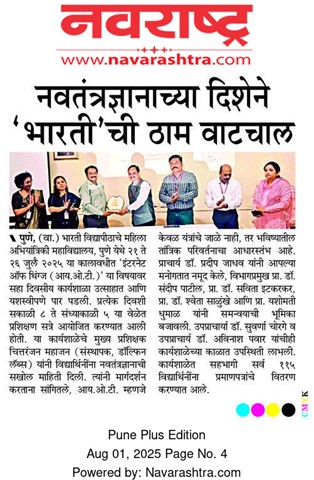
भारती विद्यापीठाचे महिला अभियांत्रिकी महाविद्यालय, पुणे येथे २१ ते २६ जुलै २०२५ या कालावधीत ‘इंटरनेट ऑफ थिंग्ज (आय.ओ.टी.)’ या विषयावर सहा दिवसीय कार्यशाळा उत्साहात आणि यशस्वीपणे पार पडली. प्रत्येक दिवशी सकाळी ८ ते संध्याकाळी ५ या वेळेत प्रशिक्षण सत्रे आयोजित करण्यात आली होती.
या कार्यशाळेचे मुख्य प्रशिक्षक मा. श्री. चित्तरंजन महाजन (संस्थापक, डॉल्फिन लॅब्स) यांनी विद्यार्थिनींना नवतंत्रज्ञानाची सखोल माहिती दिली. त्यांनी मार्गदर्शन करताना सांगितले, “आय.ओ.टी. म्हणजे केवळ यंत्रांचे जाळे नाही, तर भविष्यातील तांत्रिक परिवर्तनाचा आधारस्तंभ आहे.” प्राचार्य डॉ. प्रदीप जाधव यांनी आपल्या मनोगतात नमूद केले, “विद्यार्थिनींना प्रत्यक्ष कृतीतून शिकण्याची संधी मिळाली, हीच या कार्यशाळेची खरी यशोगाथा आहे.”
कार्यशाळेदरम्यान विद्यार्थिनींना मायक्रोकंट्रोलर, मायक्रोप्रोसेसर, आर्डुइनो सॉफ्टवेअर, तसेच विविध संवेदक (सेन्सर्स) यांच्या संयोगाची सैद्धांतिक आणि प्रत्यक्ष माहिती देण्यात आली. ब्लूटूथ आधारित नियंत्रण, आय.ओ.टी. आधारित मोटर नियंत्रण, संख्यात्मक व अँनालॉग सिग्नलचे वाचन व लेखन या विषयांवर प्रात्यक्षिकांसह प्रशिक्षण देण्यात आले. विद्यार्थिनींना नोडएमसीयू, एच.टी.एम.एल., आणि रास्पबेरी पाय या तंत्रज्ञानांची ओळख करून देण्यात आली.

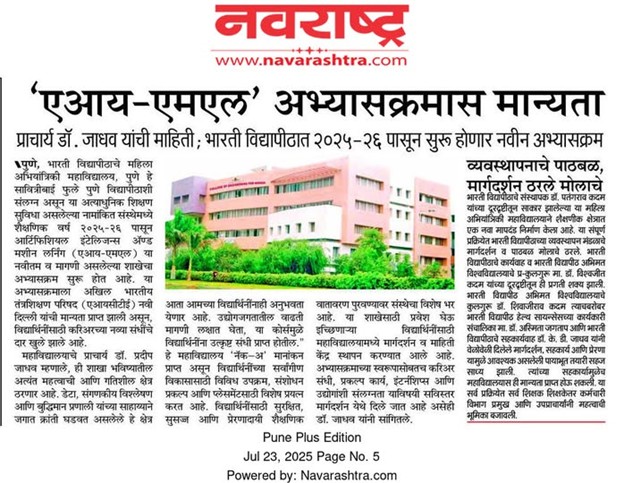
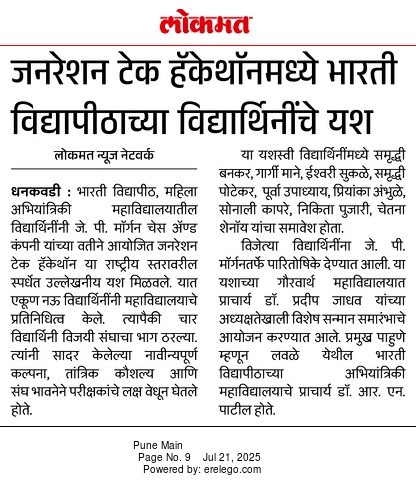
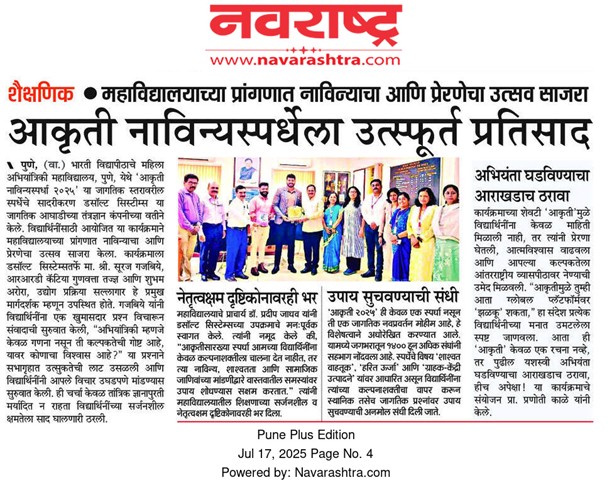
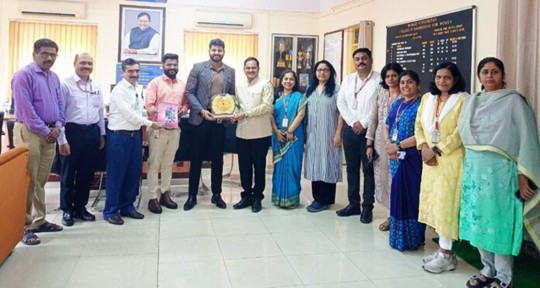
भारती विद्यापीठाचे महिला अभियांत्रिकी महाविद्यालय, पुणे, येथे ‘आकृती नाविन्यस्पर्धा २०२५’ या जागतिक स्तरावरील स्पर्धेचे सादरीकरण डसॉल्ट सिस्टीम्स या जागतिक आघाडीच्या तंत्रज्ञान कंपनीच्या वतीने करण्यात आले. विद्यार्थिनींसाठी आयोजित या कार्यक्रमाने महाविद्यालयाच्या प्रांगणात नाविन्याचा आणि प्रेरणेचा उत्सव साजरा केला
कार्यक्रमाला डसॉल्ट सिस्टेम्सतर्फे मा. श्री. सूरज गजबिये, आरआरडी कॅटिया गुणवत्ता तज्ज्ञ आणि मा. श्री. शुभम अरोरा, उद्योग प्रक्रिया सल्लागार हे प्रमुख मार्गदर्शक म्हणून उपस्थित होते. श्री. गजबिये यांनी विद्यार्थिनींना एक खुमासदार प्रश्न विचारून संवादाची सुरुवात केली, “अभियांत्रिकी म्हणजे केवळ गणना नसून ती कल्पकतेची गोष्ट आहे, यावर कोणाचा विश्वास आहे?” या प्रश्नाने सभागृहात उत्सुकतेची लाट उसळली आणि विद्यार्थिनींनी आपले विचार उघडपणे मांडण्यास सुरुवात केली. ही चर्चा केवळ तांत्रिक ज्ञानापुरती मर्यादित न राहता विद्यार्थिनींच्या सर्जनशील क्षमतेला साद घालणारी ठरली.
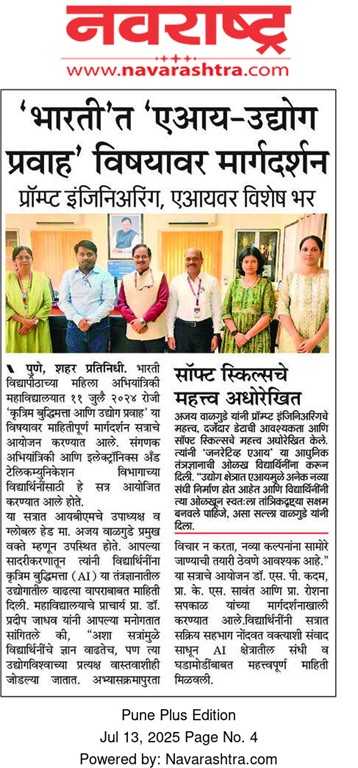
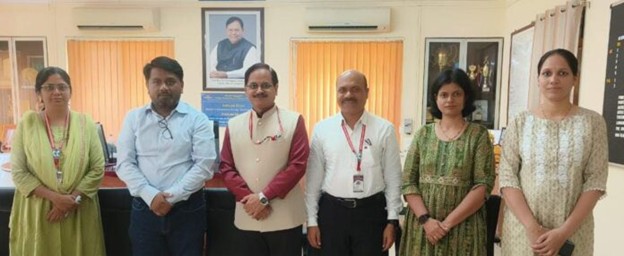
भारती विद्यापीठाच्या महिला अभियांत्रिकी महाविद्यालयात ‘कृत्रिम बुद्धिमत्ता आणि उद्योग प्रवाह’ या विषयावर माहितीपूर्ण सेमिनारचे आयोजन करण्यात आले. संगणक अभियांत्रिकी व इलेक्ट्रॉनिक्स अँड टेलिकम्युनिकेशन विभागाच्या विद्यार्थिनीसाठी हे सत्र आयोजित करण्यात आले होते.
या सत्रासाठी आय बी एम कंपनीचे उपाध्यक्ष आणि ग्लोबल हेड मा. श्री. अजय वाळगुडे प्रमुख वक्ते म्हणून उपस्थित होते. आपल्या प्रभावी सादरीकरणात त्यांनी उद्योगांमधील एआयच्या वाढत्या उपयोगाबाबत सांगत विद्यार्थिनींना नव्या संधींची दिशा दाखवली. प्रॉम्प्ट इंजिनिअरिंगचे महत्त्व, दर्जेदार डेटाची आवश्यकता आणि सॉफ्ट स्किल्सची उपयुक्तता यावर त्यांनी विशेष भर दिला. ‘जेन्टिक एआय’ या नव्या संकल्पनेचीही ओळख करून देत त्यांनी विविद्यार्थिनींना नाविन्यपूर्ण तंत्रज्ञानाकडे वळण्याची प्रेरणा दिली.
या वेळी महाविद्यालयाचे प्राचार्य प्रा. डॉ. प्रदीप जाधव म्हणाले, “अशा प्रकारची सत्रे विद्यार्थिनींच्या ज्ञानात केवळ भर घालत नाहीत, तर त्यांना उद्योगविश्वाच्या वास्तवाशीही जोडतात.” त्यांनी पुढे सांगितले की, “विद्यार्थिनींना अभ्यासक्रमापुरता विचार न करता, नव्या कल्पनांना सामोरे जाण्याची तयारी ठेवावी. अशा कार्यक्रमांमुळे त्यांच्यातील आत्मविश्वास आणि उद्योजकतेची भावना बळकट होते.”.
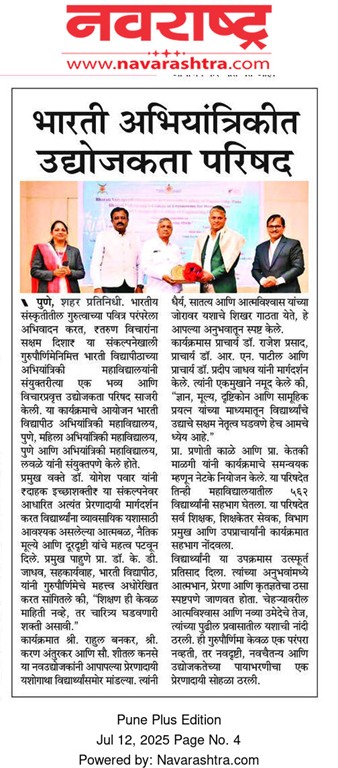
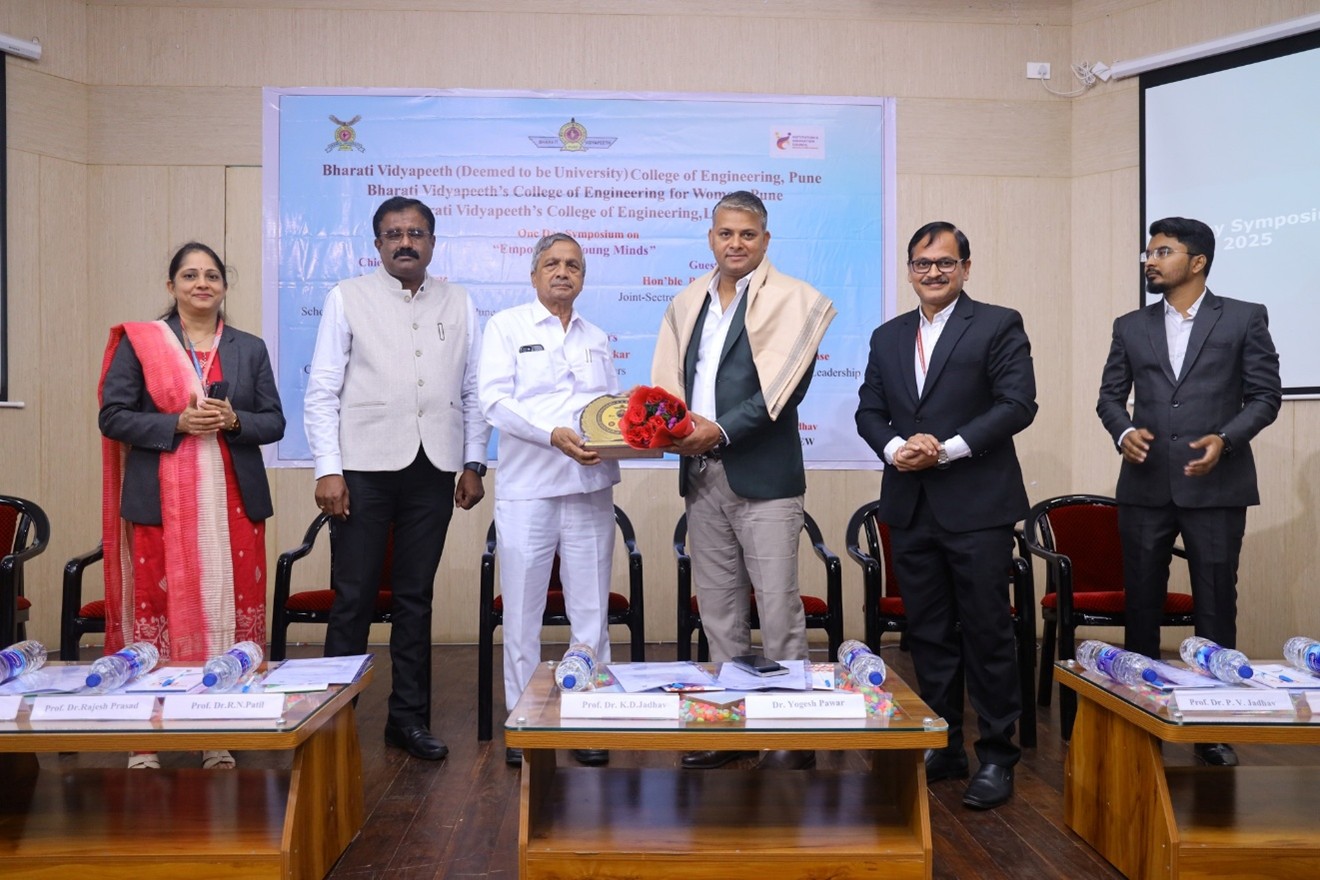
successfully Organized One-Day Symposium on "Empowering Young Minds" Held on: 10th July 2025.
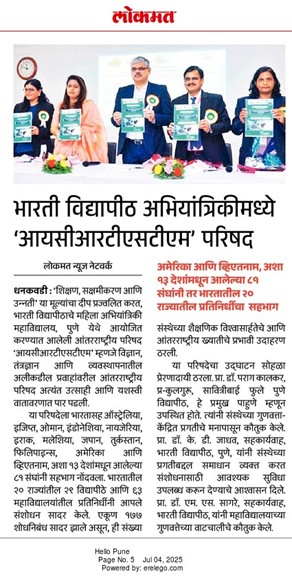
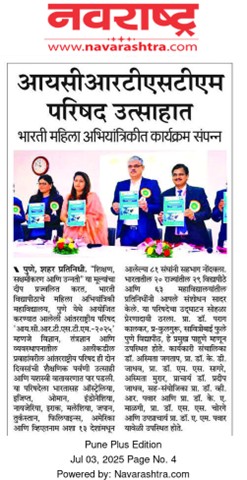
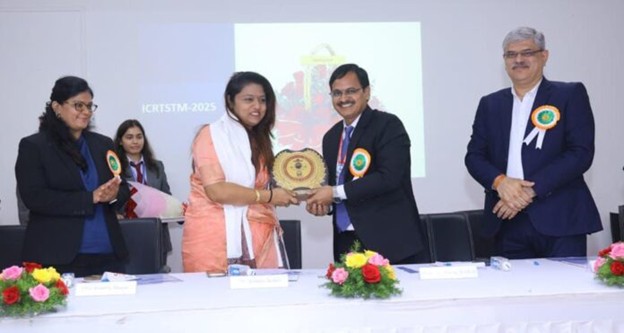
भारती विद्यापीठात आय.सी.आर.टी.एस.टी.एम.- २०२५ परिषद उत्साहात संपन्न
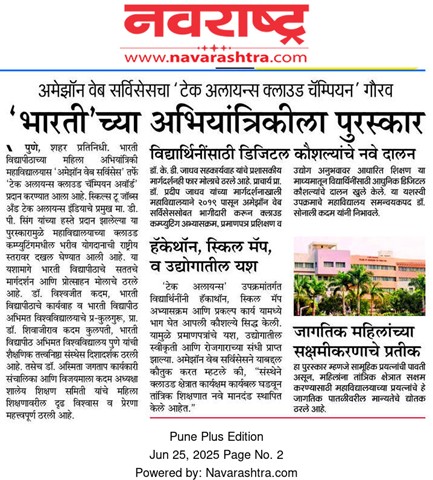
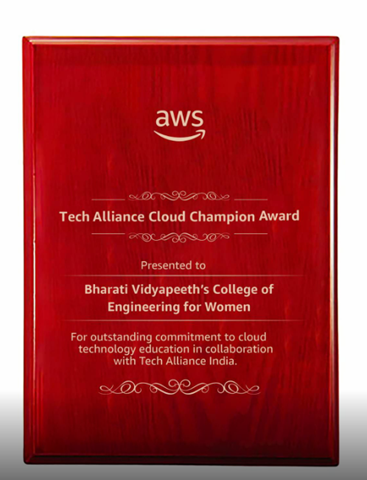
भारती विद्यापीठ महिला अभियांत्रिकी महाविद्यालयाला टेक अलायन्स क्लाउड चॅम्पियन अवॉर्ड
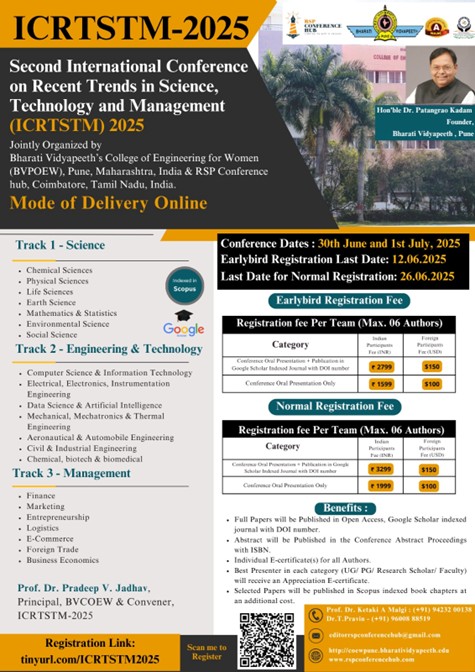
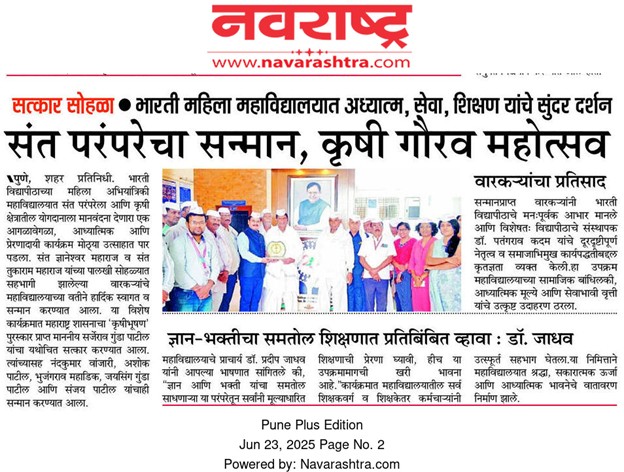
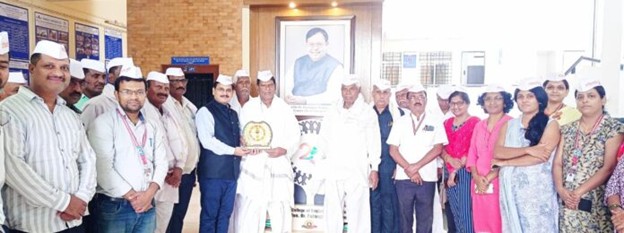
भारती विद्यापीठाच्या महिला अभियांत्रिकी महाविद्यालयात वारकरी सन्मान पुणे : भारती विद्यापीठाच्या महिला अभियांत्रिकी महाविद्यालयात एक आगळावेगळा, आध्यात्मिक आणि प्रेरणादायी असा कार्यक्रम मोठ्या उत्साहात संपन्न झाला. संत ज्ञानेश्वर महाराज व संत तुकाराम महाराज यांच्या पालखी सोहळ्यात सहभागी झालेल्या वारकऱ्यांचे महाविद्यालयाच्या वतीने हार्दिक स्वागत आणि सन्मान करण्यात आला. या वेळी महाराष्ट्र शासनाचा “कृषीभूषण” हा प्रतिष्ठेचा पुरस्कार प्राप्त सत्कारमूर्ती सर्जेराव गुंडा पाटील यांचा विशेष सन्मान करण्यात आला. त्यांच्यासह उपस्थित असलेल्या मान्यवरांमध्ये नंदकुमार वांजारी, अशोक पाटील, भुजंगराव महाडिक, जयसिंग गुंडा पाटील आणि संजय पाटील यांचाही महाविद्यालयाच्या वतीने यथोचित सन्मान करण्यात आला. या याप्रसंगी महाविद्यालयाचे प्राचार्य डॉ. प्रदीप जाधव म्हणाले की, “ज्ञान आणि भक्ती यांचा समतोल साधणाऱ्या या परंपरेतून सर्वांनी मूल्याधारित शिक्षणाची प्रेरणा घ्यावी, हीच यामागची खरी भावना आहे.” कार्यक्रमात महाविद्यालयातील सर्व शिक्षकवृंद आणि शिक्षकेतर कर्मचारी यांनी उत्स्फूर्त सहभाग नोंदवला. कार्यक्रमाच्या निमित्ताने संपूर्ण महाविद्यालय परिसरात श्रद्धा, सकारात्मक ऊर्जा आणि अध्यात्मिक भावनेची लहर निर्माण झाली.
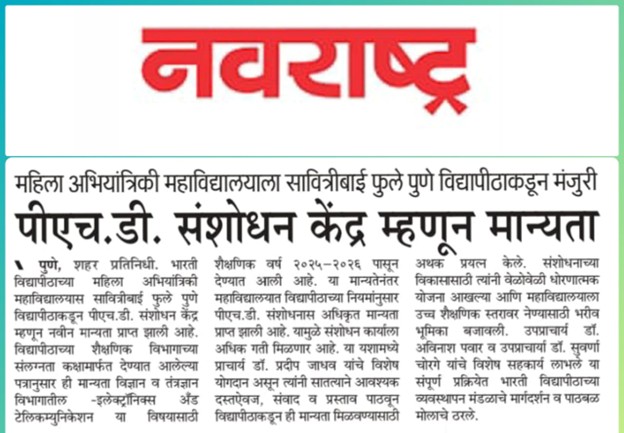
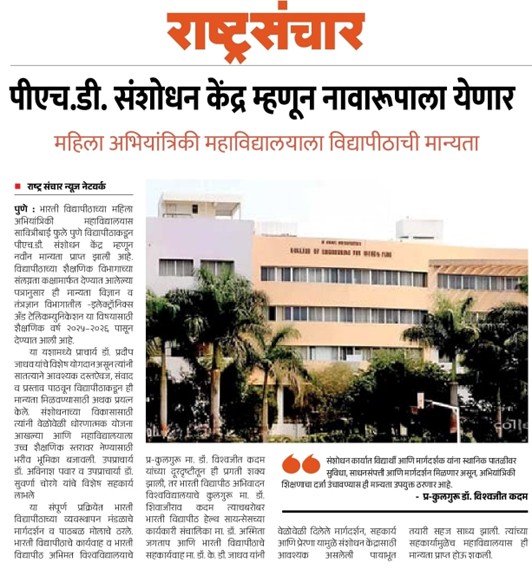
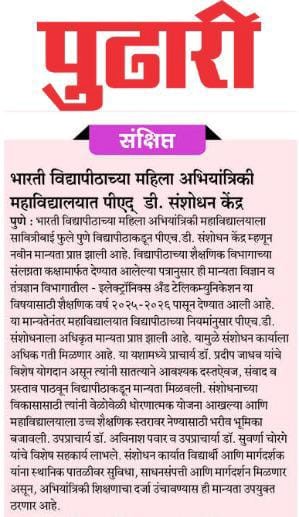
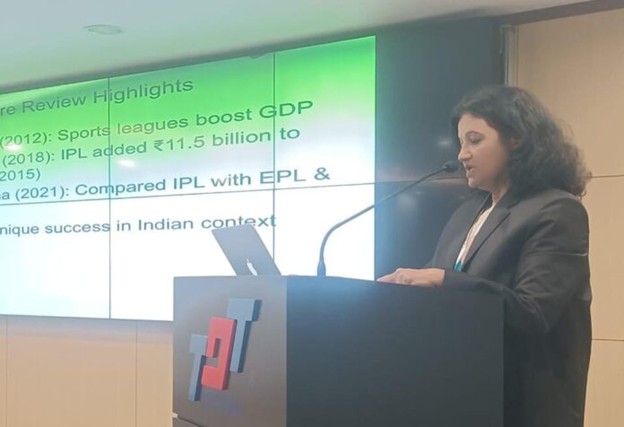
भारती विद्यापीठाच्या महिला अभियांत्रिकी महाविद्यालयाचा जागतिक क्रीडा मंचावर ठसा : डॉ. गौरी पाटील यांचे व्हिएतनाममध्ये भारताचे प्रतिनिधित्व पुणे : भारती विद्यापीठाच्या महिला अभियांत्रिकी महाविद्यालयातील क्रीडा व शारीरिक शिक्षण विभागाच्या संचालिका डॉ. गौरी गजानन पाटील यांनी व्हिएतनाम येथे १२ व १३ जून २०२५ रोजी झालेल्या ‘आंतरराष्ट्रीय क्रीडा विज्ञान परिषद २०२५’ मध्ये भारताचे प्रभावी प्रतिनिधित्व केले. “तंत्रज्ञान, शाश्वतता आणि क्रीडामधील सर्वांगीण आरोग्य” या मुख्य विषयाभोवती केंद्रित असलेल्या या परिषदेत जगभरातील नामवंत तज्ज्ञ, संशोधक आणि शिक्षणतज्ज्ञ एकत्र आले होते.या प्रतिष्ठित व्यासपीठावर डॉ. गौरी पाटील यांनी “व्यावसायीकरणाच्या माध्यमातून भारताच्या क्रीडा अर्थव्यवस्थेतील वाढीमध्ये आयपीएल क्रिकेटची भूमिका” या विषयावर सखोल आणि अभ्यासपूर्ण शोधनिबंध सादर केला. त्यांच्या अभ्यासास सर्वत्र भरभरून दाद मिळाली. त्यांनी आपल्या सादरीकरणात इंडियन प्रीमियर लीग (आय पी एल) कशा प्रकारे रोजगारनिर्मिती, पायाभूत सुविधा उभारणी, पर्यटनवाढ, युवकांचा सहभाग आणि संलग्न क्षेत्रांतील संधी निर्माण करून देशाच्या आर्थिक वाढीचा वाहक ठरत आहे, हे प्रभावीपणे मांडले. तसेच, आयपीएलच्या प्रेरणेने कबड्डी, फुटबॉल आणि हॉकीसारख्या अन्य क्रीडा प्रकारांतही व्यावसायिक लीगची निर्मिती होऊन भारतात बहुक्रीडा संस्कृतीला चालना मिळाल्याचे त्यांनी विशद केले. या आंतरराष्ट्रीय गौरवामागे महाविद्यालयाचे प्राचार्य डॉ. प्रदीप जाधव यांचे मार्गदर्शन व प्रोत्साहन, उपप्राचार्य डॉ. अविनाश पवार, उपप्राचार्या डॉ. सुवर्णा चोरगे यांचे सहकार्य, तसेच सर्व शिक्षक व शिक्षकेतर कर्मचाऱ्यांचे सामूहिक सहकार्य महत्त्वाचे ठरले. त्यांनी दिलेल्या पाठबळामुळे आंतरराष्ट्रीय स्तरावरील सादरीकरण शक्य झाले.
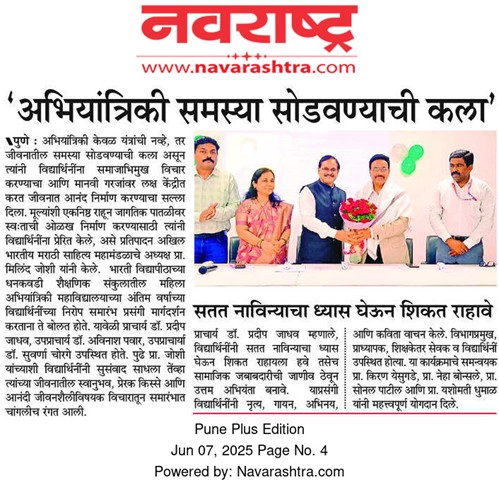
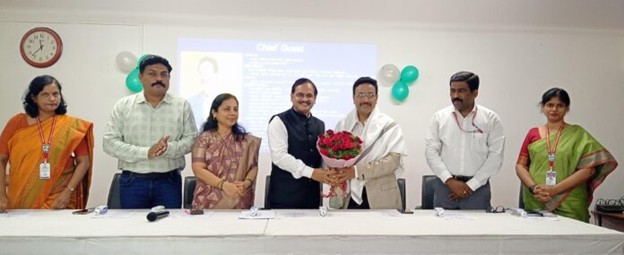
अभियांत्रिकी ही केवळ यंत्रांची नव्हे, तर माणसांच्या समस्या सोडवण्याची कला आहे — प्रा. मिलिंद जोशी पुणे : भारती विद्यापीठाच्या महिला अभियांत्रिकी महाविद्यालयात अंतिम वर्षाच्या विद्यार्थिनींचा निरोप समारंभ प्रेरणादायी आणि भावूक वातावरणात पार पडला. या प्रसंगी कार्यक्रमाचे प्रमुख आकर्षण ठरले ते नामवंत लेखक, प्रसिद्ध वक्ते आणि अखिल भारतीय मराठी साहित्य महामंडळाचे अध्यक्ष मा. प्रा. मिलिंद जोशी यांचे विचारप्रवण भाषण. मा. प्रा.मिलिंद जोशी म्हणाले, “अभियांत्रिकी ही केवळ यंत्रांची नव्हे, तर माणसांच्या समस्या सोडवण्याची कला आहे.” त्यांनी विद्यार्थिनींना समाजाभिमुख विचार करण्याचा आणि मानवी गरजांवर लक्ष केंद्रीत करत नवोन्मेष करण्याचा सल्ला दिला. मूल्यांशी निष्ठावान राहून जागतिक पातळीवर आपली ओळख निर्माण करण्यासाठी त्यांनी उपस्थितांना प्रोत्साहित केले. कार्यक्रमाच्या अध्यक्षस्थानी प्राचार्य प्रा. डॉ. प्रदीप जाधव होते. आपल्या मनोगतात त्यांनी विद्यार्थिनींना सतत शिकत राहण्याचा सल्ला दिला आणि सामाजिक जबाबदारीची जाणीव ठेवून उत्तम अभियंते बनण्याचे आवाहन केले.
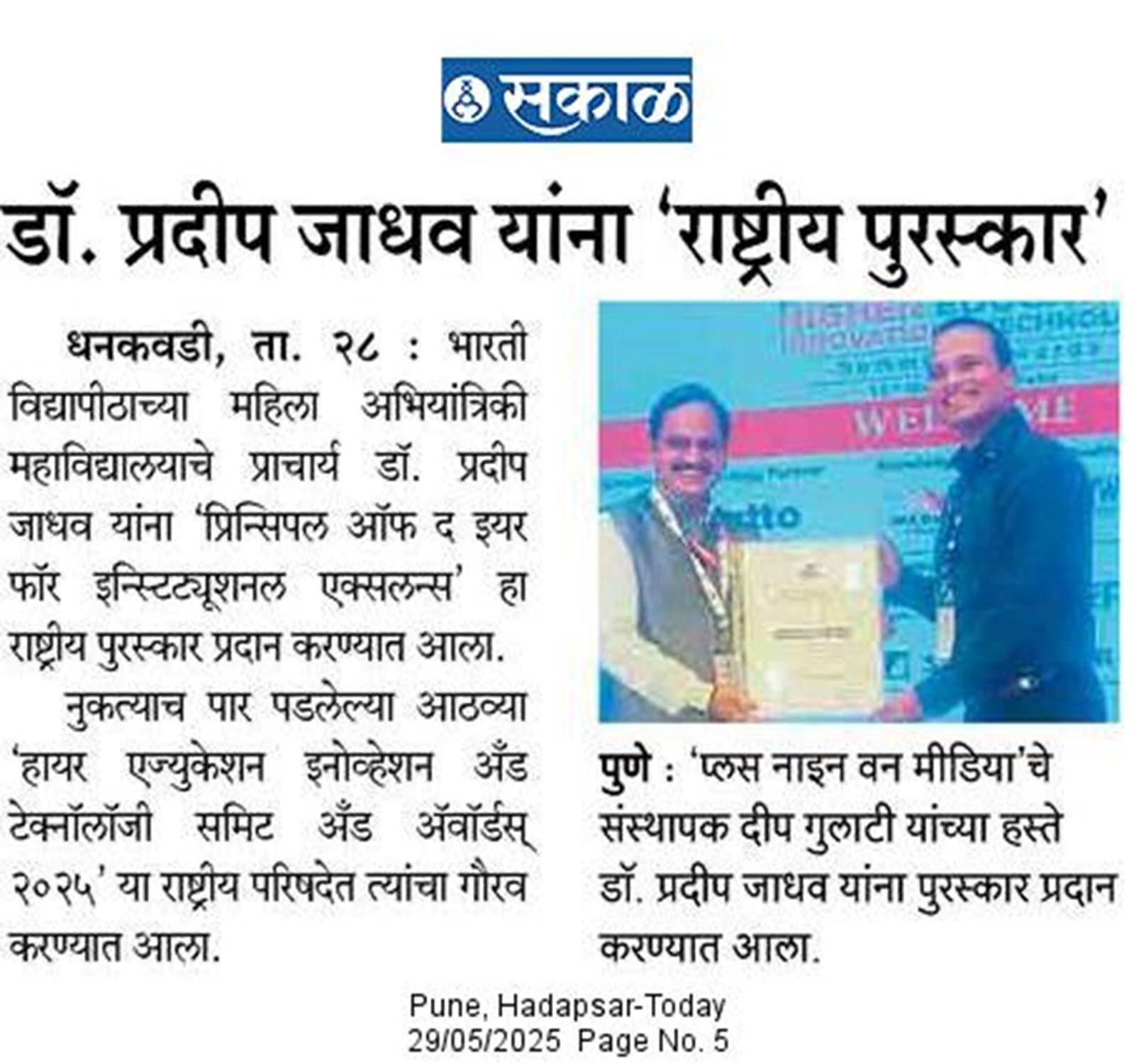

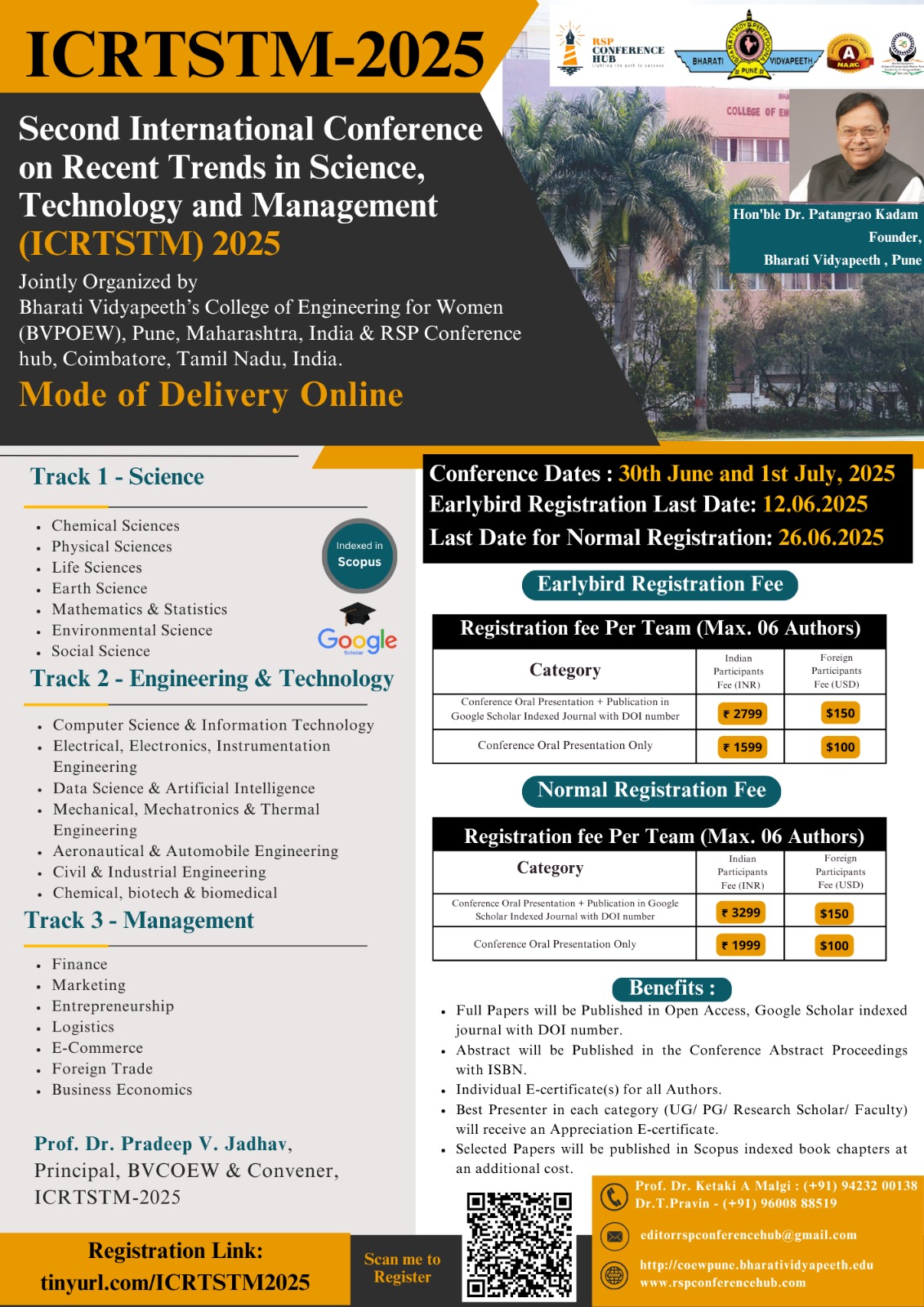
ICRTSTM - 2025



Heartfelt Congratulations to Our Principal Dr. Pradeep Jadhav Sir on Receiving the 'Principal of the Year Award' at HEIT Summit 2025. It is with immense pride and pleasure that we share a remarkable moment of recognition for our institution.
Our esteemed Principal, Prof. Dr. Pradeep Jadhav, of Bharati Vidyapeeth College of Engineering for Women, Pune, has been honoured with the ‘Principal of the Year Award for Institutional Excellence’ at the 8th Higher Education Innovation & Technology (HEIT) Summit & Awards 2025, held on 15 May 2025 in Pune.
The HEIT Summit is a prestigious national-level platform that brings together leaders in education, technology and policy. Organised by PlusNineOne Media in collaboration with NCVET and Skill India, it celebrates innovation, visionary leadership and excellence in the higher education sector.
Principal Dr. Pradeep Jadhav Sir received this distinguished award in recognition of his inspiring leadership, forward-thinking vision and steadfast commitment to academic growth and quality education.
We are also pleased to share that Prof. Pranoti Kale and Prof. Dr. Ketaki Malgi actively participated in the round table discussion during the summit, contributing valuable insights and representing our institution with great enthusiasm.
This recognition is not only a personal honour for Principal Jadhav but also a proud moment for all of us. It reflects the values we uphold as an institution and encourages us all to continue striving towards excellence in everything we do.
Please join us in congratulating Principal Dr. Pradeep Jadhav, Prof. Kale and Prof. Malgi on their commendable contributions and achievements.
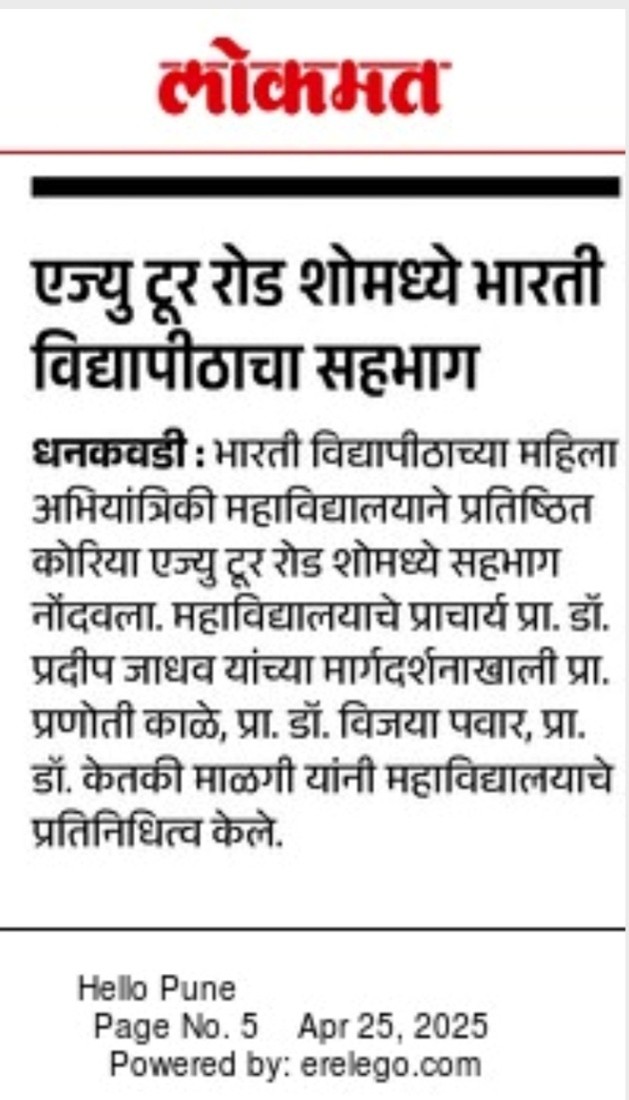
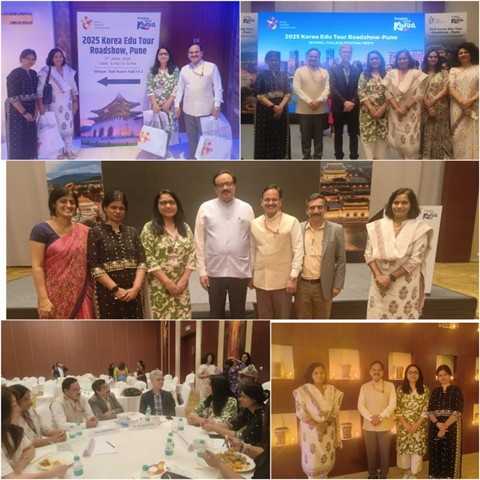
We are delighted to share that our team from Bharati Vidyapeeth’s College of Engineering for Women, Pune actively participated in the prestigious Korea Edu Tour Roadshow, organized by the Korea Tourism Organization (KTO). The event served as a dynamic platform for distinguished academic and administrative leaders to explore educational opportunities and collaborative avenues between India and South Korea.
Under the leadership of Principal Prof. Dr. Pradeep V. Jadhav Sir, our college was proudly represented by Prof. Pranoti Kale, Dr. Vijaya Pawar, and Dr. Ketaki Malgi.

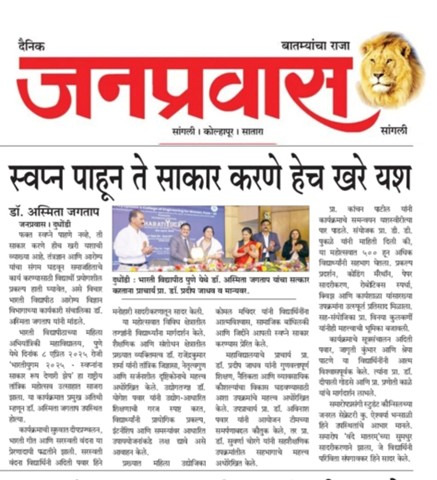


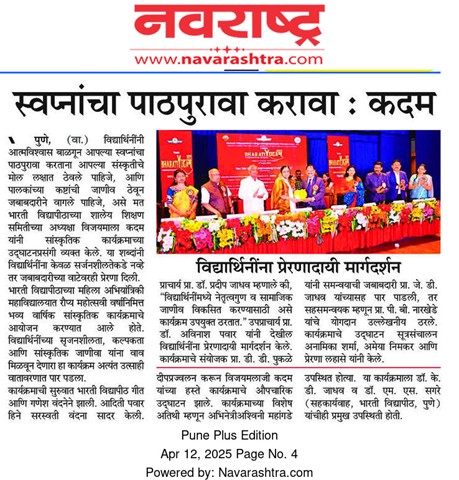
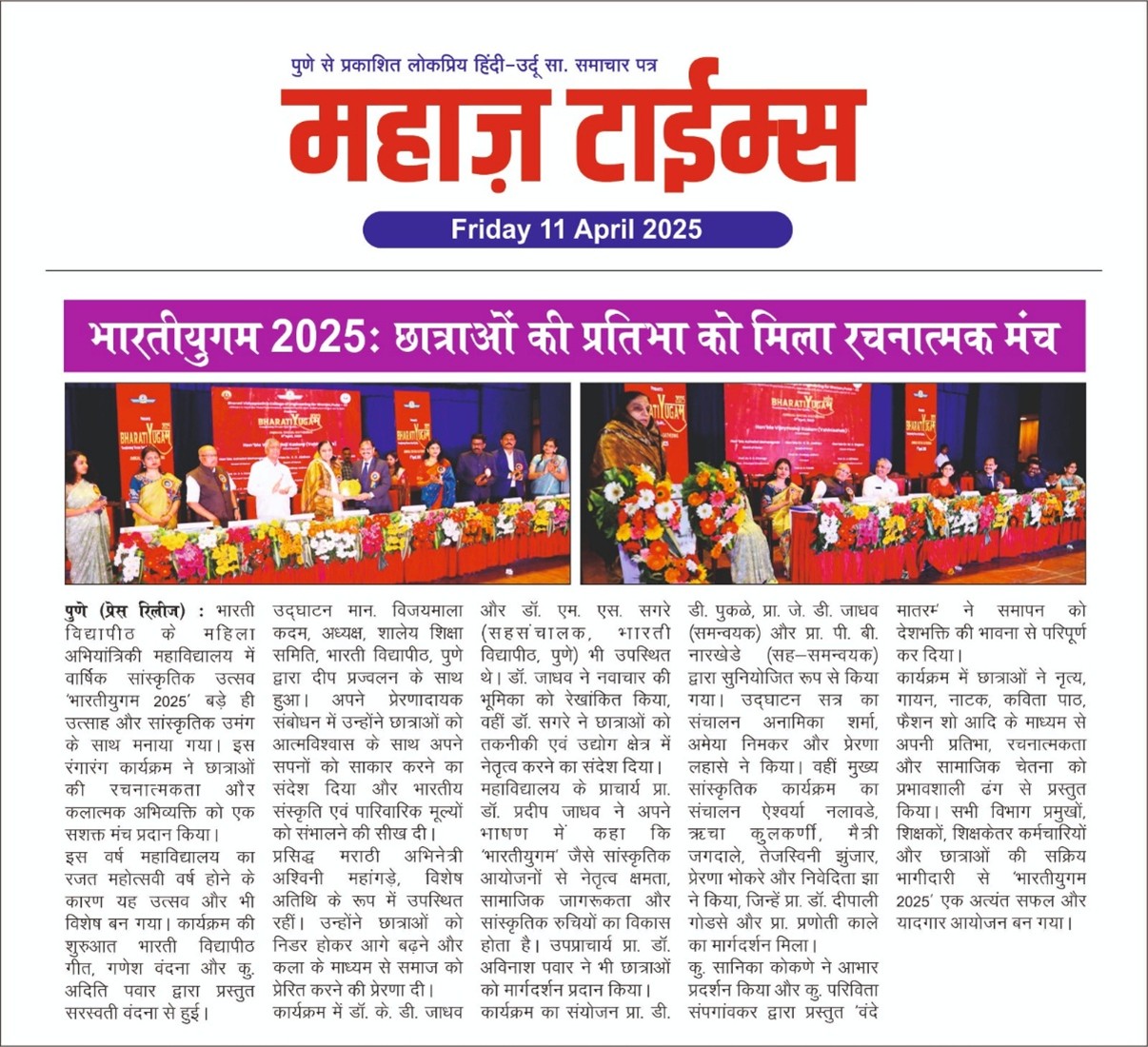
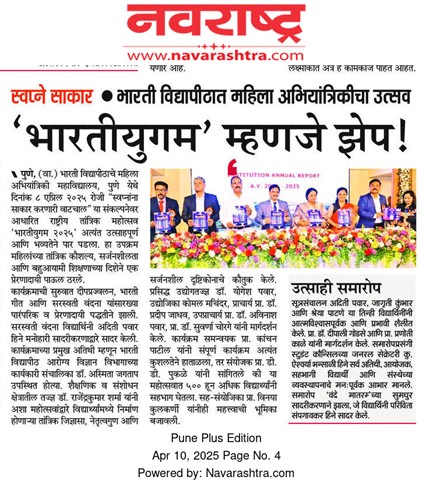

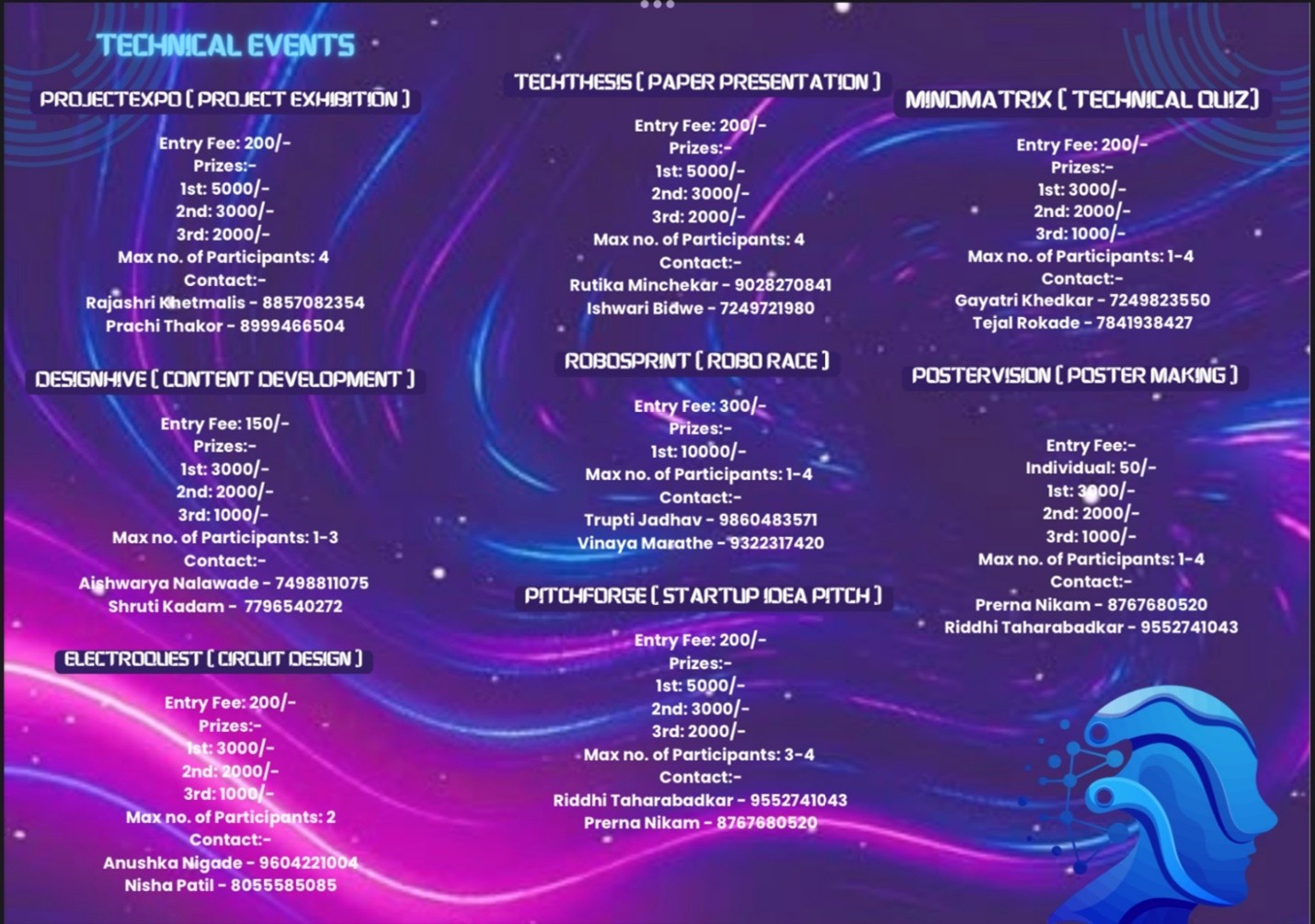
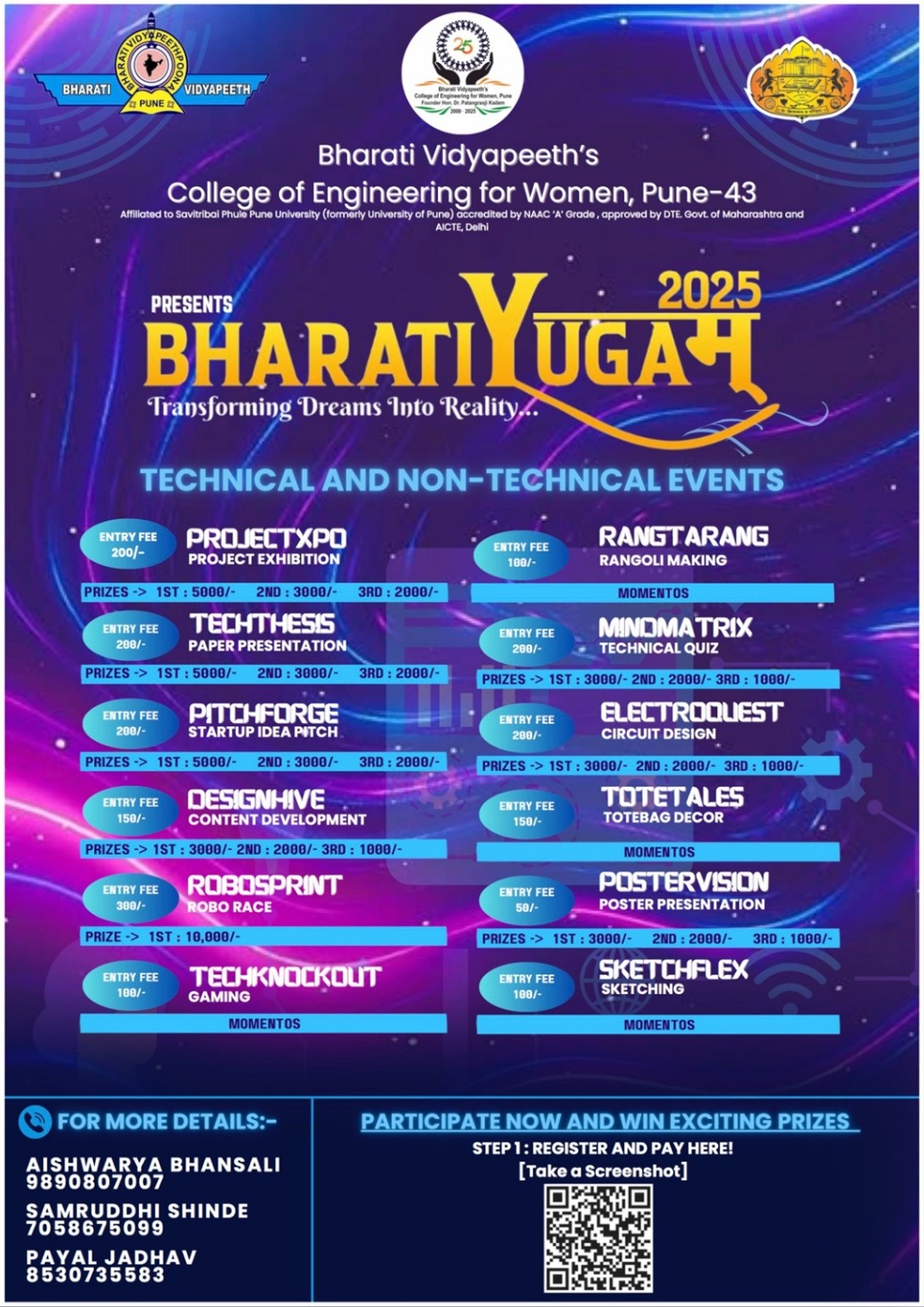
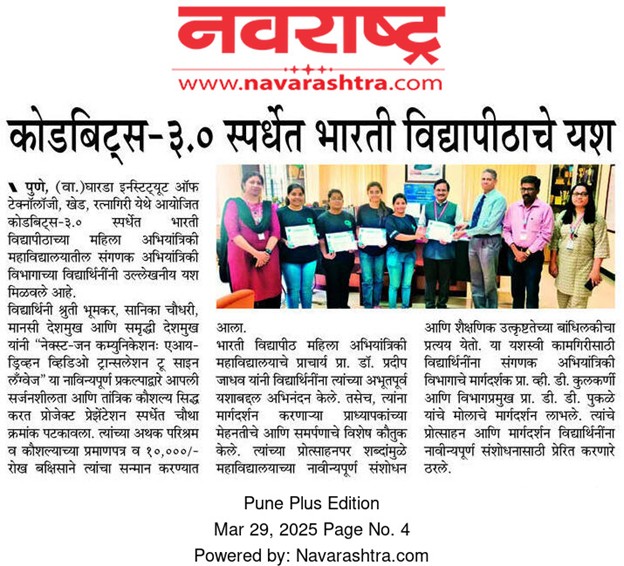
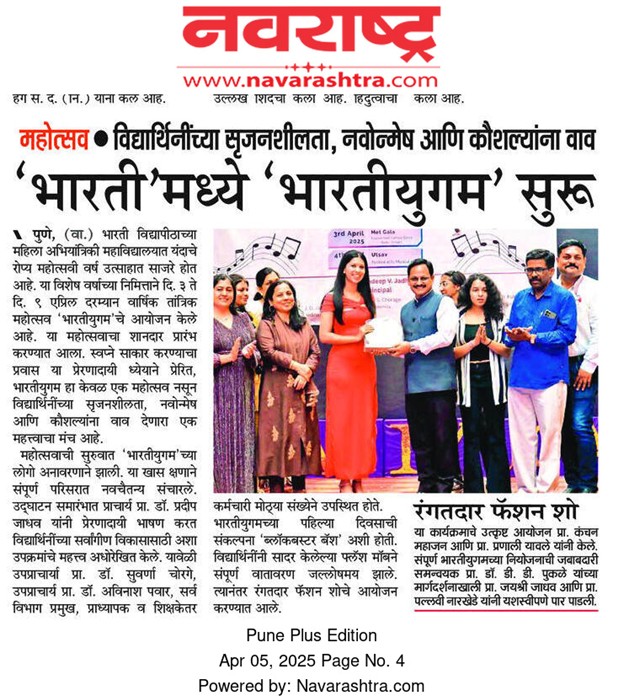
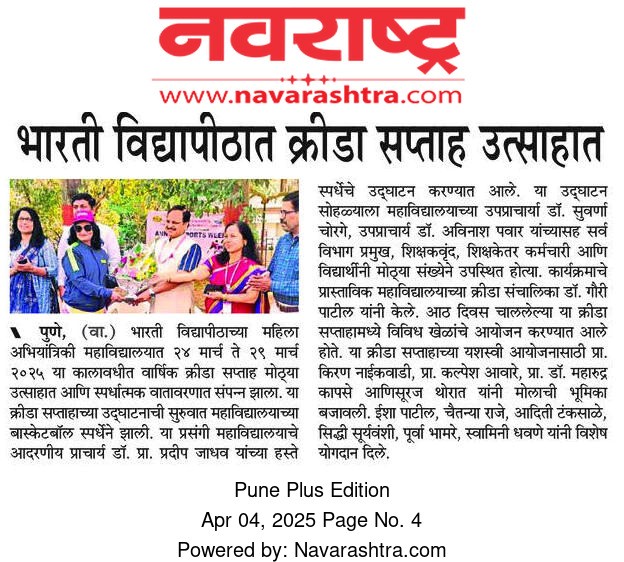
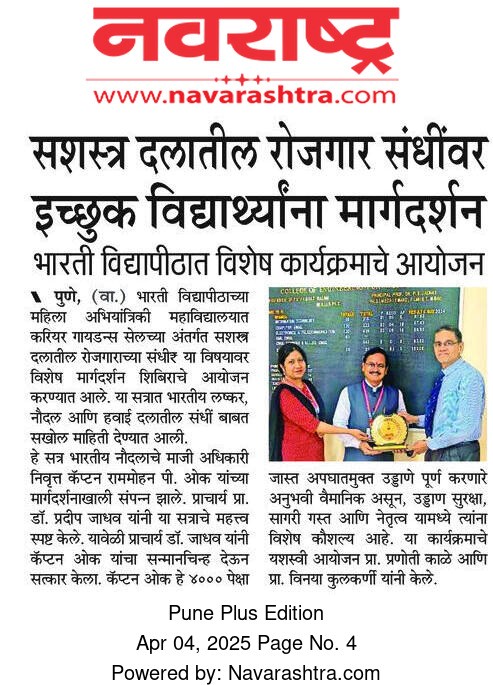
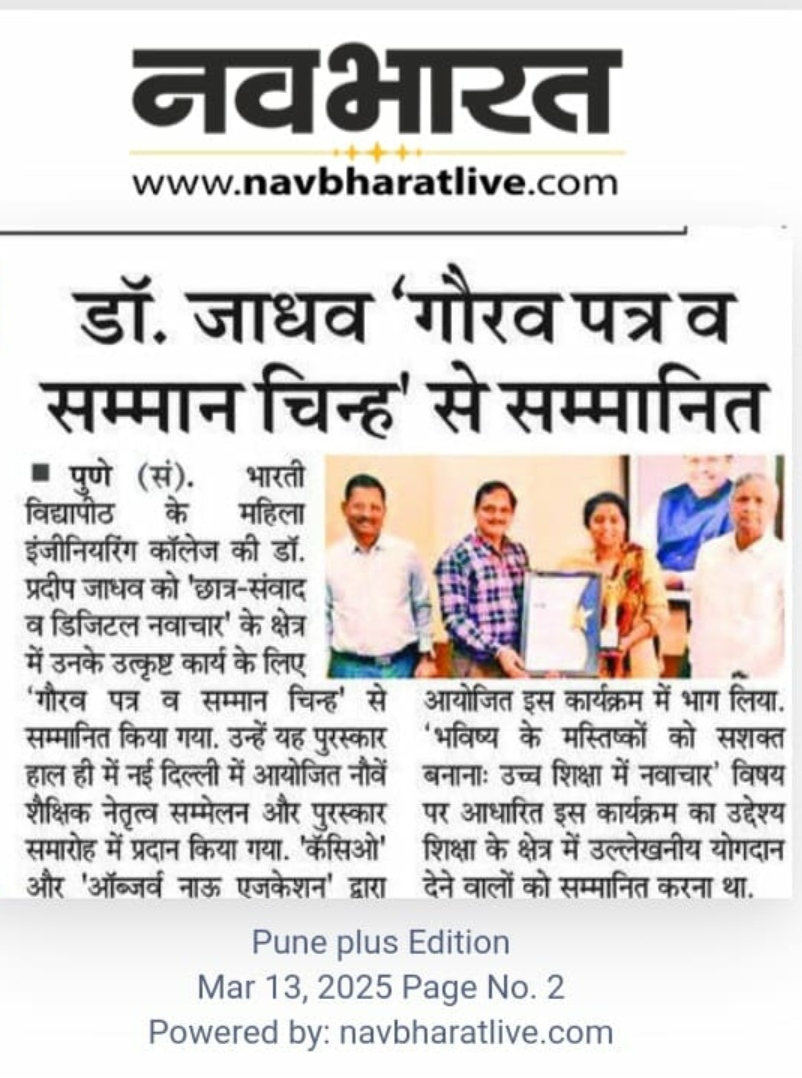
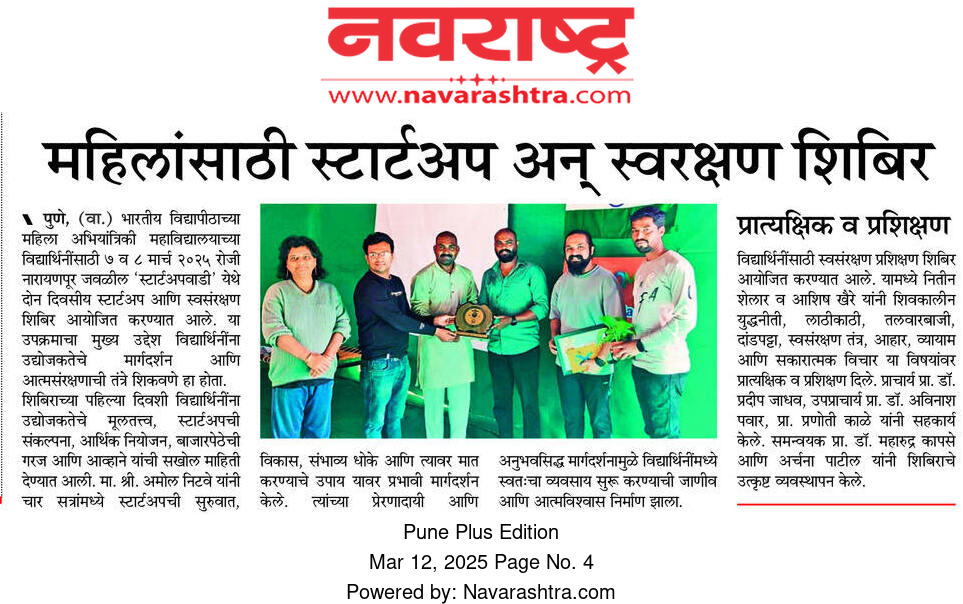
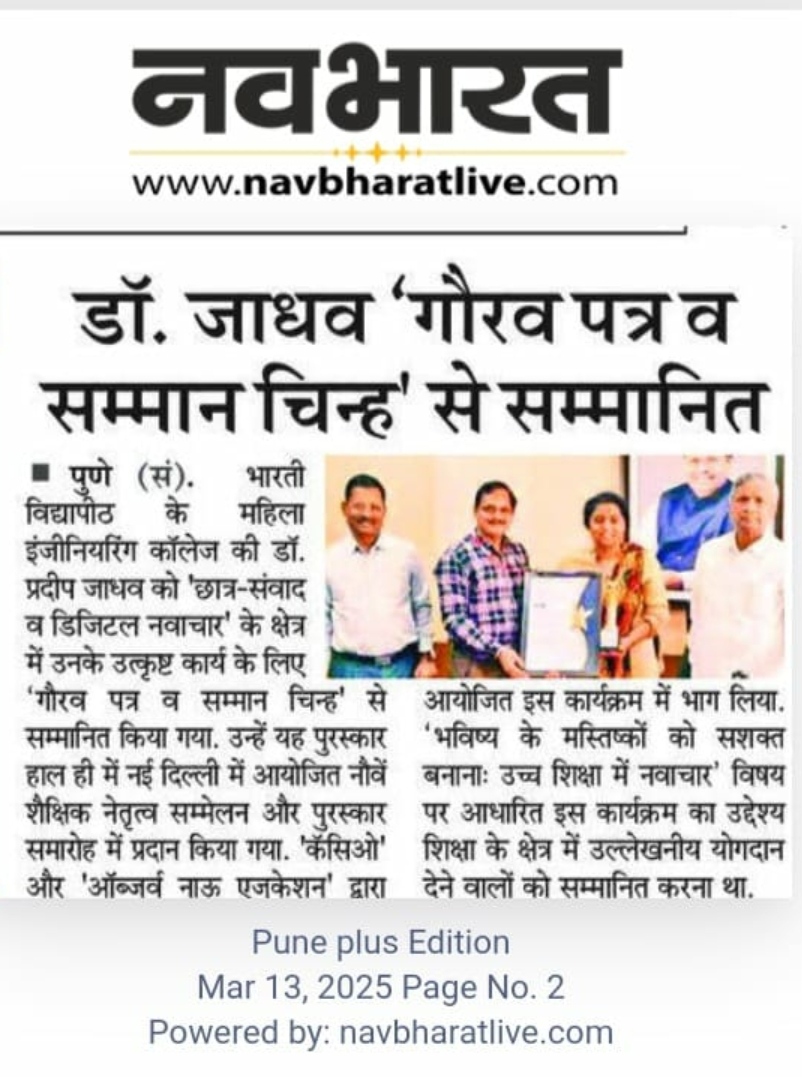
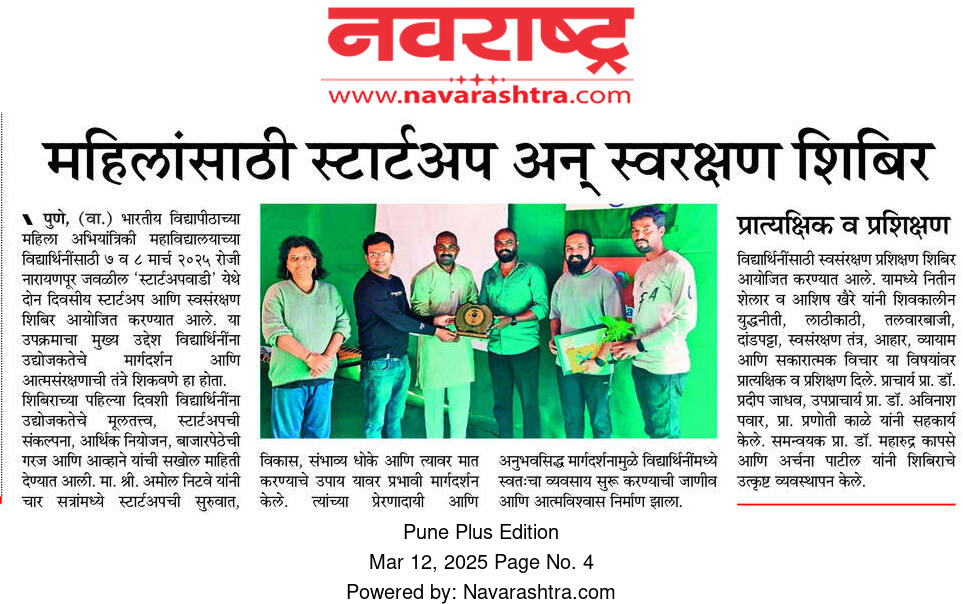
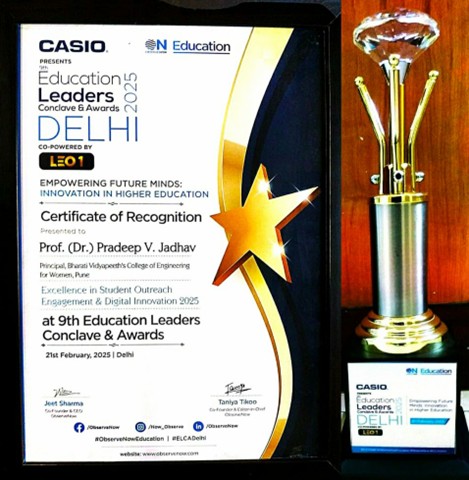
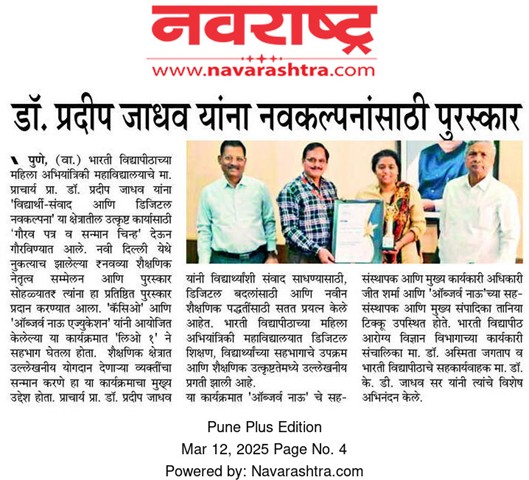
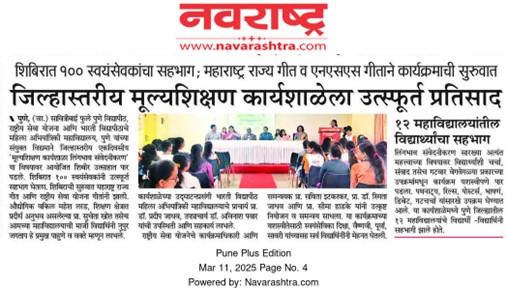
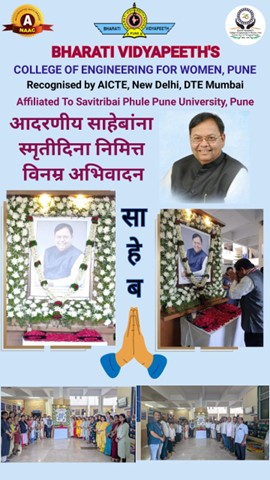
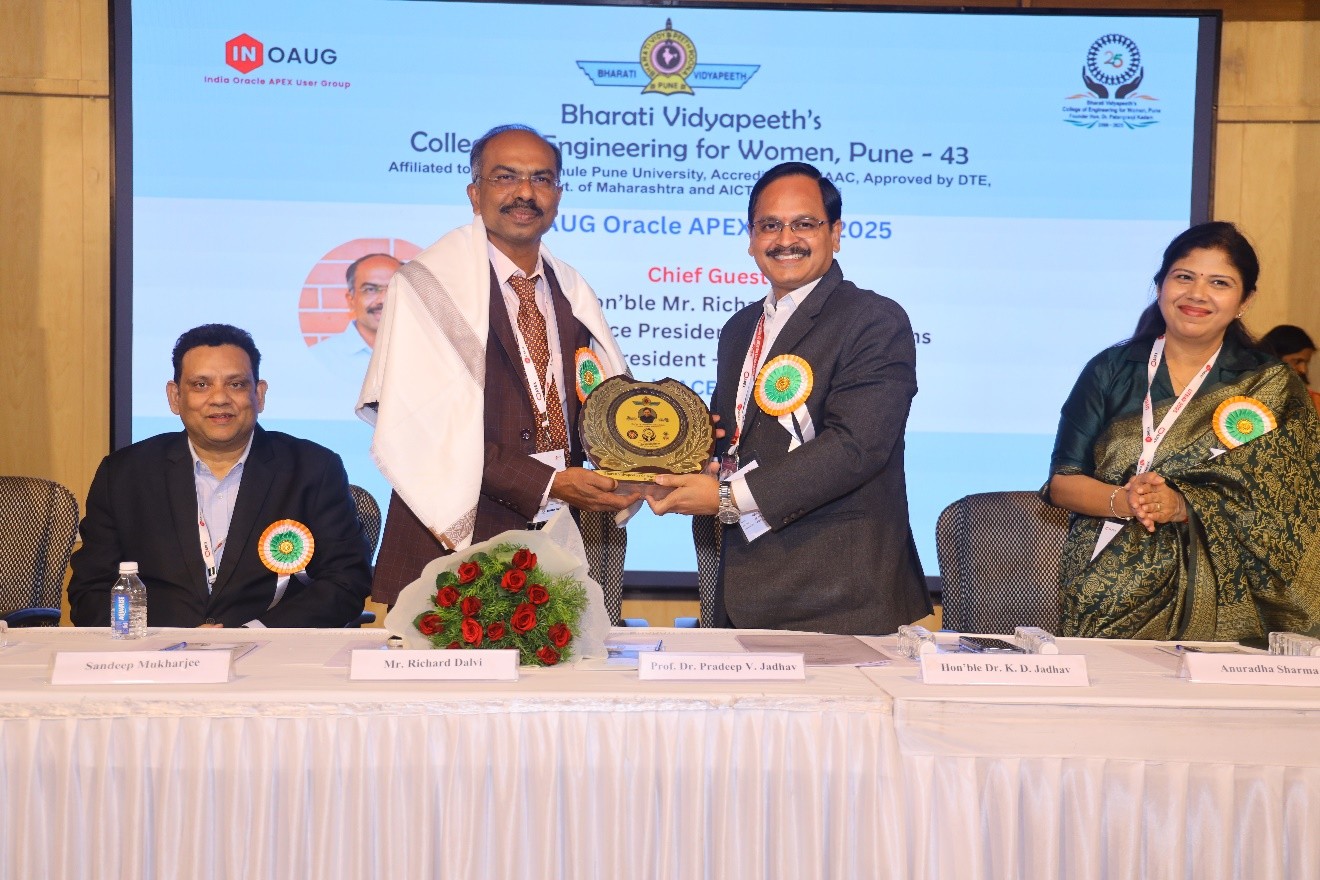
INOAUG’s Oracle APEX Utsav 2025
INOAUG’s Oracle APEX Utsav 2025, hosted by Bharati Vidyapeeth’s College of Engineering for Women, Pune, in collaboration with INOAUG and Oracle, on Saturday, March 8, 2025.
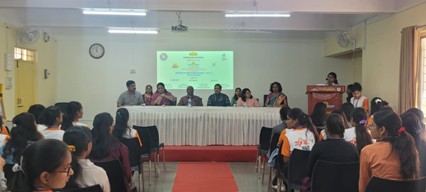
पुणे : सावित्रीबाई फुले पुणे विद्यापीठ, राष्ट्रीय सेवा योजना आणि भारती विद्यापीठाचे महिला अभियांत्रिकी महाविद्यालय, पुणे यांच्या संयुक्त विद्यमाने जिल्हास्तरीय एकदिवसीय मूल्यशिक्षण कार्यशाळा “लिंगभाव संवेदनीकरण” या विषयावर आयोजित करण्यात आली. या एकदिवसीय शिबिरात १०० स्वयंसेवकांनी उत्स्फूर्त सहभाग घेतला. शिबिराची सुरुवात महाराष्ट्र राज्य गीत आणि राष्ट्रीय सेवा योजना गीत सादर करून झाली. सुप्रसिद्ध औद्योगिक वकिल श्री. महेश लाड, शिक्षण क्षेत्रात प्रदीर्घ अनुभव असलेल्या प्रा. सुचेता खोत तसेच आमच्या महाविद्यालयाची माजी विद्यार्थिनी नुपुर जगताप हे प्रमुख पाहुणे व वक्ते म्हणून लाभले. लिंगभाव संवेदनीकरण सारख्या अत्यंत महत्त्वाच्या विषयावर विद्यार्थ्यांशी चर्चा, संवाद तसेच गटवार वेगवेगळ्या प्रकारच्या उपक्रमांमधून कार्यक्रम यशस्वीपणे पार पडला. पथनाट्य, रिल्स, पोस्टर्स, भाषणं, डिबेट, गटचर्चा यांसारखे उपक्रम घेण्यात आले. या कार्यशाळेमध्ये पुणे जिल्ह्यातील १२ महाविद्यालयांचे विद्यार्थी -विद्यार्थिनी सहभागी झाले होते.
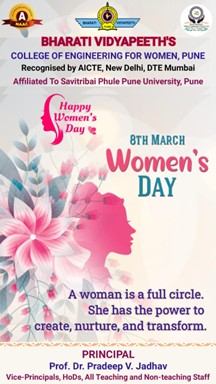
Invitation to INOAUG APEX Utsav 2025 & Oracle Academy Meet at BVCOEW, Pune-43
Hon'ble Respected Sir,
We are delighted to invite you to INOAUG APEX Utsav 2025 - Pune Edition, proudly hosted at Bharati Vidyapeeth's College of Engineering for Women, Pune on Saturday, 8th March 2025.
This prestigious conference, is a part of a nationwide series across six cities which brings together Oracle APEX enthusiasts, industry leaders, Oracle ACEs, and innovators for a day filled with insightful sessions, hands-on learning, and exceptional networking opportunities with the Oracle community.
In addition to the conference, we are also hosting a special Oracle Academy Meet, where faculties will have the opportunity to explore collaborative programs, certifications, and academic resources offered by Oracle Academy.
Furthermore, to enrich the learning experience, BVCOEW is organizing a One-Day Symposium on “Oracle APEX Certification: Enhancing Skills, Advancing Careers, and Navigating Training Paths.” This symposium will dive deeper into the future of Oracle technologies and career advancement through certifications, with valuable insights from industry experts.
Event Details:
Date: Saturday, 8th March 2025
Time: 8:30 AM onwards
Venue: Bharati Vidyapeeth’s College of Engineering for Women, Pune-43
We cordially invite your esteemed presence for this enriching and prestigious gathering that brings academia, industry, and the Oracle community under one roof.
We look forward to welcoming you to APEX Utsav 2025, the Oracle Academy Meet, and the Symposium at BVCOEW, Pune.
Warm Regards,
Prof. Dr. Pradeep V. Jadhav
Convener & Principal,
BVCOEW, Pune-43
BVCOEW Alumni Meet 2025
Alumni Association is thrilled to invite you to the Alumni Meet scheduled on April 5th, 2025, as part of the Silver Jubilee Year Celebration. Please confirm your attendance by filling out the following details. Your response will help us in organizing a memorable and meaningful event.
Link :- Click here
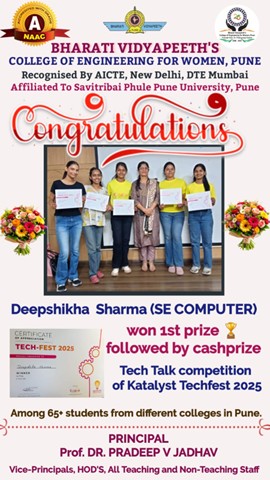
Deepika Sharma (SE Computer) Won 1st Prize in Tech Talk Competition of Katalyst Techfest 2025
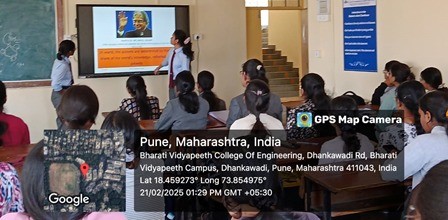
Creating Awareness of the KAPILA Scheme among Students The Student Club of Innovation and Entrepreneurship (I&E) of our institution has successfully organized an Awareness Session on KAPILA (Kalam Program for IP Literacy and Awareness) on Friday, 21st February 2025, from 12:30 PM to 1:30 PM. The session was conducted by student members for the ES&AE students.
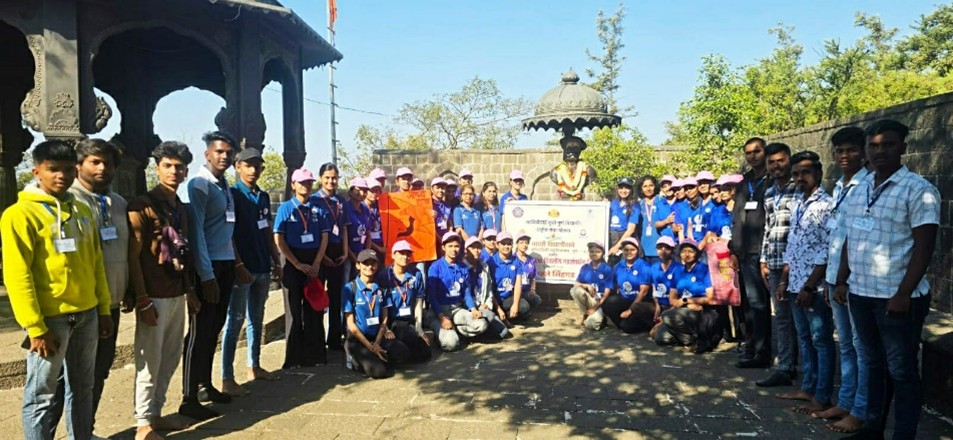
Fort Sinhagad Cleanliness Campaign: District level fort conservation workshop concluded Pune: A district level fort conservation camp was organized at Fort Sinhagad jointly with Savitribai Phule Pune University, National Service Scheme and Women Engineering College of Bharti University, Pune. 50 volunteers spontaneously participated in this one day camp.
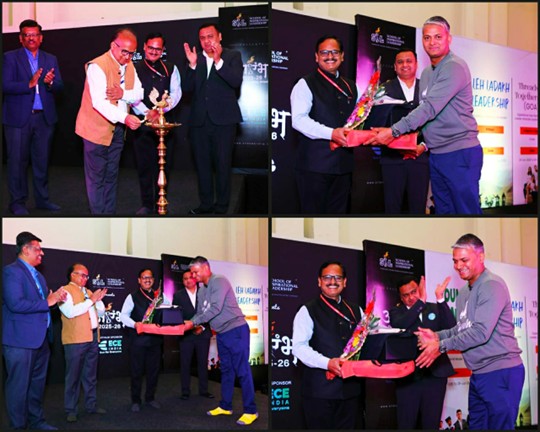
Aarambh 2025: A Grand Success with Leadership and Vision
Pune: On 18th February 2025, the School of Inspirational Leadership (SIL) hosted its flagship event, Aarambh 2025, at The Orchid Hotel, Balewadi, Pune. The event was inaugurated by the esteemed Principal of Bharati Vidyapeeth’s College of Engineering for Women, Pune, Dr. Pradeep V. Jadhav, who graced the occasion as the Chief Guest. Aarambh 2025 is a pioneering initiative aimed at empowering Micro, Small and Medium Enterprises (MSMEs) by providing strategic planning insights and vision-building tools for the financial year. The event witnessed the participation of over 150+ business leaders, engaging in expert-led sessions, interactive discussions and hands-on budget planning to develop a comprehensive Annual Operating Plan (AOP) for their businesses.
The inauguration commenced with a traditional Diya Lighting Ceremony symbolizing the beginning of a journey towards growth and sustainability for MSMEs. In his keynote address, Principal Prof. Dr. Pradeep Jadhav emphasized the significance of structured planning and innovation in business. He highlighted the role of leadership and education in fostering entrepreneurship and sustainable development in the MSME sector.
Adding to the grandeur of the event, Prof. Dr. Rajesh Prasad, Principal of Bharati Vidyapeeth’s College of Engineering, Pune and Dr. Atul Balwant Ayare, an esteemed academician and industry expert, were present to extend their support and insights. Both leaders commended SIL for organizing a transformative platform that bridges the gap between industry and academia. Their presence further strengthened the event’s impact, inspiring participants to embrace strategic planning and continuous learning.
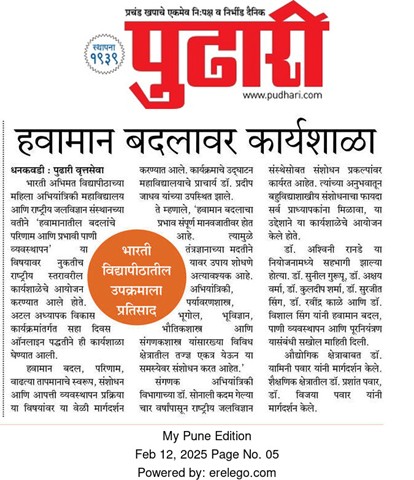
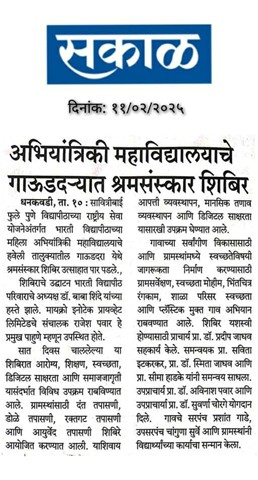
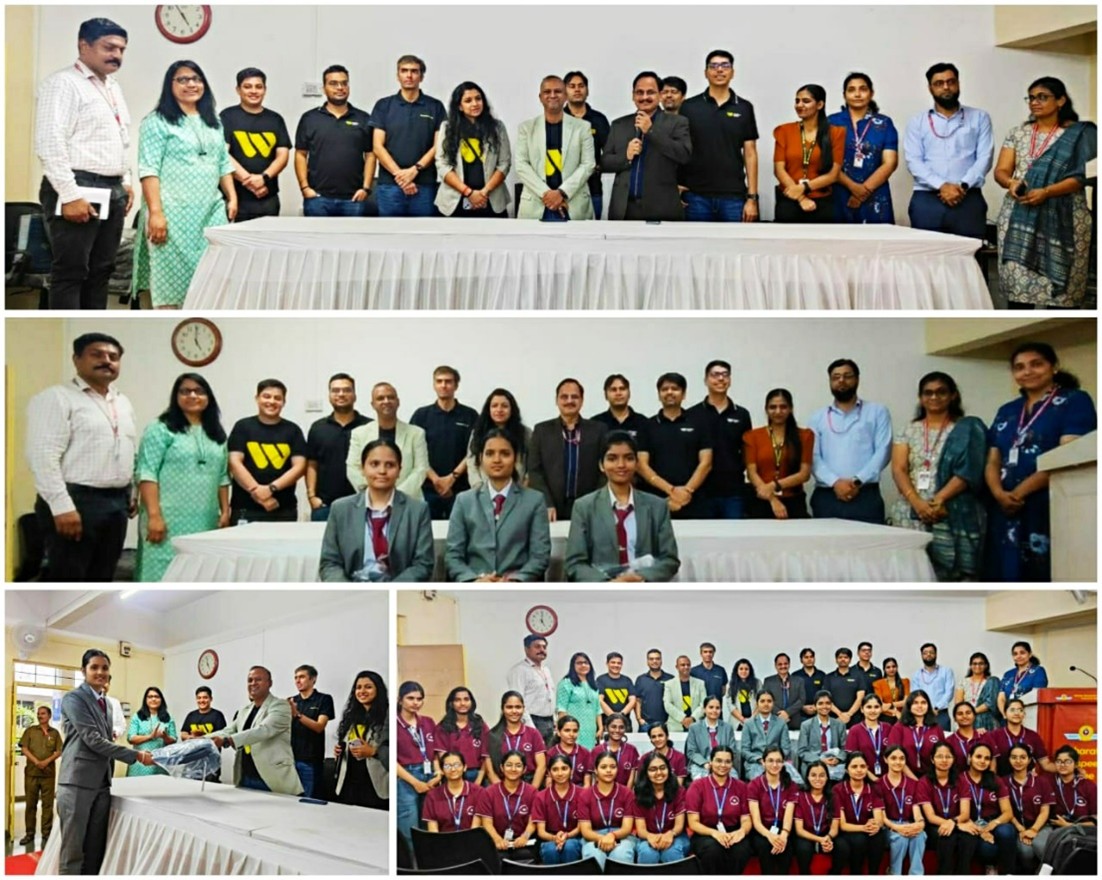
Three Bharati Vidyapeeth's College of Engineering for Women, Pune, Students Secure Prestigious Placements at Western Union! Pune: On 7th February 2025, Bharati Vidyapeeth’s College of Engineering for Women, Pune, continued its legacy of academic and professional excellence by providing outstanding placement opportunities for its students. In yet another proud moment, three talented students from the institution have secured placements at Western Union, a globally renowned financial services company.
The Placement Cell of Bharati Vidyapeeth's College of Engineering for Women, Pune, organized a campus recruitment drive for Western Union. The event aimed to connect students with one of the world’s most reputed financial organizations, offering them a platform to begin their professional journey with an industry leader. The placement drive witnessed the presence of key faculty members, including Prof. Dr. Pradeep Jadhav, Principal of Bharati Vidyapeeth's College of Engineering for Women, Pune, Prof. Dr. Avinash Pawar, Vice Principal (Administration), Prof. Pranoti Kale, Placement Coordinator and Prof. Dr. Rameez Shamalik, Electronics & Telecommunication Department Coordinator. Representing Western Union at the event was Mr. Sonu Rajan Nair, HR at Western Union, along with his team.
Western Union, founded in 1851 as the New York and Mississippi Valley Printing Telegraph Company, has evolved into a global leader in financial services, specializing in money transfers, payments and foreign exchange services. With its strong presence across digital and physical platforms, the company is recognized for its commitment to security, reliability and convenience, making financial transactions seamless across borders.
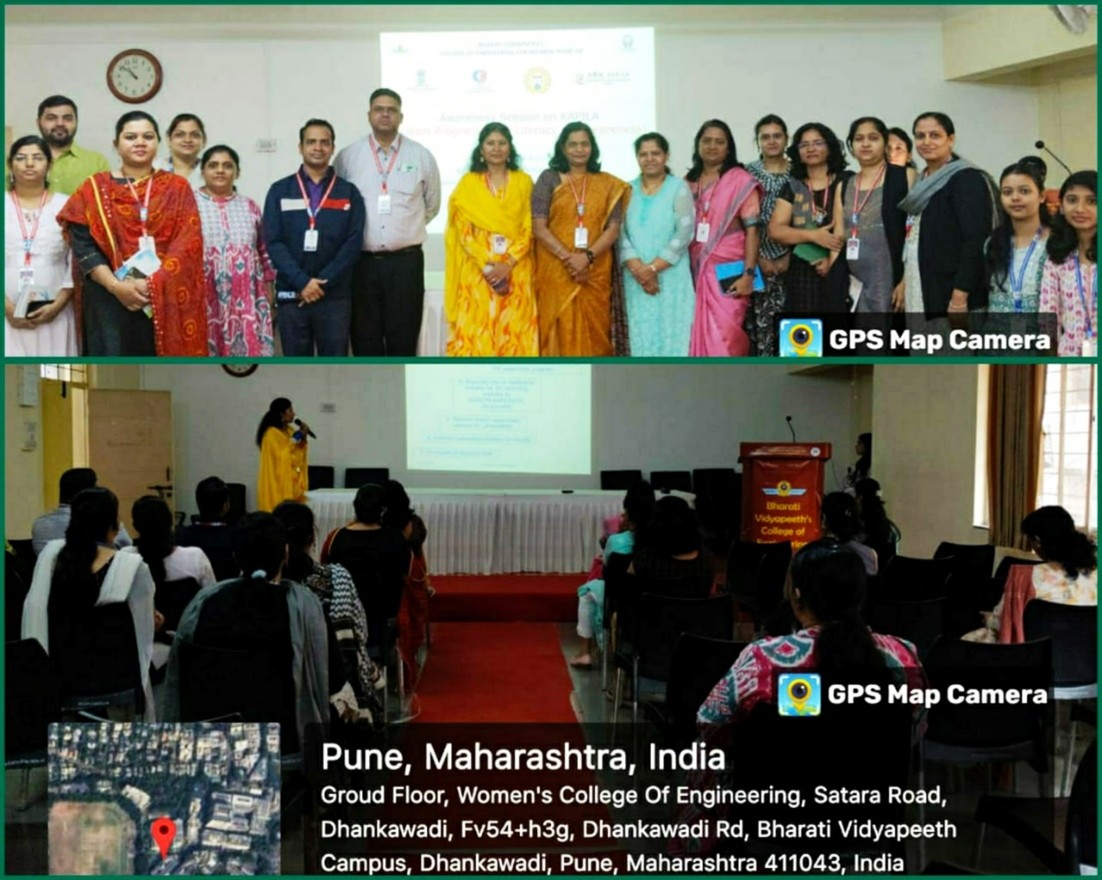
Encouraging Innovation: Awareness Session on KAPILA Scheme
Pune: The IPR Cell and KAPILA Cell of Bharati Vidyapeeth's College of Engineering for Women successfully organized an Awareness Session on KAPILA (Kalam Program for IP Literacy and Awareness) on Saturday, 8th February 2025, from 10:00 AM to 11:00 AM in the seminar hall. The session was conducted by Prof. Dr. Sharada Kore, the Institute KAPILA Nodal Officer, and was attended by faculty members and students from the IPR/KAPILA club.
The primary objective of the session was to raise awareness about the KAPILA Scheme and to encourage faculty members and students to actively participate in submitting applications for funding. The session emphasized the significance of intellectual property rights and the benefits of securing patents, inspiring participants to explore new opportunities in research and innovation.
Prof. Dr. Sharada Kore provided an insightful overview of the KAPILA Scheme, an initiative launched by the Ministry of Education, Government of India. She explained how the scheme provides financial support to registered higher education institutions for patent filing and granting. She elaborated on the scheme’s objectives, eligibility criteria, the step-by-step application process, required documentation, and key deadlines for submission. In addition, she highlighted various institutional initiatives that encourage and facilitate participation in the KAPILA Scheme.
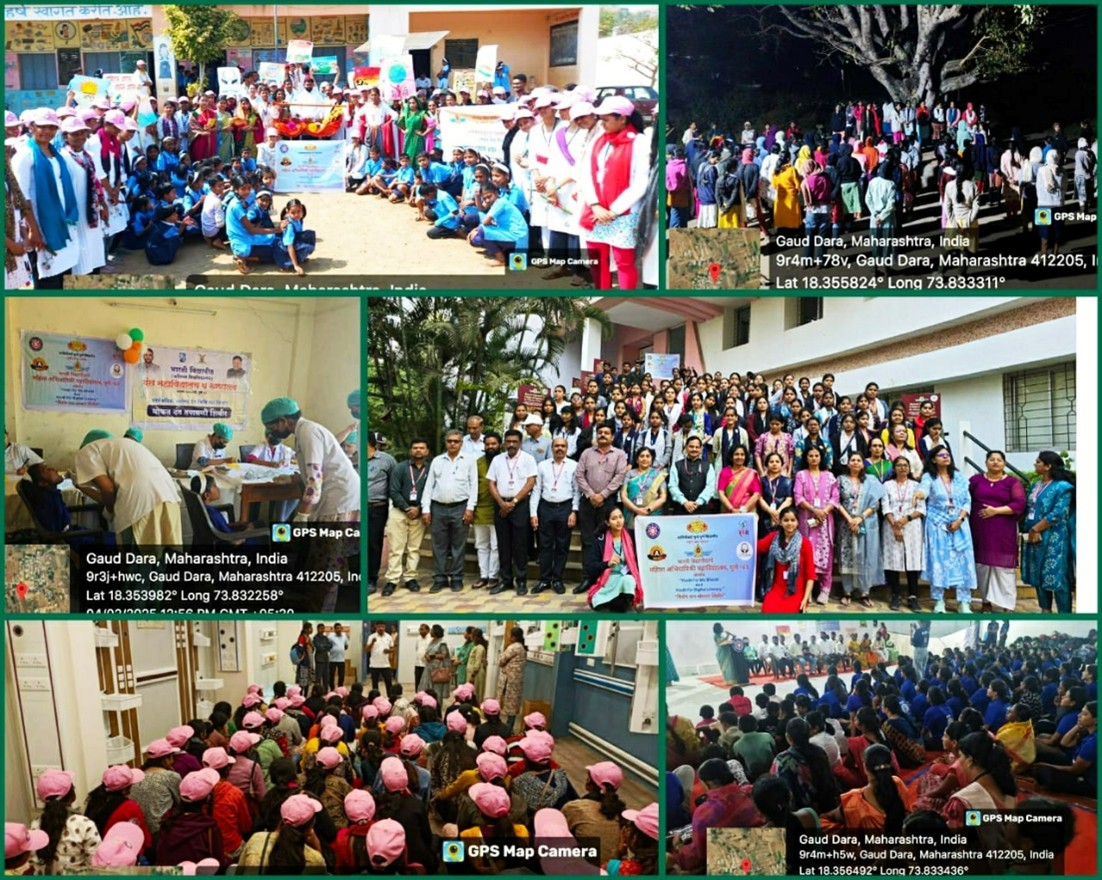
Labor camp of Women Engineering College of Bharti University was successful under the National Service Scheme
Pune: Under the National Service Scheme of Savitribai Phule Pune University, Women Engineering College of Bharti University conducted a seven-day labor camp with great enthusiasm and successfully at Gram Panchayat Gouddara Taluka Haveli from 3 February 2025 to 9 February 2025. The main concept of this camp was "Youth for My India" and "Youth for Digital Literacy". Through this, the volunteers of the National Service Scheme took a positive step towards social service by contributing to rural development.
President of Bharti University family. Dr. Camp inaugurated by Babama Shinde. Director of Micro Inotech Pvt. Limited, Pune. Mr. Rajesh Pawar was the chief guest. The camp started with a grand morning round and opening ceremony. The dignitaries present at the inauguration highlighted the camp objectives and motivated the students for social work. In this seven-day camp, various activities were implemented for health, education, hygiene, digital literacy and social awareness. Villagers benefited from health services such as dental checkup camp, eye checkup camp, blood group checkup camp and Ayurveda checkup camp. Moreover camps such as disaster management, mental stress management and digital literacy were conducted, which provided useful knowledge to villagers and volunteers.
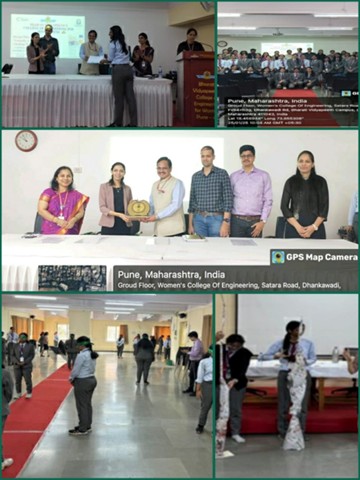
Bharati Vidyapeeth’s College of Engineering for Women Hosts an Inspiring Design Thinking Workshop
Pune: On 25th January 2025, Bharati Vidyapeeth’s College of Engineering for Women, Pune organized an engaging Design Thinking Workshop titled “Empathy to Execution: The Design Thinking Way.” The workshop aimed to equip students with a structured approach to solving complex problems through empathy, ideation, prototyping, and experimentation. The event was held on campus from 9:00 AM to 4:00 PM and witnessed the active participation of students and faculty members. It provided a valuable platform for students to develop critical thinking abilities, enhance teamwork and explore user-centric solutions.
Chief Guest and Trainer Mrs. Prachi Divekar, an expert in Design Thinking, conducted the session along with her team members Mr. Ankur and Mr. Ketan. They were warmly welcomed and felicitated by Principal Prof. Dr. Pradeep V. Jadhav, Vice Principal Academics Prof. Dr. Suvarna Chorge and Workshop Coordinator Prof. Roshna Sapkal.
During the workshop, Principal Prof. Dr. Pradeep Jadhav addressed the participants, emphasizing the significance of Design Thinking in engineering. In his speech, he said, Design Thinking is not just a process but a mindset that fosters creativity, adaptability, and empathy. In today’s fast-evolving world, engineers are expected not only to solve technical problems but also to understand user needs. This workshop provides students with a unique opportunity to sharpen their critical thinking abilities, collaborate effectively, and transform ideas into meaningful solutions. I encourage all participants to embrace this learning experience and apply these principles in their academic and professional journeys.
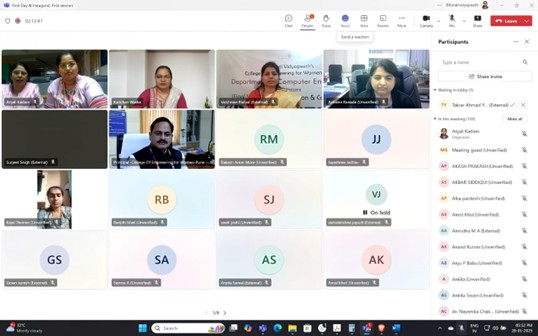
Huge response to national level Atal Teachers Development Program on climate change and water management
Pune: Bharti University Women Engineering College, Pune and National Institute of Hydro Sciences, Roorkee organized a six-day national level Atal Teacher Development Program on the topic “Effects of Climate Change and Effective Water Management, Pre-Disaster Preparedness, Immunity and Shaman”. The program was conducted online from 28 January 2025 to 3 February 2025. The workshop provided in-depth guidance on climate change, its impacts on various areas, rising temperatures format, research on it, and the necessary disaster management process.
Professor of Women Engineering College of Bharti University at the inauguration of the program. Dr. Pradeep Jadhav said "Climate change is affecting the entire mankind." So it is important to find a solution to this with the help of technology. Experts from various fields such as engineering, environmentology, geography, geology, physics and computer science are coming together to research the issue. Through this workshop, all professors can learn more in-depth study of the subject, which will be useful for future research," expressed his opinion
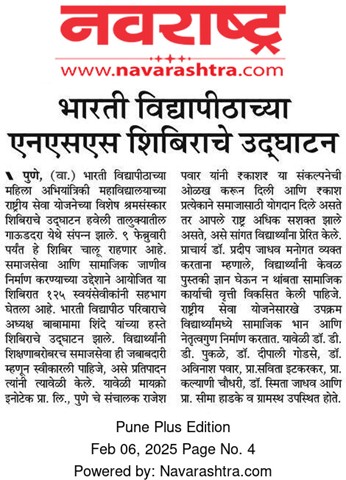
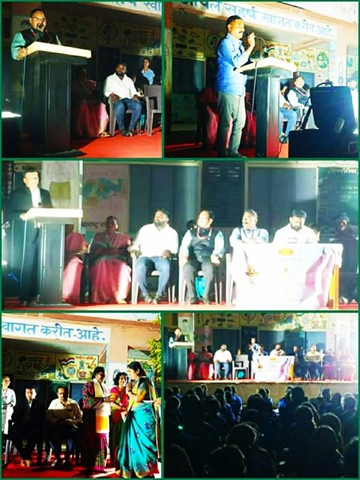
राष्ट्रीय सेवा योजनेच्या विशेष श्रमसंस्कार शिबिराचे भव्य उद्घाटन : सेवाभाव आणि सामाजिक उत्तरदायित्वाची प्रेरणा
पुणे: भारती विद्यापीठाच्या महिला अभियांत्रिकी महाविद्यालयाच्या राष्ट्रीय सेवा योजनेच्या विशेष श्रमसंस्कार शिबिराच्या भव्य उद्घाटन सोहळ्याचे आयोजन ३ फेब्रुवारी २०२५ रोजी मु. पो. गाऊडदरा, तालुका हवेली, जिल्हा पुणे येथे करण्यात आले. हे शिबिर दिनांक ९ फेब्रुवारी २०२५ पर्यंत कार्यरत असेल. समाजसेवा आणि सामाजिक जाणीव विकसित करण्याच्या हेतूने आयोजित या उपक्रमात १२५ उत्साही स्वयंसेविकांनी सहभाग घेतला आहे. महाविद्यालयातील विद्यार्थी, प्राध्यापक आणि ग्रामस्थांनी या कार्यक्रमाला मोठ्या संख्येने उपस्थिती लावली.
कार्यक्रमाची सुरुवात महाराष्ट्र गीताने झाली, त्यानंतर सावित्रीबाई फुले पुणे विद्यापीठ गीत आणि राष्ट्रीय सेवा योजना गीताचे उत्साहपूर्ण सादरीकरण झाले. स्वागत गीत आणि गणेश वंदनेच्या मंगलमय प्रस्तुतीकरणाने संपूर्ण वातावरण भक्तिमय आणि प्रेरणादायी झाले. राष्ट्रीय सेवा योजनेच्या स्वयंसेवकांनी समाजसेवेच्या या पवित्र कार्याची सुरुवात सकारात्मक ऊर्जा आणि समर्पणभावनेने केली.
कार्यक्रमास भारती विद्यापीठ परिवाराचे अध्यक्ष मा. डॉ. बाबामामा शिंदे हे प्रमुख पाहुणे म्हणून उपस्थित होते. आपल्या मार्गदर्शनपर भाषणात त्यांनी "राष्ट्रीय सेवा योजना ही केवळ एक उपक्रम नसून, समाजासाठी काहीतरी करण्याची संधी आहे. प्रत्येक विद्यार्थ्याने समाजसेवा ही जबाबदारी म्हणून स्वीकारली पाहिजे, कारण शिक्षणासोबत सामाजिक बांधिलकी महत्त्वाची आहे," असे स्पष्ट केले.
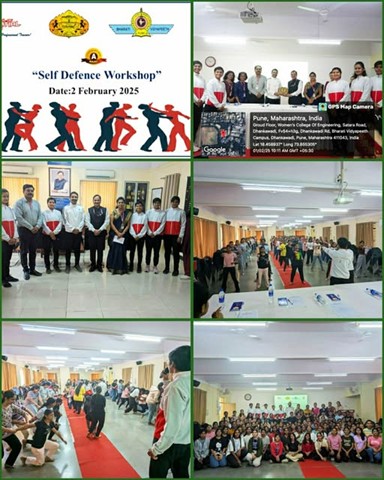
Empowering Women Through Self-Defence Workshop
Pune: Bharati Vidyapeeth’s College of Engineering for Women Pune, in collaboration with Savitribai Phule Pune University and the School of Martial Arts, Pune, successfully organized a One Day Self-Defence Workshop under the Nirbhaya Kanya Scheme of Savitribai Phule Pune University. The workshop aimed to educate students on the significance of self-defence and equip them with practical skills to protect themselves in potentially dangerous situations.
The event commenced at 9:00 AM with a warm welcome address by Prof. Dr. S. S. Khan, followed by an insightful speech by Prof. K. R. Chaudhari, Student Development Officer (SDO). Prof. Chaudhari emphasized the critical role of self-defence in today’s world, particularly in empowering women and individuals vulnerable to attacks. She highlighted how such workshops contribute significantly to personal safety and confidence.
The Chief Guest and Resource Person for the event, Mr. Vikas Badhade, was introduced by Prof. U. S. Zope. Mr. Badhade, a seasoned martial arts expert and the founder of the School of Martial Arts, Pune, has dedicated years to training individuals in self-defence techniques. Principal Prof. Dr. Pradeep V. Jadhav felicitated Mr. Badhade, acknowledging his invaluable contribution to martial arts and self-defence education.
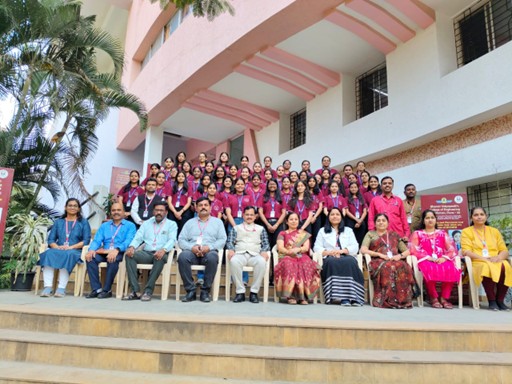
विद्यार्थिनींच्या उज्ज्वल करिअरसाठी प्रशिक्षण आणि प्लेसमेंट प्रतिनिधींची निवड
पुणे: आधुनिक तंत्रज्ञानाच्या युगात विद्यार्थिनींना केवळ शैक्षणिक ज्ञान असून उपयोगी नाही, तर त्यांना औद्योगिक क्षेत्रातील कौशल्यांचा विकास करणे तितकेच आवश्यक आहे. याच उद्देशाने, भारती विद्यापीठाच्या महिला अभियांत्रिकी महाविद्यालयात विद्यार्थिनींसाठी प्रशिक्षण आणि प्लेसमेंट प्रक्रियेला अधिक बळकट करण्यासाठी विद्यार्थिनी प्रतिनिधींची निवड करण्यात आली. हे प्रतिनिधी आरपीजी झेन्सार ईएसडी, पीअर टू पीअर ट्रेनिंग, प्लेसमेंट ड्राइव्ह आणि विविध कौशल्यविकास उपक्रमांमध्ये सक्रिय सहभाग घेऊन विद्यार्थिनींना उद्योगसंपन्न बनवण्यासाठी योगदान देतील.
या शैक्षणिक वर्षासाठी कु. प्रेरणा भोकरे – अध्यक्ष, कु. श्रेया चौधरी – उपाध्यक्ष, कु. दीप्ती शर्मा – सचिव, तसेच कु. नंदिनी पांडे – संयुक्त सचिव म्हणून निवड करण्यात आली आहे. या विद्यार्थिनी प्रतिनिधी महाविद्यालयाच्या प्रशिक्षण आणि प्लेसमेंट विभागासोबत समन्वय साधून विद्यार्थिनींसाठी अधिकाधिक संधी निर्माण करण्यासाठी कार्यरत राहणार आहेत.
या प्रसंगी महाविद्यालयाचे प्राचार्य प्रा. डॉ. प्रदीप जाधव यांनी विद्यार्थिनींचे अभिनंदन करून त्यांना पुढील वाटचालीसाठी मार्गदर्शन केले. त्यांनी विद्यार्थिनींनी नेतृत्वगुण विकसित करावेत, संघटनकौशल्य आत्मसात करावे आणि प्लेसमेंटशी संबंधित उपक्रमांमध्ये सक्रिय सहभाग घ्यावा, असे सांगितले. तसेच, या निवडलेल्या प्रतिनिधींमुळे महाविद्यालयातील प्रशिक्षण आणि प्लेसमेंट उपक्रम अधिक प्रभावी ठरतील, असा विश्वास त्यांनी व्यक्त केला.
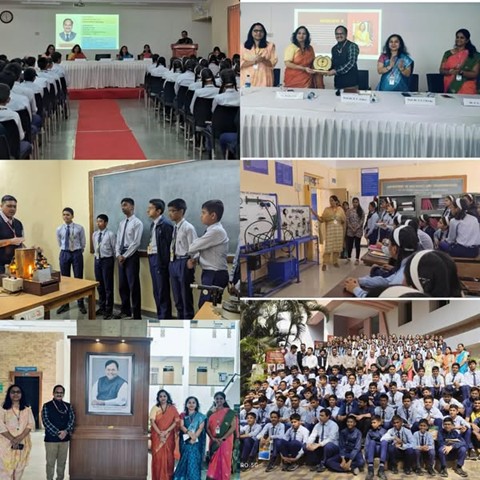
Bharati Vidyapeeth's College of Engineering for Women, Pune Hosts NEP School Connect 2.0 Program Pune: On 16th January 2025, Bharati Vidyapeeth's College of Engineering for Women (BVCOEW), Pune, in collaboration with Savitribai Phule Pune University, successfully conducted a college visit under the NEP School Connect 2.0 Program. The program aimed to introduce 125 ninth-standard students from Bharati Vidyapeeth English Medium High School, Pune, along with their teachers, to the vast opportunities in higher education, particularly in engineering. Aligned with the objectives of the National Education Policy (NEP) 2020, this initiative served as a bridge between school and higher education while inspiring young minds to explore academic and career prospects in STEM fields. The event commenced with an inaugural function, graced by Ms. Madhavi K., Principal of Bharati Vidyapeeth English Medium High School, Pune, as the distinguished guest. She delivered an inspiring speech, emphasizing the critical role of such initiatives in preparing students for the challenges of higher education and shaping their future aspirations. Dr. Shital Pawar, NEP Coordinator, welcomed the gathering and introduced Ms. Madhavi K. with warm appreciation for her leadership and vision. During the event, Ms. Madhavi K. was felicitated by Prof. Dr. Pradeep V. Jadhav, Principal of BVCOEW, Pune, who shared his insights on the transformative role of NEP 2020 in creating an interdisciplinary and holistic educational ecosystem, was introduced by Prof. Swati Thorat. Prof. Dr. Suvarna S. Chorage, Vice Principal (Academics) and IQAC Coordinator highlighted the transformative potential of NEP 2020, elaborating on how it encourages innovative learning practices and fosters collaboration across disciplines. Her address resonated with the students and faculty, inspiring them to embrace new academic paradigms. The program concluded with a heartfelt vote of thanks by Prof. Roshana Sapkal, who expressed gratitude to the dignitaries, participants, and organizers for their contribution to the event's success. The event was meticulously coordinated by Prof. Seema Hadke, Prof. Smita God, Mr. Akshay Gaikwad, and Ms. Geetanjali Mohita, who ensured every aspect of the program ran smoothly. The support and leadership of department heads, including Prof. Dr. S. R. Patil, H.O.D. of Electronics and Telecommunication; Prof. D. D. Pukale, H.O.D. of Computer Engineering; and Prof. Dr. A. M. Pawar, Vice Principal (Administration) and H.O.D. of Engineering Sciences and Allied Engineering, along with contributions from Dr. Ketaki Malagi, Prof. Pranoti Kale, and the dedicated faculty team, played a crucial role in the program's success.
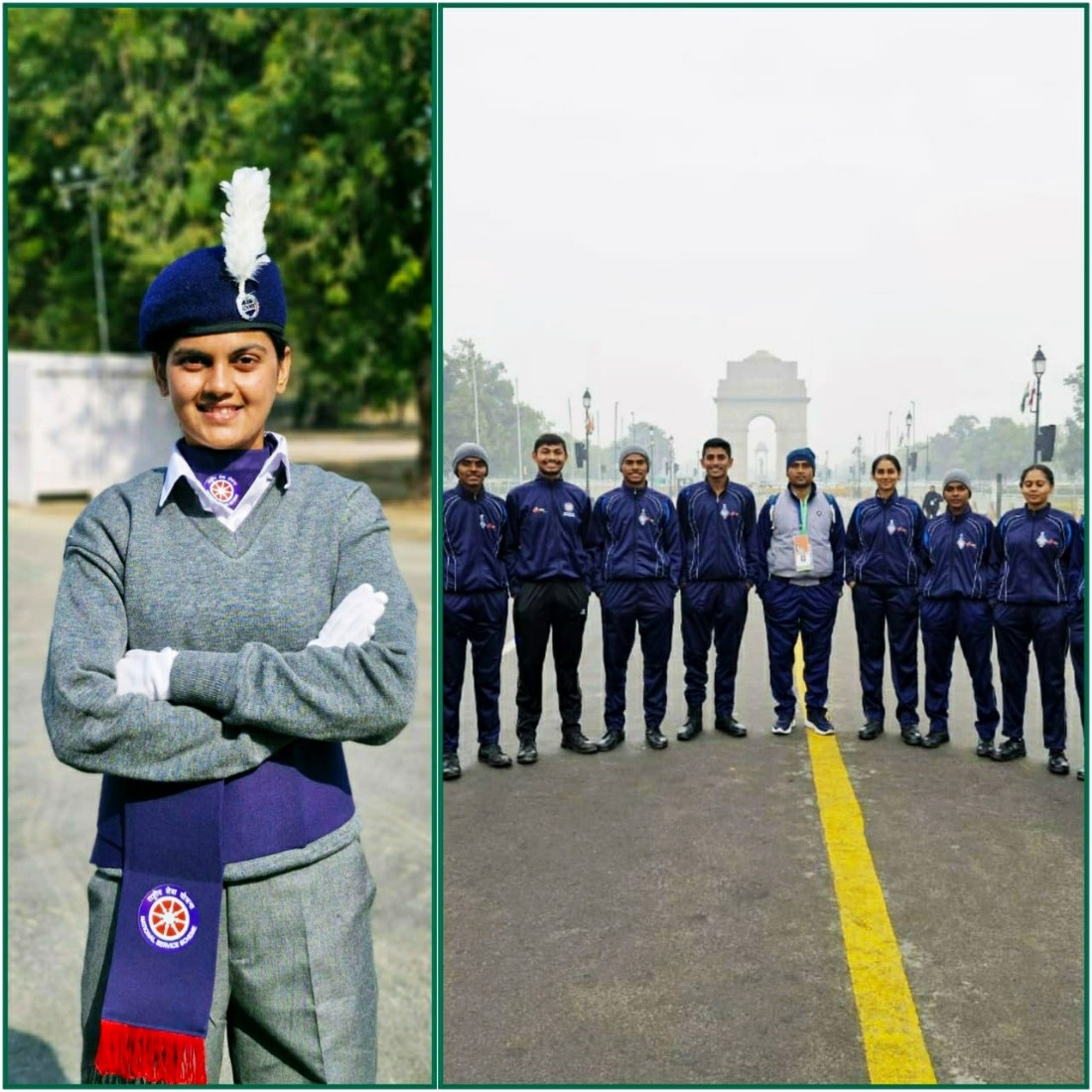
Bharati Vidyapeeths Leadership and a Proud Achievement: Vedika Rajmane Shines at Republic Day Parade
Pune: Bharati Vidyapeeth continues to flourish as a leading institution under the dynamic and visionary leadership of its esteemed management team. Hon. Dr. Vishwajeet Kadam, Secretary of Bharati Vidyapeeth and Pro Vice-Chancellor of Bharati Vidyapeeth Deemed to be University, plays an instrumental role in driving the institution towards academic excellence and holistic development. Hon. Prof. Dr. Shivajirao Kadam, Chancellor of Bharati Vidyapeeth Deemed to be University, remains a guiding force, fostering the sustained growth and success of the institution. Hon. Vijaymalaji Kadam, President of the School Committee, promotes a culture of educational innovation, while Hon. Dr. Asmita Jagtap, Executive Director of Bharati Vidyapeeth Health Sciences, Pune, ensures the highest standards in health sciences education. Hon. Dr. K. D. Jadhav, Joint Secretary of Bharati Vidyapeeth, focuses on enhancing the institution’s holistic development. Their collective efforts have established Bharati Vidyapeeth as a beacon of knowledge and a foundation for future leaders.
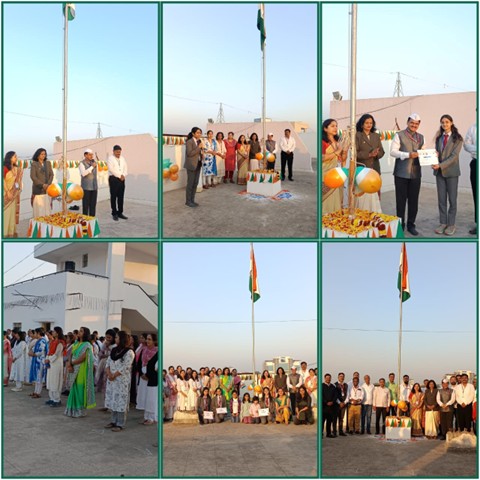
Bharati Vidyapeeth's College of Engineering Celebrates Republic Day with Patriotic Fervor
Pune: Bharati Vidyapeeth's College of Engineering for Women celebrated the 76th Republic Day of India on 26th January 2025, with immense enthusiasm and patriotic spirit. The event commenced with the hoisting of the National Flag by the esteemed Principal Prof. Dr. Pradeep Jadhav, in the presence of faculty members, students and staff.
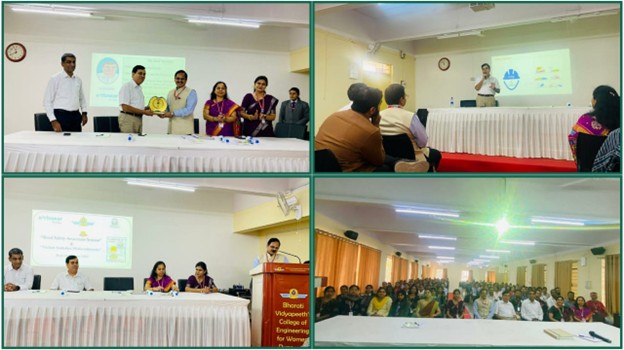
रस्ता सुरक्षा जनजागृती: जबाबदार नागरिक घडवण्याचा उपक्रम
पुणे: भारती विद्यापीठाच्या महिला अभियांत्रिकी महाविद्यालयात "रस्ता सुरक्षा जनजागृती" हा महत्त्वपूर्ण उपक्रम मोठ्या उत्साहात पार पडला. या उपक्रमाचा उद्देश नागरिकांमध्ये रस्ता सुरक्षिततेबाबत जागरूकता निर्माण करणे आणि जबाबदार नागरिक घडवणे हा होता. कार्यक्रमाचे प्रमुख पाहुणे किर्लोस्कर फेरसच्या ईएचएस विभागाचे प्रमुख मा. श्री. राम ताकभाते होते. त्यांनी विद्यार्थ्यांसमोर रस्ता सुरक्षा आणि त्याच्या महत्त्वाचे विवेचन केले. त्यांनी सांगितले, “रस्ता सुरक्षिततेच्या नियमांचे पालन हे केवळ कायद्याचे पालन नाही, तर ते आपले कर्तव्य आहे. हेल्मेट, सीटबेल्टचा वापर, वेग मर्यादांचे पालन आणि मोबाईलचा अयोग्य वापर टाळणे ही काही सोपी परंतु प्रभावी पावले आहेत ज्यामुळे अपघातांची संख्या कमी होऊ शकते.” कार्यक्रमाचे सन्माननीय पाहुणे किर्लोस्कर फेरसच्या मानव संसाधन विभागाचे उपमहाव्यवस्थापक मा. श्री. सचिन जहागिरदार होते. मार्गदर्शन करताना त्यांनी विद्यार्थ्यांना उद्देशून सांगितले, "रस्ता सुरक्षेचे नियम पाळणे म्हणजे केवळ स्वतःचीच नव्हे तर इतरांच्या सुरक्षिततेची देखील जबाबदारी घेणे होय. आपला जबाबदारपणा आणि सतर्कता हा समाजात सकारात्मक बदल घडवू शकतो. प्रत्येकाने आपापल्या कुटुंबीयांना आणि मित्रांना रस्ता सुरक्षेचे महत्त्व पटवून दिले पाहिजे.” कार्यक्रमाच्या अध्यक्षस्थानी महाविद्यालयाचे प्राचार्य प्रा. डॉ. प्रदीप जाधव होते. त्यांनी विद्यार्थ्यांना संबोधित करत सांगितले, "रस्ता सुरक्षा हा आपला सामाजिक कर्तव्यभावनेचा एक भाग आहे. नियमांचे काटेकोरपणे पालन केल्याने आपण अपघातांना अटकाव करू शकतो आणि सुरक्षित समाज निर्माण करू शकतो."
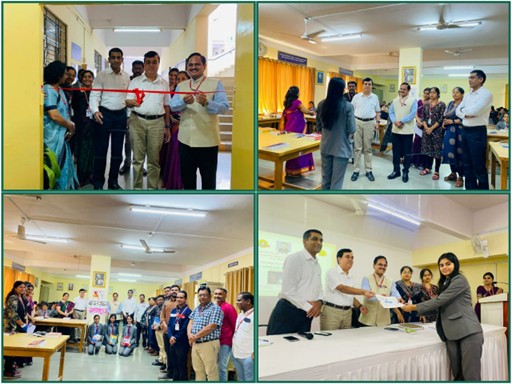
भारती विद्यापीठात "वाचन संकल्प महाराष्ट्राचा" उपक्रम उत्साहात
पुणे: भारती विद्यापीठाच्या महिला अभियांत्रिकी महाविद्यालयात 'वाचन संकल्प महाराष्ट्राचा' हा अभिनव आणि प्रेरणादायक उपक्रम मोठ्या उत्साहात साजरा करण्यात आला. या कार्यक्रमाचा मुख्य उद्देश विद्यार्थ्यांमध्ये वाचनाची आवड निर्माण करणे आणि त्याद्वारे ज्ञानवर्धनासोबतच व्यक्तिमत्त्वाच्या सर्वांगीण विकासासाठी प्रेरणा देणे होता. कार्यक्रमाचे प्रमुख पाहुणे किर्लोस्कर फेरसचे ईएचएसचे विभागप्रमुख मा. श्री. राम ताकभाते यांनी वाचनाचे महत्त्व अधोरेखित करत विद्यार्थ्यांना प्रेरित केले. त्यांनी सांगितले, "वाचन ही व्यक्तिमत्त्व विकासासाठी अनमोल सवय आहे. वाचनाने ज्ञान, सर्जनशीलता आणि आत्मविश्वास वृद्धिंगत होतो. विद्यार्थ्यांनी दररोज ठराविक वेळ वाचनासाठी द्यावी. यामुळे त्यांचा वैचारिक आणि भावनिक विकास होईल." या कार्यक्रमाचे सन्माननीय पाहुणे किर्लोस्कर फेरसच्या मानव संसाधन विभागाचे उपमहाव्यवस्थापक मा. श्री. सचिन जहागिरदार होते. त्यांनी वाचनाच्या महत्त्वावर जोर दिला आणि विद्यार्थ्यांना वाचनाची सवय अंगीकारण्याची प्रेरणा दिली. श्री. जहागिरदार म्हणाले, "वाचन ही एक अद्भुत सवय आहे जी केवळ ज्ञान वाढवतेच नाही, तर आपल्या व्यक्तिमत्त्वाच्या सर्वांगीण विकासात महत्त्वपूर्ण भूमिका बजावते. दररोज काही वेळ वाचनासाठी द्यावा, यामुळे आपले जीवन अधिक समृद्ध आणि कार्यक्षम होईल." महाविद्यालयाचे प्राचार्य प्रा. डॉ. प्रदीप जाधव यांनी विद्यार्थ्यांना मार्गदर्शन करत वाचनाचे महत्त्व समजावले. त्यांनी सांगितले की, "वाचनामुळे माणूस नवनवीन विचार, अनुभव आणि दृष्टिकोन प्राप्त करतो. हे केवळ शिक्षणाच्या क्षेत्रातच नाही, तर जीवनाच्या प्रत्येक पैलूवर प्रभाव टाकते."
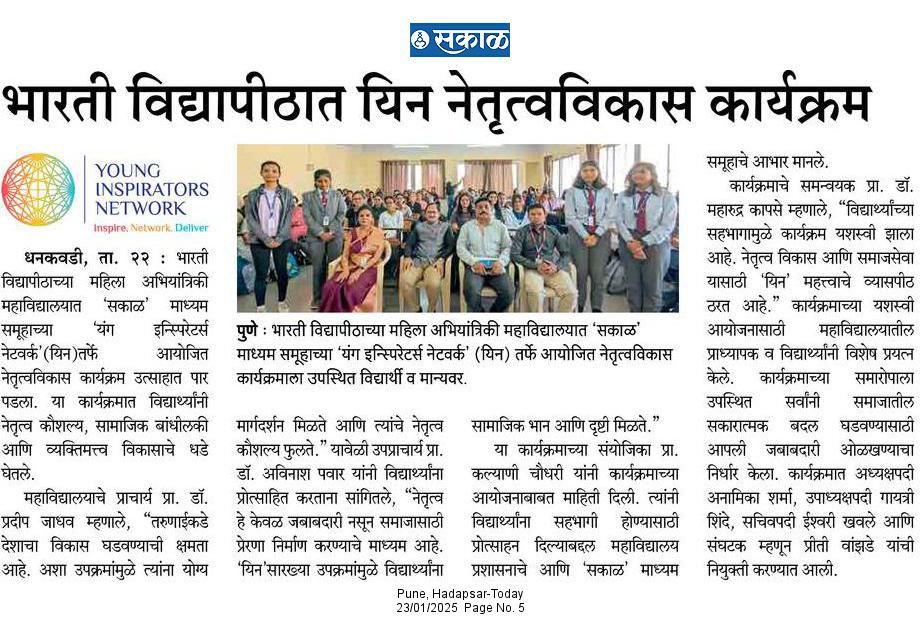
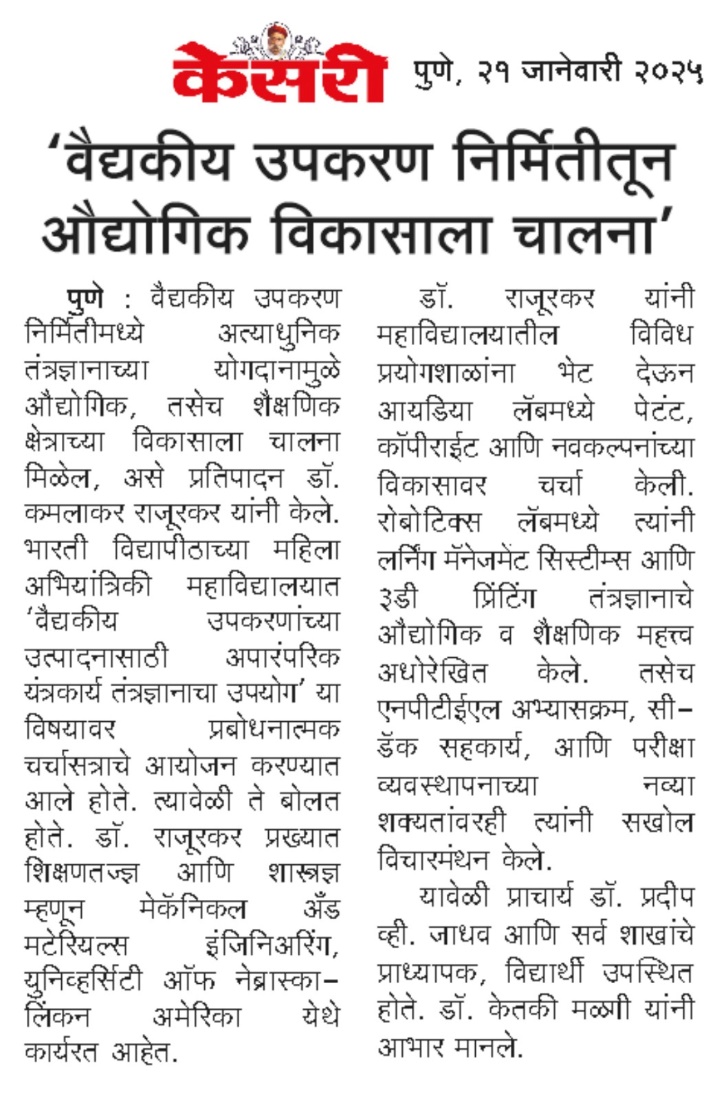
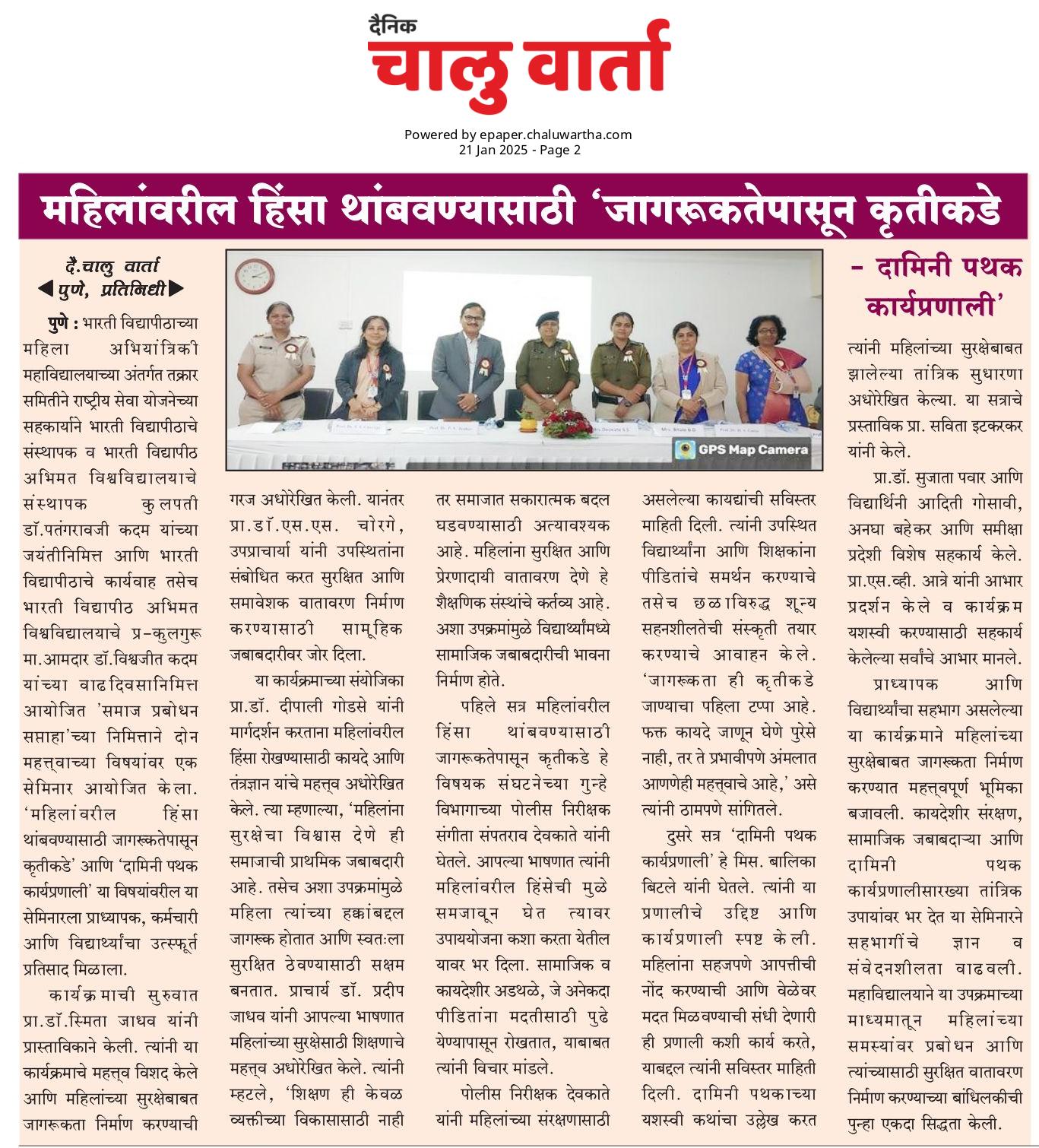
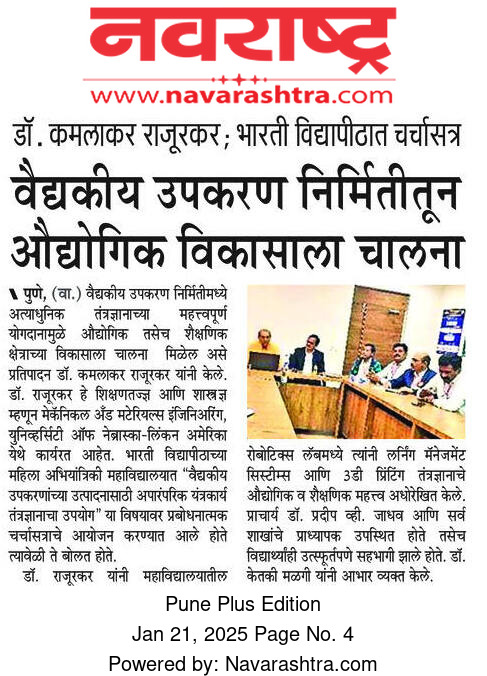
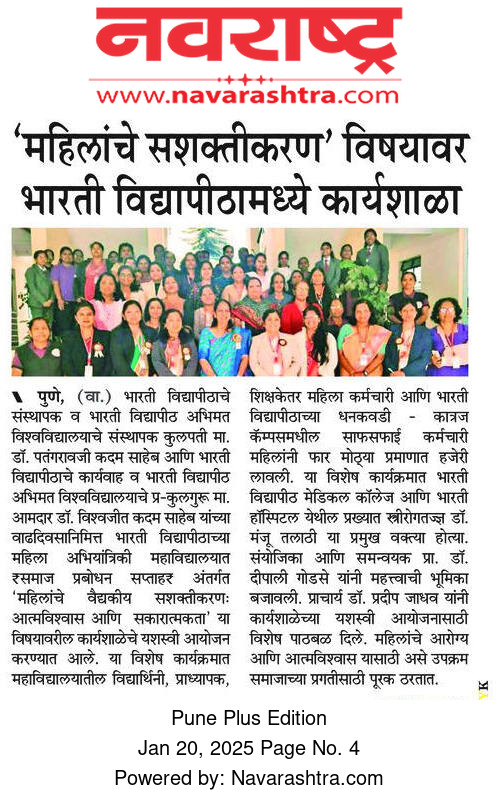
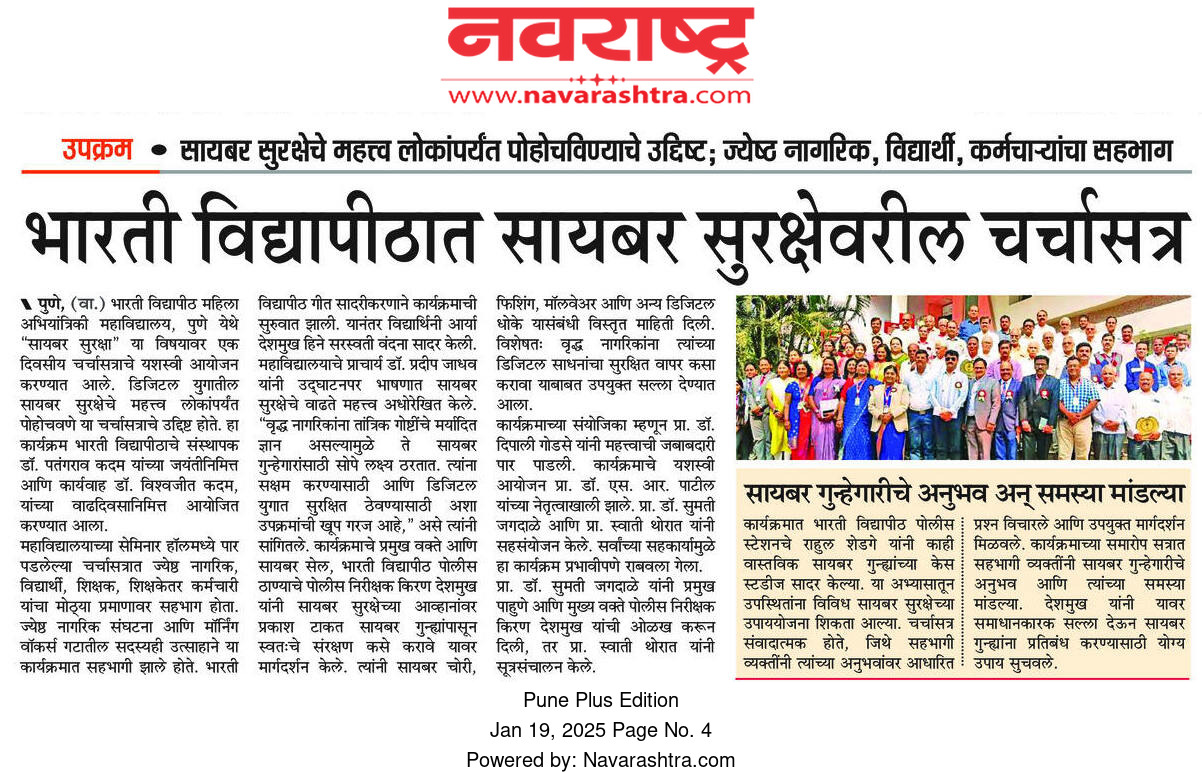
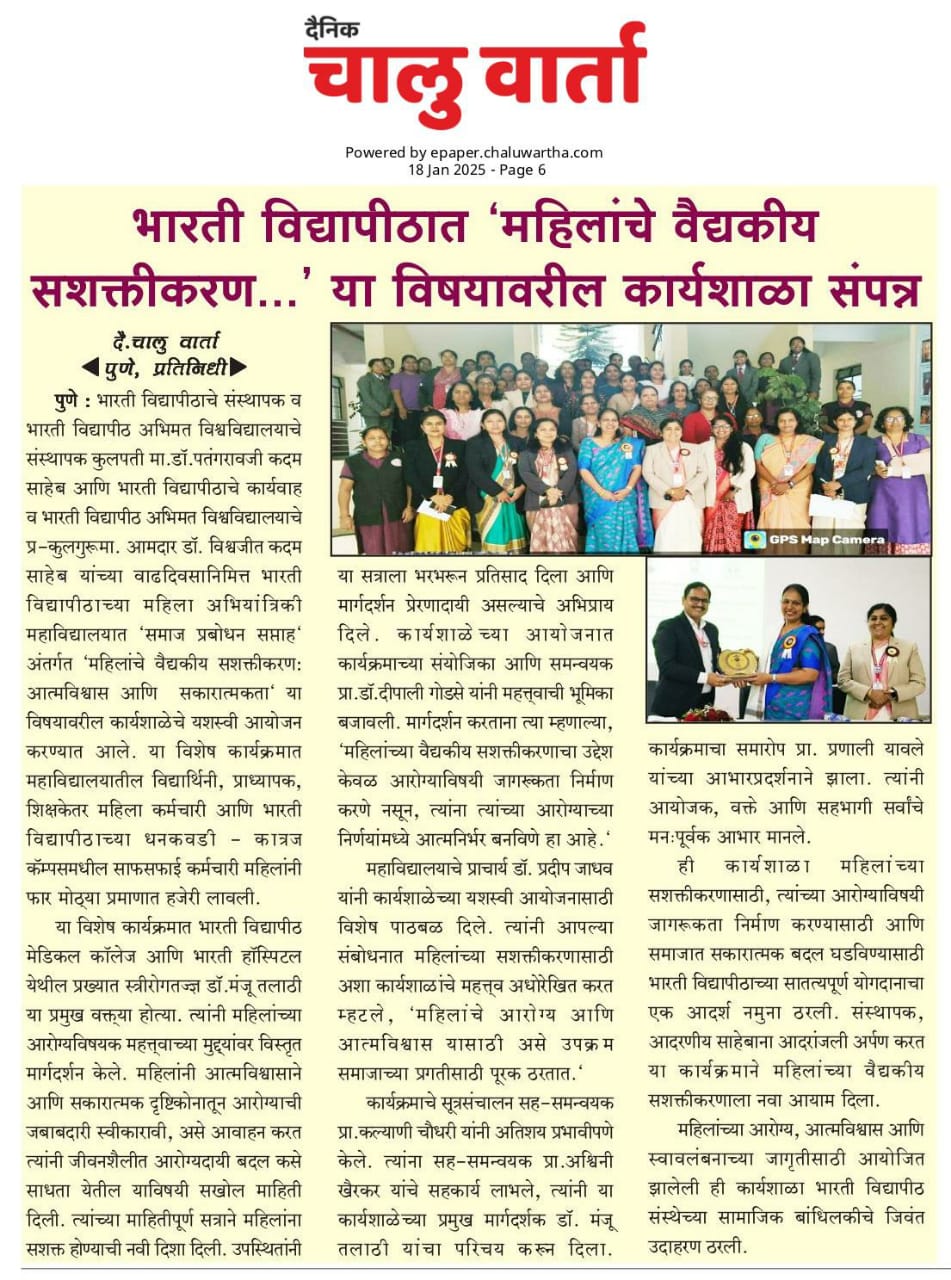
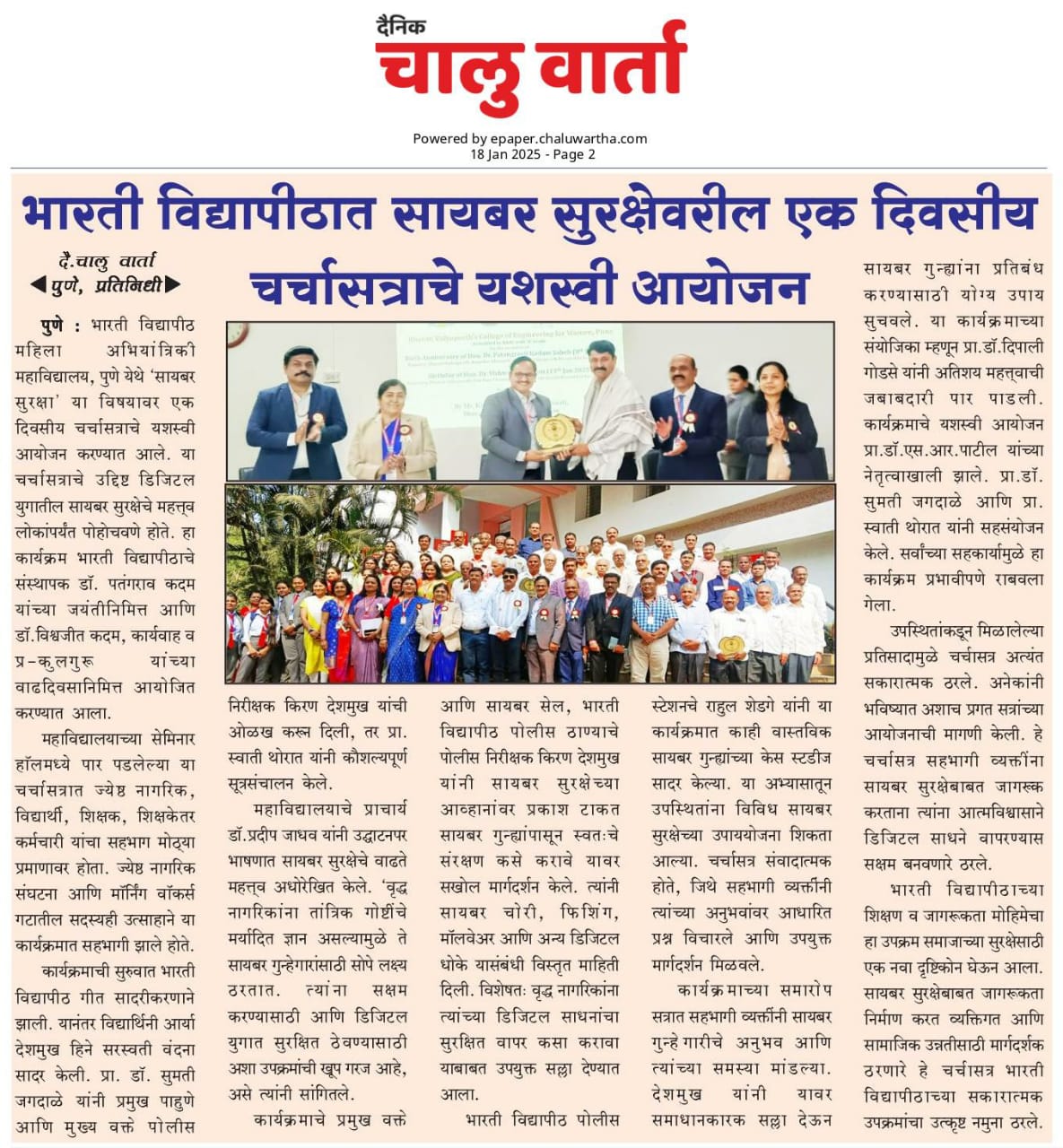
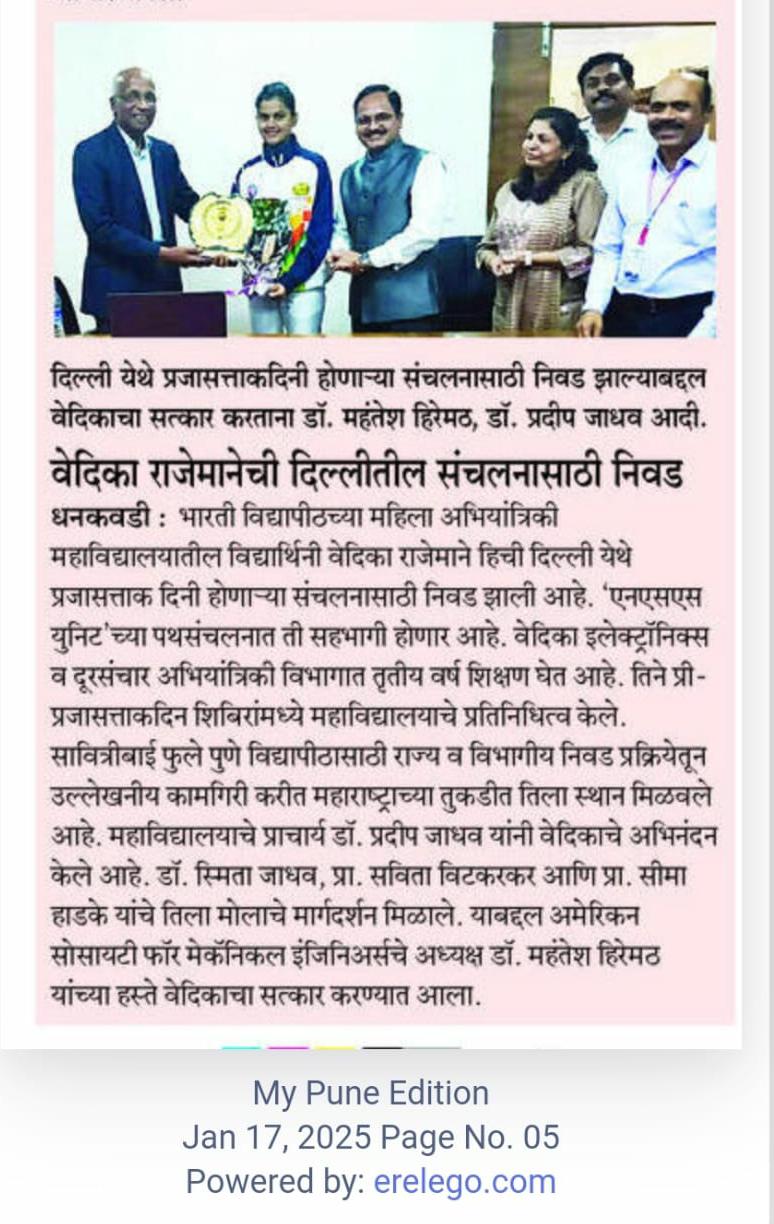
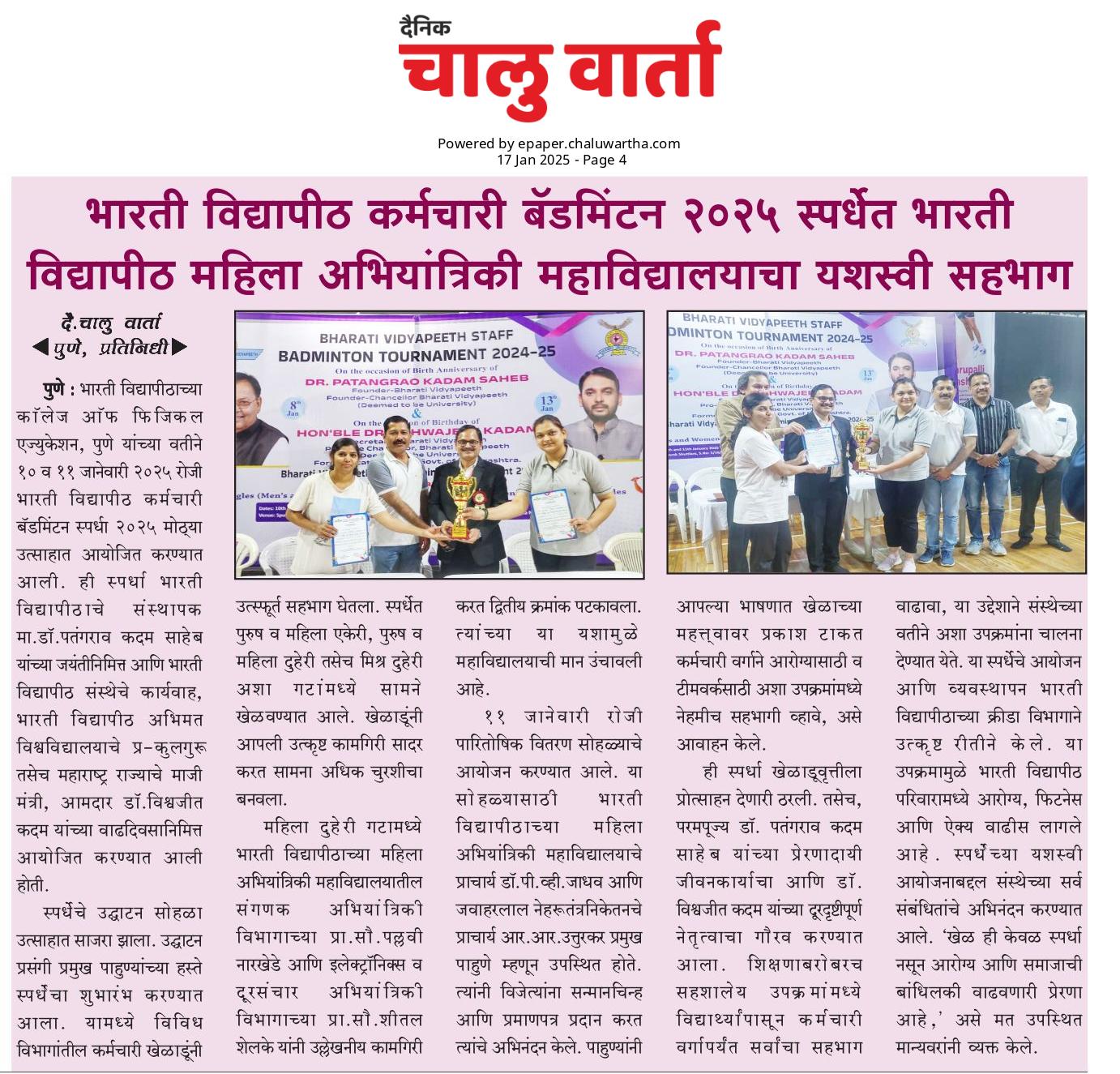
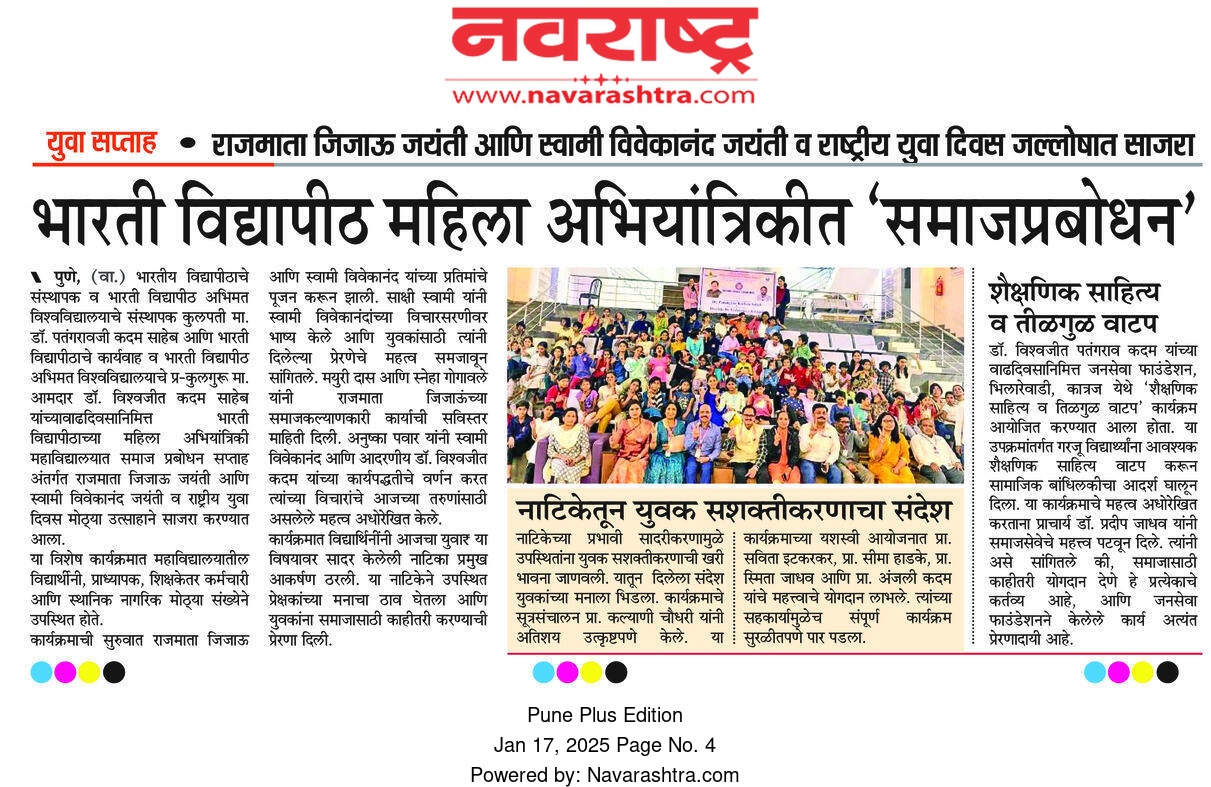
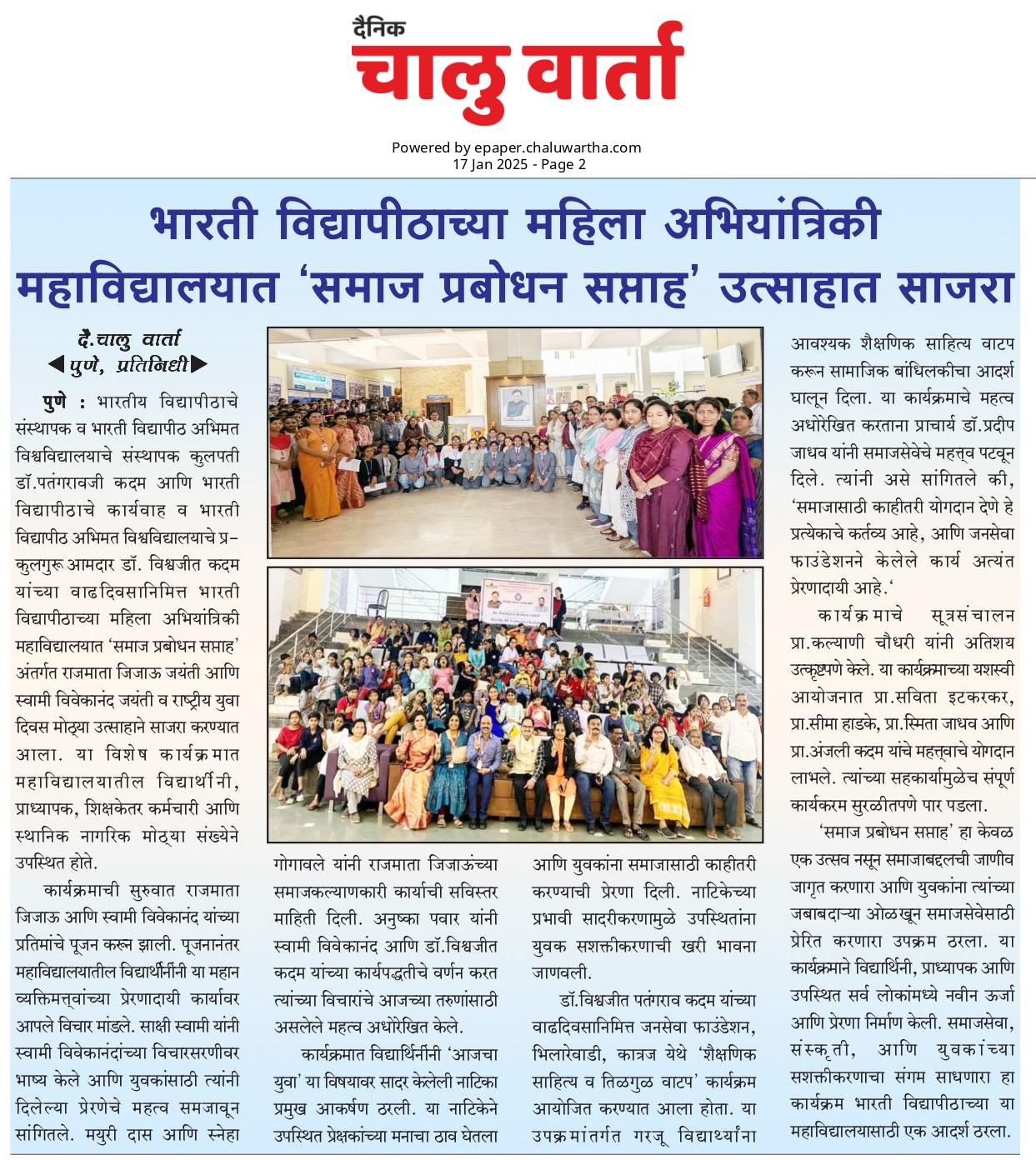
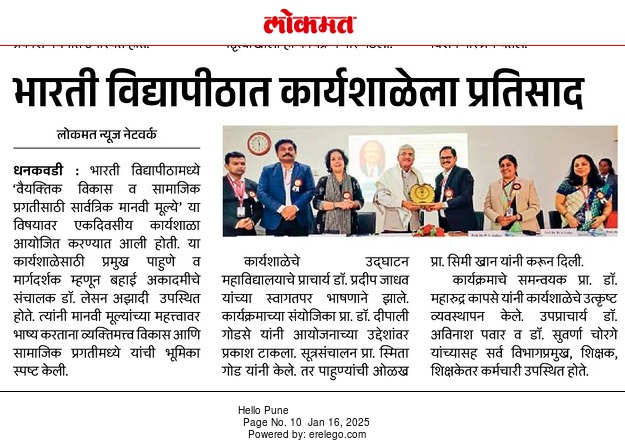
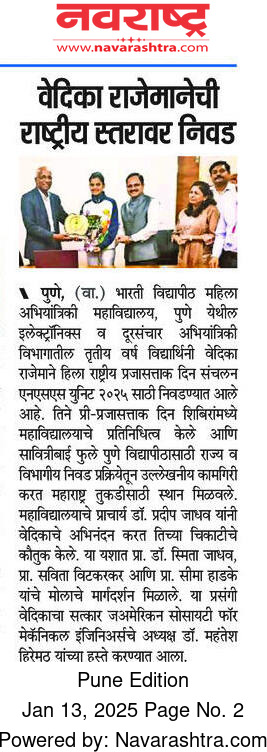
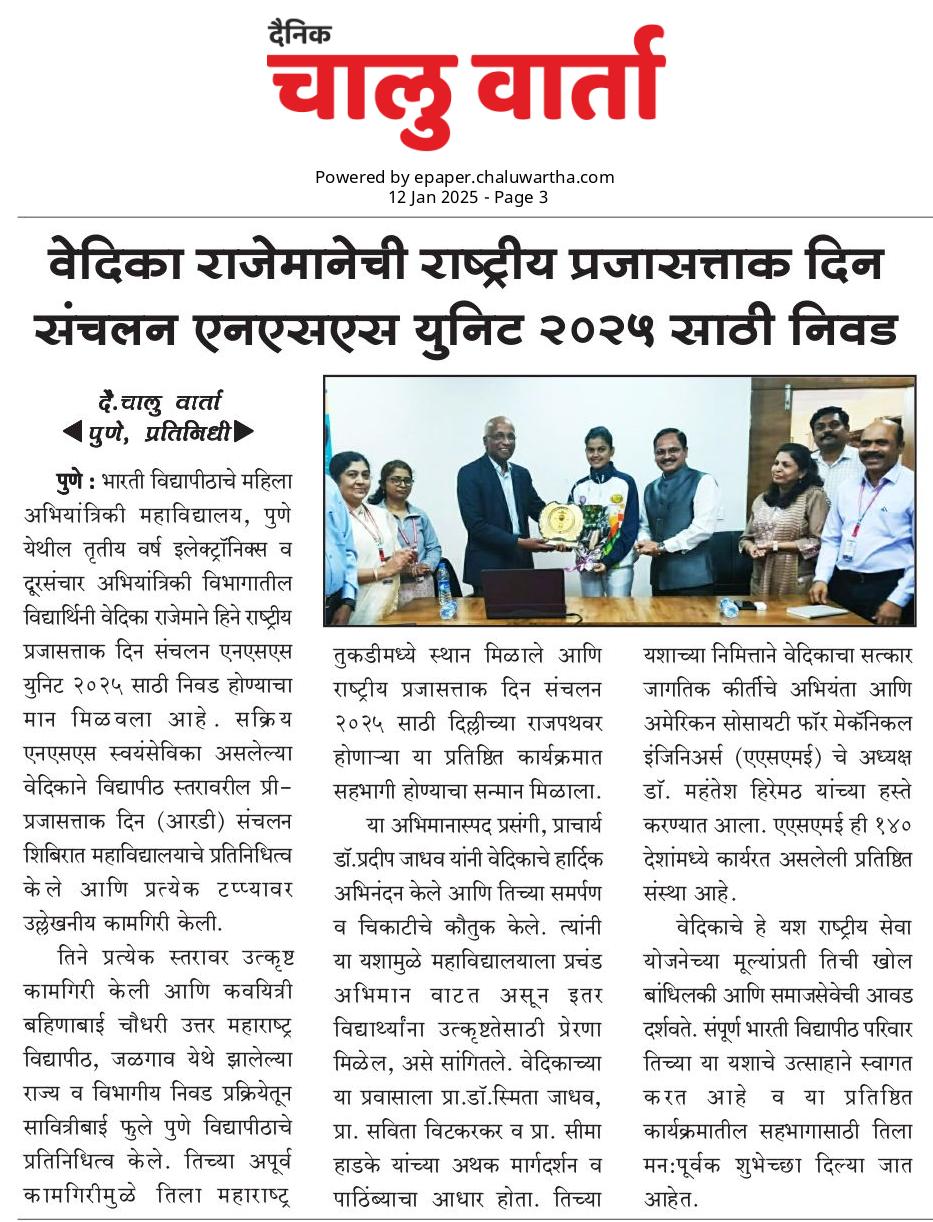
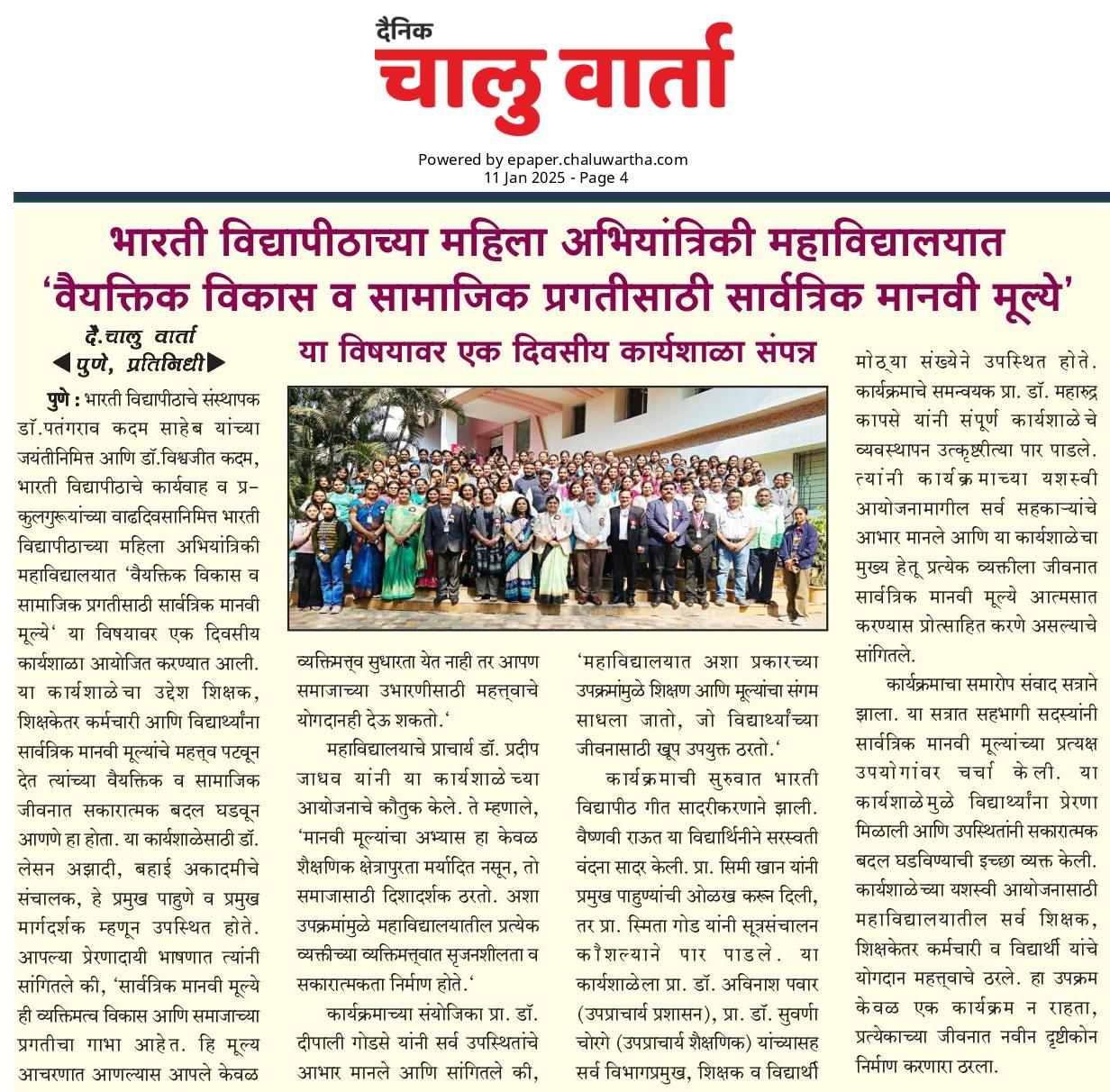
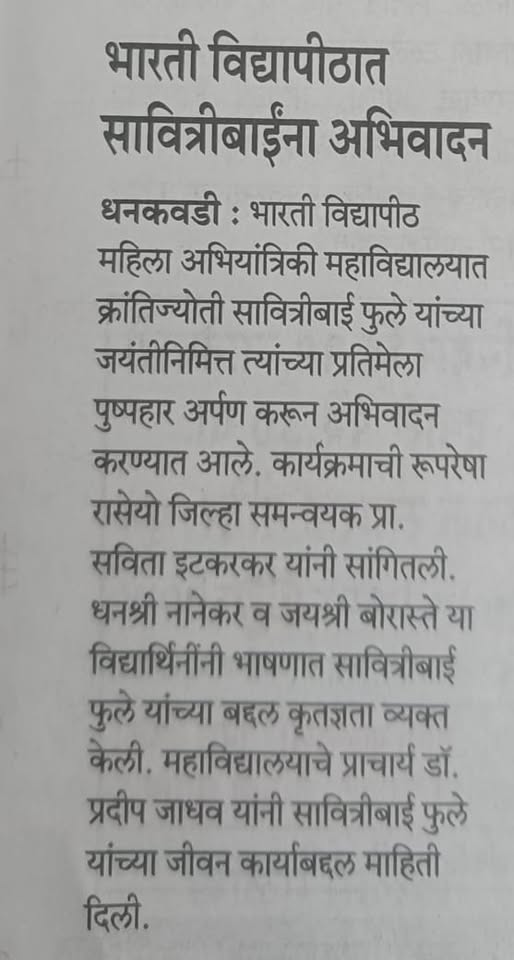
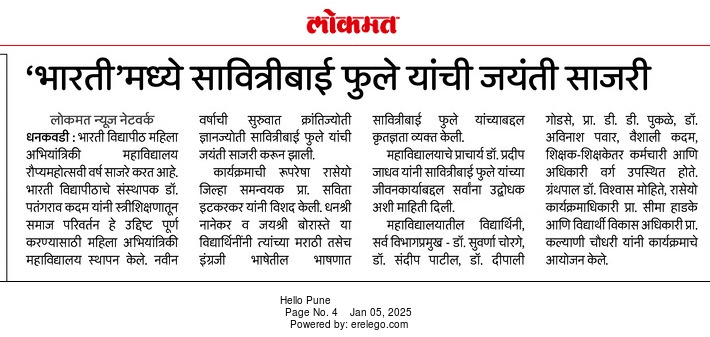
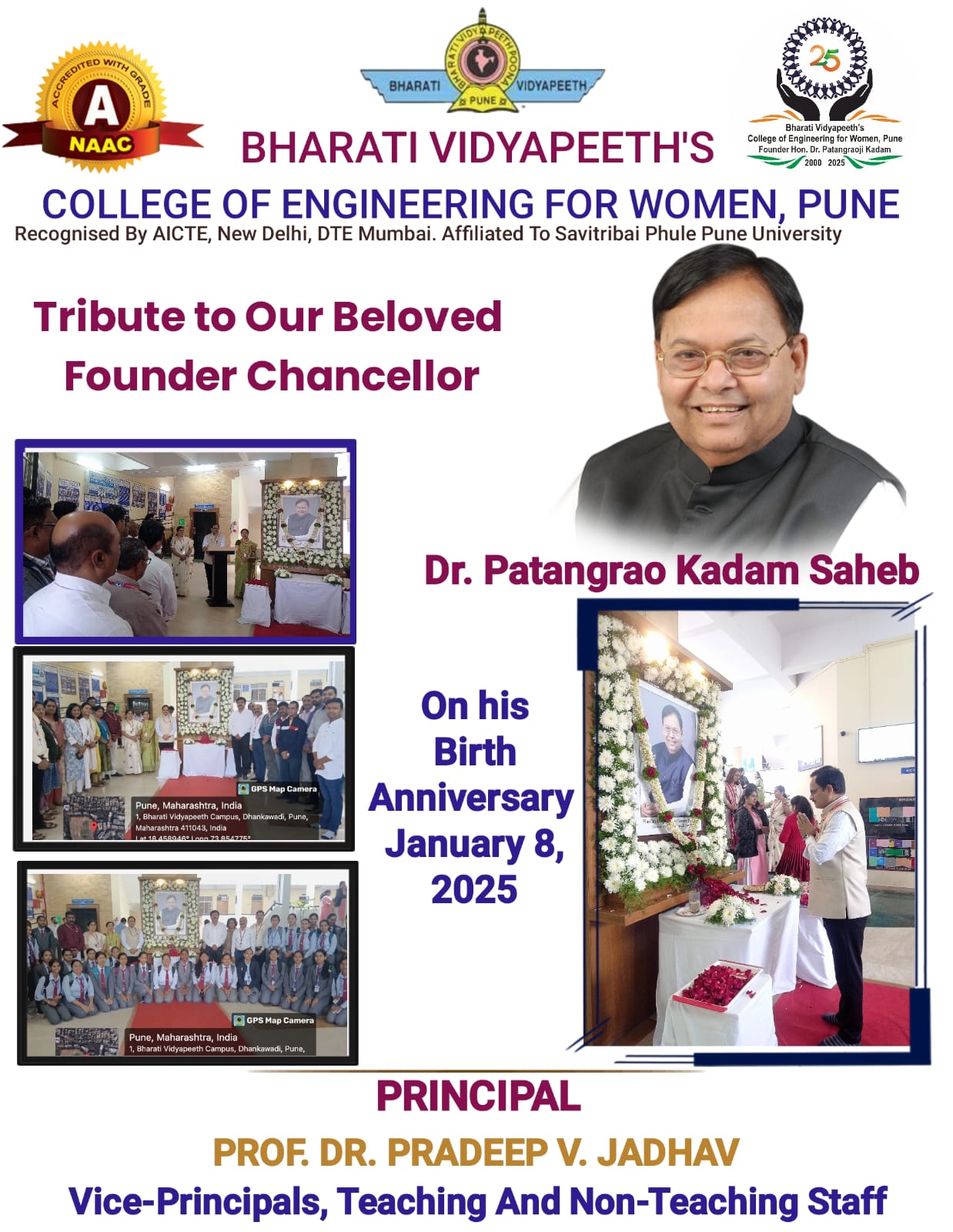
The 81st Birth Anniversary Celebration of Hon. Dr. Patangrao Kadam Saheb
Bharati Vidyapeeth's College of Engineering for Women, Pune The 81st Birth Anniversary Celebration of Hon. Dr. Patangrao Kadam Saheb, Founder of Bharati Vidyapeeth, Chancellor of Bharati Vidyapeeth (Deemed to be University), and Former Cabinet Minister of Maharashtra, was celebrated on 8th January 2025 with great respect and enthusiasm at Bharati Vidyapeeth's College of Engineering for Women, Pune. The event commenced with Prof. Dr. Deepali Godse, Head of the Information Technology Department, delivering an insightful reflection on the inspiring life journey of Hon. Dr. Patangrao Kadam Saheb, emphasizing his invaluable contributions to education and society. The program also featured a motivational speech by Principal Prof. Dr. Pradeep V. Jadhav, who paid tribute to Dr. Kadam Saheb's remarkable vision and enduring legacy, inspiring everyone to carry forward his mission. The event began with a floral tribute to honor Dr. Kadam Saheb. This tribute was led by:Principal Prof. Dr. Pradeep V. Jadhav Vice Principal (Academics) Dr. Suvarna Chorage, Vice Principal (Administration) Prof. Dr. Avinash Pawar, Heads of Departments, including Prof. Dr. S. R. Patil (Electronics and Telecommunication Engineering), Prof. D. D. Pukale (Computer Engineering), and Dr. Deepali Godse (Information Technology). The event saw active participation from senior faculty members, teaching and non-teaching staff, and students, who gathered to pay homage and draw inspiration from the exemplary life of Hon. Dr. Patangrao Kadam Saheb. The celebration served as a reminder of Dr. Kadam Saheb's profound impact on the educational landscape and society, inspiring all attendees to uphold and advance his legacy.
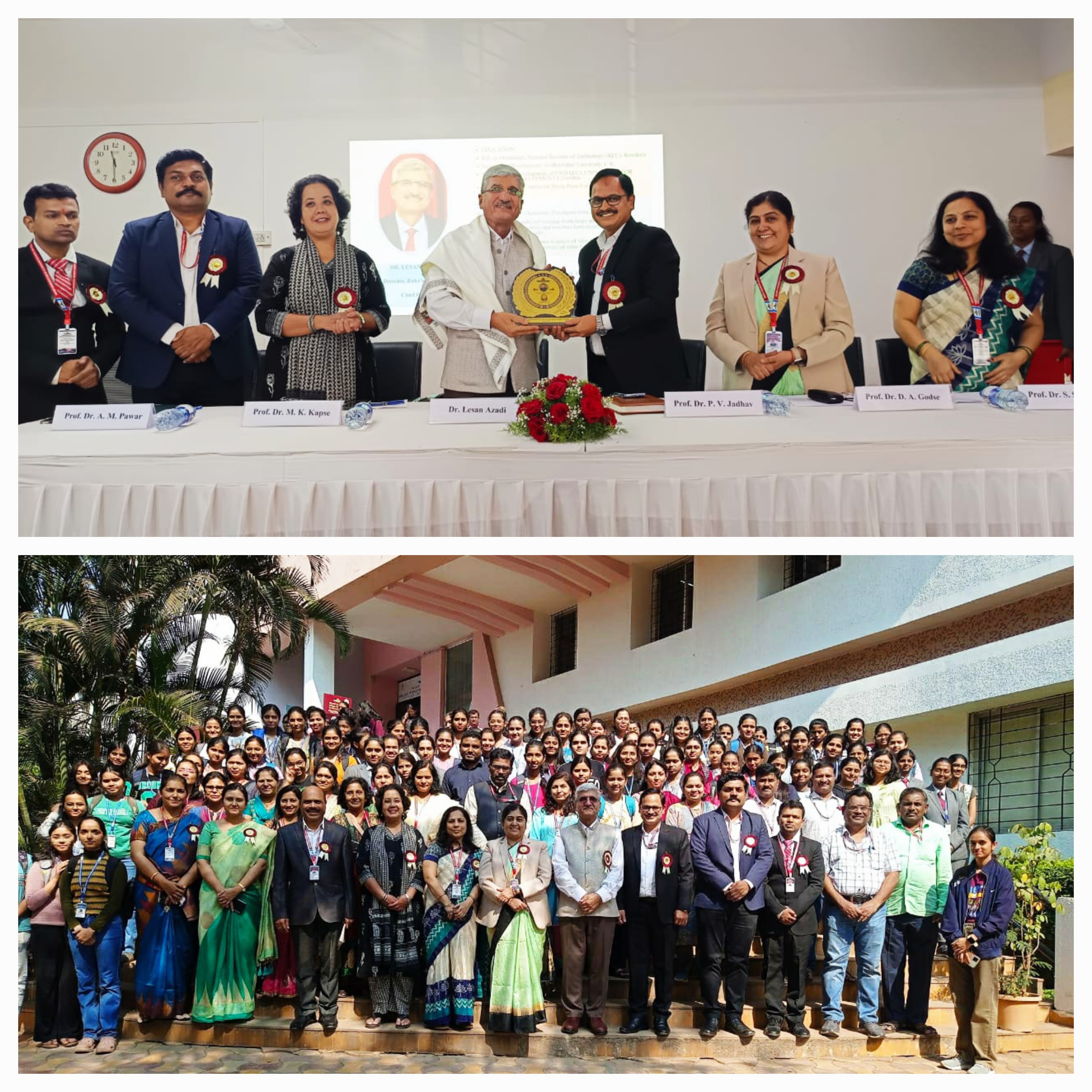
"वैयक्तिक विकास व सामाजिक प्रगतीसाठी सार्वत्रिक मानवी मूल्ये" या विषयावर एक दिवसीय कार्यशाळा
पुणे, ९ जानेवारी २०२५: भारती विद्यापीठाचे संस्थापक डॉ. पतंगराव कदम साहेब यांच्या जयंतीनिमित्त आणि मा. डॉ. विश्वजीत कदम, भारती विद्यापीठाचे कार्यवाह व प्र-कुलगुरू यांच्या वाढदिवसानिमित्त भारती विद्यापीठाच्या महिला अभियांत्रिकी महाविद्यालयात "वैयक्तिक विकास व सामाजिक प्रगतीसाठी सार्वत्रिक मानवी मूल्ये" या विषयावर एक दिवसीय कार्यशाळा आयोजित करण्यात आली. या कार्यशाळेचा उद्देश शिक्षक, शिक्षकेतर कर्मचारी आणि विद्यार्थ्यांना सार्वत्रिक मानवी मूल्यांचे महत्त्व पटवून देत त्यांच्या वैयक्तिक व सामाजिक जीवनात सकारात्मक बदल घडवून आणणे हा होता. या कार्यशाळेसाठी डॉ. लेसन अझादी, बहाई अकादमीचे संचालक, हे प्रमुख पाहुणे व प्रमुख मार्गदर्शक म्हणून उपस्थित होते. आपल्या प्रेरणादायी भाषणात त्यांनी सांगितले की, "सार्वत्रिक मानवी मूल्ये ही व्यक्तिमत्व विकास आणि समाजाच्या प्रगतीचा गाभा आहेत. हि मूल्य आचरणात आणल्यास आपले केवळ व्यक्तिमत्त्व सुधारता येत नाही तर आपण समाजाच्या उभारणीसाठी महत्त्वाचे योगदानही देऊ शकतो." महाविद्यालयाचे प्राचार्य डॉ. प्रदीप जाधव यांनी या कार्यशाळेच्या आयोजनाचे कौतुक केले. ते म्हणाले, "मानवी मूल्यांचा अभ्यास हा केवळ शैक्षणिक क्षेत्रापुरता मर्यादित नसून, तो समाजासाठी दिशादर्शक ठरतो. अशा उपक्रमांमुळे महाविद्यालयातील प्रत्येक व्यक्तीच्या व्यक्तिमत्त्वात सृजनशीलता व सकारात्मकता निर्माण होते." कार्यक्रमाच्या संयोजिका प्रा. डॉ. दीपाली गोडसे यांनी सर्व उपस्थितांचे आभार मानले आणि सांगितले की, "महाविद्यालयात अशा प्रकारच्या उपक्रमांमुळे शिक्षण आणि मूल्यांचा संगम साधला जातो, जो विद्यार्थ्यांच्या जीवनासाठी खूप उपयुक्त ठरतो." कार्यक्रमाची सुरुवात भारती विद्यापीठ गीत सादरीकरणाने झाली. वैष्णवी राऊत या विद्यार्थिनीने सरस्वती वंदना सादर केली. प्रा. सिमी खान यांनी प्रमुख पाहुण्यांची ओळख करून दिली, तर प्रा. स्मिता गोड यांनी सूत्रसंचालन कौशल्याने पार पाडले. या कार्यशाळेला प्रा. डॉ. अविनाश पवार (उपप्राचार्य प्रशासन), प्रा. डॉ. सुवर्णा चोरगे (उपप्राचार्य शैक्षणिक) यांच्यासह सर्व विभागप्रमुख, शिक्षक व विद्यार्थी मोठ्या संख्येने उपस्थित होते. कार्यक्रमाचे समन्वयक प्रा. डॉ. महारुद्र कापसे यांनी संपूर्ण कार्यशाळेचे व्यवस्थापन उत्कृष्टरीत्या पार पाडले. त्यांनी कार्यक्रमाच्या यशस्वी आयोजनामागील सर्व सहकाऱ्यांचे आभार मानले आणि या कार्यशाळेचा मुख्य हेतू प्रत्येक व्यक्तीला जीवनात सार्वत्रिक मानवी मूल्ये आत्मसात करण्यास प्रोत्साहित करणे असल्याचे सांगितले. कार्यक्रमाचा समारोप संवाद सत्राने झाला. या सत्रात सहभागी सदस्यांनी सार्वत्रिक मानवी मूल्यांच्या प्रत्यक्ष उपयोगांवर चर्चा केली. या कार्यशाळेमुळे विद्यार्थ्यांना प्रेरणा मिळाली आणि उपस्थितांनी सकारात्मक बदल घडविण्याची इच्छा व्यक्त केली. कार्यशाळेच्या यशस्वी आयोजनासाठी महाविद्यालयातील सर्व शिक्षक, शिक्षकेतर कर्मचारी व विद्यार्थी यांचे योगदान महत्त्वाचे ठरले. हा उपक्रम केवळ एक कार्यक्रम न राहता, प्रत्येकाच्या जीवनात नवीन दृष्टीकोन निर्माण करणारा ठरला.
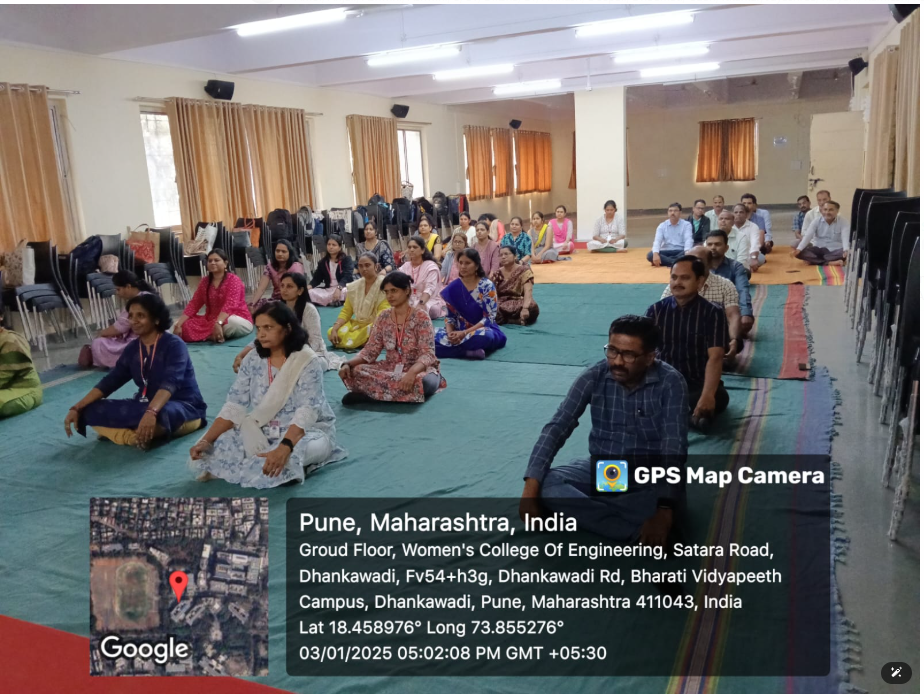
HaBuild Yoga Session on Mobility & Flexibility
We are delighted to share that Bharati Vidyapeeth's College of Engineering for Women participated in an enriching HaBuild Yoga Session on Friday, 3rd January 2025. The session focused on mobility and flexibility, providing valuable insights and practical exercises to enhance both physical and mental well-being. It was an incredibly refreshing experience that left participants feeling rejuvenated and energized. A heartfelt thank you to our Principal Sir Prof. Dr. Pradeep V. Jadhav for encouraging us to prioritize holistic wellness through such initiatives. Let’s continue embracing wellness as a part of our daily lives!
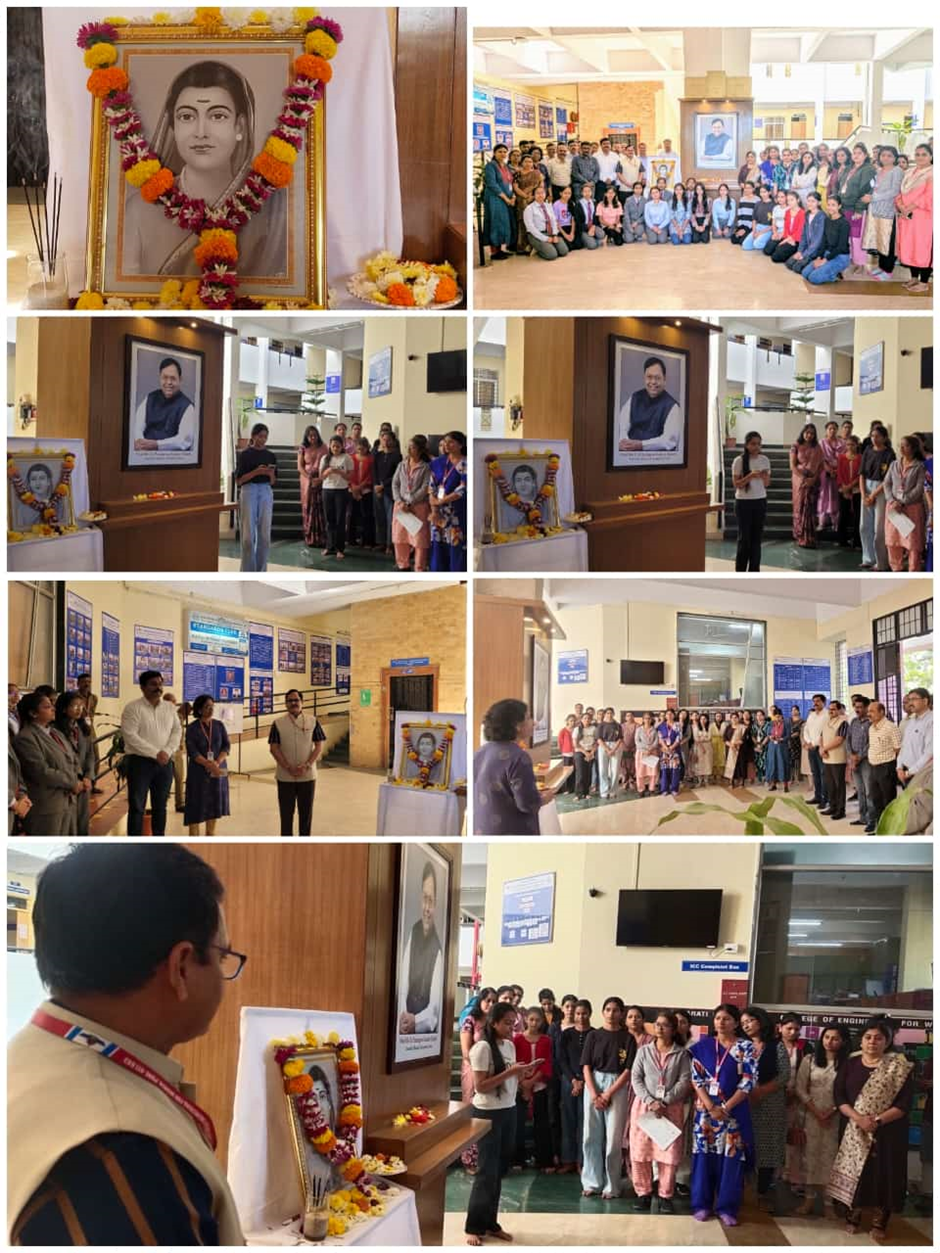
Savitribai Phule Jayanti Celebration at BVCOEW
The Savitribai Phule Jayanti was celebrated with great enthusiasm at Bharati Vidyapeeth’s College of Engineering for Women on 3rd January 2025.
This significant event was coordinated by the National Service Scheme (NSS) and featured a series of activities aimed at spreading awareness about Savitribai Phule's monumental contributions to education and social reform.
The celebration witnessed active participation from students, teaching and non-teaching staff, as well as administrative members, who came together to honour the legacy of Savitribai Phule. The event provided a platform to reflect upon her relentless efforts in breaking societal barriers and championing the cause of women's education and equality.
A highlight of the event was the Principal's address, which shed light on the life and accomplishments of Savitribai Phule. The speech emphasized her pioneering role in transforming society through education and inspired students to carry forward her values of empowerment, equality, and social justice in their own lives.
Through this celebration, the institution paid tribute to one of India's greatest social reformers and reinforced a collective commitment towards building an inclusive and equitable society, echoing the principles upheld by Savitribai Phule.
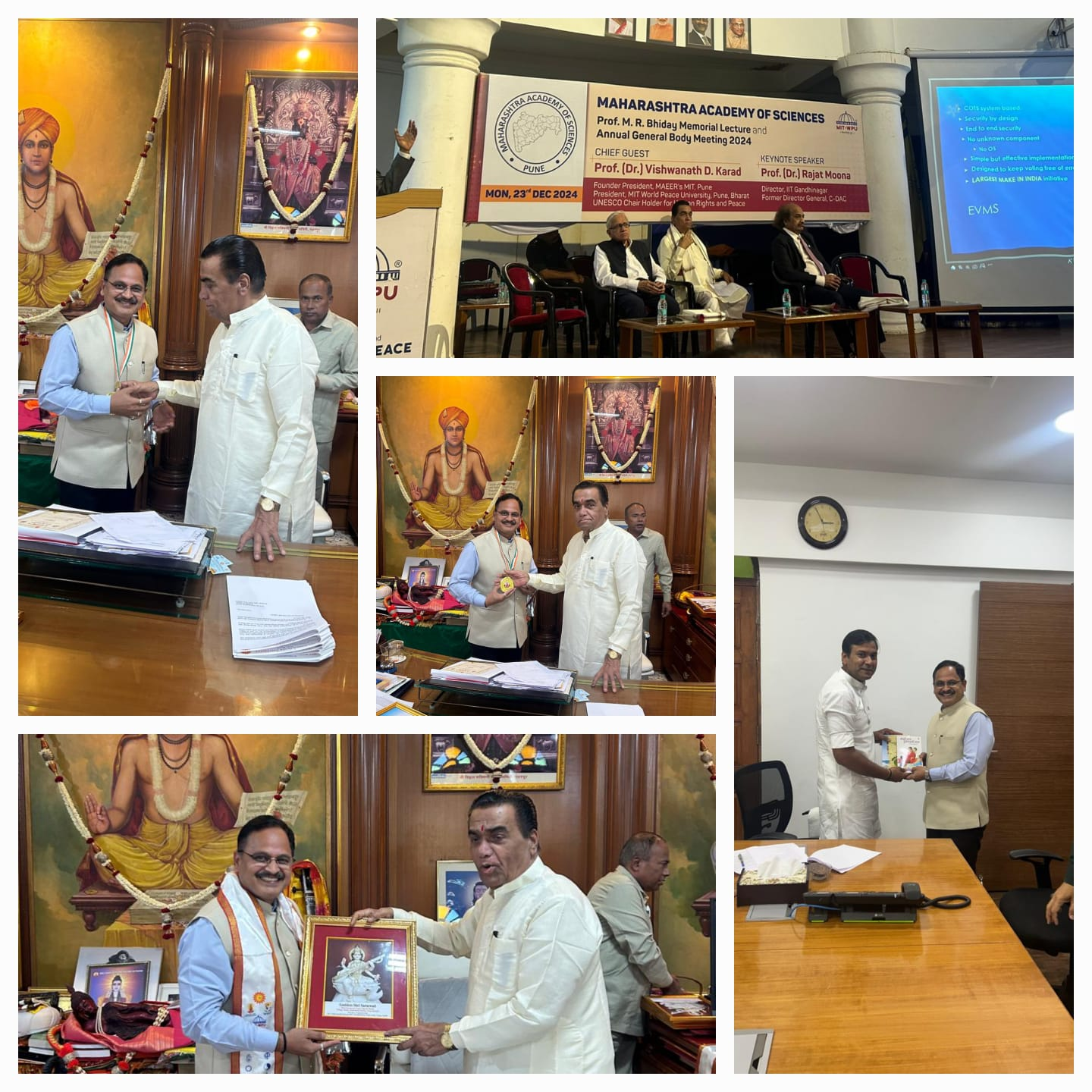
Proud Moment for BVCOEW
It is a matter of immense pride and joy to share that our respected Principal, Prof. Dr. Pradeep V. Jadhav Sir was felicitated by the revered Prof. Dr. Vishwanath Karad and Prof. Dr. Rahul Karad during the prestigious Maharashtra Academy of Sciences Induction Program held today (23rd December 2024) at MIT College of Engineering, MIT World Peace University. This recognition reflects his exceptional contributions to academics and research, bringing great honour to our institute. Hearty Congratulations
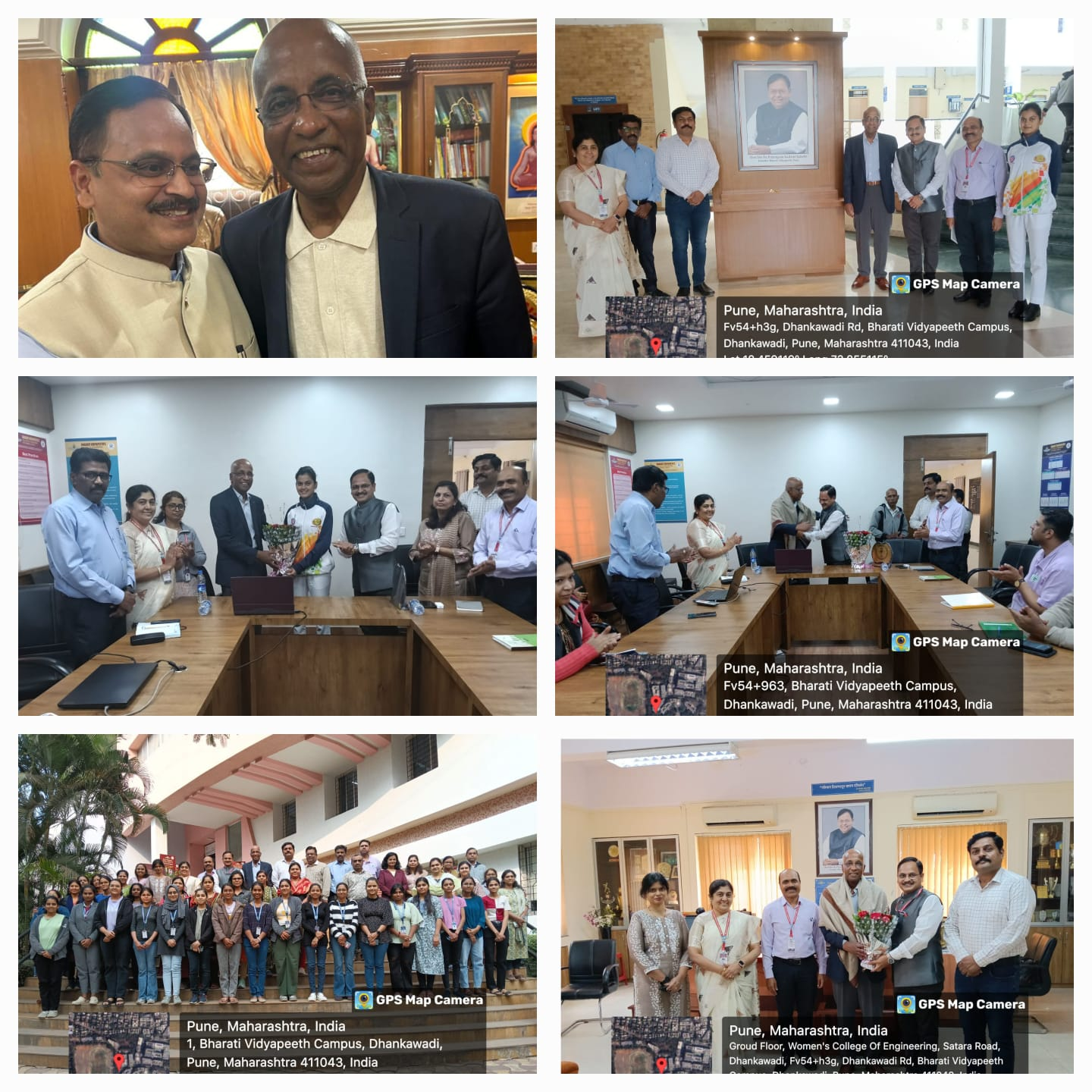
Inspiring Guest Lecture by Prof. Dr. Mahantesh Hiremath at BVCOEW
On 24th December 2024, Bharati Vidyapeeths College of Engineering for Women (BVCOEW) had the privilege of hosting an inspiring guest lecture by the distinguished Hon'ble Dr. Mahantesh Hiremath.
Renowned for his groundbreaking contributions to engineering and space research, Dr. Hiremath captivated the audience with his insightful talk on "My Journey in Engineering." His lecture provided a fascinating glimpse into rocket launches and space visualization, leaving the audience enriched and motivated.
The event commenced with the felicitation of Dr. Hiremath by Principal Prof. Dr. Pradeep V. Jadhav, followed by a special moment where Dr. Hiremath felicitated Ms. Vedika Rajemane for her remarkable achievement in being selected for the National Republic Day Parade.
Following the lecture, Dr. Hiremath engaged in an interactive session with faculty members, where he generously shared his valuable experiences and knowledge, fostering an environment of learning and inspiration.
The program witnessed enthusiastic participation from all Heads of Departments and faculty members, including:
- Prof. Dr. A. M. Pawar (VP Administration and Head of First Year Engineering)
- Prof. Dr. S. R. Patil (Head of Department, Electronics and Telecommunication)
- Prof. Dr. D. A. Godse (Head of Department, Information Technology)
- Prof. D. D. Pukale (Head of Department, Computer Engineering)
The seamless event coordination was led by Dr. Ketaki Amit Malgi, ensuring its success.
BVCOEW extends heartfelt gratitude to Hon'ble Dr. Mahantesh Hiremath for his time, wisdom, and invaluable insights that have undoubtedly left a lasting impact on all attendees.
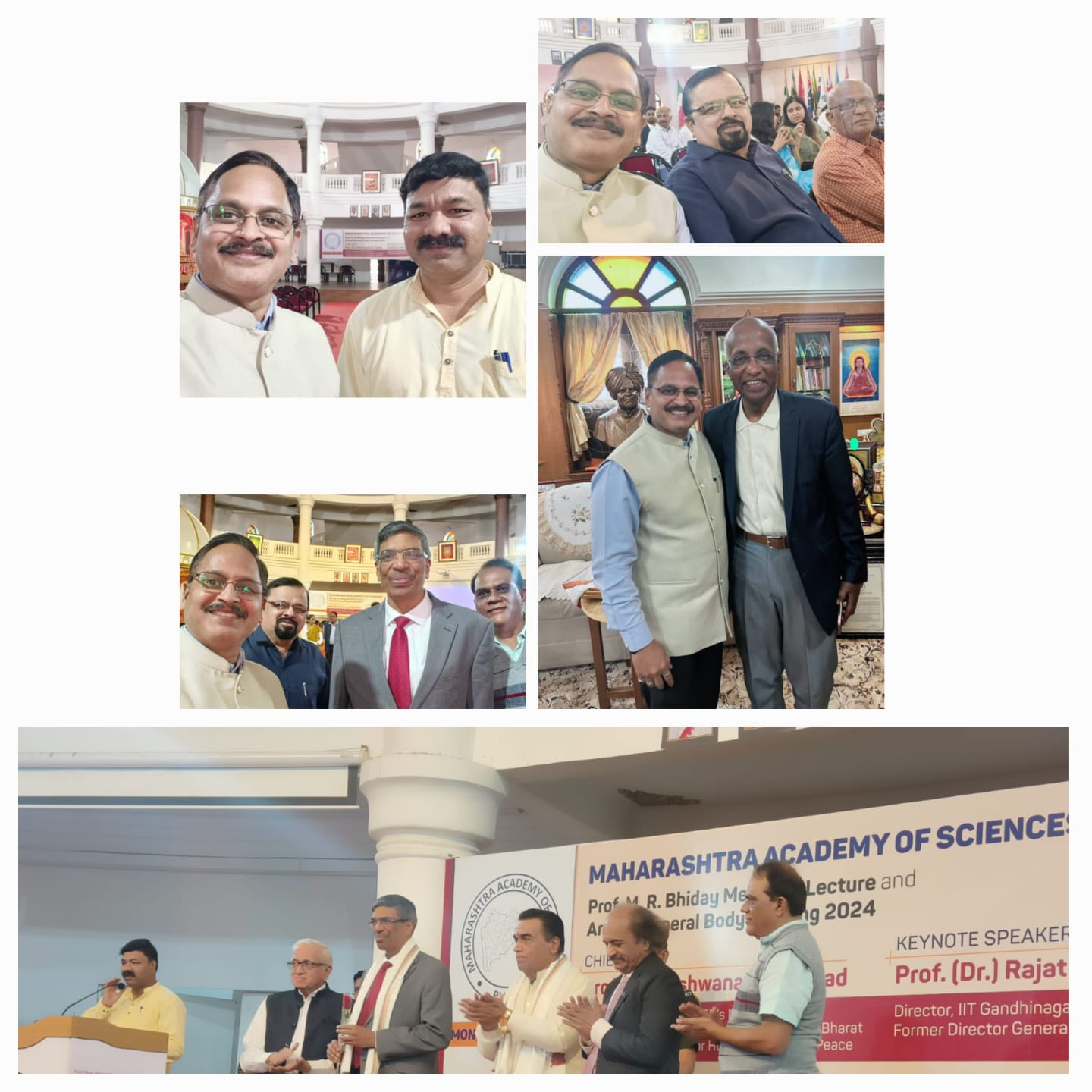
Maharashtra Academy of Sciences Induction Program and Annual General Meeting
On 23rd December 2024, the Maharashtra Academy of Sciences Induction Program and its Annual General Meeting was held at MIT College of Engineering, MIT World Peace University. Our esteemed Principal, Prof. Dr. Pradeep V. Jadhav, had the privilege to meet and interact with several eminent personalities from the academic and scientific community.
The event brought together distinguished leaders and experts, including:
- Dr. Mahantesh Hiremath – Advisor/Consultant in Startup Mentoring, Space Technology and Exploration, Strategy and Business Development, and the 140th President of ASME (2021-22), affiliated with Santa Clara University and Stanford University, San Francisco.
- Dr. B. B. Kale – Scientist, C-MET, Pune.
- Prof. G. D. Yadav – Vice Chancellor, Institute of Chemical Technology (ICT), Mumbai.
- Prof. N. J. Pawar – Vice Chancellor, Shivaji University, Kolhapur.
- Dr. Prakash Wadgaonkar – Expert in Polymer Science and Engineering Division.
- Dr. Dinesh Amalnerkar – Advisor-Research & International Academics, Pimpri Chinchwad College of Engineering & Pimpri Chinchwad University, and Former Director General, C-MET.
The event provided a valuable platform for knowledge exchange, fostering collaborations, and discussions on advancements in science and technology. Such engagements continue to inspire and guide the academic and research endeavours at BVCOEW
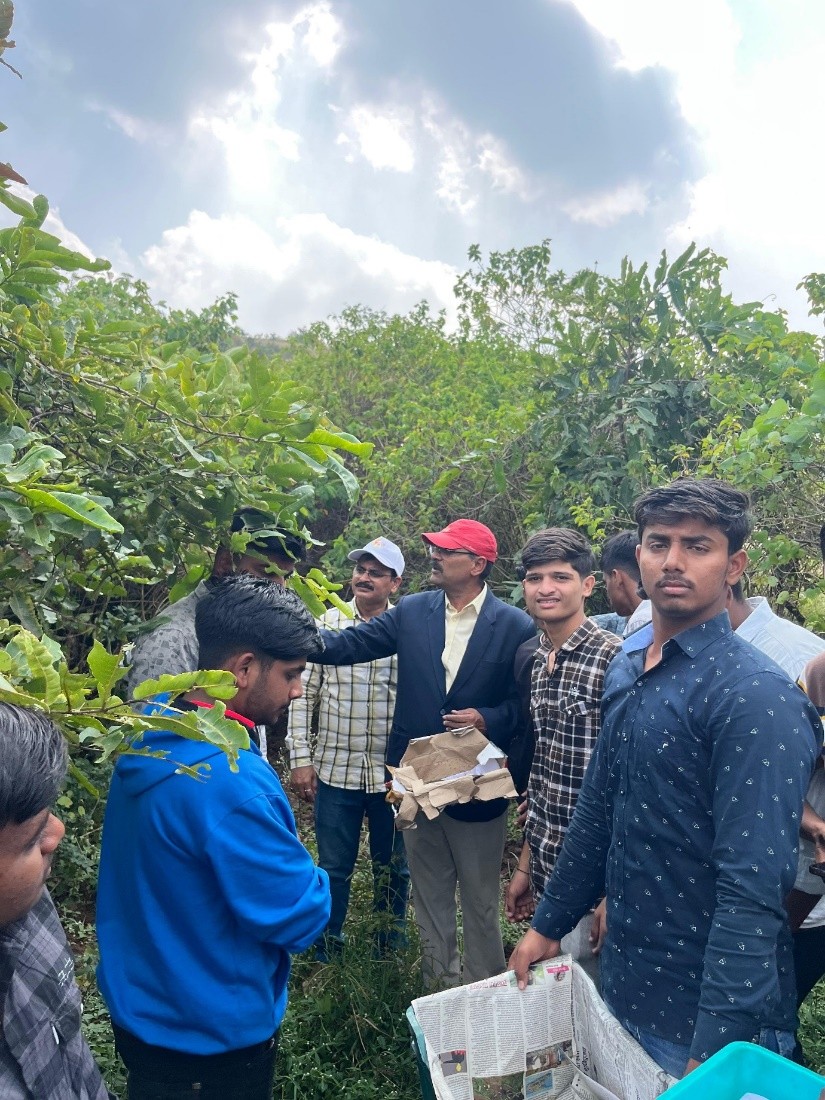
वन्य रेशीम तथा Wild सिल्क याचं प्रत्यक्ष संवर्धन,संगोपन
भारती विद्यापीठाचे लोकनेते मोहनराव कदम कृषी महाविद्यालय कडेगाव येथील प्रथम वर्षाच्या विद्यार्थ्यांनी आज वन्य रेशीम तथा Wild सिल्क याचं प्रत्यक्ष संवर्धन,संगोपन या अनुषंगाने महाविद्यालय परिसरातील अर्जुन वृक्षावर अंडीपुंज,नुकतेच जन्मलेले कीटक सोडून त्याचे प्रात्यक्षिक केले.यापुढे 70 दिवस निसर्गात या नैसर्गिक वन्य रेशमाचा प्रात्यक्षिक महाविद्यालयातील सर्वच वर्षातील विद्यार्थी याचा लाभ घेणार आहेत .प्राचार्य ,डॉ.अधिकराव जाधव यांच्या मार्गदर्शनाखाली सदर वन्य रेशमाच्या संगोपन तडसर परिसरातील जंगलामध्ये ऐन,अर्जुन नैसर्गिक झाडावर पूर्ण करण्यासाठी सुद्धा विद्यार्थ्यांनी या किडींचा झाडावर सोडून संवर्धनाच्या अनुषंगाने धडे घेतले. महाविद्यालयातील प्रथम वर्षाचे विद्यार्थी मोठ्या प्रमाणात उपस्थित होते तसेच भारतीय विद्यापीठ पुणे वुमेन कॉलेज फॉर इंजिनिअरिंग पुणे चे प्राचार्य,प्रदीप जाधव हे देखील या कौशल्य विकास व एन्ट्री पुनर्शिप कार्यक्रमाला जॉईन झाले होते.

मा. प्रा. डॉ.शिवाजीराव कदम सर (कुलपती, भारती विद्यापीठ पुणे ), मा.आमदार डॉ.विश्वजीत कदम साहेब (कार्यवाह, भारती विद्यापीठ पुणे ), मा.अस्मिता ताई जगताप (कार्यकारी संचालक हेल्थ सायन्स भारती विद्यापीठ पुणे), प्रा. डॉ. विवेक सावजी (कुलगुरू भारती विद्यापीठ पुणे) यांच्या हस्ते NAAC कडून A ग्रेड मानांकन (भारती विद्यापीठ कॉलेज ऑफ इंजीनियरिंग फॉर वुमेन पुणे) मिळाले याबद्दल सत्कार स्वीकारताना.
Heartiest Congratulations to Dr. Milind Patwardhan on successfully defending his PhD viva voce in Physics
Heartiest Congratulations to Dr. Milind Patwardhan on successfully defending his PhD viva voce in Physics His research on "Superconducting Magnetic Energy Storage (HTS-SMES) Devices for Smart Grid Applications " is a remarkable achievement. Wishing him all the best for his future endeavors

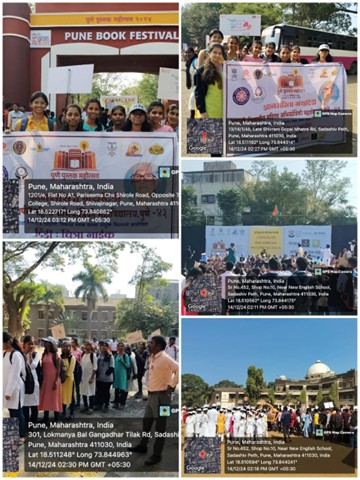
National Festival Book Granth Dindi, Bharati Vidyapeeth's College of Engineering for Women Pune-43 (A-051).
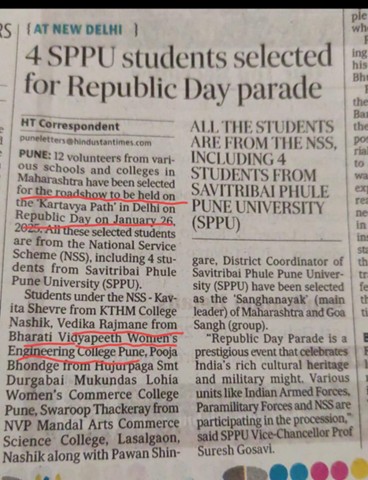
प्रजासत्ताक दिन पथसंचलन : पुणे विद्यापीठातील चार स्वयंसेवक, एका संघनायकाची निवड
दिल्ली येथील कर्तव्यपथावर होणाऱ्या पथसंचलनासाठी महाराष्ट्रातील विविध विद्यापाठातून १२ स्वयंसेवकांची निवड करण्यात आली आहे. निवड झालेले हे सर्व विद्यार्थी राष्ट्रीय सेवा योजनेचे आहेत.
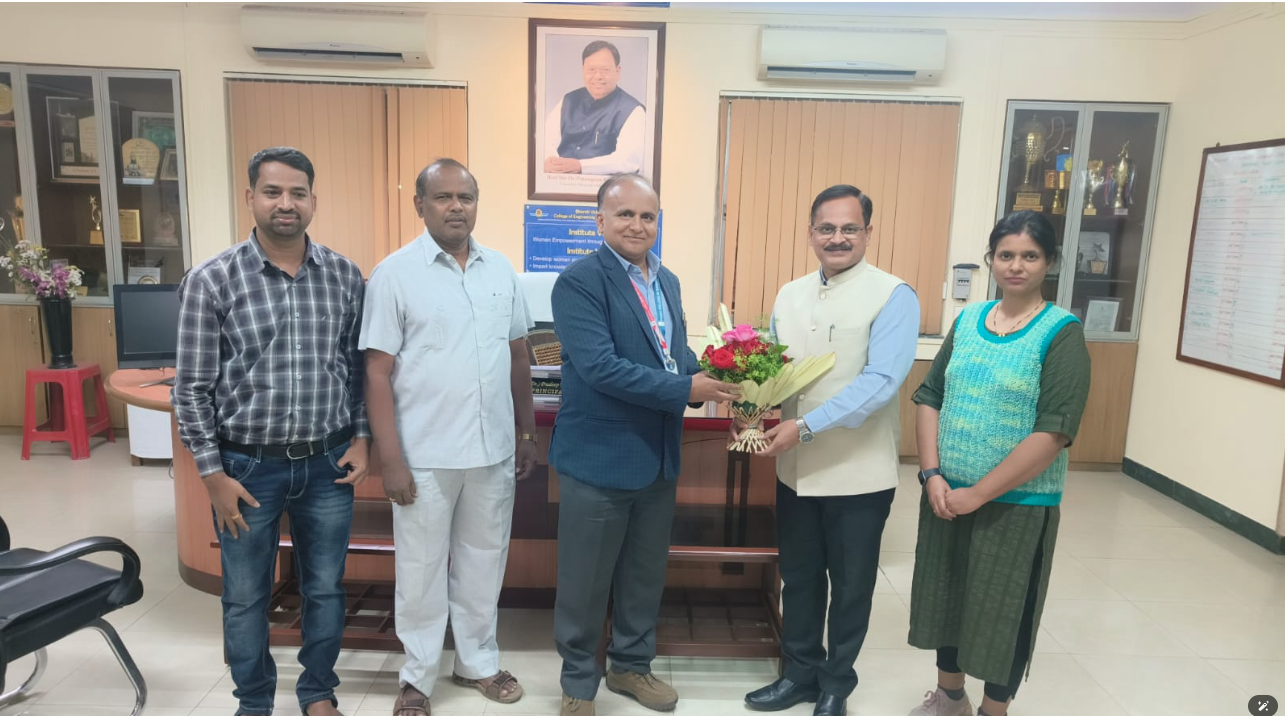
Dr. Rajesh Prasad, Principal of BVDU College of Engineering, Pune, Visits BVCOEW
On Thursday, 19th December 2024, Bharati Vidyapeeth's College of Engineering for Women (BVCOEW) had the honour of hosting Dr. Rajesh Prasad, Principal of Bharati Vidyapeeth (Deemed to be University) College of Engineering, Pune, for his first official visit to the institute. Prof. Dr. Pradeep V. Jadhav, Principal of BVCOEW, warmly felicitated Dr. Rajesh Prasad on this special occasion. During his visit, Dr. Prasad shared valuable insights and his perspective on the IDEA Lab initiative, emphasising its role in fostering innovation, interdisciplinary collaboration, and student skill development BVCOEW thanks Dr. Rajesh Prasad for his time, guidance, and inspiring interaction with faculty and students.
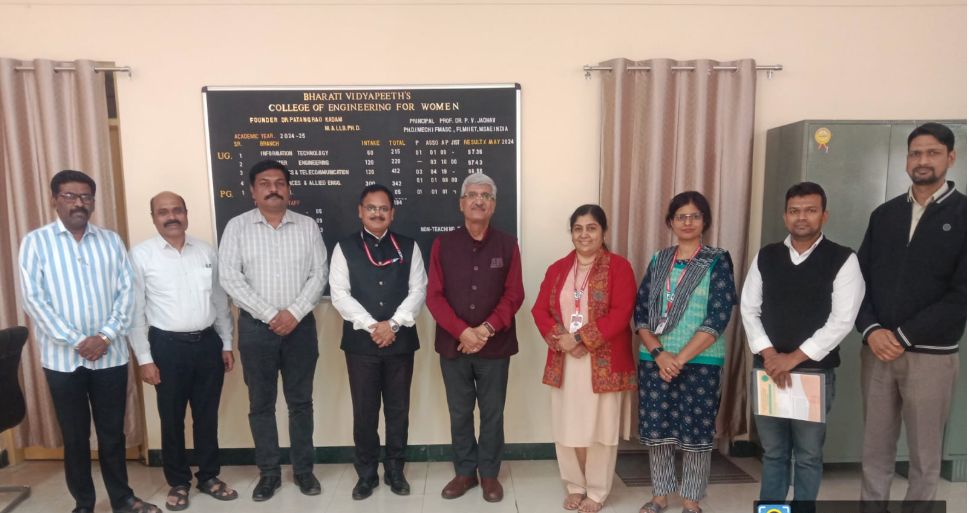
Collaboration Between Bhai Academy and Bharati Vidyapeeth's College of Engineering for Women
Dr. Lesan Azadi, Director of Bhai Academy visited Bharati Vidyapeeth's College of Engineering for Women to explore the signing of a Memorandum of Understanding (MoU) between the two esteemed institutions. This collaboration aims to enrich education by introducing Universal Human Values as a foundational course fostering personal growth and contributing to social progress. During the productive meeting with Principal Dr. Pradeep Jadhav, Vice Principal Dr. Avinash Pawer and Heads of Departments including Dr. Sandeep Patil, Head E&TC, Prof. D.D. Pukale, Head Computer Department Dr. Deepali Godse, Head IT, Dr. Ketaki Malgi and Dr. Maharudra Kapse. The plans were outlined to conduct an introductory session on 9th January 2025 from 11:00 a.m. to 1:00 p.m. for teaching and non-teaching staff as well as students. Dr. Azadi also proposed two specialized training programs—one for teaching staff and another for non-teaching staff—highlighting a commitment to professional development. The details of these programs will be finalized shortly. The meeting concluded on a highly positive note, with meaningful discussions paving the way for a promising partnership between Bhai Academy and Bharati Vidyapeeth's College of Engineering for Women.
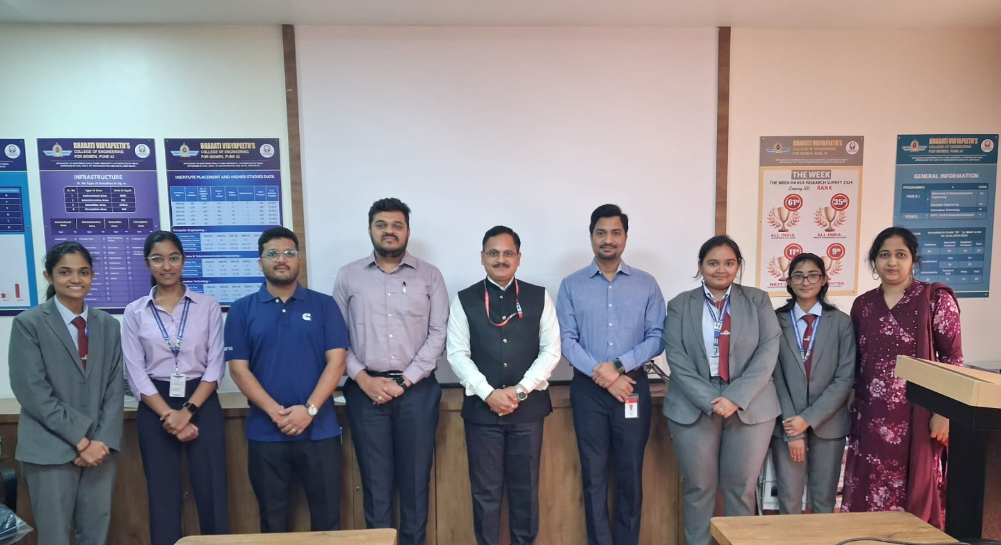
Good news about Cummins India Ltd. Internship Drive
We are delighted to announce that Cummins India Ltd. conducted an internship drive at Bharati Vidyapeeth's College of Engineering for Women, Pune. Principal Prof. Dr. Pradeep V. Jadhav had a productive discussion with HR Mr. Ayush Abhishek and his team on enhancing technical competencies and opening new opportunities for our students. Heartiest congratulations to Samruddhi Shinde, Priyal Bhagwat, Sakshi Pandey, and Shreyasee Patil for securing prestigious internships at Cummins India Ltd. with a monthly stipend of ₹25,000. Wishing them great success on this promising journey
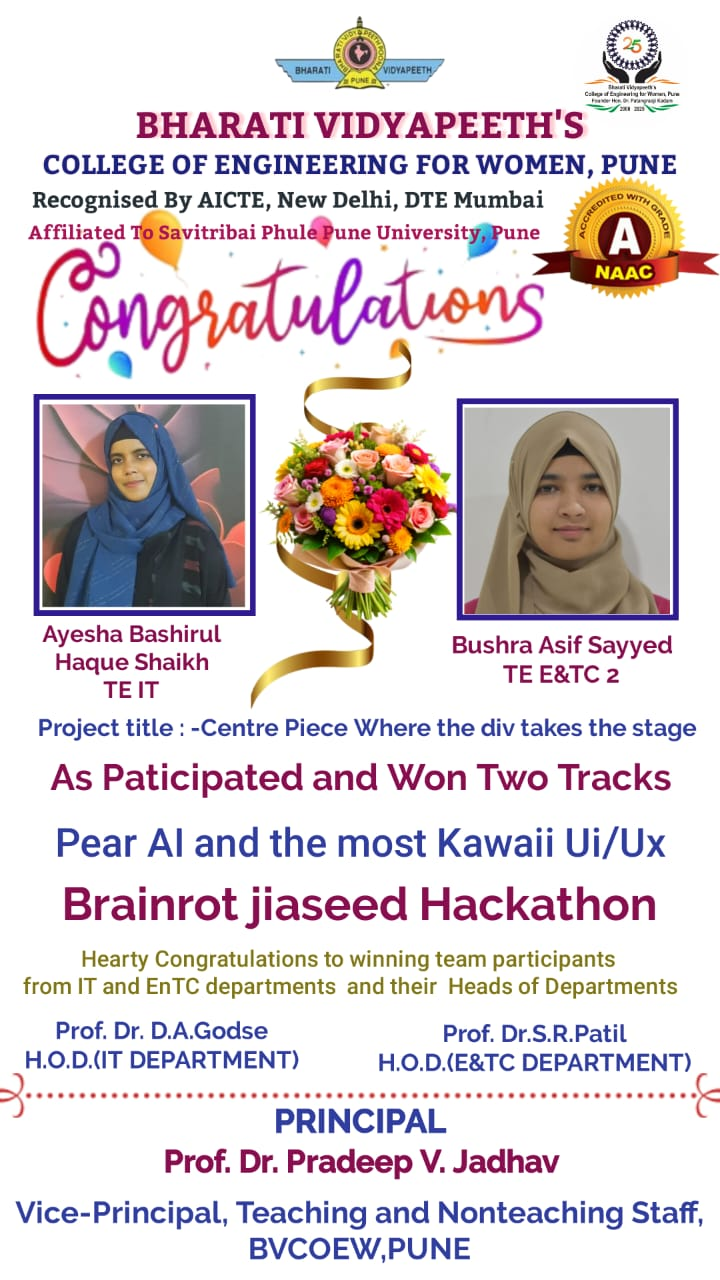
Centre Piece Where the div takes the stage
Good news Bharati Vidyapeeth's College of Engineering for Women is pleased to share that Project title: - Centre Piece Where the div takes the stage. Name of the hackathon: Brainrot jiaseed Hackathon Name of the participants: 1. Ayesha Bashirul Haque Shaikh (TE IT BVCOEW) 2. Bushra Asif Sayyed (TE ENTC 2 BVCOEW) Track 1 name: Pear Ai Track 2 name: The most Kawaii Ui/Ux Prize : 100$ each(200$ total) Hearty Congratulations to winning team participants and heads of EnTC and IT dept Prof. Dr S. R. Patil and Prof. Dr. D. A. Godse, Prof. Dr. Pradeep V. Jadhav Principal, BVCOEW
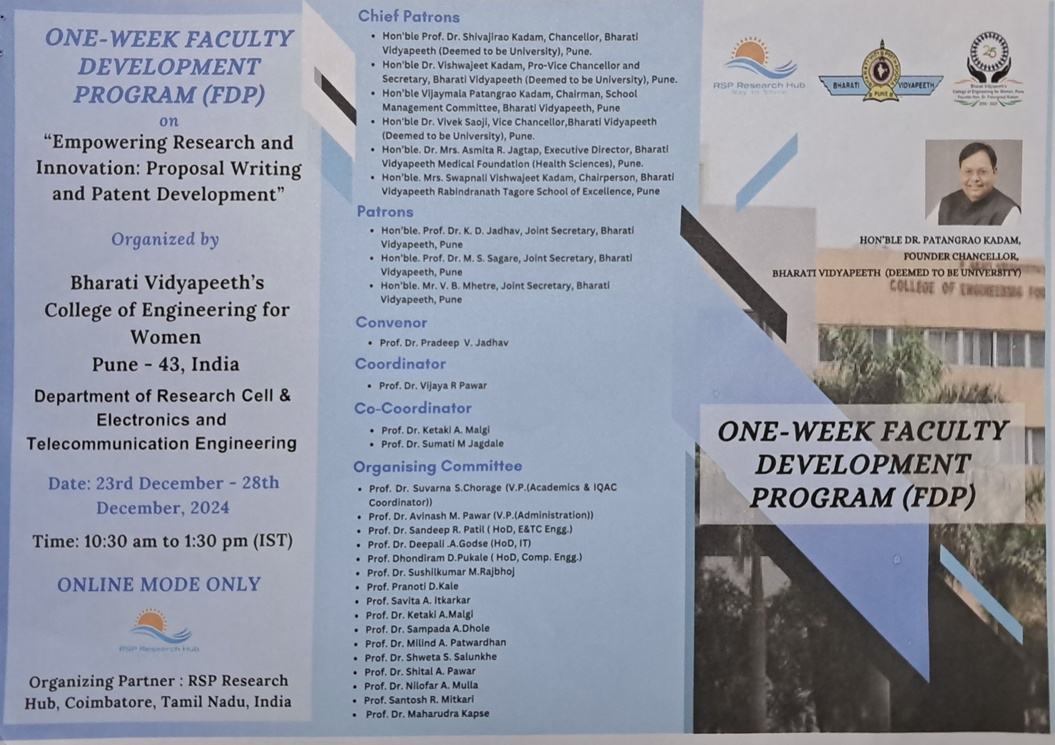
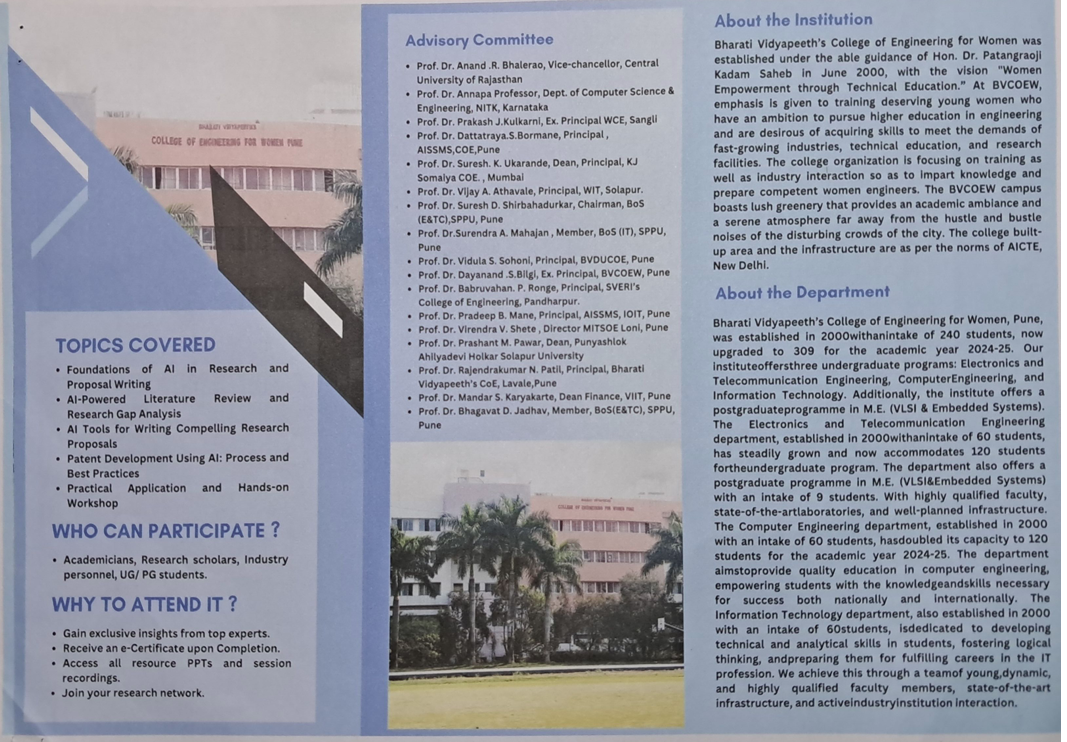
Empowering Research Innovation and Proposal Writing and Patent Development Faculty Development Program at BVCOEW
We are pleased to announce the commencement of the 1-week Faculty Development Program (FDP) on Empowering Research Innovation and Proposal Writing and Patent Development, organized by Bharati Vidyapeeth's College of Engineering for Women collaboration with RSVP Research Hub, located in Coimbatore, Tamil Nadu. This online FDP is scheduled from 23rd December to 28th December 2024 and aims to equip faculty members with essential skills in research, innovation, and intellectual property development. A total of 105 participants from various institutions have joined this insightful program, which focuses on enhancing research capabilities and developing effective proposals for grant applications and patent development. The convener for this program is Prof. Dr. Pradeep V. Jadhav, Principal, BVCOEW. The coordinator is Prof. Dr. Vijaya Pawar, and the co-coordinators are Prof. Dr. Ketaki Amit Malgi and Prof. Dr. Sumati Jagdale. We look forward to an engaging and fruitful week of learning and collaboration.
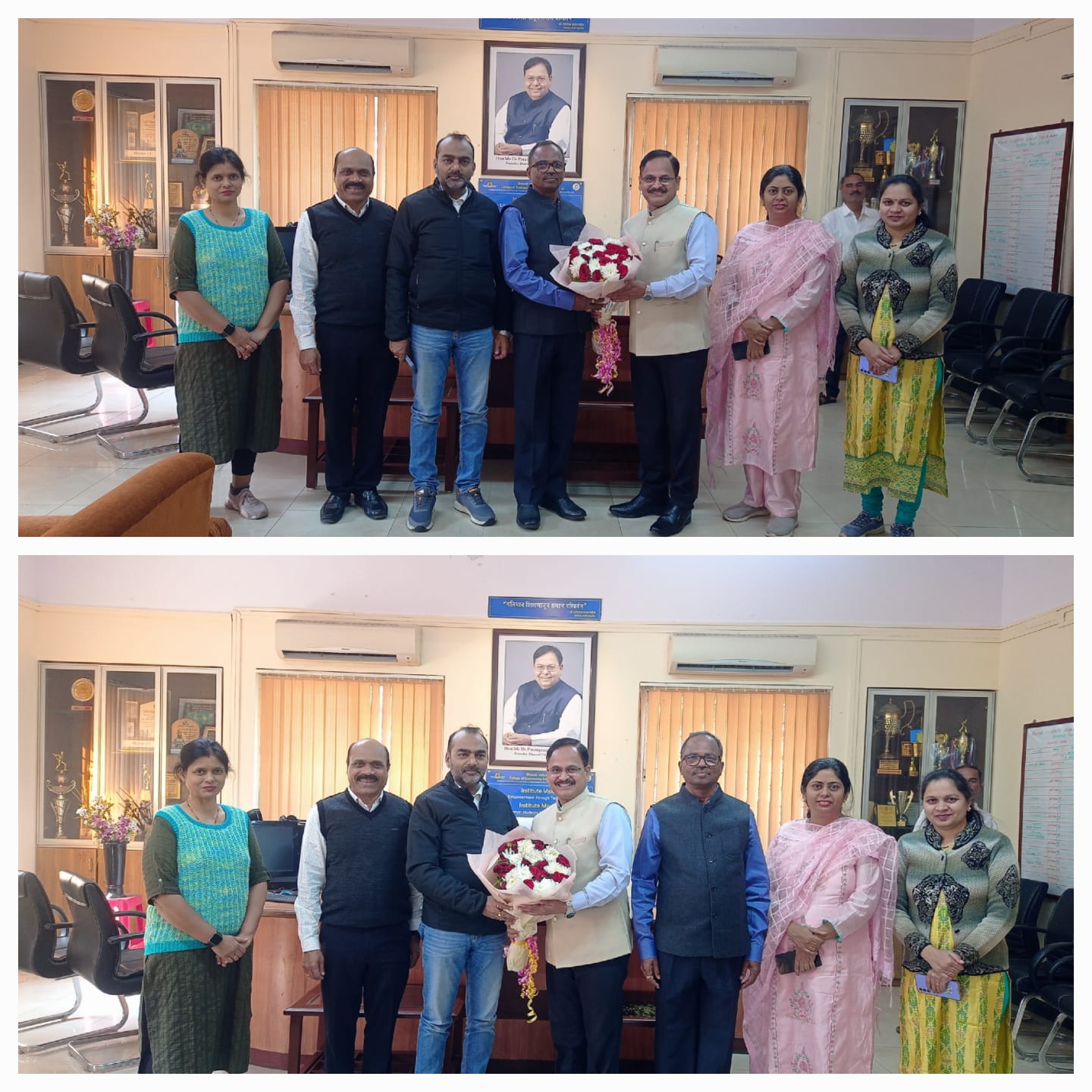
Esteemed Academic Leaders Visit BVCOEW for Insightful Interaction
We are pleased to share that Dr. RGB Bhagavath Kumar, Vice Chancellor of Damodaram Sanjivayya National Law University, Anantapur, Andhra Pradesh, and Dr. Vaibhav Goel Bhartiya, Principal of Swami Vivekanand Subharti University, Meerut, Uttar Pradesh, visited Bharati Vidyapeeth's College of Engineering for Women today. During their visit, we had an excellent interaction and a brief yet productive tour of the institute. Prof. Dr. S. R. Patil (HOD, ENTC), Prof. Dr. Ketaki Malgi (IT Department), Prof. Dr. Sonali Kadam, and Prof. Kanchan Warake (Computer Department) were present to welcome and engage with them. Their visit highlights our institute's reputation and commitment to academic excellence.
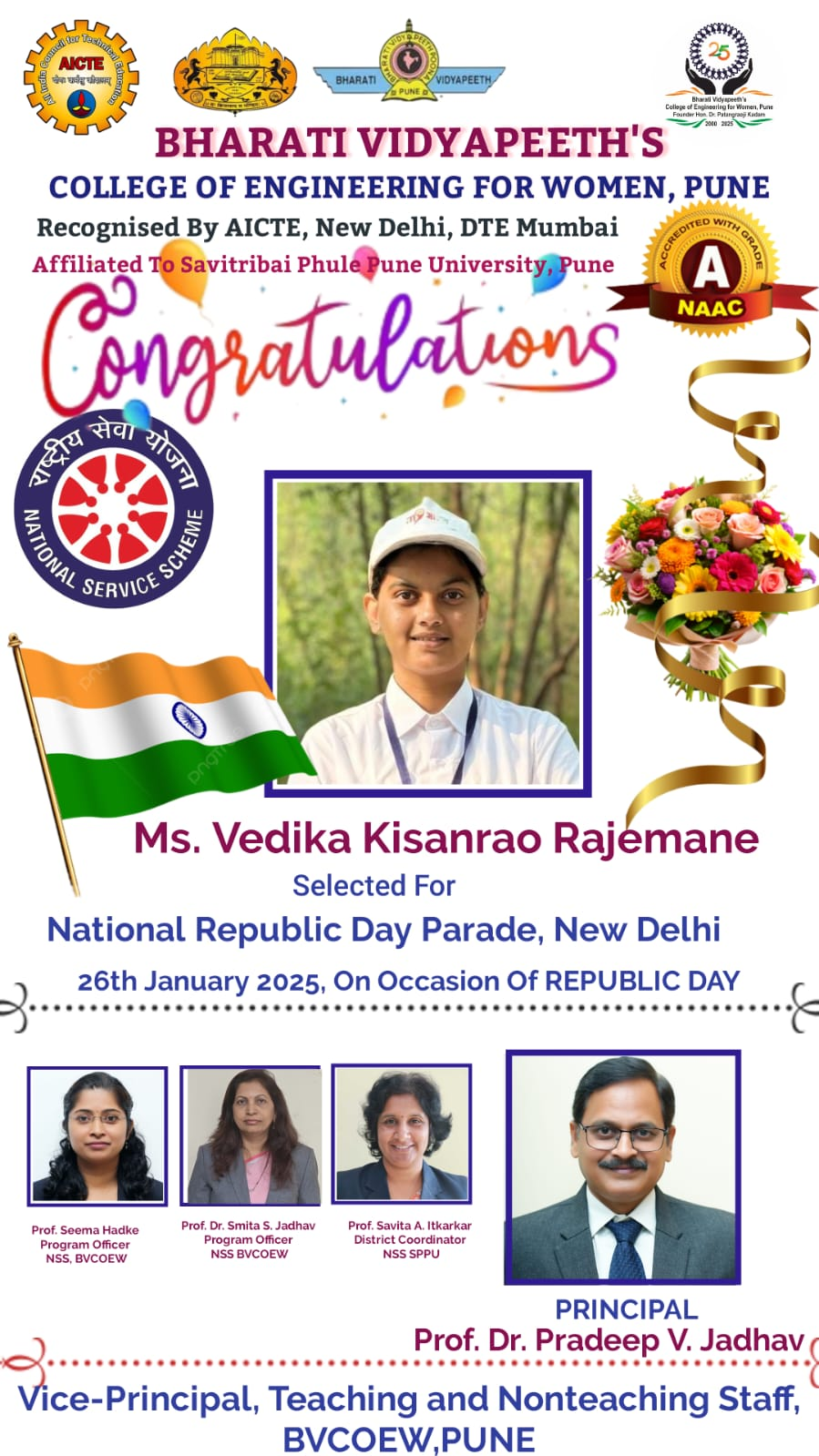
Heartiest Congratulations to Ms. Vedika Kisanrao Rajemane and the NSS Team
BV College of Engineering for Women, Pune, proudly announces that Ms. Vedika Kisanrao Rajemane has been selected for the prestigious National Republic Day Parade Camp, which will be held in New Delhi on 26 January 2025 to mark the occasion of Republic Day. This remarkable achievement reflects her dedication, hard work, and the relentless efforts of the NSS Team, led by Prof. Seema Hacke, Prof. Dr. Smita S. Jadhav (NSS Program Officers), Prof. Savita A. Itkarkar (District Coordinator, NSS SPPU), and Prof. Dr. Pradeep V. Jadhav, Principal BVCOEW, Pune. We extend our heartfelt congratulations to Ms. Vedika and all the NSS team members for this incredible accomplishment. You have made the institute proud
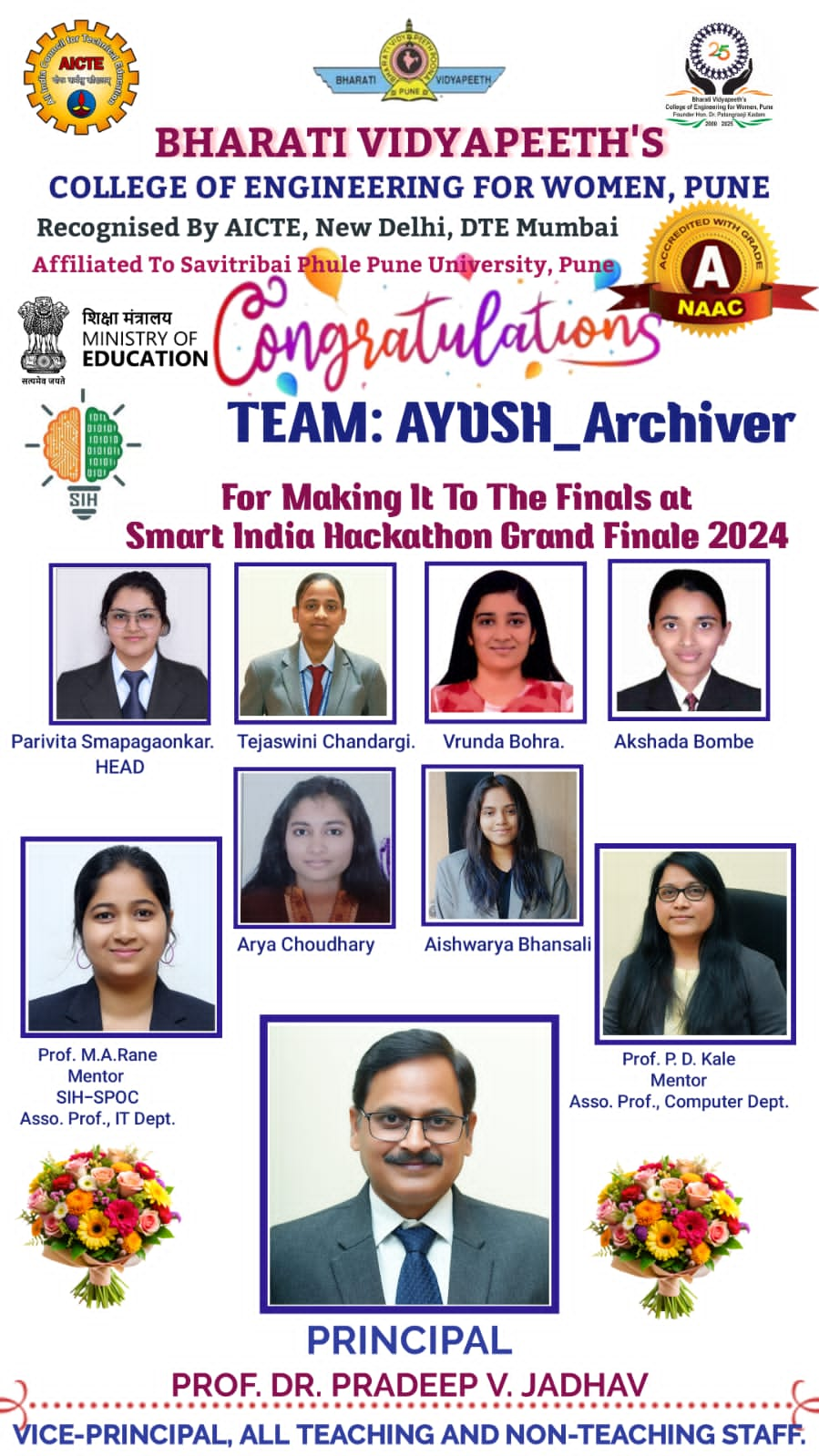
Bharati Vidyapeeth's College of Engineering for Women,Pune Team Ayush Archiever, For making it to the Finals at Smart India Hackethon Grand Finale 2024.
Expert Session on Autonomous College Status Application Process
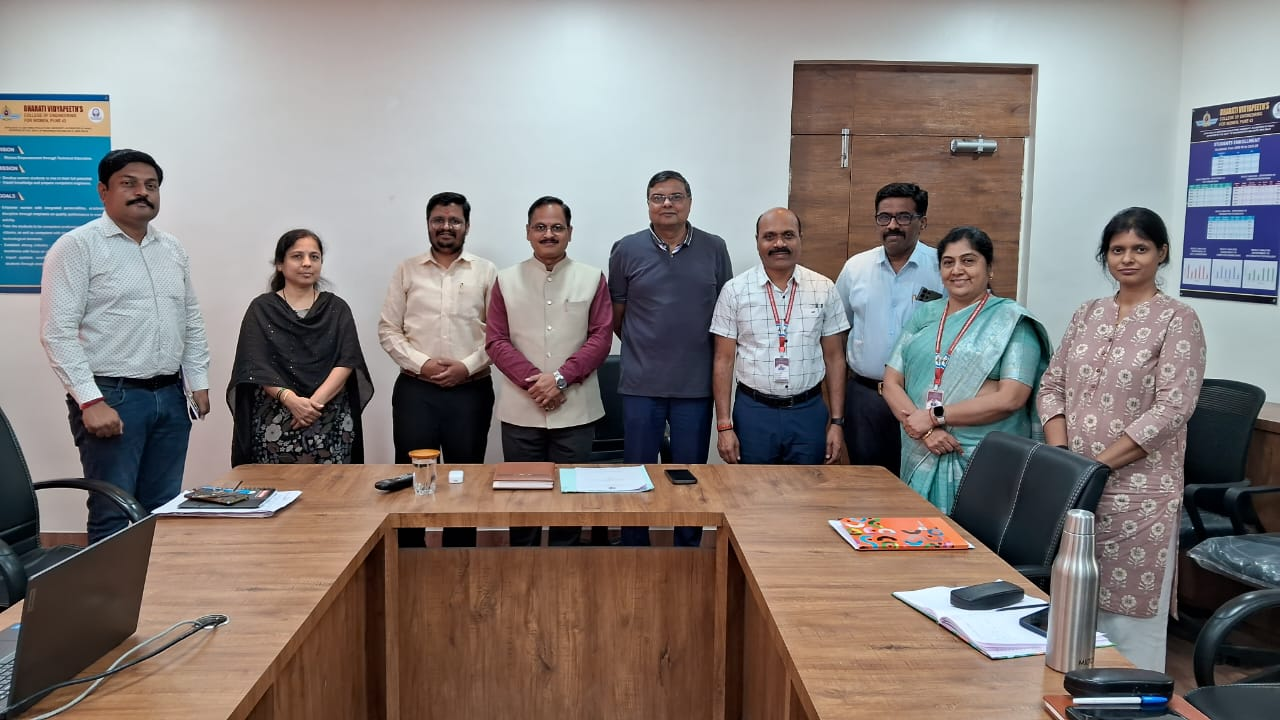
Bharati Vidyapeeth's College of Engineering for Women had the privilege of hosting Prof. Dr. Ravindra Edlabadkar, an expert from PVG College of Engineering, for an insightful session on the online application process to acquire autonomous college status.
The session was graced by the presence of esteemed faculty members, including:
- Prof. Dr. Pradeep V. Jadhav, Principal
- Prof. Dr. S. S. Chorage, Vice Principal (Academics) and IQAC Coordinator
- Prof. Dr. Avinash Pawar, Vice Principal (Administration) and Head of First-Year Engineering
- Prof. Dr. S. R. Patil, Head of E&TC Engineering
- Prof. Dr. D. A. Godse, Head of Information Technology
- Prof. D. D. Pukale, Head of Computer Engineering
- Prof. Dr. Ketaki Malgi, Department of Information Technology
- Prof. More, PVG College of Engineering
During the session, Prof. Dr. Edlabadkar shared valuable insights and provided detailed guidelines about the submission process, equipping the attendees with the necessary expertise to navigate the application procedure effectively. We extend our heartfelt gratitude to Prof. Dr. Edlabadkar for his expert guidance and for enriching our faculty with this valuable knowledge.
FE Engineering Admission ACAP Round-III 2024-25
FE Engineering Admission Institute Level Round 3 2024-25
FE Engineering Admission 2024-25 Merit List for Institute Level
FE Engineering Admission IL Round-II 2024-25
FE Engineering Admission ACAP Round-II 2024-25
Placements at Standard Chartered Bank
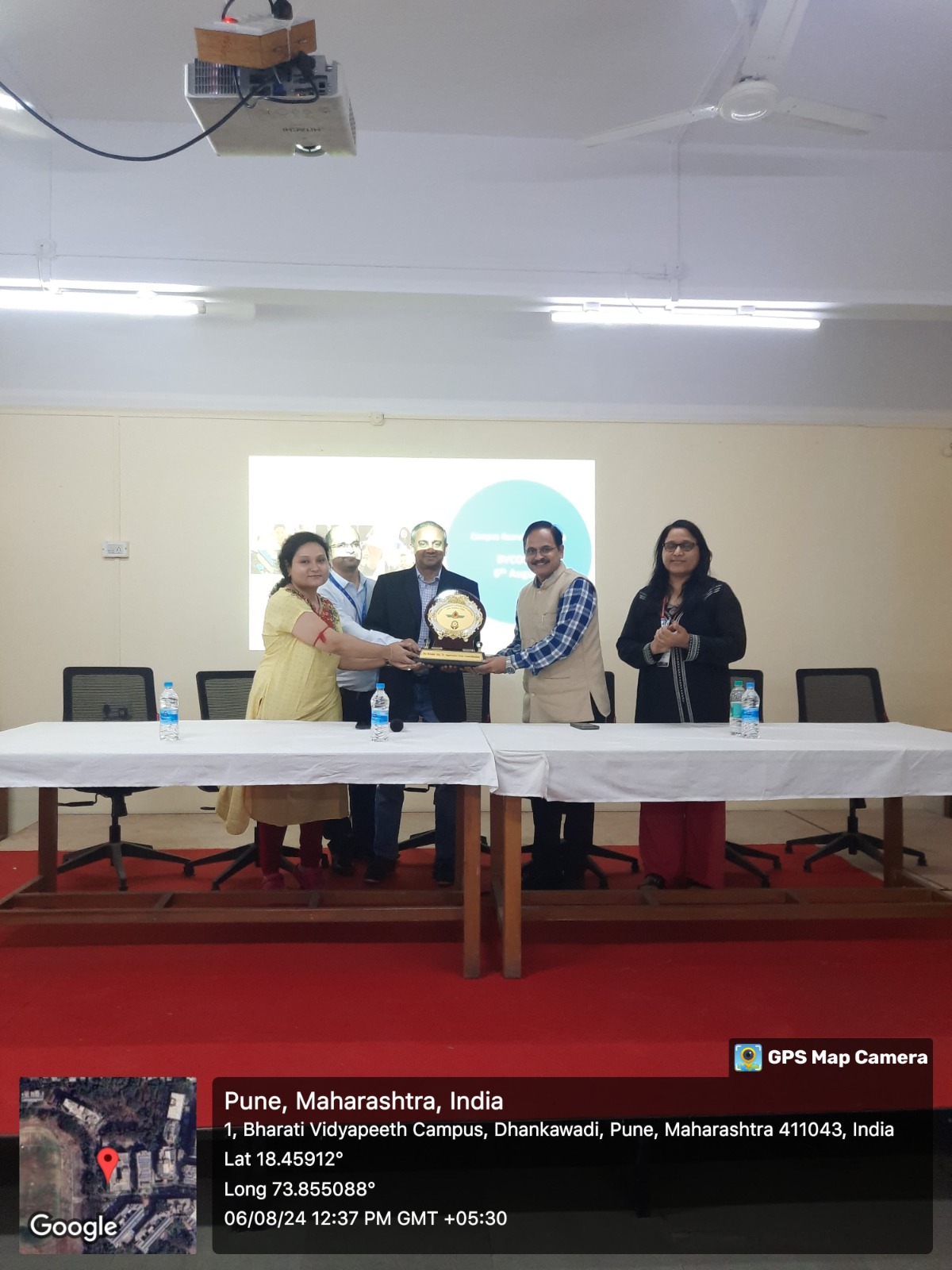
Placements at Amdocs
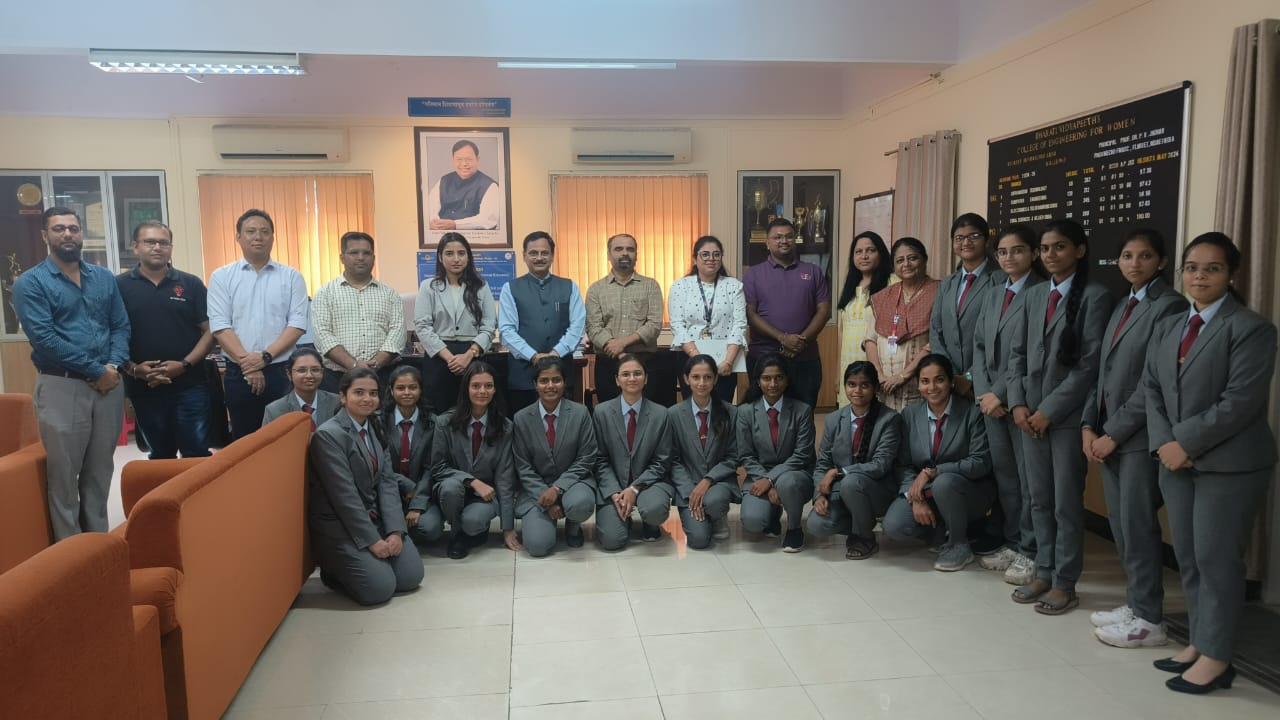
Placements at Atlas Copco
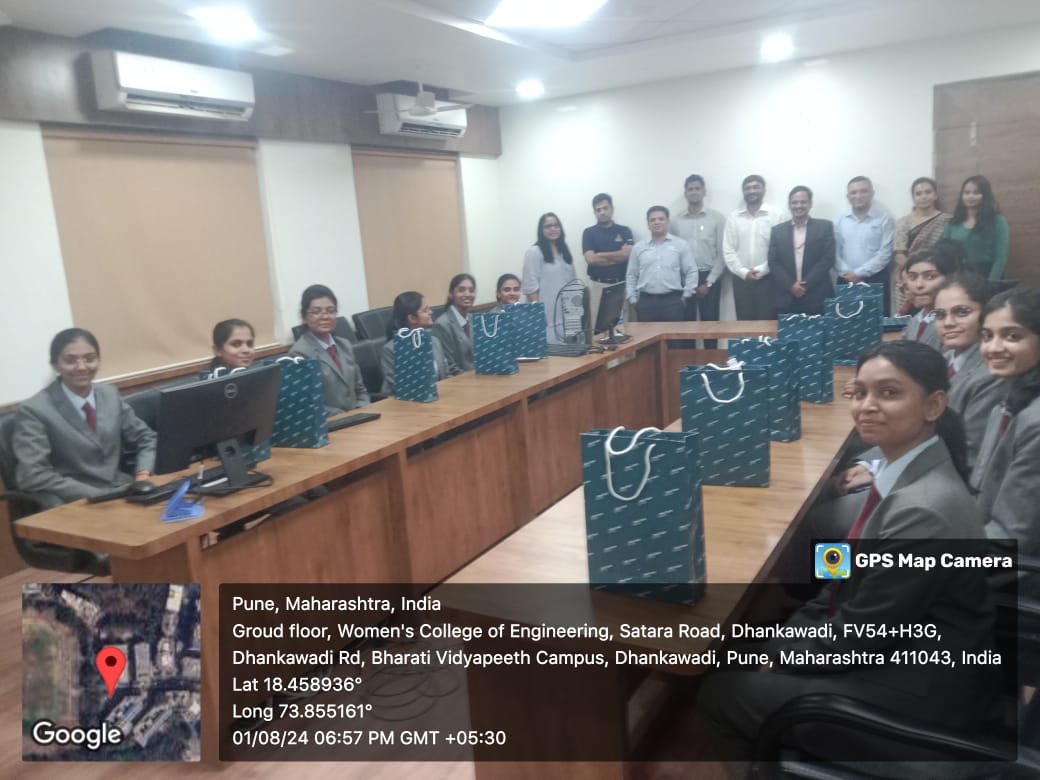
CAP Vacancies 2024-25
Schedule of Activities for First Year Engineering Admission Against CAP Vacancies : 2024-25
Admission 2024-25
FE DSE & ME Engineering Admission 2024-25 Notice
ICRTSTM 2024

ICRTSTM 2024
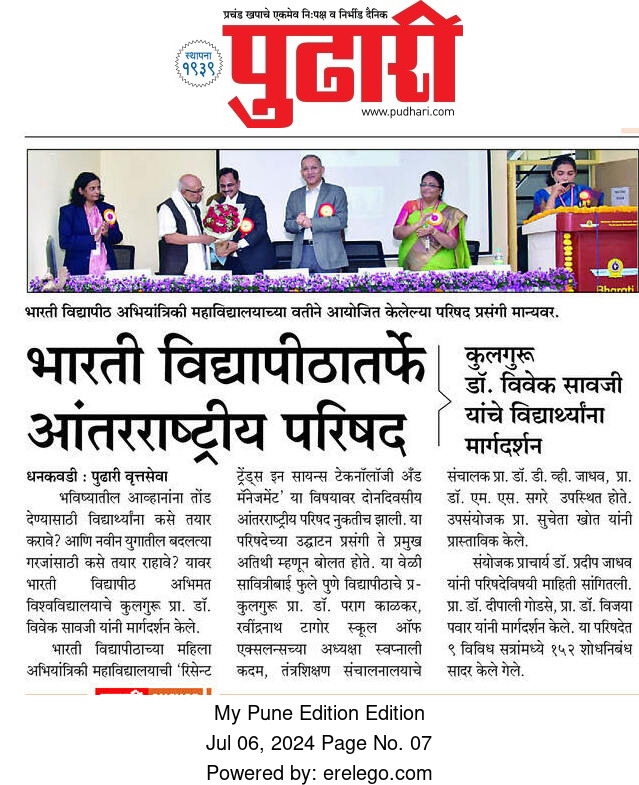
NES
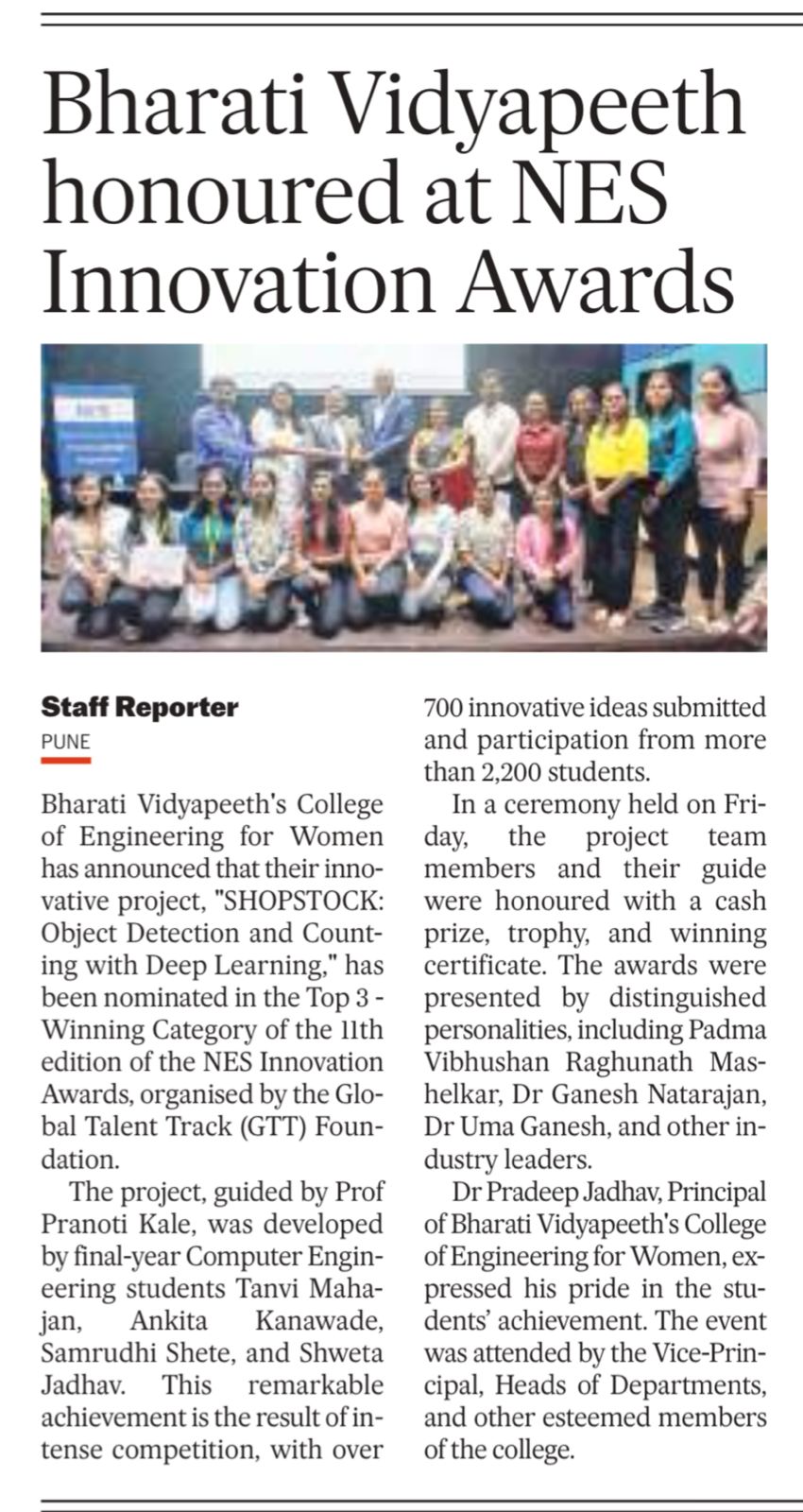
Bharati Vidyapeeth College of Engineering for Women is proud to inform that Global Talent Track (GTT) Foundation, 11th edition of NES Innovation Awards nominated our Innovative Project SHOPSTOCK: Object Detection and Counting with Deep Learning guided by Prof. Pranoti Kale in Top 3 - Winning Category. The Innovators Tanvi Mahajan, Ankita Kanawade, Samrudhi Shete, Shweta Jadhav are from Final Year Computer Engineering. Top 3 winners are shortlisted out of over 700 innovative ideas submitted, with participation from more than 2200 students, makes this project unique. The Project team members and Project guide were honoured with a Cash Prize, Trophy and Winning Certificate on 5th July 2024. It is a matter of pride for the institute to announce that the felicititation was by the hands of Padma Vibhushan Shri. Raghunath A. Mashelkar, Dr. Ganesh Natarajan, Dr. Uma Ganesh and other industry leaders. Principal Dr Pradeep Jadhav, Vice-Principal, Heads of Department attended the event.
NES
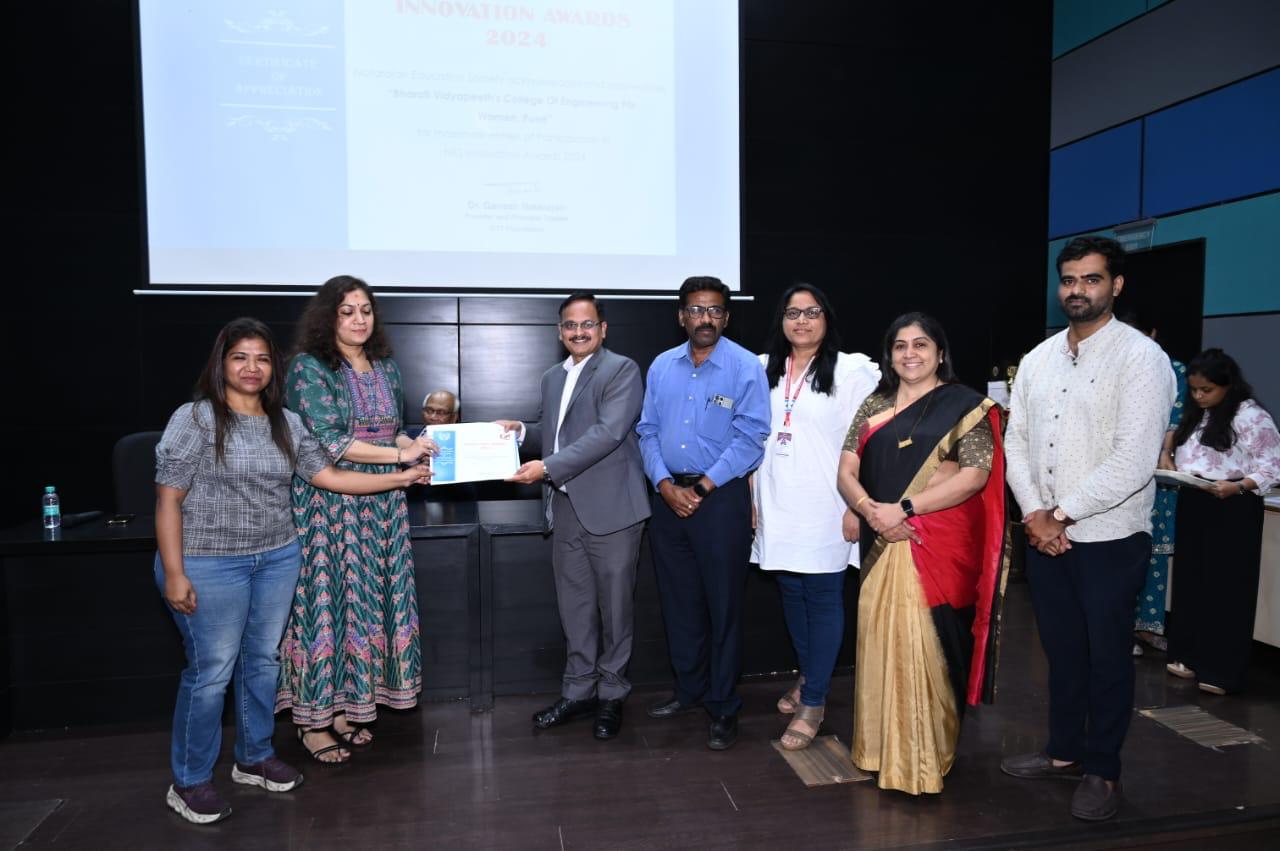
Bharati Vidyapeeth College of Engineering for Women is proud to inform that Global Talent Track (GTT) Foundation, 11th edition of NES Innovation Awards nominated our Innovative Project SHOPSTOCK: Object Detection and Counting with Deep Learning guided by Prof. Pranoti Kale in Top 3 - Winning Category. The Innovators Tanvi Mahajan, Ankita Kanawade, Samrudhi Shete, Shweta Jadhav are from Final Year Computer Engineering. Top 3 winners are shortlisted out of over 700 innovative ideas submitted, with participation from more than 2200 students, makes this project unique. The Project team members and Project guide were honoured with a Cash Prize, Trophy and Winning Certificate on 5th July 2024. It is a matter of pride for the institute to announce that the felicititation was by the hands of Padma Vibhushan Shri. Raghunath A. Mashelkar, Dr. Ganesh Natarajan, Dr. Uma Ganesh and other industry leaders. Principal Dr Pradeep Jadhav, Vice-Principal, Heads of Department attended the event.
Uno Minda
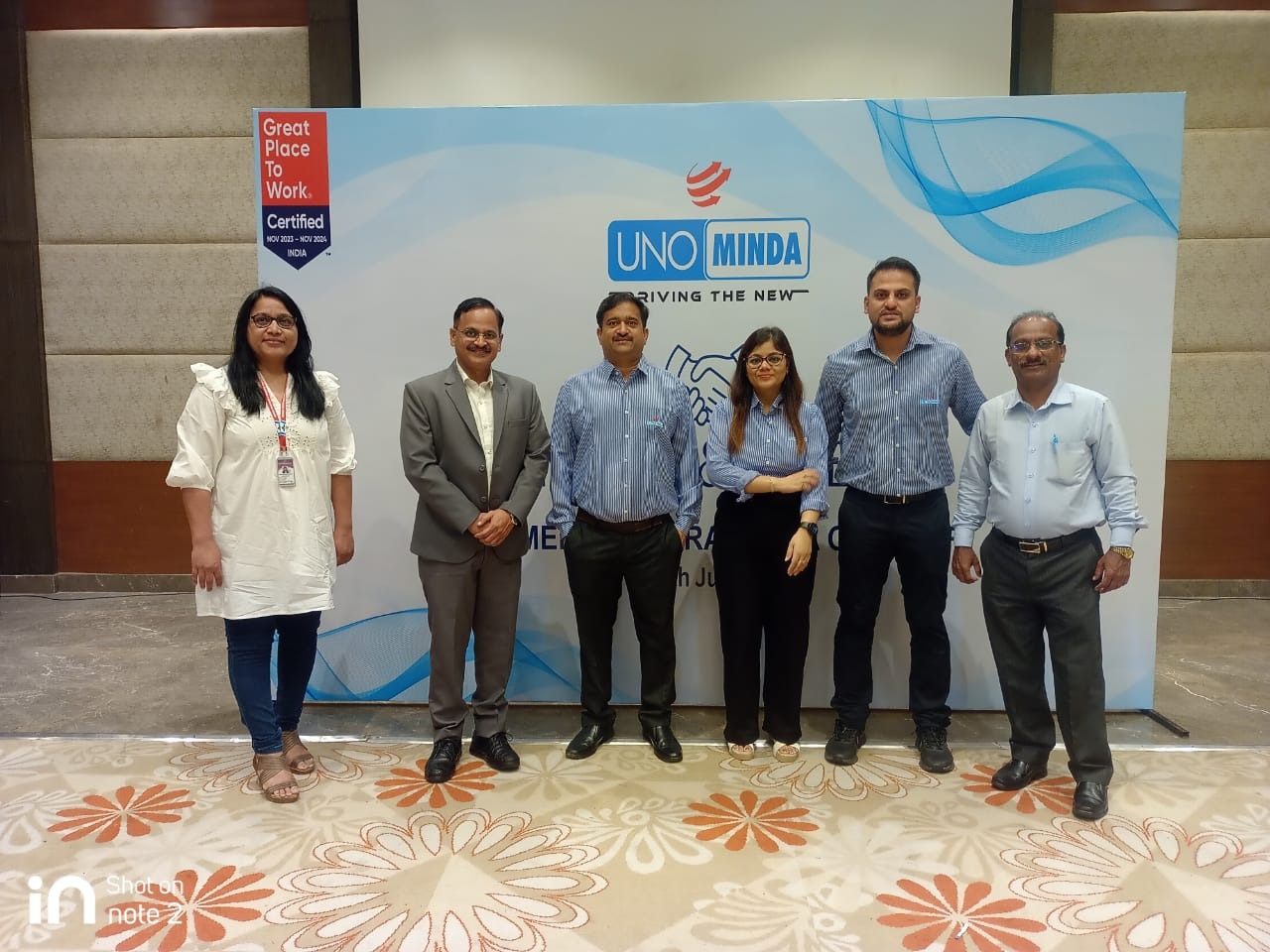
It’s our pleasure to interact with Uno Minda team Akbar, Senior Manager, Human Resource Management and get the feedback about our on-boarded students. Understanding each others perspective will mutually help to take proactive actions at Institute level. Thank you so much Group Talent Head and Vice President of HR, Mr. Pran Ranjan, Group Talent Management Head and General Manager, Mr. Sameer Srivastava and Shipra Rathore, Manager, Talent Management for the brainstorming session on 5th July 2024 @ Radisson Blu, Hinjewadi
Invitation - International Conference on Recent Trends in Science,Technology and Management (ICRTSTM - 2024)
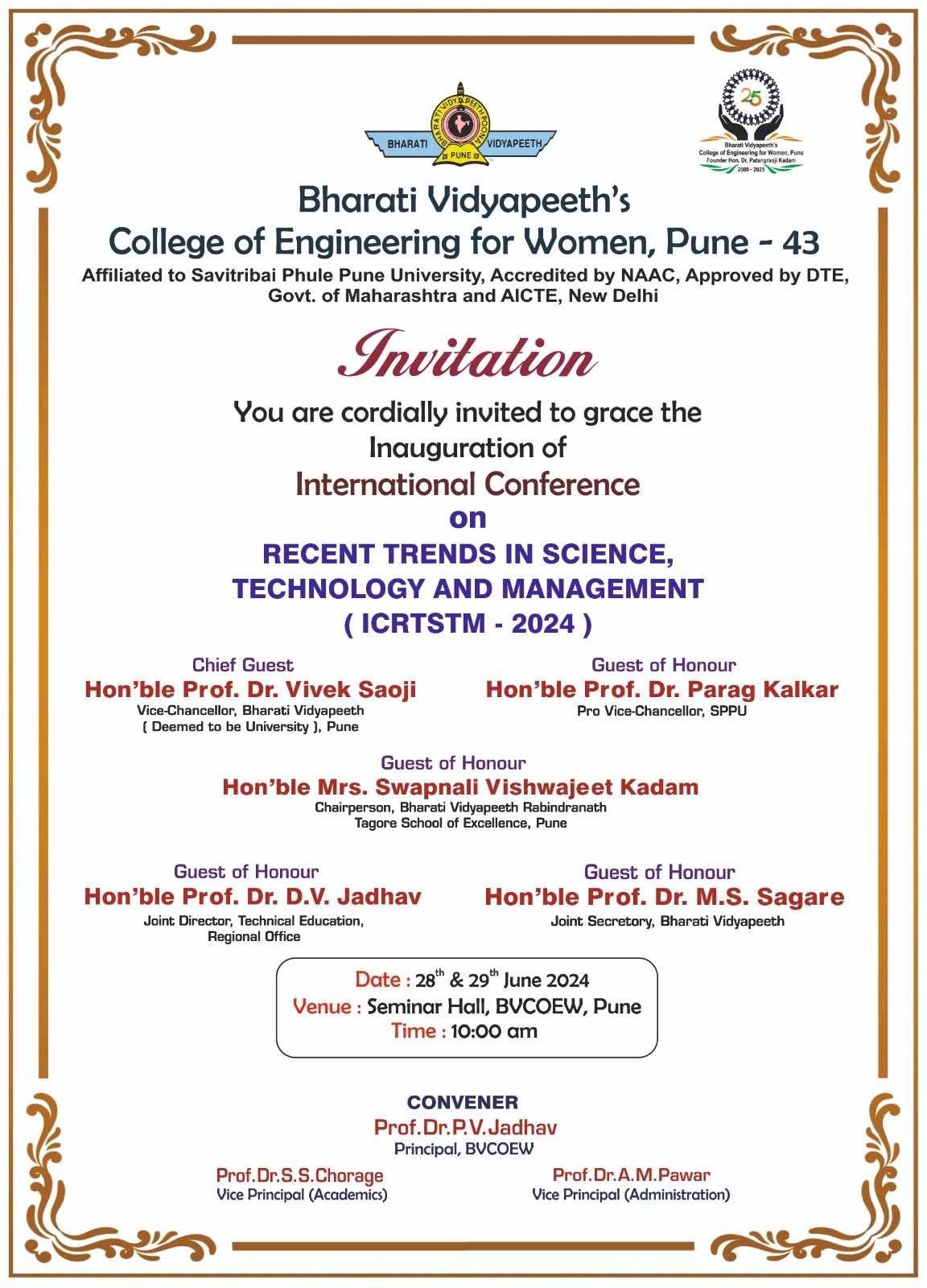
ICRTSTM - 2024
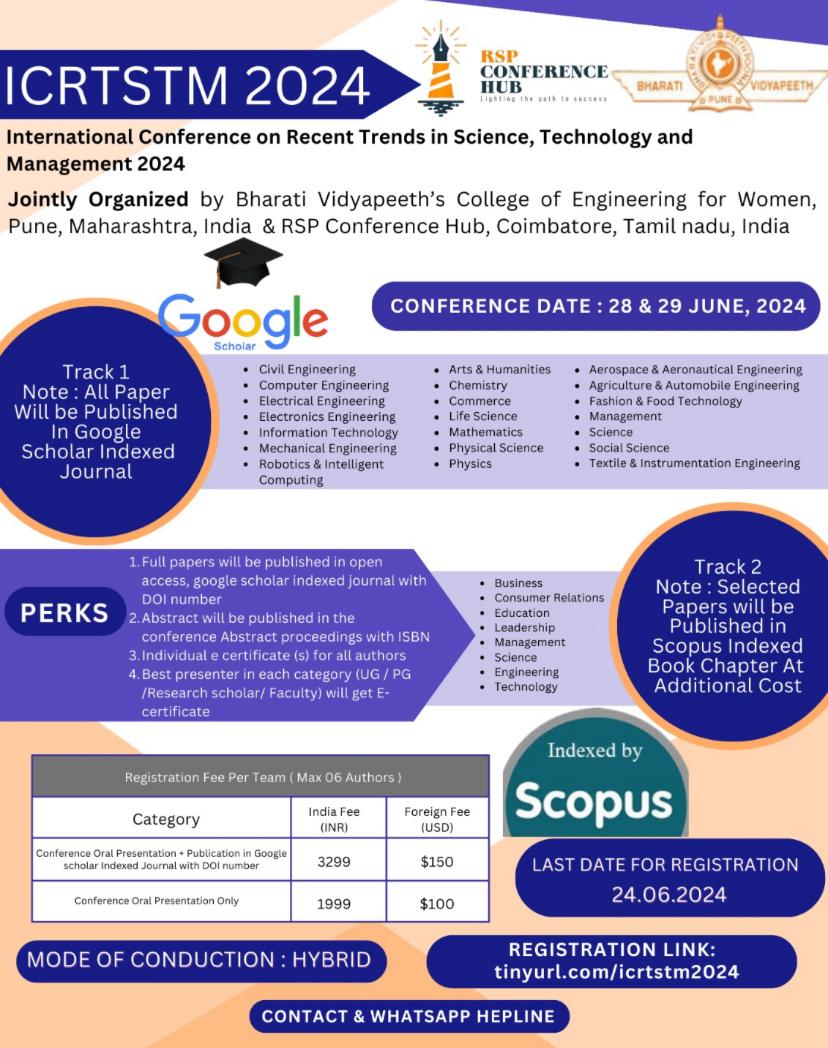
ICRTSTM - 2024
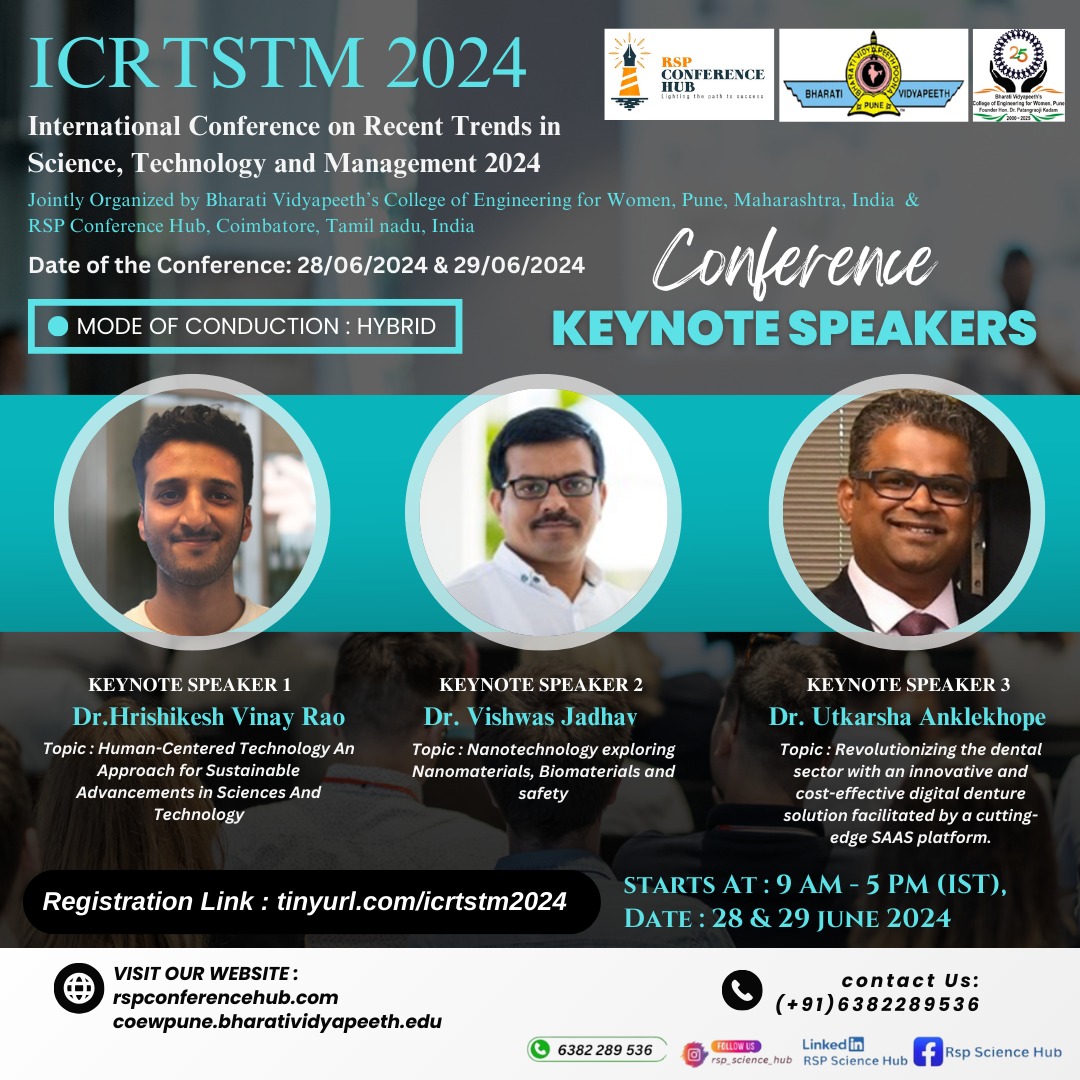
Implementation of National Education Policy 2020
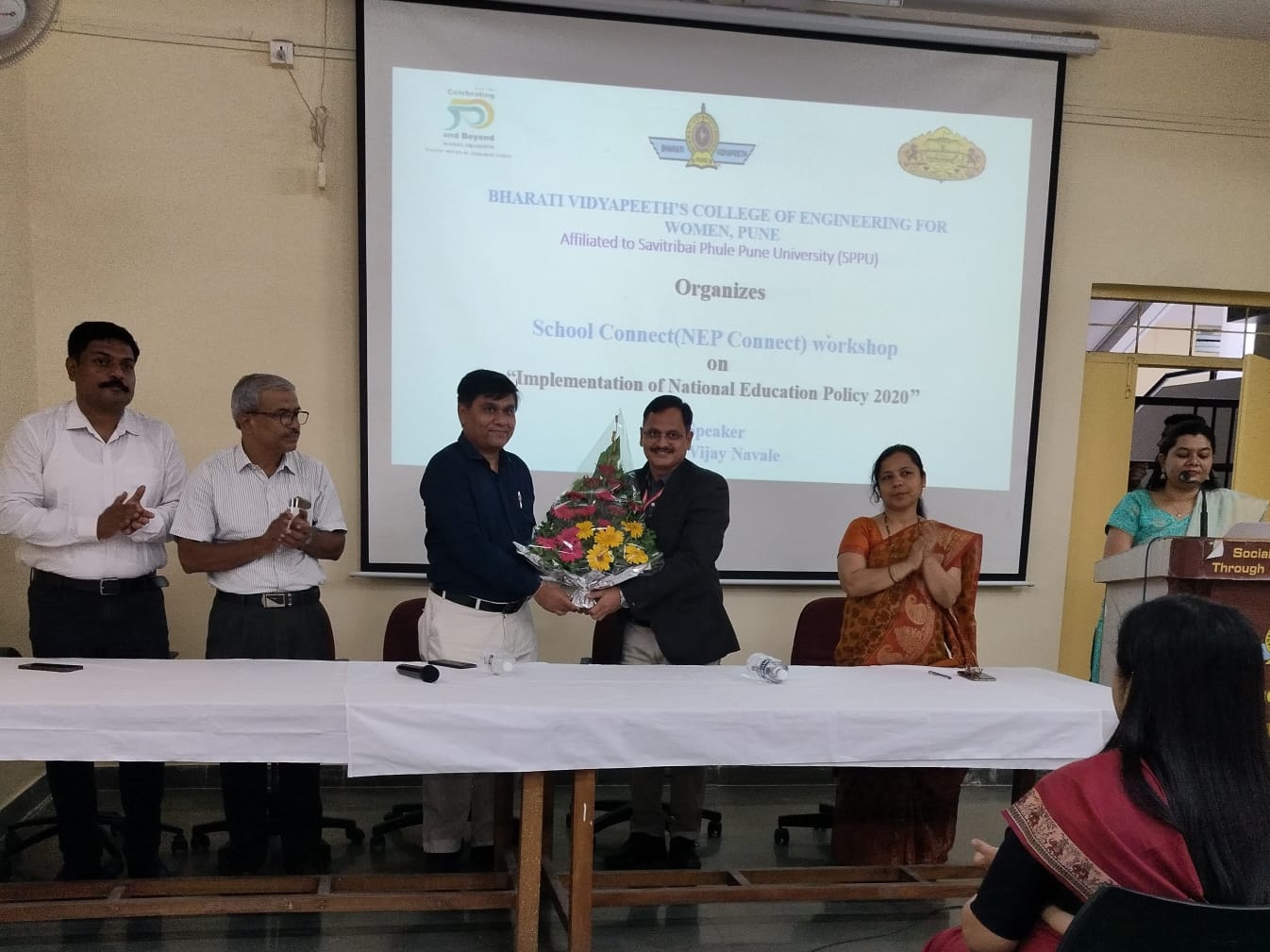
SCHOOL CONNECT (NEP CONNECT) workshop on “Implementation of National Education Policy 2020”
Bharati Vidyapeeth’s College of Engineering for Women, Pune organized a SCHOOL CONNECT (NEP CONNECT) workshop titled "Implementation of National Education Policy 2020" on 26th June 2024. The workshop was organized for the 12th pass-out students and their parents, aiming to familiarize them with the key aspects of the NEP 2020.
The workshop was expertly conducted by Prof. Vijay Navale, covering essential topics including an overview of NEP, the significance of skill development, and the merits of a multidisciplinary approach in education. The session was graced by Principal Prof. Dr. P.V. Jadhav, Vice Principal (Academic) Prof. Dr. S. S. Chorge, Vice Principal (Admin) Prof. Dr. A. M. Pawar, along with all Heads of Departments, 100 students, and their parents.
The event was made successful by Dedicated Committee:
- Prof. Dr. S. A. Pawar (NEP Coordinator)
- Prof. M. A. Patwardhan (NEP Co-Coordinator)
- Prof. S. M. Thorat
- Prof. S. A. Hadke
- Prof. R. J. Sapkal
This initiative reflects BVCOEW’s proactive approach to aligning with national educational reforms and empowering students and parents with pertinent knowledge.
Enlightening Minds
Enlightening Minds Under Session-1 of the Institution's Innovation Council (IIC) “Impact Lecture Series 2024”, Bharati Vidyapeeth’s College of Engineering For Women, Pune, orchestrated a transformative seminar titled "Entrepreneurship and Innovation as a Career Opportunity" on April 12th, 2024. Mr. Mohan Anturkar spearheaded the session, delving into pivotal topics such as conquering the fear of failure and fostering wealth creation with positivity. Notably, the event was organized by BVCOEW as part of the impactful lecture series sponsored by the AICTE Ministry of Education.
The seminar, graced by Principal Dr. P.V. Jadhav, who serves as the President of IIC, witnessed enthusiastic participation from over 100 students, including second and third-year students from all departments. This impactful session was made possible by the relentless efforts of dedicated coordinators:
- Principal Dr. P.V. Jadhav (IIC President)
- Prof. A.D. Khairkar (IIC Convener)
- Prof. Dr. S.L. Kore
- Prof. V.P. Mulik
- Prof. M.S. Kasar
Their unwavering support ensured the success of this enlightening session, promising to pave the way for innovation and empowerment at BVCOEW, Pune.
Impact Lecture Series 2024
Exciting Update! Session 2 of the Institution's Innovation Council (IIC) “Impact Lecture Series 2024” at Bharati Vidyapeeth’s College of Engineering For Women, Pune, unfolded a fascinating seminar on "Intellectual Property Rights" on April 12th, 2024. The esteemed speaker, Mrs. Kalyani Ahire, CEO of Synnolect Innovation, illuminated the significance of Intellectual Property Rights (IPR) in today's dynamic landscape.Participants delved into key concepts surrounding IPR, guided by Mrs. Ahire's expertise. With engaging discussions on patents, copyrights, and trademarks, students gained valuable insights into protecting and leveraging their innovative ideas.
Vmedulife Software
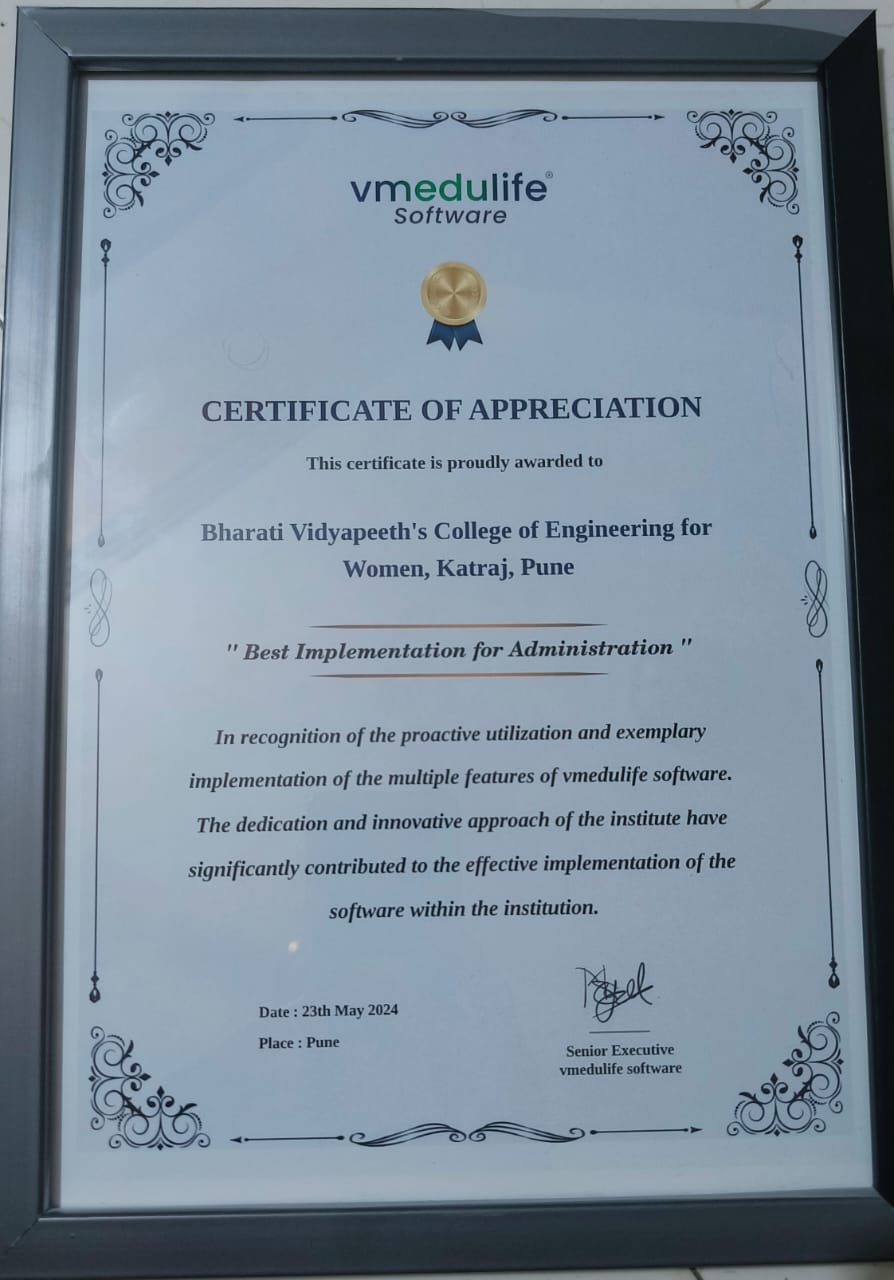
NAAC PTV Preparation Guidelines
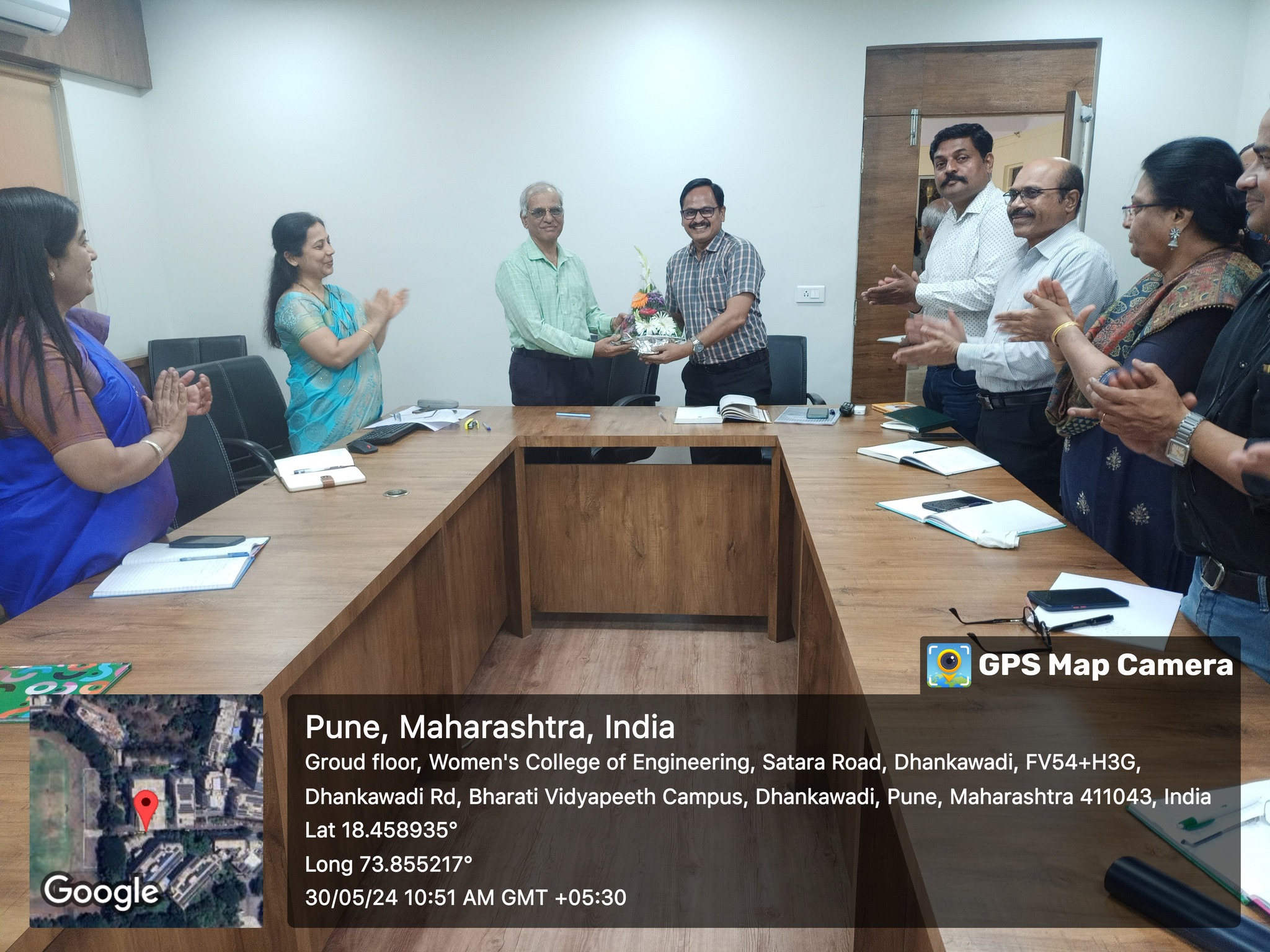
BVCOEW, Pune organized a session of Dr. P. J. Kulkarni, Advisor Professor in CSE RIT, Islampur on “NAAC PTV Preparation Guidelines” on 30th May, 2024. Principal Prof. Dr. Pradeep Jadhav and all teaching faculty attended the session. The session was very informative & interactive. Prof. Dr. Kulkarni solved all the queries related to NAAC raised by the faculty.
Walmart Offer Letter
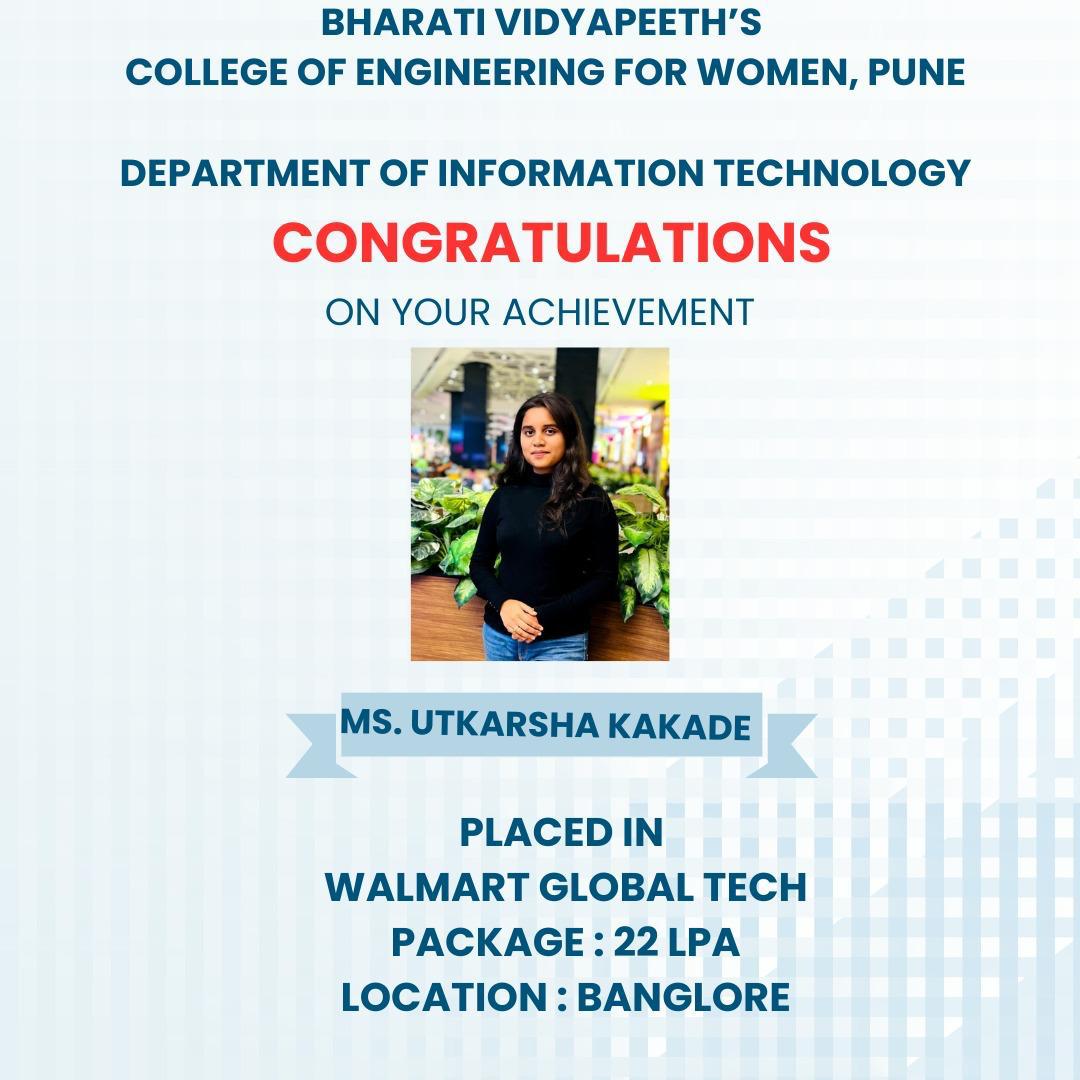
Heartiest Congratulations, Ms Utkarsha Kakde from IT Department received Walmart offer letter, CTC including Base Pay, Joining Bonus 22 LPA.
ICRTSTM 2024
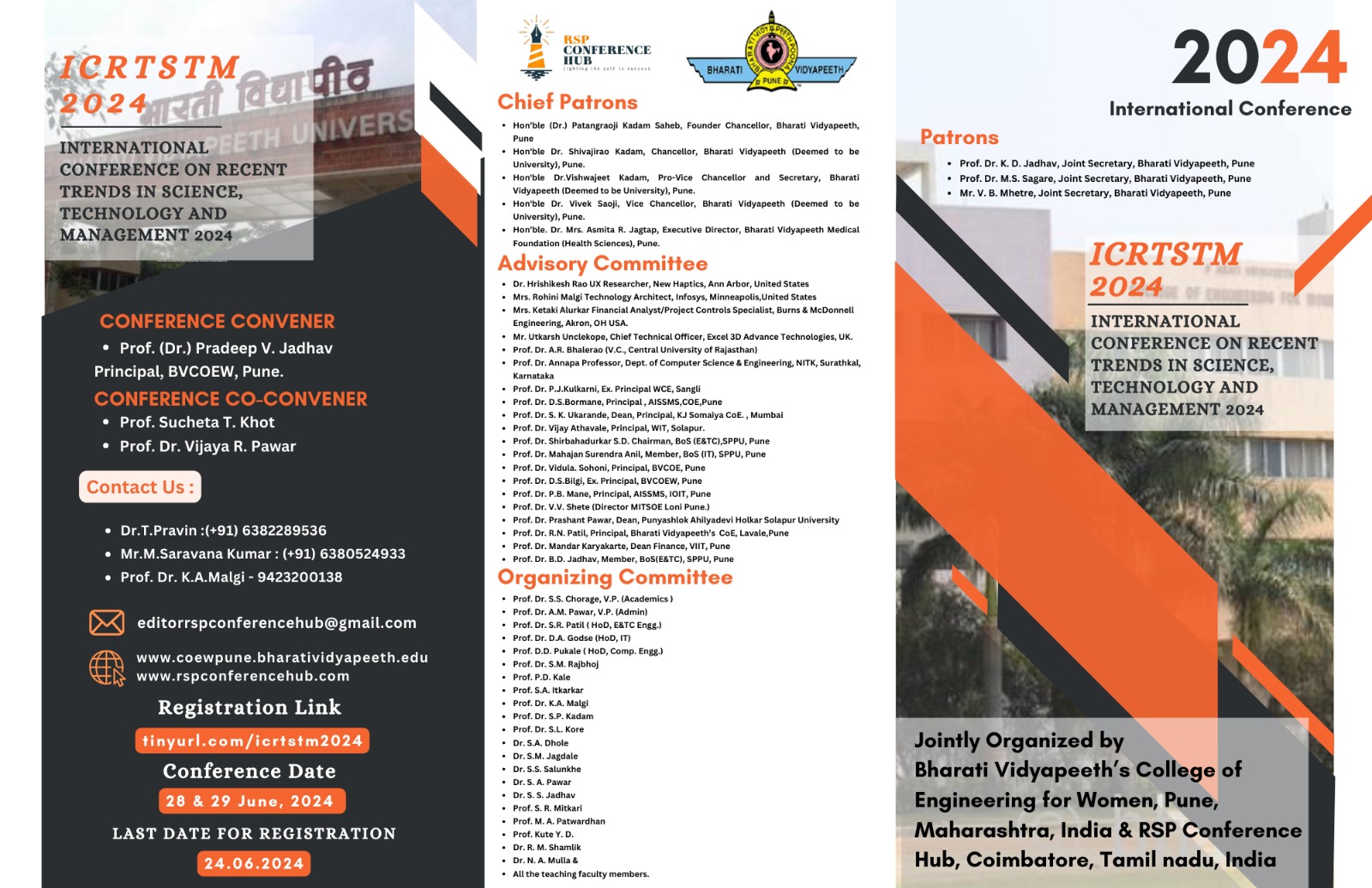
ICRTSTM 2024
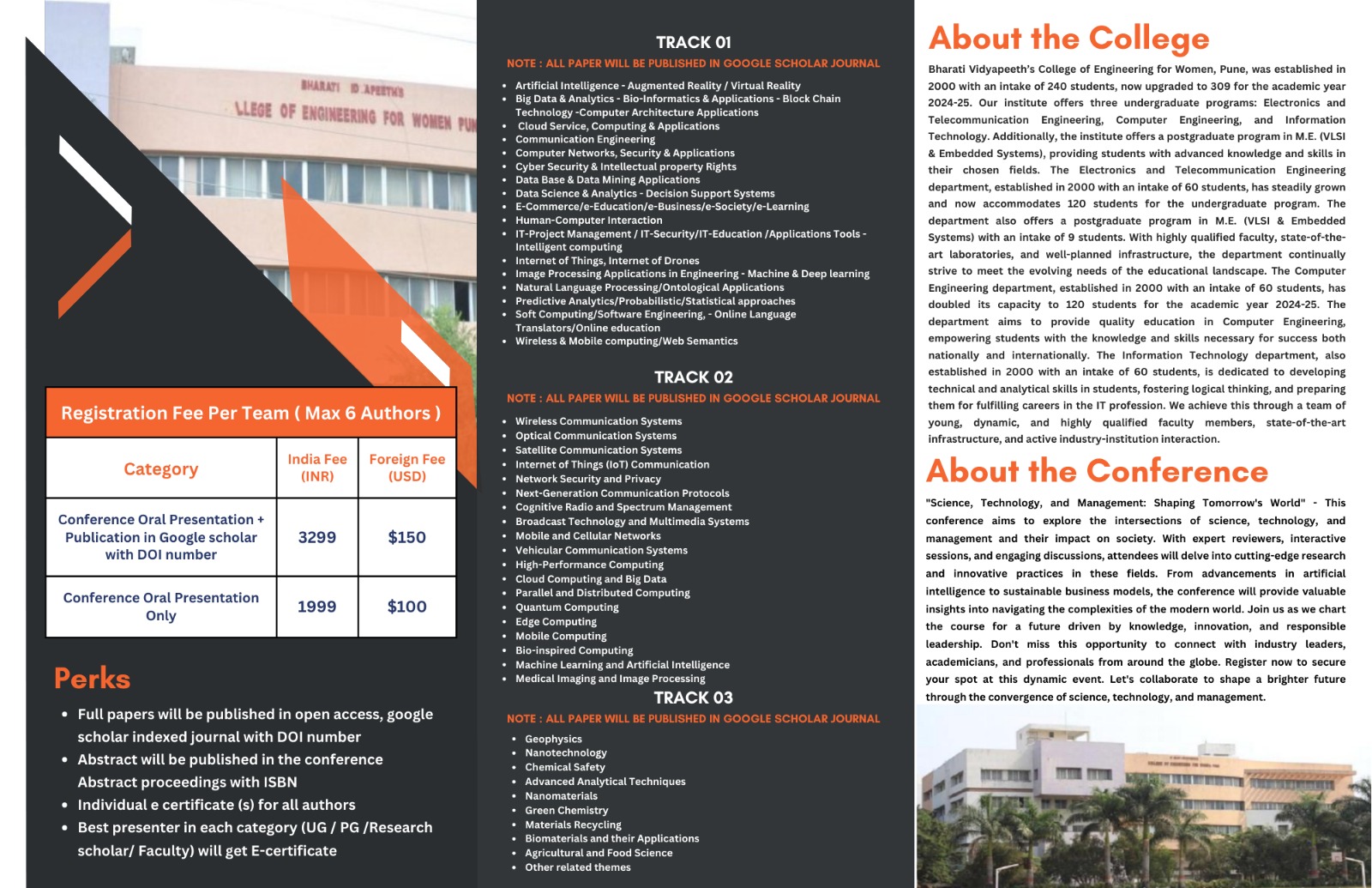
Interaction with GATE appeared students
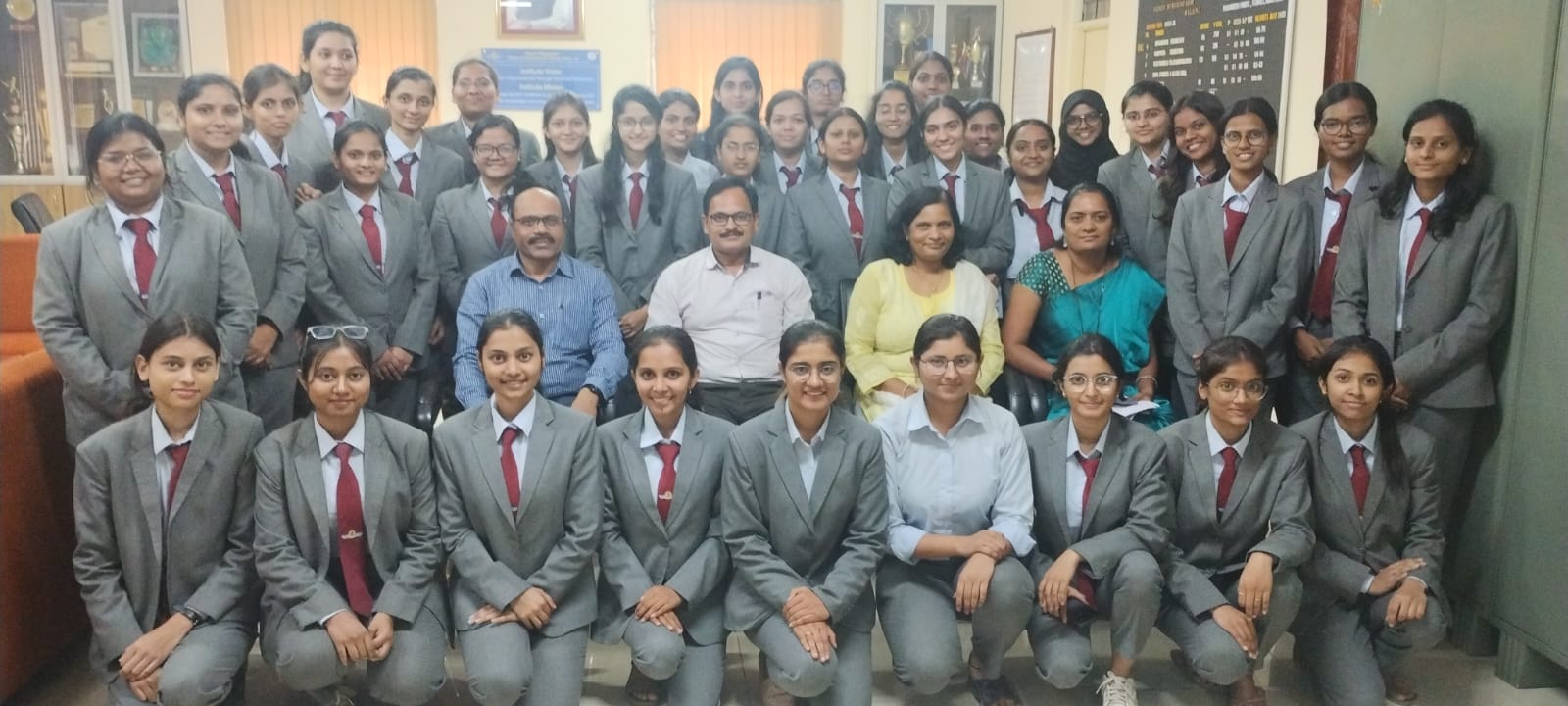
A session on, 'Atal FDP proposal drafting and it's submission'
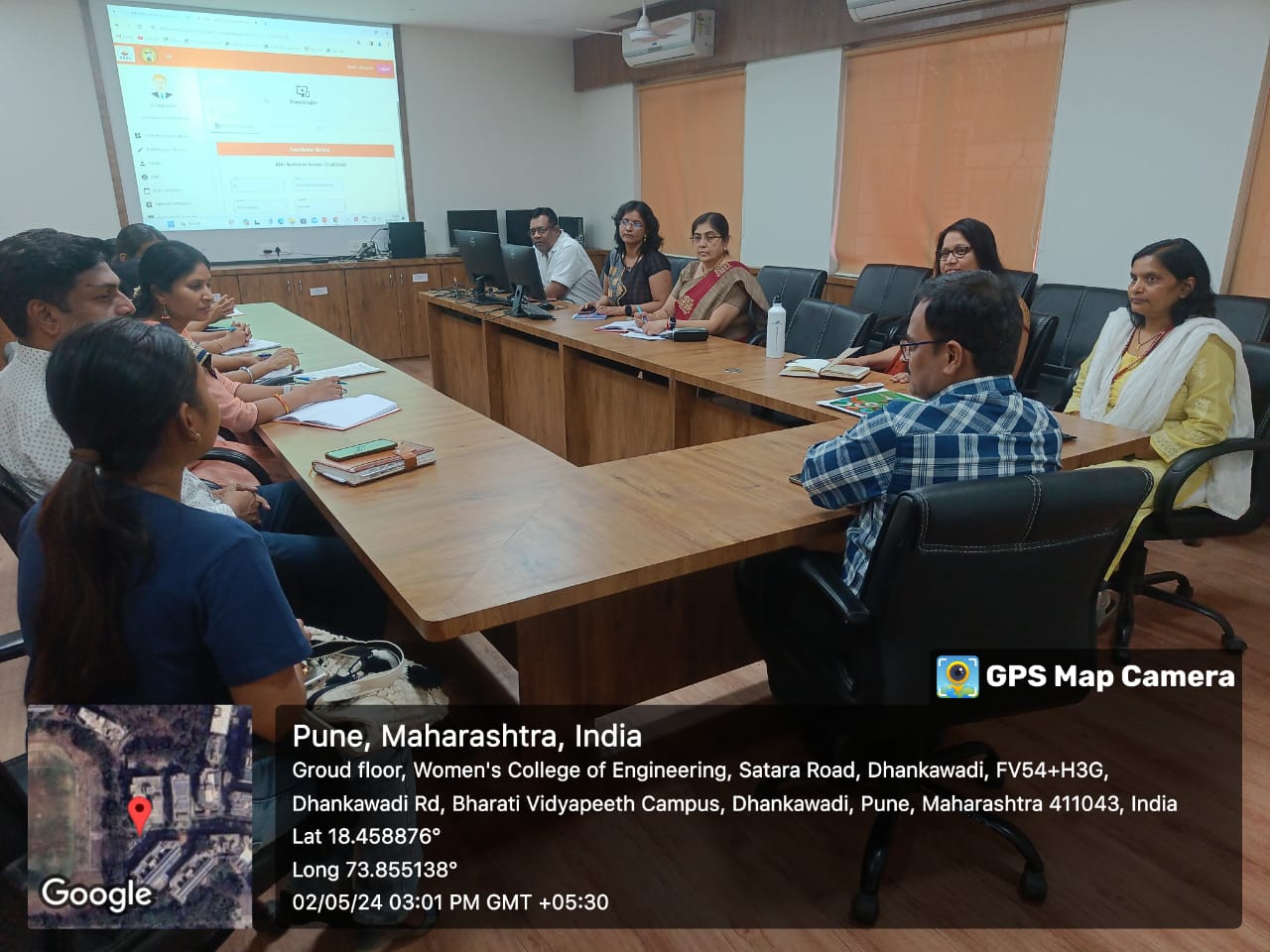
Windows and Networking - Citrix Technology

AICTE Career Portal

Ms. Vidya Ambre, representing Falmer University, visited Bharati Vidyapeeth's College of Engineering for Women

Women Health Awareness Session

Diversity Industrial Visit at Amdocs, Pune

Session by Alumni Association

Session by Alumni Association

FE Admission 2023-24 - Merit List and Schedule for ACAP Seats
FE Admission 2023-24 - Merit List and Schedule for ACAP SeatsFE Admission 2023-24 Against CAP Vacancy
FE Admission 2023-24 Against CAP Vacancy.ICC Event 2022

Admissions Against CAP Round
FE Admission Against CAP Round ScheduleSelected for W.Z. Inter-University Basketball Tournament
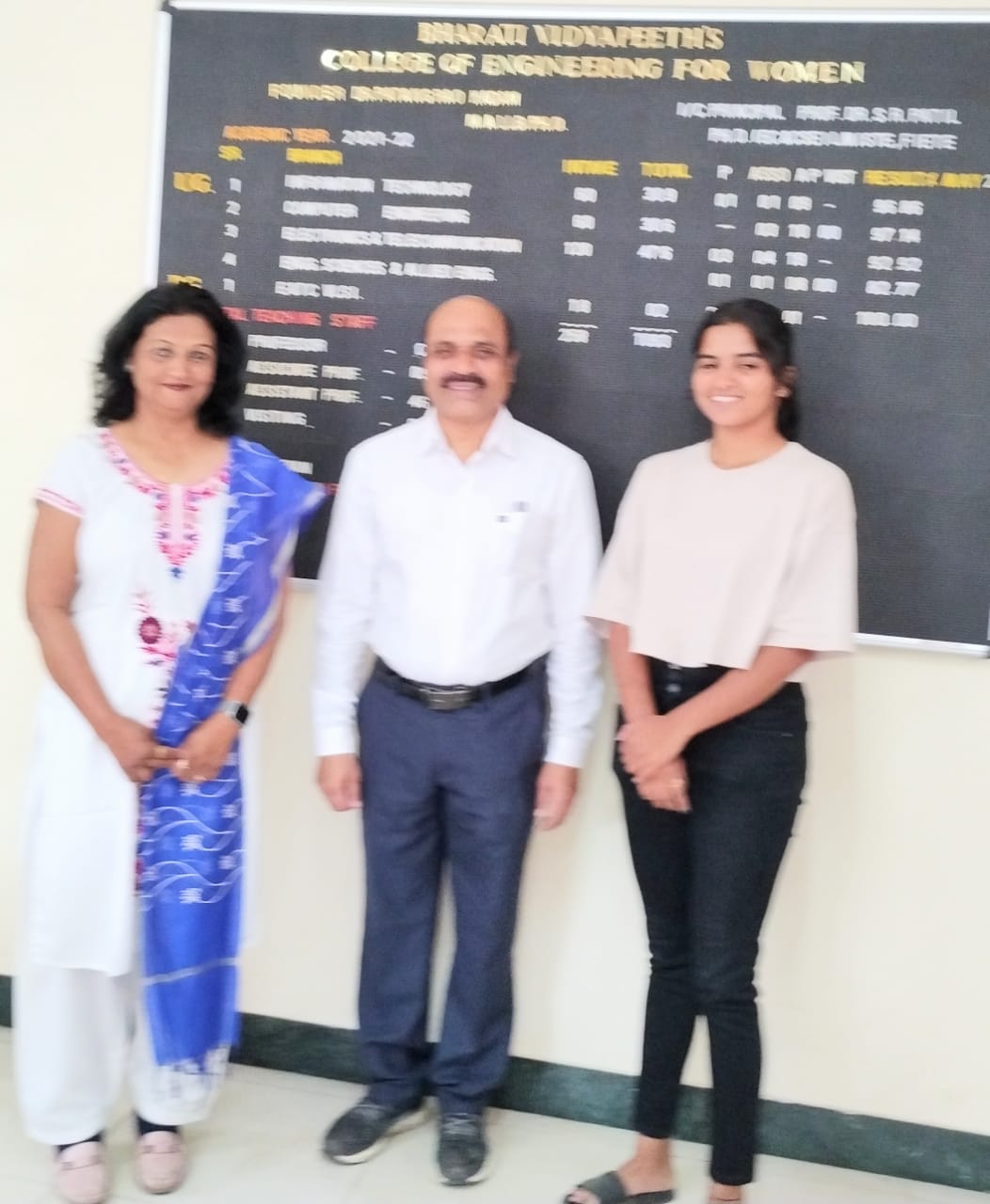
Gymkhana Department: It is indeed a proud moment that our student Chaitanya Raje, SE, E&TC, got selected for West Zonal Inter-University Basketball Tournament and will be representing BVCOEWOMEN. Heartiest congratulations and many best wishes to Chaitanya. - Dr Gauri Patil, Physical Director, and Prof Dr. S. R. Patil, Principal, BVCOEWOMEN, Pune.
बी.ई. / एम.ई. शुल्क तक्ता २०२२-२३
Fees for B.E./M.E. for AY 2022-23
Annual College Magazine "Oyster"

Bharati Vidyapeeth's College of Engineering for Women, Pune had organized unveiling ceremony of Annual College Magazine "Oyster" by the hands Chief Guest Mr. Sameer Dharmadhikari renowned actor, director and Hon'ble Dr. M. S. SAGARE Joint Secretary Bharati Vidyapeeth (Deemed to be University)Pune on 28th May 2022.
शिवस्वराज्य दिन

सोमवार दिनांक ६ जून२०२२ रोजी भारती विद्यापीठचे महिला अभियांत्रिकी महाविद्यालयात शिवस्वराज्य दिन मोठ्या उत्साहाने साजरा करण्यात आला. महाविद्यालयाचे प्राचार्य माननीय डॉ. एस आर पाटील.यांनीप्रथम शिवाजी महाराजांच्या प्रतिमेचे पूजन केले व राष्ट्रगीताने कार्यक्रमास सुरुवात झाली. प्रथम वर्षाचे प्रमुख डॉ. प्रो. ए. एम पवार सर तसेच गणित, रसायन शास्त्र, इलेक्ट्रॉनिक विभागातील आणि इलेक्ट्रिकल विभागातील सर्व मान्यवर शिक्षक या कार्यक्रमास उपस्थित होते.
Internal Hackathon 2022
SIH 2022

First Prize Magzine Award
BVCOE for Women Pune college has received First Prize Magzine Award for "Oyster-2020". Also received "Oyster-2019" Best College Magzine Award-Third Prize at the hands of Hon. Vice Chancellor-SPPU- Dr. Karmalkar on 25/11/2021.

Basketball tournaments
Institute has successfully organized SPPU-Pune CIty Zone- Intercollegiate Basketball tournaments (Boys and Girls).

MOU SPOC
Institutional MoU with Edunet (non-profit organization providing IBM Skill-Build digital learning platform focused on emerging technologies)
MoU Coordinator:
Prof.Dr.Ketaki Malgi
Dept. of Information Technology
Principal
Prof. Dr. S. R. Patil
Heartiest Congratulations

Warmest Welcome

FDP
BVCOE for Women, Pune organised National Level AICTE-ATAL-FDP on Machine Learning from 8th to 12th November 2021.

FDP
Department of E&TC is organising the First National Level AICTE funded ATAL Academy Faculty Development Program on Machine Learning from 08/11/2021 to 12/11/2021. 200 participants across the nation have already registered for this FDP. Renowned Resource Persons will enlighten the participants during FDP with their insightful knowledge.
MoU-1
Department of Electronics and Telecommunications Engineering
MoU with core ELECTRONICS Industry "ELON POWER"
MoU Coordinator:
PROF. M. S. KASAR
PROF. V. P. MULIK
Head of Department
Prof. Dr. S. R. Patil
Principal
Prof. Dr. S. R. Patil
Heartiest Congratulations

MoU-2
Department of Computer Engineering
MoU with core IT Industry
MoU Coordinator:
Ms. K. S. Warke
Head of Department:
Prof. D. D. Pukale
Principal:
Prof. Dr. S. R. Patil

MoU-3
Department of Information Technology
MoU with core IT Industry
MoU Coordinator:
Mrs. S. B. Dhuttargi
Head of Department
Prof. Dr. D. A. Godse
Principal
Prof. Dr. S. R. Patil
MoU-4
Department of Information Technology
MoU with core IT Industry
MoU Coordinator:
Prof. A. D. Khairkar
Head of Department
Prof. Dr. D. A. Godse
MoU-5
MoU with core IT Industry
MoU Coordinator:
Prof.N.A.Mulla
Head of Department
Prof. Dr. D. A. Godse
Principal
Prof. Dr. S. R Patil
MoU -1
 Department of Information Technology MOU with core IT industry
Department of Information Technology MOU with core IT industryMOU Coordinator:
Prof. Dr. Ketaki Malgi
Head of Department:
Prof. Dr. D. A. Godse.
A.Y. - 2021-22
Principal Prof. Dr. S. R. Patil
Heartiest Congratulations
MoU -2
 Department of Information Technology
Department of Information TechnologyMoU with core IT Industry.
MoU Coordinator:
Prof. S. A. Sagar
Head of Department:
Prof. Dr. D. A. Godse.
Principal Prof. Dr. S. R Patil
Heartiest Congratulations
MoU -3
 Department of Information Technology
Department of Information TechnologyMoU with core IT Industry
MoU Coordinator:
Prof. S. S. Thite & Prof. K. V. Patil
Head of Department:
Prof. Dr. D. A. Godse.
Principal Prof. Dr. S. R Patil
Heartiest Congratulations
MoU -4
 Department of Information Technology
Department of Information TechnologyMoU with core IT Industry
MoU Coordinator:
Prof. S. A. Hadke
Head of Department:
Prof. Dr. D. A. Godse.
Principal Prof. Dr. S. R Patil
Heartiest Congratulations
MoU -5
 Department of Information Technology
Department of Information TechnologyMoU with core IT Industry
MoU Coordinators:
Prof. Dr. D. A. Godse & Prof. A. V. Kanade
Head of Department
Prof. Dr. D. A. Godse
Principal Prof. Dr. S. R Patil
Heartiest Congratulations
MoU -6
 Department of E&TC
Department of E&TCMoU with core Electronics Industry
Prof.Dr.S.L.Kore
Prof.S.M.Patil
MoU Coordinators
Prof.Dr.S.R.Patil
HoD E&TC & Principal
BVCOEWOMEN PUNE-43
Heartiest congratulations
MoU 1
 BVCOEWOMEN, Pune Department of E&TC ( A.Y.2021-22)
BVCOEWOMEN, Pune Department of E&TC ( A.Y.2021-22)MoU with Core Electronic Industry.
MoU Coordinator Prof. Rameez Shamalik
MoU 2
 BVCOEWOMEN, Pune Department of E&TC (A.Y.2021-22)
BVCOEWOMEN, Pune Department of E&TC (A.Y.2021-22)One more MoU signed with CORE Electronics Industry
MoU Coordinators:- 1.Prof.Mulik 2.Prof.Yadav
Hearty congratulations
Yoga Workshop

Our college has received AICTE-SPICES-Grant of Rs.1,00,000/-(Rupees One Lakh) for A.Y. 2021-22.
Proposal:
AICTE-SPICES
Proposal Coordinator:
Prof.Dr.S.R.Patil, Principal & H.O.D E&TC
Proposal co-cordinator:
Prof.Dr.V.R.Pawar, Asso.Prof.-E&TC
Congratulations
 BVCOEW is truely proud of Kritika Rai's achievement, Kritika your hard work and dedication has paid off. You are selected as Software Development Engineer (SDE2) by Walmart Global Tech with 20.67 lakh annual package. We wish you success for all your future endeavours.
BVCOEW is truely proud of Kritika Rai's achievement, Kritika your hard work and dedication has paid off. You are selected as Software Development Engineer (SDE2) by Walmart Global Tech with 20.67 lakh annual package. We wish you success for all your future endeavours.First Year Engg.
Direct Second Year Engg.
SE Branch Change Notice

Prestigious NES Award
BVCOE for Women Pune,Information Technology dept. has received prestigious NES Award on 25th July 2020.
Heartiest congratulations to Project Group, Kshitija, Abhilasha, Tejal, Varsha, Project Guides Prof. Dhuttargi, Prof. Khairkar, Team of IT Dept. & BVCOEW.

Online Certificate Webinar
Recruitment Trends and Associated Skills in association with BVCOE for Women, Pune, and SkillEdge on 4th July 2020.

College Exam Guidance Committee

Online Faculty Development Program
 Bharati Vidyapeeth’s College of Engineering for Women Pune, Department of Information Technology in association with 9Ledge Pro, Pune has organized Online Faculty Development Program On “Python Programming” on 4th May 2020 to 9th May 2020.
Bharati Vidyapeeth’s College of Engineering for Women Pune, Department of Information Technology in association with 9Ledge Pro, Pune has organized Online Faculty Development Program On “Python Programming” on 4th May 2020 to 9th May 2020.Redressal of Grievances related to COVID-19 pandemic

Bharati Vidyapeeth 56th Foundation Day

Online Faculty Development Program
 Bharati Vidyapeeth’s College of Engineering for Women Pune, Department of Information Technology in association with 9Ledge Pro, Pune has organized Online Faculty Development Program On “Python Programming” on 4th May 2020 to 9th May 2020.
Bharati Vidyapeeth’s College of Engineering for Women Pune, Department of Information Technology in association with 9Ledge Pro, Pune has organized Online Faculty Development Program On “Python Programming” on 4th May 2020 to 9th May 2020.Faculty Development Program on Latex
Department of Computer Engineering has organized one week Faculty Development Program on Latex in association with IIT Bombay Spoken Tutorial on 7th May to 9th May 2020.
Webinar on “Technical Interview Preparation
Department of Information Technology has organized Webinar on “Technical Interview Preparation” for Second Year Students on 11th May 2020.
Graduation Ceremony
2018-19 Batch

Graduation Ceremony
2018-19 Batch

BVCOE for Women, Pune Alumni association Activity Session by Distinguished alumni, Vijayshri Marathe, 2011 batch

“Health Care and Awareness“ session by Dr. Seema Sonis on 18th January 2019. Session jointly organized by BVCOE for Women, SPPU Student Development Board.

Microsoft CFP session by Microsoft Field Engineer our Alumni, Miss. Harshada Kshirsagar and Miss. More. Very useful session for students on 20th January 2019.

Meeting with All CRs of our institute from FE to BE.

Avishkar 2020 : Groups selected for Zonal Level….All the best students!!!

Blood Donation Camp organized by BVDUCOE, Pune.

Kranti Jyoti Savitribai Phule Abhivdan on 3rd January 2020

Organized seminar on “Placement Opportunities in Japan” by YASH Overseas, Rajasthan on 9th January 2020.

BVCOE for Women, Pune organized Self Defense workshop for girls on 10th January 2020.

Heartiest Congratulations
Hearty Congratulations to Magazine Team for getting Savitribai Phule Pune University 3rd prize.MoU signing ceremony with Zensar ESD on 12th August 2019.

FE Welcome Address for Parents and Students on 13th August 2019.

Successful organization of "Prolifics" pool campus at our institute on 27 & 28th August 2019. Total 400 students has been participated.

Alumni students contributed for Flood affected people from Sangli districts on 28th August 2019.

Successful conduction of "FIT INDIA MOVEMENT" event on 29th August 2019.

A Seminar on "Personality Development, Work Ethics and Duties" has organized for NON-TEACHING staff on 31st August 2019.

First Year Dept. Induction Program on 13th August 2019.

Prof. P.D. Kale conducted workshop at BVCOE, Kolhapur on current requirements & preparation for Training & Placement on 14th September 2019.

BVCOE foe Women, Pune continued tradition of SPPU University Ranker. E & TC rocked once again. Ms. Komal Pawar of BE E&TC A.Y. 2017-18, secured Ninth rank among SPPU merit list.

Thought Works campus drive on 26th August 2019.

Bharati Vidyapeeth’s College of Engineering for women, Pune Volleyball Team won "MIT SUMMIT-19" at "National Level Inter-Engineering Tournament.

Session for "Scholarship process" is arranged for all FE, DSE students of all departments on 25th & 26th September 2019.

21 Students got placed in VODAFONE placement drive with package 4.2 LPA on 26th September 2019.

Notice: Direct Second Year Admission 2019-20 Against CAP Vacancies
Click here for details...Notice 2 - F.E. Admission 2019-20 Against CAP Vacancies

Notice 1 - F.E. Admission 2019-20 Against CAP Vacancies


BVCOE for Women, Pune 121 Students placed as on date.

BVCOE for Women, Pune Students attended Sales force workshop on 29th June in Novotel.

BVCOE for Women, Pune SPPU-NSS Tree plantation activity at Sinhgad foothills on 06/07/2019.

TIME managerial team visited our college on 12/7/2019.

ICT - Academy managerial team visited our institute on 12/07/2019. Very fruitful meeting and discussion in the interest of institutional tie-up.
National Level Workshop

National Level Workshop on AWS- Academy Cloud Foundation in collaboration with AWS Academy and Bharati Vidyapeeth's College of Engineering for Women,Pune on 6th to 9th May 2019.
C and Data Structure workshop

Bharati Vidyapeeth's College of Engineering for women has organized Basic C and Data Structure workshop on 5th to 7th February 2019 with Sunbeam Pune.
Disaster Management workshop

Bharati Vidyapeeth's College of Engineering for women has organized Disaster Management workshop on 13th February 2019 with NDRF,Sudumbare team
MoU with Abstract IT & Engg Solutions

Computer Engineering Department of Bharati Vidyapeeth’s College of Engineering for Women, Pune, has signed Memorandum of Understanding (MoU) with Abstract IT & Engg Solutions Pvt. Ltd., Pune. Coordinated by Mrs. Jayashree D. Jadhav and Mr. D.D.Pukale, HoD Computer Engg. Dept.
Best Paper at "NCRITSI 2K19"

Heartiest Congratulations! BE students from Dept of Information Technology received award for Best Paper presented at National Conference on "NCRITSI 2K19" organized by D.Y. Patil College of Engineering, Akurdi, Pune in association with UGC Approved journal IJRAT (International Journal of Research and Advent Technology) guided by Ms Ashwini D Khairkar. L-R : Ms.Rutuja Gaddam, Ms.Aditi Dahiwadkar, Ms.Vaibhavi Zende, Dr.S.R.Patil (I/c Principal ), Dr.D.A.Godse (HOD-IT), Ms.Ashwini Khairkar
PCM Cloudtech Pvt. Ltd.

A MoU has been signed between PCM Cloudtech Pvt. Ltd. and Department of Information Technology on 12th February, 2019.
MoU with QJ Technologies

MoU between QJ Technologies and Department of Information Technology : A memorandum of understanding for providing Internship and sponsorship for final year projects has been signed between QJ Technologies and Department of Information Technology on 8th February 2019
MoU with Gigante Technologies

MoU between Gigante Technologies Pvt. Ltd. and Department of Information Technology : A Memorandum of Understanding (MoU) for "Providing Internship, Sponsorship for Final year projects, Placement and Training on Cyber Security, Digi Marketing has been signed on 30th Jan 2019.
Seminar on Patent Registration

A one day seminar titled ‘Patent Registration’ was organised by Research Committee of Bharati Vidyapeeth’s College of Engineering for Women, Pune-43, on Tuesday, 22nd January 2019. An eminent speaker, Prof. Dr. H.U. Tiwari, Principal, Pimpari Chinchwad College of Engineering & Research, Pune was the resource person.
Seminar on Plagiarism Awareness

A one day seminar titled ‘Plagiarism Awareness and How to write the Research Paper’ was organised by Research Committee of Bharati Vidyapeeth’s College of Engineering for Women, on Monday, 21st January 2019. An eminent speaker, Prof. Dr. V.K. Bairagi, Professor, AISSMS, Institute of Information Technology, Pune was the resource person.
4 Days workshop on, "Life skill practices

4 Days workshop on, "Life skill practices in association with Art of Living".. Sitting Lto R..Prof.Yashomati, Principal Dr.S.R.Patil,Tutor Shital and Prof.Roshna and participatants..
MoU between KasNet Technologies Pvt. Ltd

MoU between KasNet Technologies Pvt. Ltd. And Department of Information Technology, L-R: Mrs. S. A. Hadke (MoU Coordinator), Prof. Dr. S. R. Patil (I/C Principal), Prof. Dr. D. A. Godse (HOD, IT), Mr. A. B. Aher (Founder and Director, KasNet Technologies Pvt. Ltd.) A memorandum of understanding (MoU) for “Knowledge sharing sessions, Placement preparation” has been signed between KasNet Technologies Pvt. Ltd. and the Department of Information Technology on 14th January, 2019.
Seminar on Internet of Things (IoT)

BVCOEW organized a seminar on topic “Internet of Things (IoT)” under FSAI Student chapter on 23rd Jan 2019 at 11.15 am to 1.15 pm. Speaker was Mr. Nikhil Bhaskaran, Founder of Shunya O/S (An AI integrated embedded o/s) and Founder at IoTIoT.in, Pune, Mr. Vinay S. Ghule, Co-Founder and CTO at Leap Info Systems. The seminar was conducted successfully in the valuable presence of Principal (Dr.) S. R. Patil and FSAI coordinator, Mr. K.D.Yesugade.
NSS camp at Khopi village

BVCOEWomen, Pune's one week NSS camp was organized at Khopi village from 11th to 17th Jan 2019.
Blood Donation Camp

BVCOE for Women Engineering college had organized a Blood Donation Camp on the first birth-anniversary of our founder Hon. Dr. Patangrao Kadam Saheb on 8/01/19. All faculty, staff and students participated in the activity.
MoU for Certification Course on "IoT"

An MoU for Course on IoT - Application in Engineering Field was signed between Algorithmic Electronics and the Dept of IT.
Seminar on "Current Trends in Industry” on 5th Jan. 2019

The IETE & IEI Student Forum of E&TC dept organized a seminar on "Current Trends in Industry” on 5th Jan. 2019 from 9.00 a.m. to 11.00 a.m. The speaker was First Prize winner of Singapore-India Hackethon’2018, Mr. Pratap Sanap, Solution Architect, Persistent Systems Lab, Pune. The seminar was conducted successfully in the valuable presence of Principal (Dr.) S. R. Patil, ISF coordinator, Dr. S. L. Kore and Mr. S. M. Bhilegaonkar, IEI coordinator
MoU for "Scrum" with Agile Growth

An MoU for “Scrum” Training was signed between Agile for Growth and the Dept of IT.
Visit of NAAC Peer Team
FE Welcome Address

FE Welcome Address by Prof. S. R. Patil, I/C Principal, BVCOE for Women Pune to the First Year Students and Parents on 1st August 2018.
One day Training on “SCRUM”
 One day Training on “SCRUM” was conducted for the BE IT students. Click for details...
One day Training on “SCRUM” was conducted for the BE IT students. Click for details...
Admission Notice 2018-19
First Year, Direct Second Engg. (DSE), M.E. (E&TC) Engineering Admission Notice 2018-19

Heartiest Congratulations to Dr.Suvarna S.Chorage for receiving Best teacher Award 2018
Unit Test - II (SEM-II) Time Table

An industrial visit to Tech Mahindra, Pune, Hinjewadi was organized by Bharati Vidyapeeth’s College Of Engineering For Women, Pune, under the guidance of H.O.D. Prof. D.D. Pukale, Prof .K.D. Yesugade, Prof. S.B. Jadhav. The motto of this visit was to introduce about new technologies used in market with rapid speed.

Computer Engineering Department had Organized Project Exhibition ‘ProyectoEx’18 is for Final Year students on 31st March 2018. The event was held at the Lab number 210, 211 and 202 from 9:00 am and concluded at 1:30 pm. Judges from Industry evaluated project group. Judge 1: Mr. Shardul Gore, Tech Mahindra, Pune. Judge 2: Ms. Vrushali Pathare, Wipro, Pune. Judge 3: Mr. Mohan Gade, Xoriant, Pune

College of Engineering for Women, Pune wins 1st Prize

Fire Volunteers Program
On 26th January 2018 at 9.30 am to 1.30 pm “Fire Volunteers Program” was been organized by FSAI Pune chapter in association with fire brigade department PMC, Pune. This program was organized for the student members of FSAI of BVCOEW Pune and BVCOE Lavale. The Chief Guest of this program was CFO Mr.Ranpise spoke about the goal of the fire volunteers program as to create fire volunteers (Agni Mitra).Mr.Vikram Borkar showed some demos of few equipments used by fire brigade. The Chief Guest CFO Mr.Ranpise, Mr. Vikram Borkar Assistant to CFO, Mr. Mahesh Gavhane Secretary-FSAI Pune Chapter, Dr.H.V.Vankudre, Principal BVCOEW, Pune Dr.S.M.Shendokar, Principal, BVCOE, Lavale, Prof.K.D.Yesugade and students from BVCOEW College and BVCOE Lavale were present.

National Level Workshop : "Fitness and Stress Management through Yoga"
Two days National Level Workshop on "Stress Management and Fitness through Yoga" inaugural program - College of Engg. for Women, Pune in association with SPPU under Quality Improvement Programme. in photo: Dr. Amol Patil, Principal Dr. H. V. Vankudre, Maria Partapurwala, Anjali Ratnaparkhe, Coordinator & HOD IT Dr. Deepali Godse.
Momentous achievement

First prize in "SoloDuet"


Internshala.Com
Google is hiring interns for its prestigious summer internship program on Internshala. These internships are open for 1st year MBA and 3rd year (pre-final) computer science students. The last date to apply is 26th December (Tuesday), midnight. This is a once in a lifetime opportunity to intern with one of the most loved companies in the world! Click here to know more and apply...Youth4Work Online Skill Test
Click here to access it...NOT APPLIED FOR ACCREDITATION BY NBA
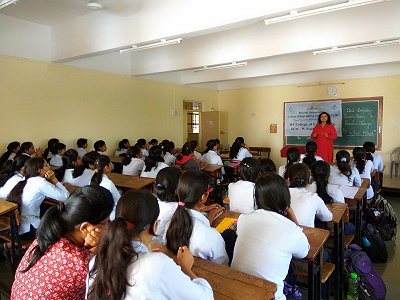
The Department of Information Technology organised a seminar on “Cloud Computing: From Security, Privacy to Forensics Challenges” by Dr. Arati M Dixit, Chairperson of ACM-W India, on 1st September, 2017. The seminar was organised under the Student Chapter of Association for Computing Machinery (ACM). The speaker discussed about the challenges in the security, privacy and forensics of Cloud Computing. She also provided brief information on benefits of having ACM student chapter.
M.E. E&TC (VLSI Embedded Systems) Admissions - Institute Level Quota 2017-18
M.E. E&TC (VLSI Embedded Systems) Admissions against CAP vacancies 2017-18
Direct Second Year Engineering admissions against CAP vacancies 2017-18

AICTE Public Notice :-"Curbing the menace of ragging in AICTE approved Technical Institutions."
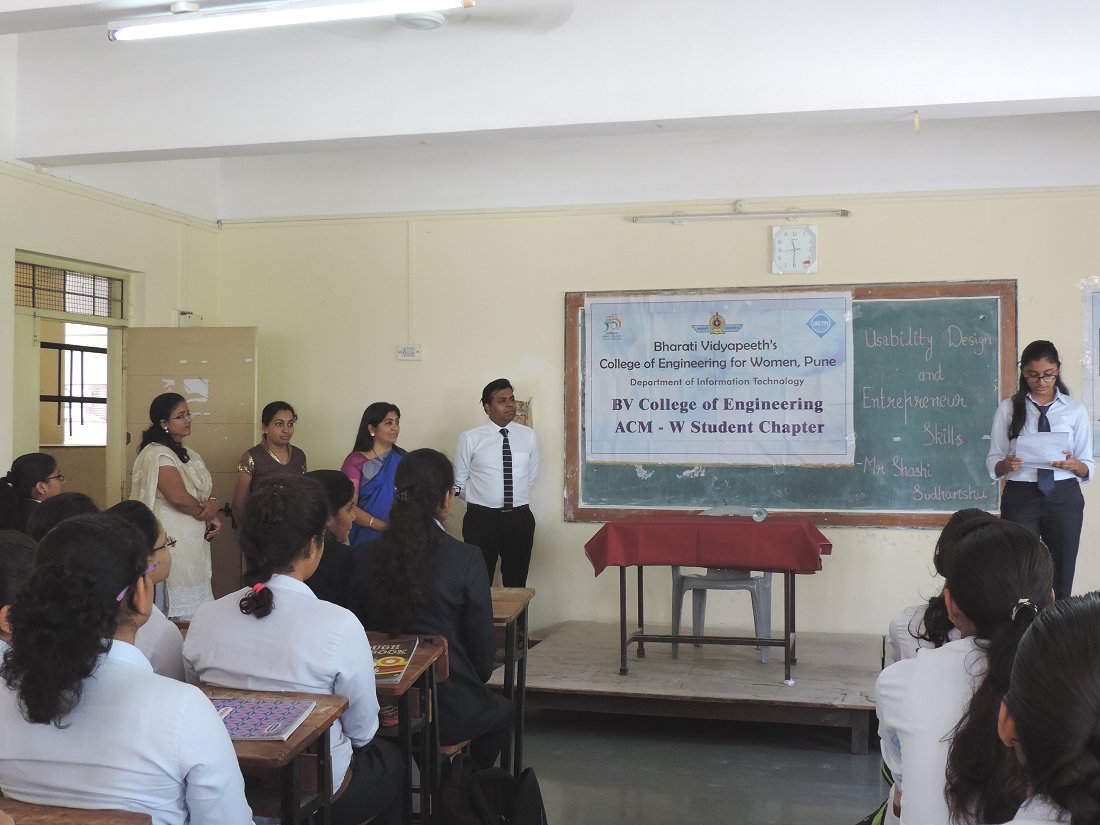
The Department of Information Technology, College of Engineering for Women, Pune, organized a seminar on “Usability Design and Entrepreneur Skills” by Mr. Shashi Sudhanshu, CEO, Talkd. Inc., Pune, on 23rd August 2017. The seminar was organized under the Student Chapter of Association for Computing Machinery (ACM). The speaker presented an overview of Usability Design and the skills required to become an entrepreneur.

The Department of Information Technology, organized seminar on "Evolution of Internet: Past, Present, and Future" by Dr. R. Venkateswaran, Senior Vice President, IoT Solutions, Persistent Systems Limited, Pune on 4th July, 2017 under Association for Computing Machinery (ACM) Student Chapter. The speaker presented an overview of computer networking and the three generations of Internet.

FE Welcome Address by Prof. H.V.Vankudre, Principal, BVCOE for Women pune to the First Year Students and Parents on 1st August 2017.
Information Brochure 2017-18
Direct Second Year Engineering Admission for admission to Vacant Seats after CA
Information Brochure 2017-18
ME Engineering Admission for admission in Institutional Quota and Vacant Seats after CAP
Schedule FE admissions against CAP
Schedule FE admissions against CAP vacancies 2017-18
Schedule FE admissions for IL
Schedule FE admissions for Institute Level (IL) - (2017-2018)
FE Vacancy seats
FE Vacancy seats after CAP round & Institutional Quota 2017-18
Information Brochure 2017-18
For admission in Institutional Quota and vacant seats after CAP First Year Engineering admissions
Against CAP vacancies
FE Admissions 2017-18 : Notice against CAP vacancies
FE Admissions 2017-18
Advertisement - FE Admissions
"Maharashtra DigiDhan"
Bharati Vidyapeeth's College of Engineering for Women, Pune organized an awareness program "Maharashtra DigiDhan" on 7th July 2017
Read more...
Seminar
The Department of Information Technology organized seminar on “Evolution of Internet: Past, Present, and Future” on 4th July, 2017 under Association for Computing Machinery (ACM) Student Chapter.
Read more...
First Year Engineering
Admission Fee 2017-18 Click to view...
College Bank Account Details:-
College A/c No.:- 200503130051111
IFSC Code :- SVCB0010005
MICR Code:- 411355005
First Year Under Graduate Degree Course
First Year Under Graduate Degree Course in Engineering Technology for academic year 2017-18
Read more...
AICTE has signed MoU with Internshala. Students can use Internshala platform for free internships
Read more...


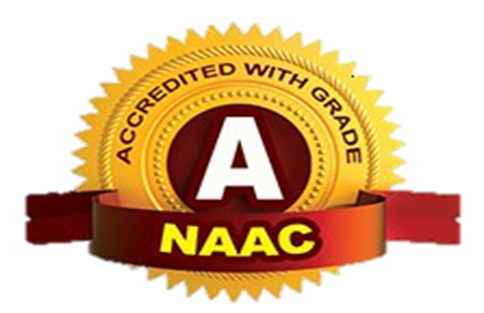


 Follow us on Youtube...
Follow us on Youtube...